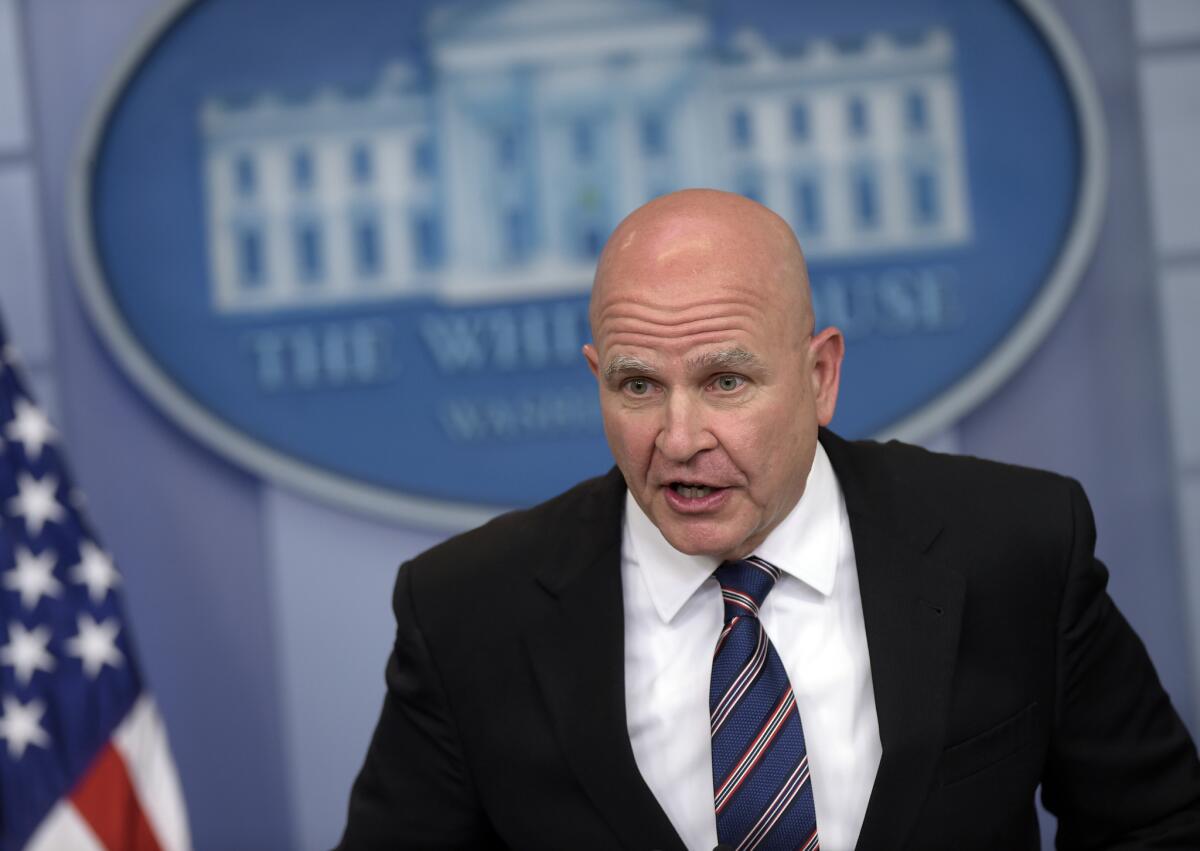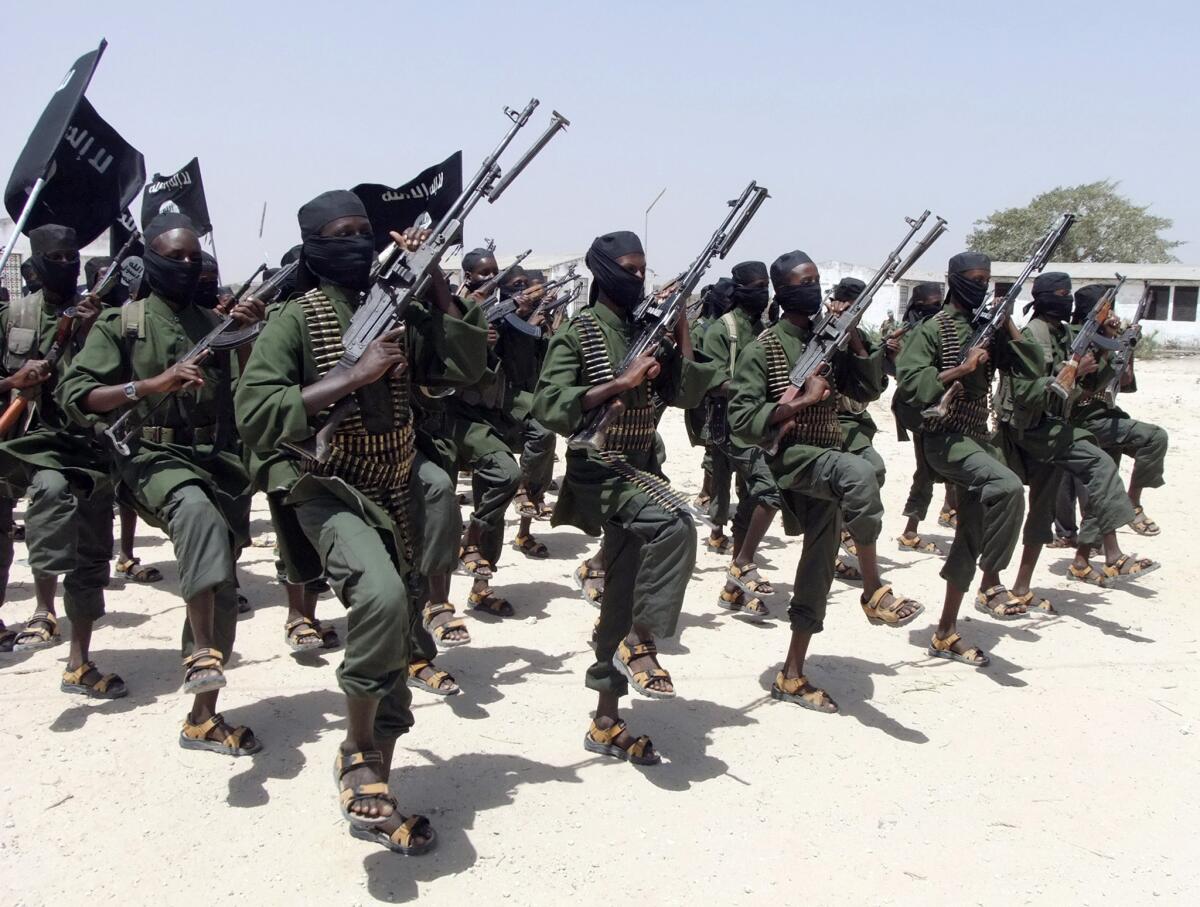Boy Scouts: Top leaders didn’t call Trump to praise speech as the president said
The Boy Scouts denied Wednesday that the head of the youth organization called President Donald Trump to praise his recent politically aggressive speech to its national jamboree.
Trump told the Wall Street Journal in an interview published Wednesday, “I got a call from the head of the Boy Scouts saying it was the greatest speech that was ever made to them, and they were very thankful.” Politico published the transcript of the interview.
“We are unaware of any such call,” the Boy Scouts responded in a statement. It specified that neither of the organization’s two top leaders — President Randall Stephenson and Chief Scout Executive Mike Surbaugh — had placed such a call.
The White House had no immediate response to the Boy Scouts’ denial.
Surbaugh apologized last week to members of the scouting community who were offended by the political rhetoric in Trump’s July 24 speech in West Virginia.
Other U.S. presidents have delivered nonpolitical speeches at past jamborees. To the dismay of many parents and former scouts, Trump promoted his political agenda and derided his rivals, inducing some of the scouts in attendance to boo at the mention of former President Obama.
“I want to extend my sincere apologies to those in our Scouting family who were offended by the political rhetoric that was inserted into the jamboree,” Surbaugh said. “That was never our intent.”
Surbaugh noted that every sitting president since 1937 has been invited to visit the jamboree.
Stephenson told the Associated Press two days after the speech that Boy Scout leaders anticipated Trump would spark controversy with politically tinged remarks, yet felt obliged to invite him out of respect for his office.
Hoping to minimize friction, the Boy Scouts issued guidelines to adult staff members for how the audience should react to the speech. Any type of political chanting was specifically discouraged.
Stephenson, who did not attend Trump’s speech, said the guidance wasn’t followed impeccably.
Mayor of London again calls on Trump to cancel state visit
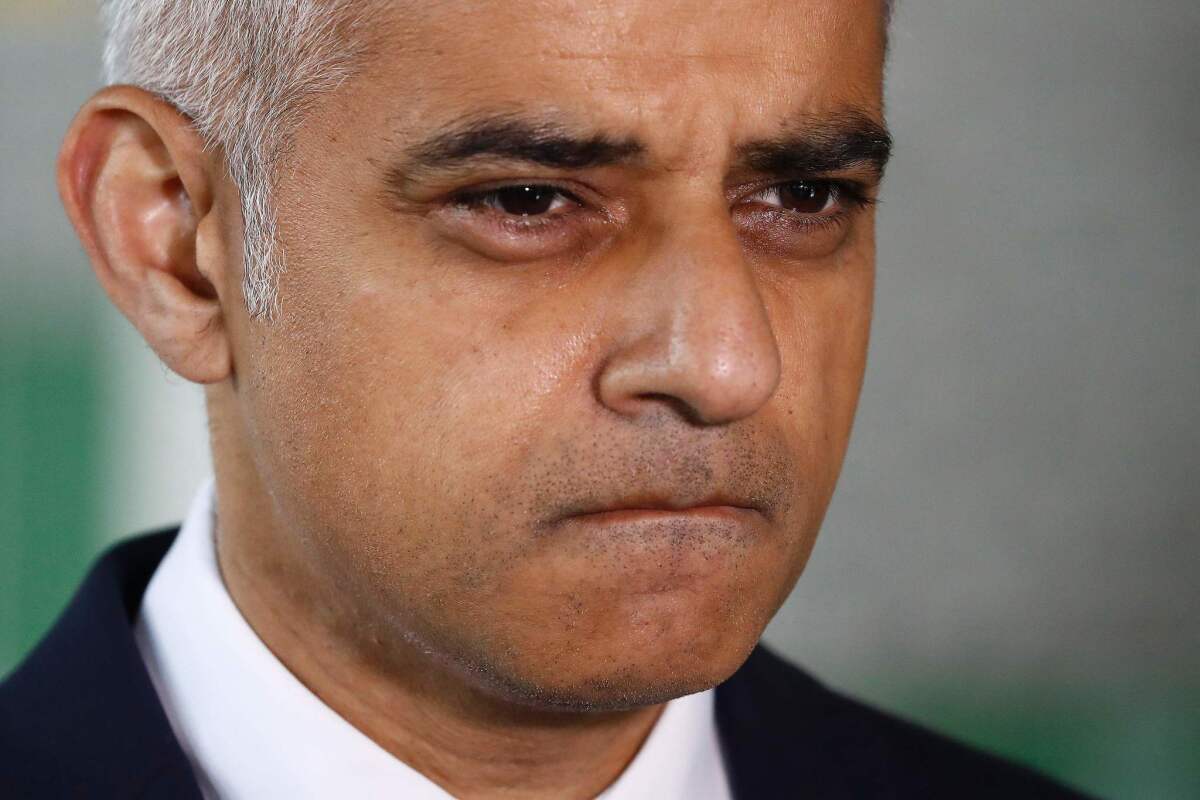
The mayor of London has reiterated his calls for President Trump’s state visit to Britain to be canceled in the wake of the city’s terrorist incident, saying his policies “go against everything we stand for.”
The war of words between the two leaders intensified further Monday evening after Trump criticized Mayor Sadiq Khan’s response to the London Bridge terrorist attack in two tweets, and the mayor said Trump should not be welcomed in the capital.
“Since Saturday I’ve been working with the police, with the emergency services, with the government and others to deal with the horrific attack on Saturday,” Khan said Monday evening. “I just haven’t got the time to deal with tweets from Donald Trump.”
But when pressed on whether he thinks a state visit for later this year should go ahead as planned, Khan was unequivocal.
“My position remains the same. I don’t think we should be rolling out the carpet to the president of the United States in the circumstances where his policies go against everything we stand for,” Khan told Channel 4 news.
“When you have a special relationship, it is no different to when you have a close mate: You stand with them in times of adversity, but you call them out when they’re wrong. And there are many things about which Donald Trump is wrong.”
Trump initially criticized Khan hours after the London attack posting on Twitter: “At least 7 dead and 48 wounded in terror attack and Mayor of London says there is ‘no reason to be alarmed!’”
Khan’s office soon pointed out that the president had, in fact, misquoted Khan, who actually said that Londoners should not be alarmed by the increased armed police presence on the streets.
Trump took to Twitter again on Monday to slam the London mayor once more.
“Pathetic excuse by London mayor Sadiq Khan, who had to think fast on his ‘no reason to be alarmed’ statement. MSM [Mainstream media] is working hard to sell it!” the president wrote.
This is not the first time Khan, the first Muslim mayor of a major Western capital city, has called for Trump’s state visit to be banned.
He previously branded Trump’s policies on immigration and proposed travel ban on people entering the U.S. from predominantly Muslim countries “cruel.”
An online government petition calling for the invitation to be withdrawn also gathered more than 1.8 million votes.
The visit was first announced during Prime Minister Theresa May’s trip to Washington, where she became the first foreign leader to meet the newly-inaugurated president.
State visits are personal invites from the British monarch and involve a significant amount of pomp and ceremony, and usually a state banquet.
He helped bring down President Nixon. He thinks President Trump is even worse.
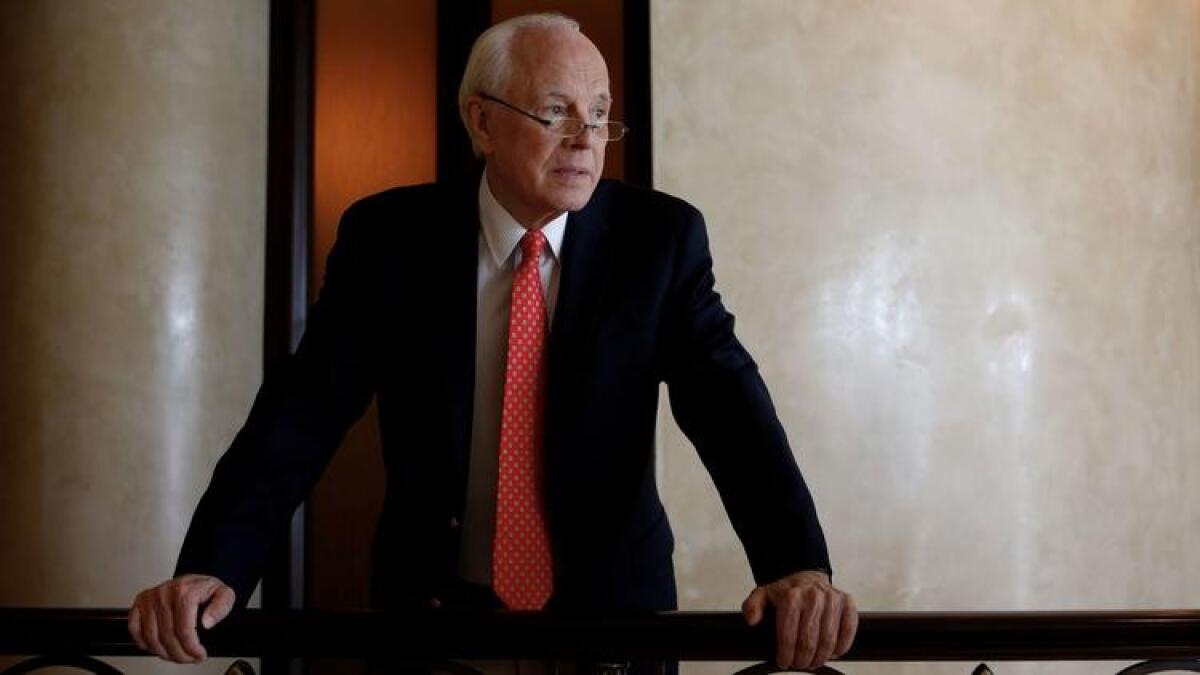
John Dean is a connoisseur of coverups, a savant of scandal, so he can more than imagine what it’s like inside the Trump White House right now.
“It’s a nightmare,” he said, presiding in a high-backed leather wing chair off the lobby of the Beverly Hills Hotel. Not just for those in the headlines — political strategist Steve Bannon, jack-of-many-duties Jared Kushner — but for their unsung assistants and secretaries as well.
“They don’t know what their jeopardy is. They don’t know what they’re looking at. They don’t know if they’re a part of a conspiracy that might unfold. They don’t know whether to hire lawyers or not, how they’re going to pay for them if they do,” Dean said in a crisp law-counsel cadence. “It’s an unpleasant place.”
Dean was a central figure in Watergate, the 1970s political scandal against which all others are measured, serving at the tender age of 32 as President Nixon’s White House attorney. In that capacity Dean worked to thwart investigators after the clumsy break-in at Democratic Party headquarters, then flipped and helped sink Nixon by revealing the president’s involvement in the coverup.
Two decades ago, Washington state Republicans repealed and replaced a healthcare overhaul there. It didn’t end well
Republicans in the state of Washington didn’t wait long in the spring of 1995 to fulfill their pledge to roll back a sweeping law expanding health coverage in the state.
Coming off historic electoral gains, the GOP legislators scrapped much of the law while pledging to make health insurance affordable and to free state residents from onerous government mandates.
It didn’t work out that way: The repeal left the state’s insurance market in shambles, sent premiums skyrocketing and drove health insurers from the state. It took nearly five years to repair the damage.
Two decades later, the ill-fated experiment, largely relegated to academic journals, offers a caution to lawmakers at the national level as Republicans in the U.S. Senate race to write a bill to repeal and replace the federal Affordable Care Act.
“It’s much easier to break something,” said Pam MacEwan, who led a Washington state commission charged with implementing the law in the mid-1990s and now oversees the state insurance market there. “It’s more difficult to put Humpty Dumpty back together again. … And that’s when people get hurt.”
The nonpartisan Congressional Budget Office echoed that warning last week, when it concluded that the healthcare bill passed by the House last month would destabilize insurance markets in a sixth of the country and nearly double the number of people without health insurance over the next decade.
Companies accelerate hiring, adding a robust 253,000 net new jobs, ADP says
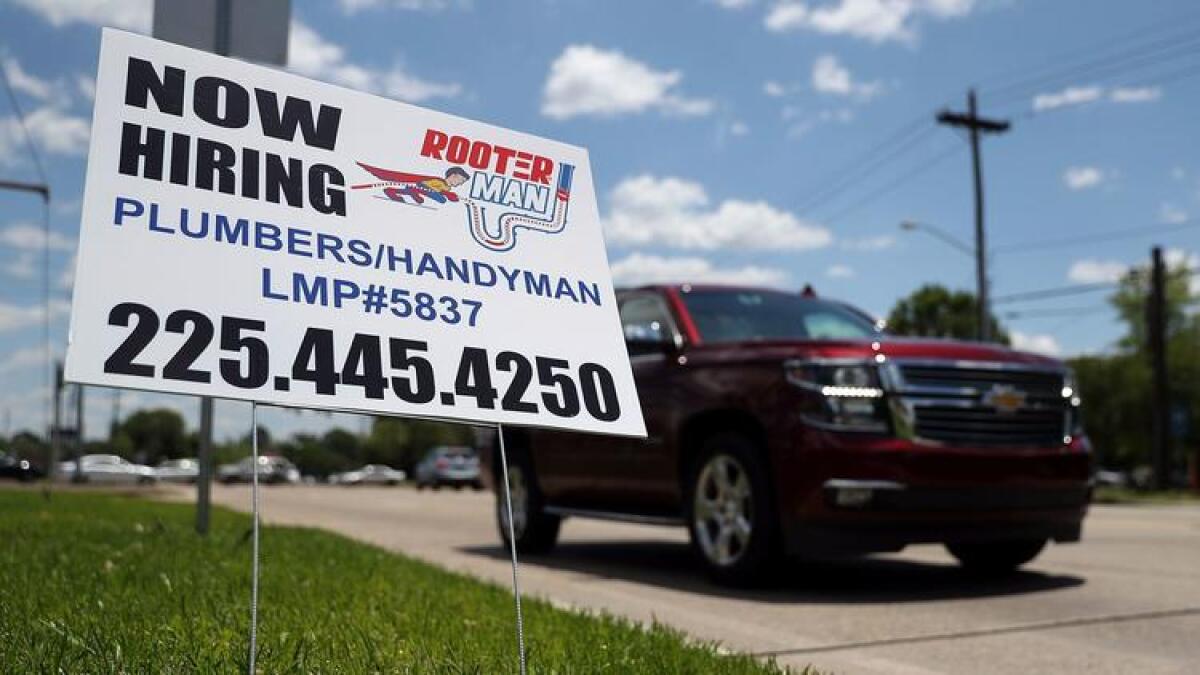
Companies accelerated their hiring last month, adding a robust 253,000 net new jobs in a sign the labor market remains healthy and the economy is strengthening after a weak winter.
The private-sector job creation figures reported Thursday by payroll firm Automatic Data Processing far exceeded analyst expectations and was well above the downwardly revised 174,000 net new positions added in April.
“Job growth is rip-roaring,” declared Mark Zandi, chief economist at Moody’s Analytics, which assists ADP in preparing its report.
Trump to announce decision today on climate pact
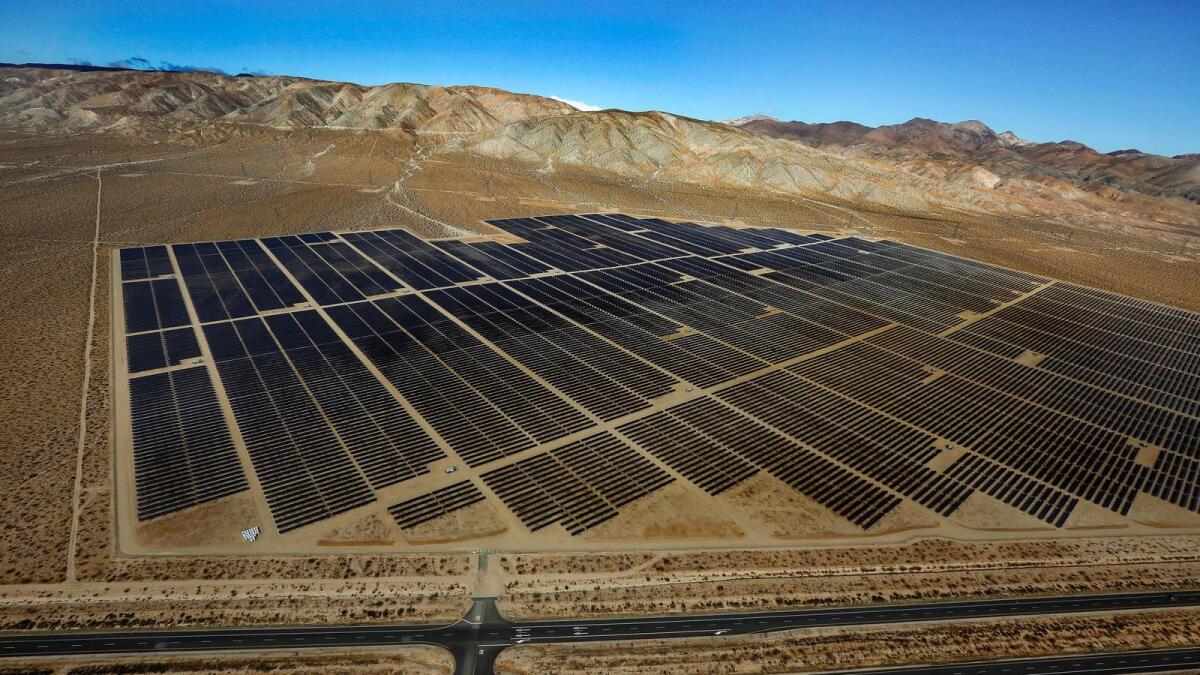
President Trump plans to bring weeks of indecision over climate change policy to a close this afternoon, announcing if he will withdraw the U.S. from the international agreement on climate change reached in Paris in 2015.
Read our coverage of the debate leading up to today’s announcement:
The choice for Trump appears to be whether to quit the treaty entirely or stay with it but significantly scale back the U.S. commitment to combat global warming.
The debate has split Trump’s advisors for months. He has also been heavily lobbied by other leaders, from the pope to California Gov. Jerry Brown, who weighed in Wednesday in an interview.
U.S. diplomats have been making clear to their foreign counterparts that the Trump administration believes that economic growth at home is a higher priority than fighting climate change.
But a large number of business leaders believe that the climate change agreement is good for the economy. They and their allies in the Republican Party have been making that case to the White House.
Regardless of what Trump decides, California and other states with Democratic majorities have made clear that they intend to continue state policies to combat climate change.
California leaders, in particular, have been taking the lead in building international support for efforts to convert to renewable energy and reduce use of coal and other fossil fuels.
All jokes aside, Trump’s ‘covfefe’ tweet sparks questions too
President Trump sparked a global kerfuffle over “covfefe” with his bizarrely truncated tweet just minutes into Wednesday, spawning countless jokes across Twitter but also more serious questions for which the White House gave no answers.
Press Secretary Sean Spicer, during an unusually short 11-minute briefing in which he insisted he not be on camera, declined to give any explanation for Trump’s tweet posted just after midnight. Nor would he translate what the president was trying to say in the garbled message that broke off midsentence.
But Spicer told reporters that the public should not be concerned that the president sent what the questioner called “somewhat of an incoherent tweet.”
“The president and a small group of people know exactly what he meant,” Spicer said.
Biden launches new PAC, keeping the 2020 door open
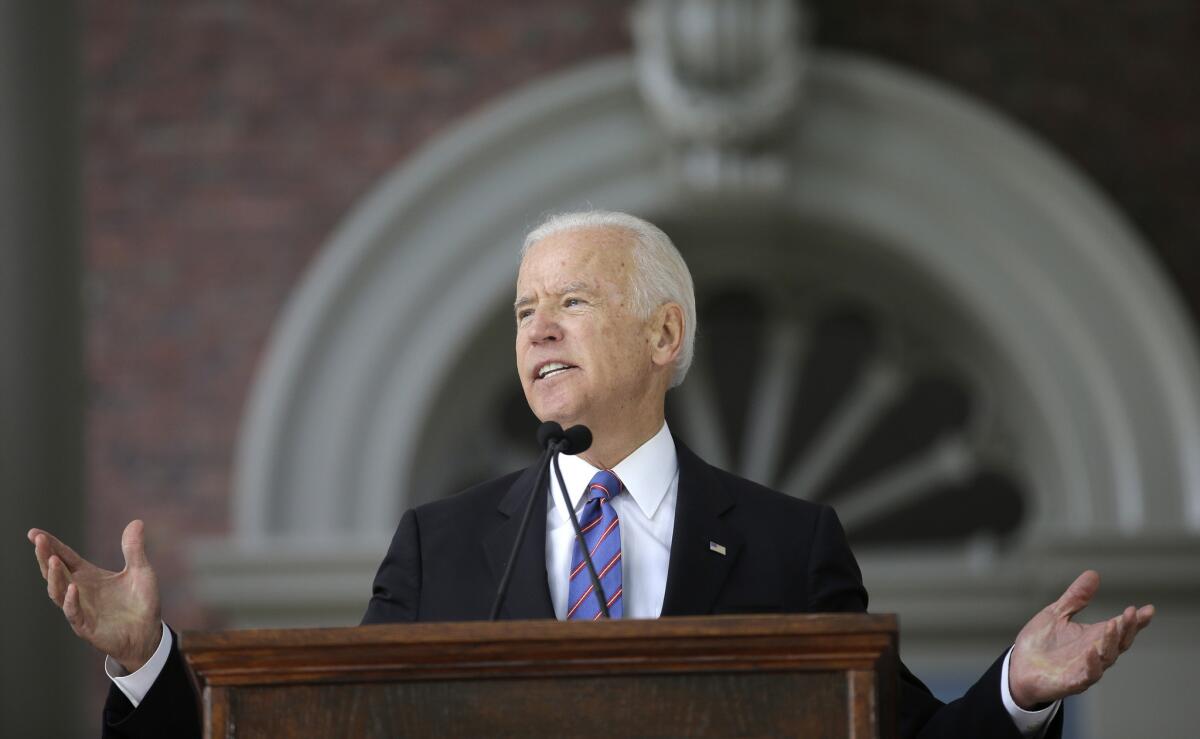
Former Vice President Joe Biden is launching a new political action committee, a platform that will allow him to provide help to favored candidates and, inevitably, boost speculation about a possible run for the Democratic nomination in 2020.
The organization, which Biden is calling American Possibilities, will be staffed by a former top political aide to the vice president, Greg Schultz, who is also a veteran of President Obama’s reelection campaign.
The PAC will allow Biden to raise money that he can use to travel the country, contribute to candidates in governor’s races this year and congressional and state races in 2018 and generally do the sorts of things that aspiring politicians do to keep their names in the headlines.
All that can’t help but nurture questions about whether Biden, 74, will try yet again to attain the office he first started running for in 1987.
In public appearances, which have taken him to electorally important states, and interviews since the 2016 election, Biden has been sharply critical of the Trump administration, but has also pointed to flaws in his own party. In one interview, he pointed to a “bit of elitism that’s crept in” to the party’s approach to working-class voters.
At the same time, he has given carefully ambiguous answers when asked about his plans. At a conference in Las Vegas earlier this month, he responded to the question about a presidential run by saying: “Could I? Yes. Would I? Probably not.”
In the announcement for the new group, Biden said that “the negativity, the pettiness, the small-mindedness of our politics drives me crazy. It’s not who we are.”
“It’s time for big dreams and American possibilities,” he said.
U.S., region’s foreign ministers debate Venezuela
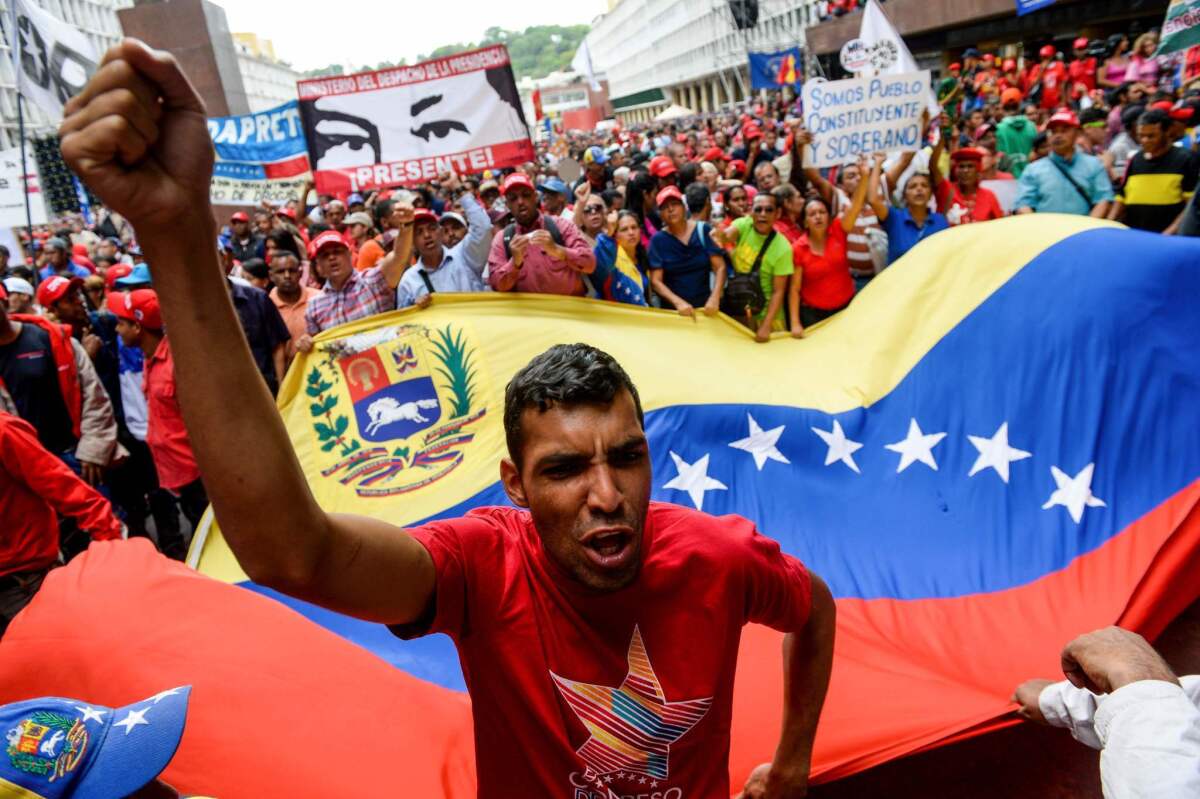
The United States and foreign ministers from across the hemisphere met in Washington on Wednesday to attempt to force Venezuela’s leftist government and its angry opposition into talks.
Hunger and violence have pushed Venezuela to the brink of humanitarian disaster, diplomats say.
But Wednesday’s meeting of the Organization of American States faced unlikely prospects for success: Venezuelan President Nicolas Maduro does not trust the organization and has said his nation will withdraw its membership.
Some OAS nations, including several U.S. allies in the Caribbean, have criticized the regional body’s efforts as intervention promoted by Washington.
But U.S. officials are hoping the sheer weight of the crisis will unite the region to put pressure on Venezuela.
“There’s more and more concern about what we’re seeing, and so more and more countries have gotten over their reluctance to question or go against the wishes of the Venezuelan government,” a senior State Department official said in a briefing for reporters.
“It’s really hard to stand by and do nothing in the face of the kinds of institutional steps we’ve seen in Venezuela, and the increasing humanitarian suffering,” said the official, who spoke on condition of anonymity, in keeping with frequent administration practice.
Although the OAS periodically brings its members’ foreign ministers together, this is the first time a meeting has been convened to deal with a single topic, U.S. officials said.
At the conclusion of Wednesday’s session, diplomats said they had discussed two resolutions. One, promoted by Caribbean nations, called on Venezuela to reconsider withdrawing from the OAS.
A second more pointed resolution authored by the U.S., Canada, Mexico, Panama and Peru urged the Maduro administration not to go ahead with a constituent assembly that would rewrite the Venezuelan constitution. Many fear it would dissolve the few democratic institutions that remain and favor the ruling Socialist Party.
Separately, the Venezuela opposition, emboldened by a string of increasingly massive street demonstrations, sharply criticized Wall Street for extending what it called a “lifeline” to the Maduro government.
At issue is the purchase by Goldman Sachs of Venezuelan government bonds for a reported $865 million, a major discount for paper originally worth $2.8 billion.
Goldman Sachs confirmed the purchase of the bonds, issued in 2014 by the state oil company PDVSA, after it was reported in the Wall Street Journal.
“We are invested in PDVSA bonds because, like many in the asset management industry, we believe the situation in the country must improve over time,” Goldman said in a statement. The firm added that it made the purchase through a secondary dealer to avoid direct interaction with the Venezuelan government.
That distinction meant nothing to the Venezuelan opposition, which accused Goldman of “making a buck off the suffering” of the Venezuelan people.
The Trump administration previously has targeted the Maduro government, slapping economic sanctions on its vice president and pro-Maduro Supreme Court justices.
Former FBI director spoke with new special counsel and is cleared to testify before Senate panel
The special counsel investigating possible links between Russia and the Trump presidential campaign has cleared former FBI Director James Comey to testify before a congressional committee about his contacts with President Trump, according to an associate close to Comey.
Comey met with Robert S. Mueller III, whom the Justice Department appointed on May 17 to investigate any Russian ties to the Trump campaign, and Mueller said he had no problems with Comey’s testifying, the associate said.
Trump abruptly fired Comey as head of the FBI on May 9. The president later said in an interview on NBC News that he was concerned about the FBI investigation into what he called the “Russia thing.”
Comey reportedly wrote internal memos after his meetings with Trump. In one, he wrote that the president had requested he ease up on the FBI probe of Michael Flynn, who served as Trump’s national security advisor until he was ousted in February for lying about his contacts with Russian officials.
The Senate Intelligence Committee announced on May 19 that Comey had agreed to testify after the Memorial Day holiday. The hearing has not been scheduled.
The FBI separately declined a request from the House Oversight Committee to turn over Comey’s memos. The bureau said it would need to consult with Mueller before making any decisions.
Rep. Jason Chaffetz (R-Utah), the committee chairman, said in response that he would not push the matter.
“The focus of the committee’s investigation is the independence of the FBI” and the events leading to Comey’s firing, he wrote.
In a separate development, a senior Justice Department lawyer with experience in complex financial fraud investigations has agreed to join Mueller’s investigation.
Andrew Weissman has led the fraud section at Justice, where he oversaw probes into corporate wrongdoing at Volkswagen and Takata. Weissman also is a veteran of the FBI.
Weissman is the highest-ranking Justice Department official to join the special counsel office being set up a few blocks from the main Justice building in downtown Washington.
Mueller also hired two colleagues from the WilmerHale law firm, where he worked, and brought on a former Justice Department spokesman, Peter Carr, to handle media inquiries.
Analysis: In President Trump’s wake, divisions mark both Democratic and Republican parties
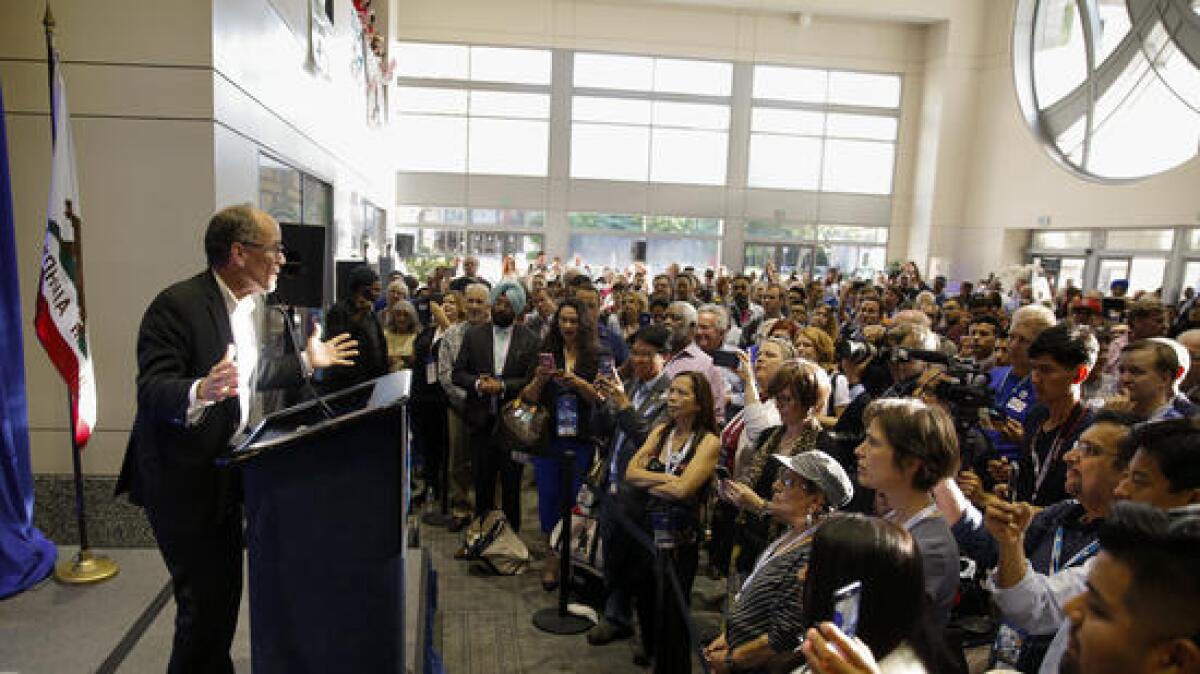
Six months after President Trump breached long-standing political boundaries to win the White House, the nation’s major political parties still muddle in his wake.
On the sun-swept lawn of the Hotel del Coronado two weeks ago, national Republican leaders sipped cocktails and listened to San Diego Mayor Kevin Faulconer, one of the party’s brightest lights in the most populous state, praise a brand of moderate Republicanism that looks nothing like the versions coming out of Washington — either the populism of the president or the more orthodox conservatism of congressional leaders.
A week later, Democratic National Committee Chairman Tom Perez talked in a Sacramento interview of the “remarkably constructive” debate underway in his party, characterizing its divisions as largely in the past. Within hours, he and other party leaders were booed as they welcomed delegates to a state convention that would be filled with persistent internal warfare on healthcare and other issues.
No political party is immune to disagreement; indeed the path to power often relies on combustible ideological diversity. But Democrats and Republicans alike seem particularly adrift and quarrelsome these days.
Trump preparing to pull U.S. from Paris climate accord, amid last-minute lobbying
President Trump hasn’t made a final decision on whether the U.S. will quit the Paris Accord on climate change, but White House officials indicated Wednesday that he was headed in that direction, setting off a worldwide reaction.
A flurry of leaks, counter-leaks and public statements thrust back into the spotlight a decision that has been agonized and untidy even by the standards of a White House known for internal drama.
Wednesday morning, when officials told some news organizations that Trump had settled on pulling out of the climate agreement, seemingly everyone in the world jumped in to try to influence or spin his decision, from the Chinese government to the coal industry to the state of California.
That offered a foretaste of the reaction Trump likely will receive if he does follow through on his vow to pull the United States out of the 195-nation pact, which President Obama hailed in 2015 as one of his major achievements.
Other nations have swiftly moved to take over the leadership role on climate that the United States would be abandoning. Some states have followed suit, promising they would break with Washington to work with other countries in their efforts to contain global warming.
During Trump’s recent overseas trip, U.S. allies warned him that America’s broader diplomatic influence would be undercut if the administration gave up its seat at the climate negotiating table.
All the public lobbying on Wednesday moved Trump to weigh in himself. He knocked down reports that he had decided to withdraw with a tweet announcing that he was still making up his mind.
The mixed messages coming out of the White House left open the possibility that the original news reports reflected the views of officials who were aiming to steer the final outcome by presenting withdrawal as a done deal.
Trump’s schedule for the day includes meetings with advisors hoping to talk him into staying in the agreement, at least to some extent.
If Trump does withdraw the U.S. fully from the Paris pact, scientists warn it will be a tremendous setback to the worldwide effort to contain temperatures from rising an average of 2 degrees Celsius above pre-industrial levels. The consequences for the United States would extend beyond global warming.
“It will be a very big deal all over the world,” said Todd Stern, the lead U.S. climate negotiator during the Obama administration. “There will be consequential blowback with respect to our diplomatic position across the board.”
UPDATES
9:27 a.m.: This post was updated throughout with staff reporting and additional details.
6:23 a.m.: This post was updated with Trump’s tweet.
6:04 a.m.: This post was updated throughout with additional details.
U.S. Supreme Court makes it harder to sue police for barging into homes
The U.S. Supreme Court made it harder to sue police for barging into a home and provoking a shooting, setting aside a $4-million verdict against two Los Angeles County deputies on Tuesday.
The money was awarded to a homeless couple who were startled and then shot when the two sheriffs deputies entered the shack where they were sleeping.
The unanimous ruling rejected the so-called provocation rule that some lower courts have used. Under that rule, police can be sued for violating a victim’s constitutional rights against unreasonable searches if they provoked a confrontation that resulted in violence.
Trump lashes out at Germany over NATO spending and trade after Merkel questions the U.S. commitment to its allies
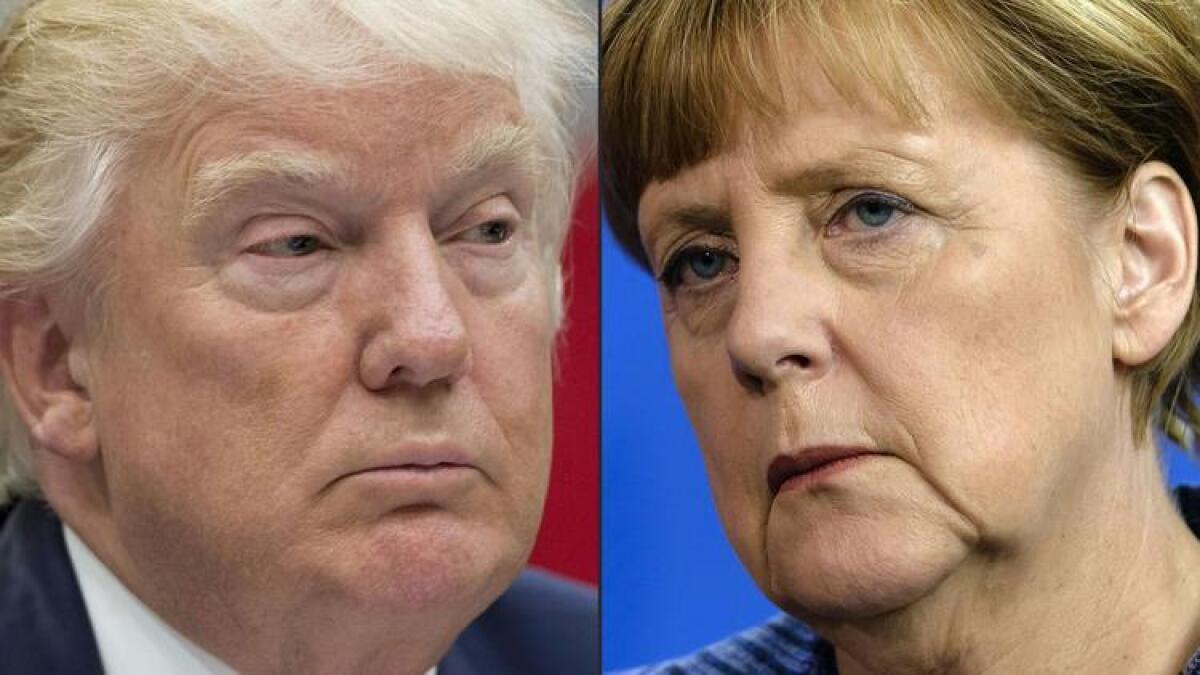
President Trump took aim at German trade practices and defense spending Tuesday following pointed criticism from Chancellor Angela Merkel that Germany may not be able to rely on its allies.
“We have a MASSIVE trade deficit with Germany, plus they pay FAR LESS than they should on NATO & military. Very bad for U.S. This will change,” Trump wrote in a tweet.
Last week, White House spokespeople had denied that Trump criticized German trade practices after the German newspaper Der Spiegel quoted him as having done so.
Trump unsettled Merkel and other allies during the recent NATO summit when, during his remarks, he did not mention the central commitment members of the North Atlantic Treaty Organization make to defend each other.
Trump’s policy toward climate change is another point of contention with many European countries. Trump promised during the election to tear up the landmark Paris climate accord.
Merkel said the conversation with the U.S. on climate change last week during the G-7 meetings in Sicily, which followed the NATO summit, was “extremely difficult.”
During a campaign speech in Munich on Sunday, Merkel said Germany must rethink how much it can rely on its allies. “The era in which we could rely completely on others is gone, at least partially,” Merkel said. “I have experienced that over the last several days.”
In a 2014 meeting, NATO defense ministers agreed that each state would move toward a goal of raising military spending to 2% of its annual economic output by the year 2024. German defense spending is below that goal.
The U.S. trade deficit with Germany shrank to $65 billion in 2016 from $75 billion the year before.
Consumers spend at fastest pace in four months in a sign of spring economic rebound
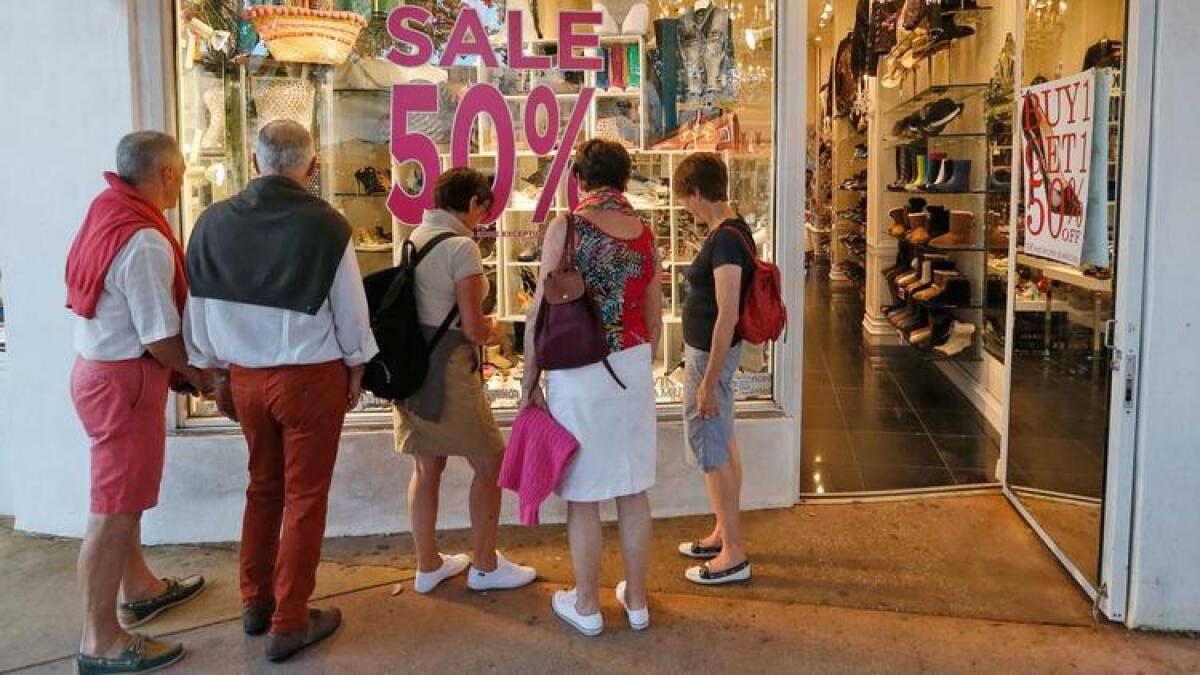
Americans ratcheted up their spending in April at the fastest pace in four months, in a sign the economy has rebounded this spring after a lackluster winter.
The new data also could help push Federal Reserve officials to hike a key interest rate again when they meet in two weeks.
Personal consumption expenditures increased 0.4% in April, up from 0.3% the previous month, the Commerce Department said Tuesday.
Americans had more money to spend, with personal incomes also rising 0.4% — twice the pace of growth in March.
White House communications director Michael Dubke resigns
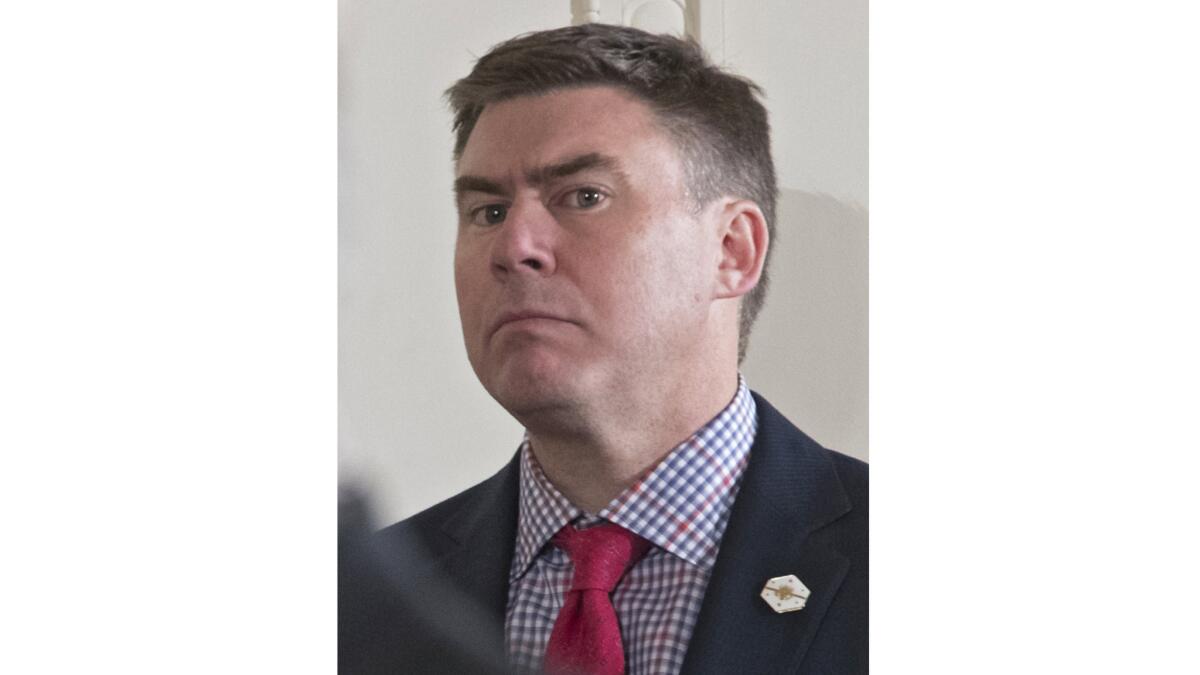
White House communications director Michael Dubke has resigned.
Kellyanne Conway, White House counselor, told The Associated Press that Dubke handed in his resignation before President Donald Trump left for his international trip earlier this month.
In an interview on Fox News on Tuesday, Conway said Dubke “made very clear that he would see through the president’s international trip, and come to work every day and work hard even through that trip because there was much to do here back at the White House.”
Dubke issued a statement Tuesday morning:
“It has been my great honor to serve President Trump and this administration. It has also been my distinct pleasure to work side-by-side, day-by-day with the staff of the communications and press departments.”
A Republican consultant, Dubke joined the White House team in February after campaign aide Jason Miller — Trump’s original choice for communications director — withdrew from consideration. Dubke founded Crossroads Media, a GOP firm that specializes in political advertising.
--
6:03 a.m.: Updated with Dubke’s statement
Should Jared Kushner keep his security clearance? Adam Schiff isn’t sure
The top Democrat on the House Intelligence Committee, Rep. Adam B. Schiff (D-Burbank), says he’s not sure that President Trump’s son-in-law and advisor, Jared Kushner, should retain his security clearance.
The California Democrat, who has been a sharp critic of Trump, also said in an interview aired Sunday that national security advisor H.R. McMaster, a highly respected military officer, had been tarnished by his association with the White House.
Schiff’s comments, on ABC’s “This Week,” came amid growing questions about Kushner’s contacts with Russian officials before Trump took office. Trump has denounced the latest round of news reports, saying that some of them could be based on fabricated sources.
Top Trump aides, including John F. Kelly, the secretary of Homeland Security, pushed back Sunday against the suggestion that there was anything untoward about establishing “back channel” communications with the Russians during the presidential transition.
Schiff said he regretted that McMaster had done so as well, saying he believed the White House “used” the solid reputations of people like him to back up dubious actions.
“Sadly, I think this is an administration that takes in people with good credibility and chews them out and spits out their credibility at the same time,” said Schiff, who acknowledged that what McMaster said about back channel communications was “true in the abstract.”
“I think anyone within the Trump orbit is at risk of being used,” he said.
Kelly, in separate talk-show appearances on Sunday, said there was nothing untoward about an incoming administration establishing communications with a foreign power in order to lay the groundwork for better relations.
Schiff declined to discuss the substance of the allegations regarding Kushner’s contact with Russian officials during the transition and whether Kushner had been forthcoming about them, but said enough questions had been raised that his access to top-secret intelligence should be scrutinized.
“I think we need to get to the bottom of these allegations,” Schiff said. “But I do think there ought to be a review of his security clearance to find out whether he was truthful, whether he was candid. If not, then there’s no way he can maintain that kind of a clearance.”
Schiff was also critical of continuing involvement in aspects of the Russia probe by fellow Californian Devin Nunes (R-Tulare), the chairman of the House Intelligence Committee, who stepped aside from the probe earlier this year after the House Ethics Committee began investigating whether he had improperly revealed classified information.
Nunes remains involved in decision-making about the issuance of subpoenas, Schiff said, adding: “I don’t think that he should, given that he has stepped aside or recused himself.”
The committee is investigating Russian entanglements by figures in Trump’s circle, including fired national security advisor Michael Flynn, who has been the target of multiple subpoenas.
Trump still ‘wide open’ on climate change, Pentagon chief says
With President Trump set to make a decision this week about whether the U.S. should remain part of the landmark Paris climate accord, Defense Secretary James Mattis said Trump remains “wide open” on the issue.
During a visit to Europe that ended Saturday, Trump dismayed European allies by refusing to commit to remaining in the 2015 accord during talks with European Union officials in Brussels and at the Group of Seven gathering in Sicily. The president said in a tweet that he will make a decision this week.
Mattis, who was present at some of the Brussels talks, said that Trump is still making up his mind, and that he has been inquisitive about other leaders’ opinions.
“The president was open – he was curious about why others were in the position they were in, his counterparts in other nations,” the Defense secretary said in an interview aired Sunday on CBS’ “Face the Nation.”
“And I’m quite certain the president is wide open on this issue as he takes in the pros and cons of that accord.”
During his European trip, Trump met privately at the Vatican with Pope Francis, who presented him with a copy of his papal encyclical on environment and climate change. French President Emmanuel Macron, who met with Trump in Brussels, also said he had pressed the issue with the U.S. president, though the White House did not mention that appeal in a summary of their meeting.
Homeland Security secretary defends Jared Kushner, blasts Manchester intelligence leaks
There is nothing inherently wrong with an incoming presidential administration establishing “back channel” communications with a foreign power such as Russia, Secretary of Homeland Security John F. Kelly said Sunday.
Appearing on “Fox News Sunday,” Kelly was asked about reports by the Washington Post and other outlets that President Trump’s son-in-law and close advisor, Jared Kushner, sought to set up secret lines of communication with Russian officials prior to Trump being sworn in.
The retired general did not confirm the reports, but said the principle of establishing secretive contacts during a presidential transition “doesn’t bother me” and is a legitimate means of building relationships.
“I think that any channel of communication, back or otherwise, with a country like Russia is a good thing,” he said.
Kelly did not address a central element of the reports — that Kushner discussed the possibility of using Russian communications channels from a Russia diplomatic outpost to shield from U.S. intelligence surveillance whatever discussions Trump transition officials wanted to have with Moscow.
The FBI, a special counsel and multiple congressional committees are probing Russian interference in the presidential campaign and whether the Trump camp colluded in it. The U.S. intelligence community says Russian cyberattacks were meant to boost Trump and harm his opponent, Hillary Clinton.
In a separate interview on NBC’s “Meet the Press,” Kelly defended the integrity of Kushner, whose involvement in communications with Russia has brought the investigation closer to Trump personally than has previous scrutiny of others in his campaign circle or the White House.
Calling Kushner “a great guy, a decent guy,” the Homeland Security secretary said the president’s son-in-law’s “No. 1 interest, really, is the nation.”
Also in the NBC interview, Kelly excoriated intelligence leaks in the wake of last week’s deadly bombing in Manchester, England. British officials including Prime Minister Theresa May were angered by disclosures about details of the investigation, including the release of the dead attacker’s name and detailed photos from the bomb scene that were published by the New York Times.
Several outlets cited unnamed U.S. officials as the source of the information including the bomber’s identity. The Times did not say how it obtained the photos.
Britain routinely shares intelligence with close allies like the United States with the expectation that it will be kept confidential. Kelly said that failing to keep such secrets could seriously damage intelligence-sharing arrangements with other nations.
“I believe when you leak the kind of information that seems to be routinely leaked -— high, high level of classification… I think it’s darn close to treason,” Kelly said. It is not clear what level of classification, if any, the information about the British investigation would have had.
Trump himself, who recently caused controversy when he passed sensitive intelligence on Islamic State to Russian Foreign Minister Sergey Lavrov and discussed the location of U.S. nuclear submarines with the president of the Philippines, Rodrigo Duterte, has denounced the Manchester leaks and vowed to track down the source or sources.
In tweets, Trump says stories based on White House leaks are fabricated
President Trump is back – and tweeting.
In a Sunday morning series of posts on Twitter, the president repeated his denunciations of the “fake media,” celebrated the Republican victory in a Montana special election and declared his overseas trip a success.
Trump returned to the White House late Saturday after a swing through the Middle East and Europe, the first foreign trip of his presidency. During it, he tweeted only sparingly.
While Trump was away, controversy continued to swirl around his White House, with media reports focusing on son-in-law Jared Kushner’s role in Trump campaign contacts with Russian officials. The GOP healthcare plan and Trump’s budget also came under withering scrutiny during the president’s absence.
In Sunday’s tweets, Trump said cascading leaks from within his administration were in fact “fabricated lies” by news organizations based on sources that did not exist. One tweet was corrected to fix the spelling of “exist.”
Trump also complained that the special congressional election in Montana, called to fill the seat vacated when Ryan Zinke became his Interior secretary, “was such a big deal to Dems & Fake News until the Republican won.” The “V was poorly covered,” he said, referring to the Republican victory.
The victory by Republican candidate Greg Gianforte received extensive coverage. It was widely expected, given Montana’s significant Republican edge, but made more suspenseful on the eve of the election when Gianforte was charged with misdemeanor assault for an incident in which he struck a reporter who had asked him a question.
The president received mixed reviews for his inaugural overseas venture. He was praised by some for his outreach to Sunni Arab allies in the Persian Gulf, but continued his administration’s practice of making no public criticism of serious human rights violations.
In Europe, he rattled allies by declining to explicitly endorse the NATO alliance’s bedrock common defense pledge or pledge to adhere to the Paris climate accord.
Whatever the commentary surrounding the trip, Trump counted it a success.
“Hard work but big results,” he wrote.
Trump’s international trip underscored what ‘America First’ looks like on the world stage
Donald Trump made no secret during the presidential campaign of his disdain for America’s trading partners, his skepticism of longtime alliances and his eagerness to refocus U.S. foreign policy on the single-minded pursuit of American security.
That was the largely the president the world got as Trump made his way through the Middle East and Western Europe over the last nine days,
Trump’s first foreign trip may have produced memorable, and at time cringe-inducing, images of the new president, whether grasping a glowing orb in Saudi Arabia or shoving the prime minister of Montenegro at a NATO meeting in Brussels. But perhaps most profoundly, the trip underscored what “America First,” as Trump has branded his governing philosophy, looks like on the world stage.
Trump says he’ll decide on Paris climate deal next week
Seven wealthy democracies ended their summit Saturday in Italy without unanimous agreement on climate change, as the Trump administration plans to take more time to say whether the U.S. is going to remain in the Paris accord on limiting greenhouse gas emissions.
The other six nations in the Group of Seven agreed to stick with their commitment to implement the 2015 Paris deal that aims to slow down global warming.
The final G-7 statement, issued after two days of talks in the seaside town of Taormina, said the U.S. “is in the process of reviewing its policies on climate change and on the Paris agreement and thus is not in a position to join the consensus on these topics.”
Trump tweeted he would decide his stance on the Paris agreement next week. The announcement on the final day of the U.S. president’s first international trip comes after he declined to commit to staying in the sweeping climate deal, resisting intense international pressure from his peers at the summit.
Italian Prime Minister Paolo Gentiloni, who chaired the meeting, said the other six “won’t change our position on climate change one millimeter. The U.S. hasn’t decided yet. I hope they decide in the right way.”
Gentiloni said climate was “not a minor point” and that he hoped the United States would decide “soon and well” because the Paris accords “need the contribution of the United States.”
French President Emmanuel Macron also chimed in on the climate issue, praising Trump’s “capacity to listen.” Macron said he told Trump it is “indispensable for the reputation of the United States and the interest of the Americans themselves that the United States remain committed” to the Paris climate agreement.
German Chancellor Angela Merkel was more downbeat, calling the G-7 climate talks “very unsatisfactory.”
Everyone’s a winner! Or what to take away from that special congressional race in Montana
Republicans were celebrating Friday, and relieved, and it was easy to see why: The party hung on to Montana’s sole congressional seat even though its candidate faced a freshly lodged criminal charge for physically assaulting a reporter on election eve.
Though they fell short in yet another special election — Greg Gianforte won handily, 50% to 44% — Democrats also found reason to be pleased: Their candidate, flawed as he was, continued a pattern of polling better than might be expected — “over-performing,” to use the political parlance, and that could hold future promise.
It’s possible, as elections analyst Nathan Gonzales put it, to lose and still have momentum.
In commencement address, Hillary Clinton remembers fallout from Nixon, makes subtle jab at President Trump
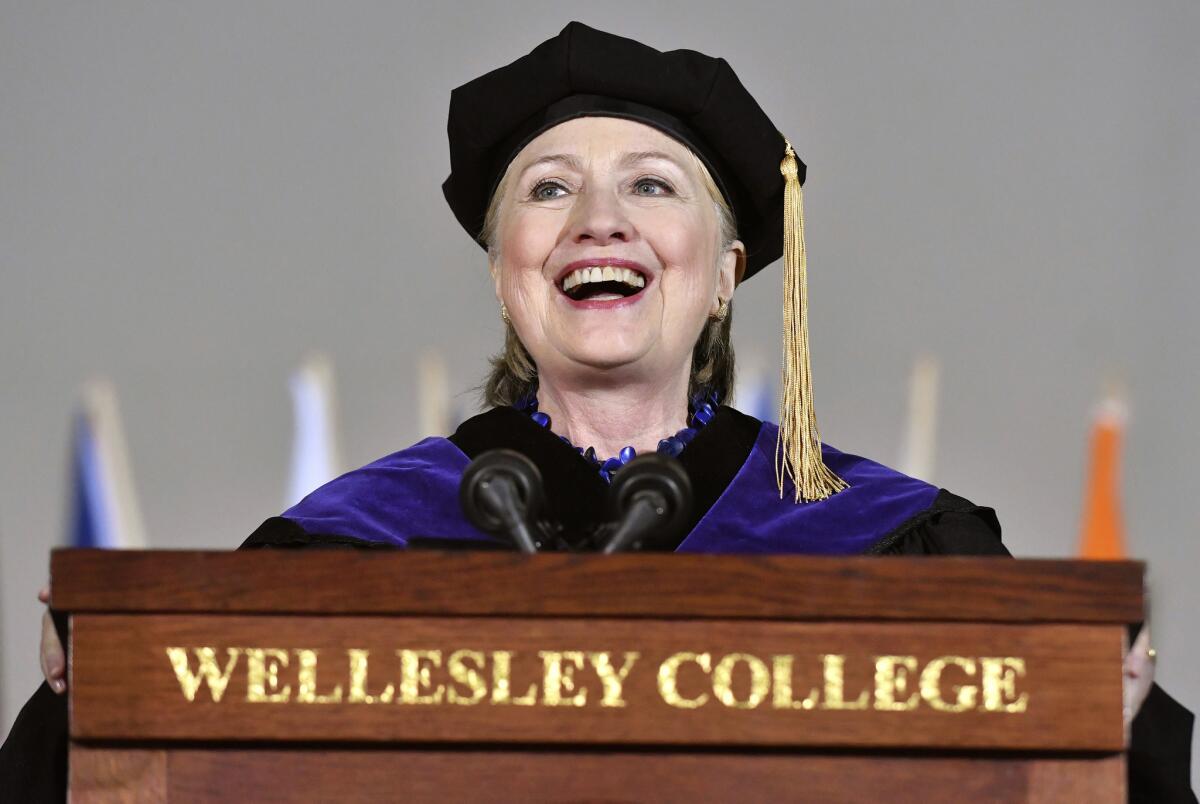
Hillary Clinton delivered a subtle dig at President Trump on Friday, offering some parallels between his presidency and that of former President Nixon.
While delivering a commencement address at her alma mater, Wellesley College, a private women’s liberal arts school in Massachusetts, Clinton, without naming Trump, recalled how many young people in the 1970s reacted to Nixon’s reelection and later battles with the Justice Department.
“We were furious about the past presidential election of a man whose presidency would eventually end in disgrace with his impeachment for obstruction of justice,” she said, pausing to note she was referring to Nixon.
Actually, Nixon was not impeached, though many in Congress, including members of his own party, called for it. Clinton said Nixon’s resignation came after he fired “the person heading the investigation into him at the Department of Justice.”
In 1973, Nixon ordered Justice Department officials to fire a special prosecutor who was looking into taped conversations recorded in the Oval Office as part of the Watergate investigation. A year later, in August 1974, Nixon resigned.
Some political observers – mostly Democrats -- have compared Trump’s recent firing of FBI Director James B. Comey, who was overseeing an investigation of possible collusion between Russians and Trump’s campaign, to Nixon’s actions. Last week, Rep. Al Green (D-Texas) called for Trump to be impeached.
Clinton, who has made few public appearances since Trump defeated her in last year’s presidential election, also assailed the Republican’s new budget proposal.
She called the budget, which proposes cuts to education and Medicaid, “an attack of unimaginable cruelty on the most vulnerable among us — the youngest, the oldest, the poorest and hard-working people who need a little help to gain or hang on to a decent, middle-class life.”
In a statement, the Republican National Committee said Clinton was “lashing out” after her election loss.
Clinton graduated from Wellesley in 1969 and last delivered a commencement address at the school in 1992.
At G-7 Summit, a day of clarification for the White House
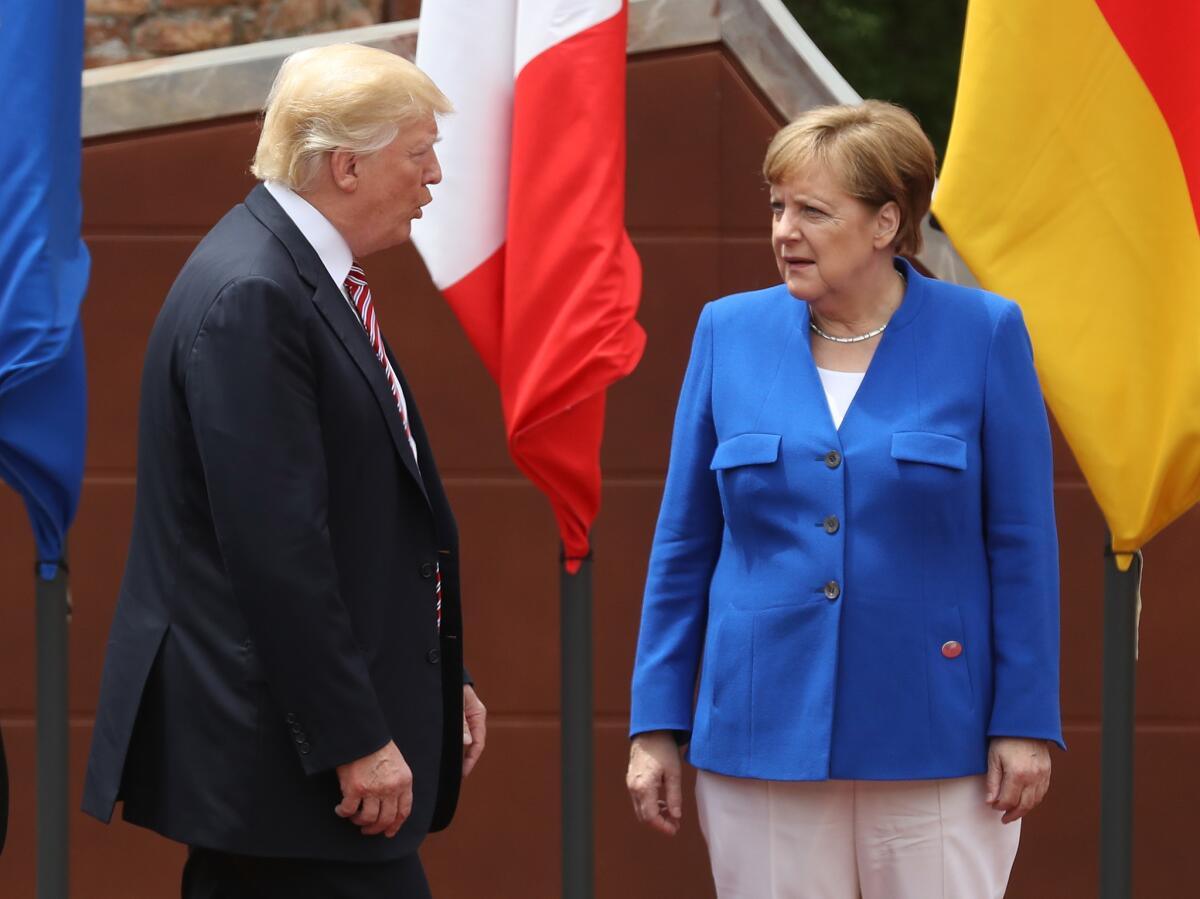
As President Trump met with leaders of the world’s leading economies here Friday within miles of an active volcano, the White House was working to ease a pair of diplomatic eruptions.
Trump was due to meet with British Prime Minister Theresa May on the sidelines of the G-7 Summit in this coastal Sicilian resort town, amid tensions between their countries, longtime allies, following leaks to U.S. media outlets involving Britain’s investigation of the Manchester terrorist bombing.
Separately, a top White House adviser partially confirmed reports that Trump had said Germany is “very bad” during Thursday’s NATO meetings in Brussels, but clarified that the president was referring only to German trade policies.
Trump said, according to the German magazine Der Spiegel, “See the millions of cars they are selling to the U.S.? Terrible. We will stop this.”
Gary Cohn, director of the National Economic Council, acknowledged that Trump made the remark but added that the president “doesn’t have a problem with Germany.”
“He said his dad is from Germany. He said I don’t have a problem with Germany, I have a problem with German trade,” Cohn said.
Press access to the G-7 meetings has been extremely limited, though the surrounding setting has produced abundant compelling visuals.
Trump tweeted that he expected to spend the day focused on economic growth, terrorism and security. The summit, and Trump’s eight-day inaugural foreign trip, ends Saturday.
Other allies here were likely to press Trump on another issue: climate change, specifically whether Trump will carry out his campaign promise to pull the United States out of the landmark Paris climate deal.
Trump was hoping to better understand the European position, Cohn said. White House officials have said the president will make a decision once he is back in the United States.
“He knows that in the U.S. there’s very strong opinions on both sides but he also knows that Paris has important meaning to many of the European leaders. And he wants to clearly hear what the European leaders have to say,” Cohn said.
As Trump wavers over Paris climate accord, European leaders give him an earful
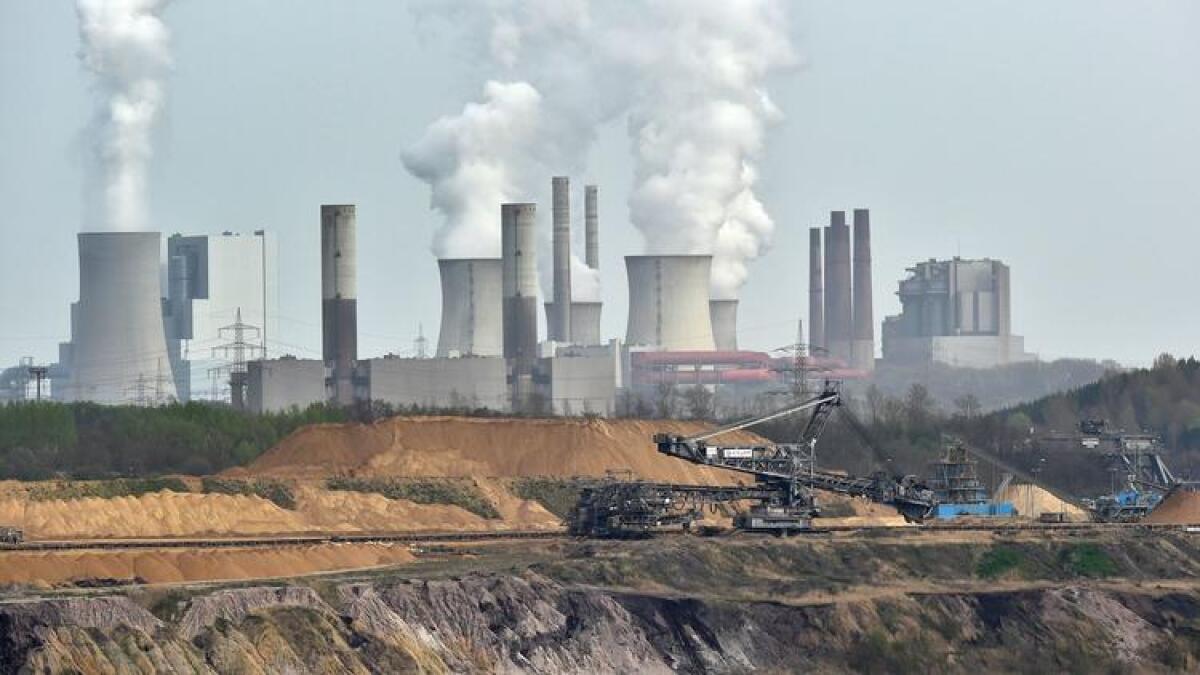
With President Trump balking on his vow to shred the Obama-negotiated Paris agreement on climate change, the last place the pact’s staunch opponents wanted to see the president is where he will be this weekend — meeting other world leaders unanimous in their warnings that withdrawal from the accord would seriously damage America’s economy and world stature.
Trump has repeatedly delayed fulfilling his campaign pledge to move against the agreement. The longer the White House deliberates over Paris, the more Trump seems to be searching for a face-saving excuse to walk back his previous position.
The White House indecision over the climate accord — which has the support of every nation except Syria and Nicaragua — reflects a deeply divided worldview in a Trump inner circle now packed with establishment Republicans.
The issue also presents yet another policy reckoning for Trump. On the campaign trail, he vowed to strike blows against the existing world order. But on the Paris agreement, as on other matters, he is finding that political backup for such pledges can fade quickly when the moves lack robust support from major U.S. companies or majority voting blocs.
Watch Live: Hillary Clinton delivers commencement speech at Wellesley College
Overcoming assault charge, Republican Greg Gianforte wins Montana congressional seat
Republican Greg Gianforte overcame a last-minute assault charge to win Montana’s special congressional election Thursday, keeping its lone House seat in GOP hands and dealing Democrats a setback in their bid to gain a red-state toehold ahead of the 2018 midterm election.
Gianforte, 56, a wealthy businessman who ran unsuccessfully for governor in November, had long been the front-runner against Democrat Rob Quist, a professional bluegrass musician making his first run for public office.
With more than 90% of the votes counted, Gianforte was holding a healthy lead with just over 50% support.
Appearing at an exuberant victory rally in Bozeman, the congressman-elect hushed the crowd and apologized to the reporter with whom he tangled on election eve, reversing his campaign’s initial assertion that the journalist was to blame.
FBI investigating Kushner meetings, report says; House leader seeks more Comey documents
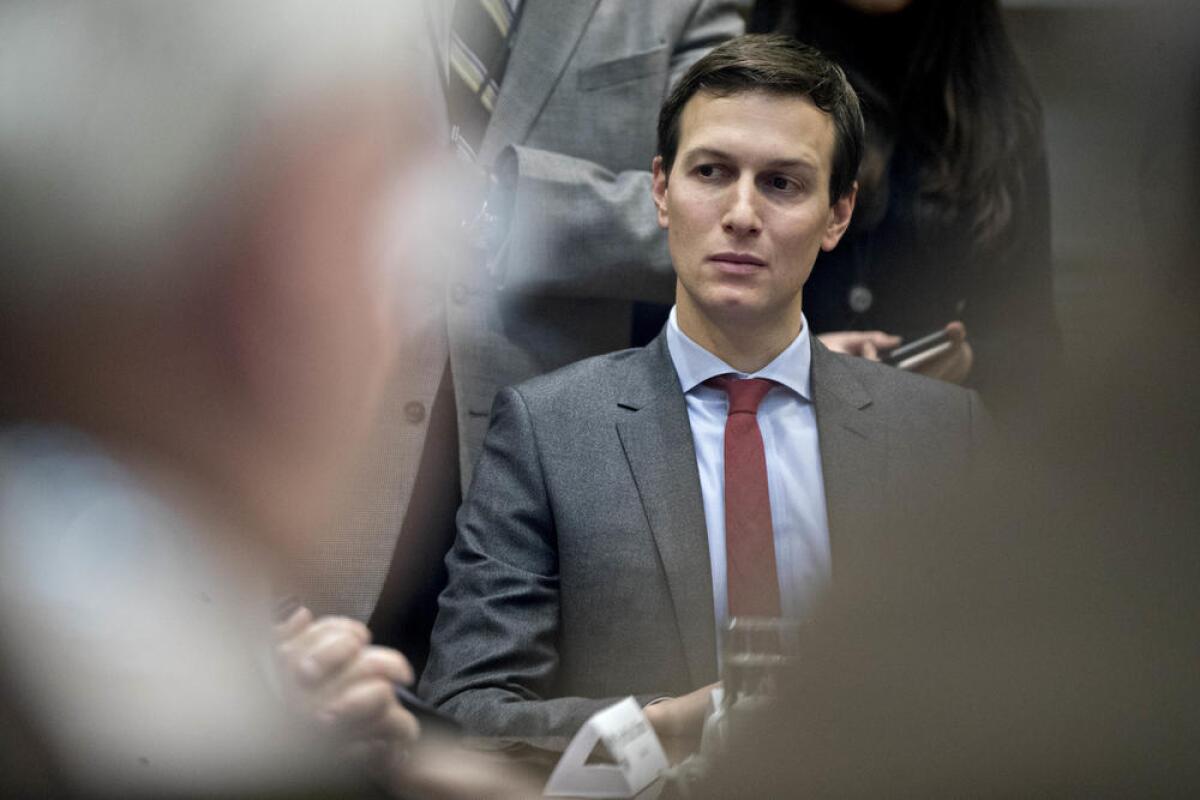
The chairman of the House Oversight Committee asked the FBI on Thursday to turn over more documents about former FBI Director James B. Comey’s interactions with the White House and Justice Department, including materials dating back nearly four years to the Obama administration.
Meanwhile, the Washington Post reported that the FBI is investigating meetings that President Trump’s son-in-law, Jared Kushner, had in December with Russian officials.
The FBI and the Oversight Committee — as well as several other congressional panels — are looking into Russian meddling in the 2016 presidential election and possible connections between Russia and the Trump campaign. Trump fired Comey on May 9 amid questions about the FBI’s investigation, which is now being led by special counsel Robert S. Mueller III, a former FBI director.
Kushner, a key White House advisor, had meetings late last year with Russia’s ambassador to the U.S., Sergey Kislyak, and Russian banker Sergey Gorkov.
The Post story cited anonymous “people familiar with the investigation,” who said the FBI investigation does not mean that Kushner is suspected of a crime.
Kushner’s attorney, Jamie Gorelick, released a statement saying: “Mr. Kushner previously volunteered to share with Congress what he knows about these meetings. He will do the same if he is contacted in connection with any other inquiry.”
Earlier Thursday, House Oversight Committee Chairman Jason Chaffetz told acting FBI Director Andrew McCabe that he wants records of Comey’s contacts with the White House and Justice Department dating to September 2013, when Comey was sworn in as FBI director under President Obama.
In a letter to McCabe, Chaffetz said he is seeking to review Comey’s memos and other written materials so he can “better understand” Comey’s communications with the White House and attorney general’s office.
Banks want higher debit-card ‘swipe fees,’ but an effort to allow them has crumbled
Banks had hoped Congress would let them charge merchants higher fees to process debit card purchases, but an effort to allow that has crumbled — a victory for retailers and, possibly, shoppers who might have had to shoulder those costs.
In the latest chapter of a long-running fight, a repeal of federal limits on so-called swipe fees no longer will be part of a House financial regulation bill, said the legislation’s author, Rep. Jeb Hensarling (R-Texas).
Hensarling, chairman of the House Financial Services Committee, said he decided to strip the provision from the bill because many lawmakers are balking at removing the limits.
Appeals court rules against Trump travel ban
A federal appeals court has ruled against President Trump’s travel ban, upholding a nationwide injunction barring the administration from enforcing the executive order.
The ruling is the latest legal setback for Trump on the travel issue and, like several previous court rulings, the outcome rested heavily on his own words.
Trump’s order restricting travel from six majority-Muslim countries “speaks with vague words of national security, but in context drips with religious intolerance, animus and discrimination,” Chief Judge Roger L. Gregory of the 4th Circuit Court of Appeals wrote in his ruling.
Read the 4th Circuit’s decision to uphold the block on Trump’s travel ban
The 10-3 ruling included numerous citations to campaign statements in which Trump called for a ban on Muslims immigrating to the United States. The plaintiffs who have challenged the travel order have argued that it is a disguised version of the Muslim ban that he called for during the campaign.
Trump’s statements “provide direct, specific evidence of what motivated both EO-1 and EO-2,” the court said, referring to ther first and second versions of the travel order: “President Trump’s desire to exclude Muslims from the United States.”
The 4th Circuit, based in Richmond, Va., is one of two appeals courts that have recently heard arguments on the travel ban. A similar case is pending before the 9th Circuit, based in San Francisco.
Obama, in Berlin with Merkel, says world ‘can’t hide behind a wall’
Hours before German Chancellor Angela Merkel flew to Brussels to meet with President Trump and other NATO heads of state, she rekindled an old acquaintance with Trump’s predecessor, Barack Obama.
About 70,000 people packed an avenue by Berlin’s landmark Brandenburg Gate on Thursday to hear the two leaders speak, with cheers and chants of “Barack, Barack!” breaking out when the former president took the stage.
Without mentioning Trump by name, Obama spoke of the need for universal healthcare and a nuanced approach to immigration in response to security threats.
“This is a new world we live in — we can’t isolate ourselves,” the former president declared, with Merkel looking on. “We can’t hide behind a wall.”
Obama spoke of this week’s deadly bombing at a pop concert in Manchester, England, saying leaders had to find ways to balance security fears and fundamental rights.
“One of the biggest challenges… is how do you protect your country and your citizens from the kinds of things that we just saw in Manchester,” he said. “And how do you do it in a way that is consistent with your values and your ideals?”
Making his first European speech since his presidential term ended, Obama told the crowd he had spent the last four months “trying to catch up with my sleep” and devoting more time to his family.
“I’m very proud of the work I did as president,” he said to more cheers, adding that he considered healthcare reform a signature achievement. Republicans are now in the midst of trying to dismantle his Affordable Care Act.
“My hope was to get 100% of people healthcare,” he said. “We didn’t quite achieve that, but we were able to get 20 million people healthcare who didn’t have it before.”
Obama’s speech was not timed to coincide with Trump’s first visit to Europe as president, aides said. The invitation was extended before Trump’s trip to Brussels — the fourth leg on multi-stop tour — was scheduled.
Macron says he pressed Trump on climate accord
French President Emmanuel Macron, who met President Trump for the first time on Thursday, said he urged the U.S. leader to respect the Paris climate accord.
The White House, however, did not mention the issue in its readout on Trump’s working lunch in Brussels with the newly elected French president.
Macron told reporters as he headed into the meeting that climate change would be one of the issues he raised, along with concerns about terrorism and the economy. Afterward, at a news conference, the French president said that in his talk with Trump, he “reiterated the importance” of the landmark climate accord.
“No hasty decision on this subject should be taken by the U.S.,” Macron said. “Our collective responsibility is to make sure this commitment remains a global commitment.”
Referring to the agreement, he added: “It’s one of a kind.”
In its readout, the White House said Trump urged Macron to meet NATO commitments on French defense spending and help ensure that the alliance is “focused on counter-terrorism.”
It also said the two leaders talked about the importance of defeating Islamic State and “other vital issues.”
Trump lawyers ask Supreme Court to reject 2nd Amendment claim by men who lost gun rights over nonviolent crimes
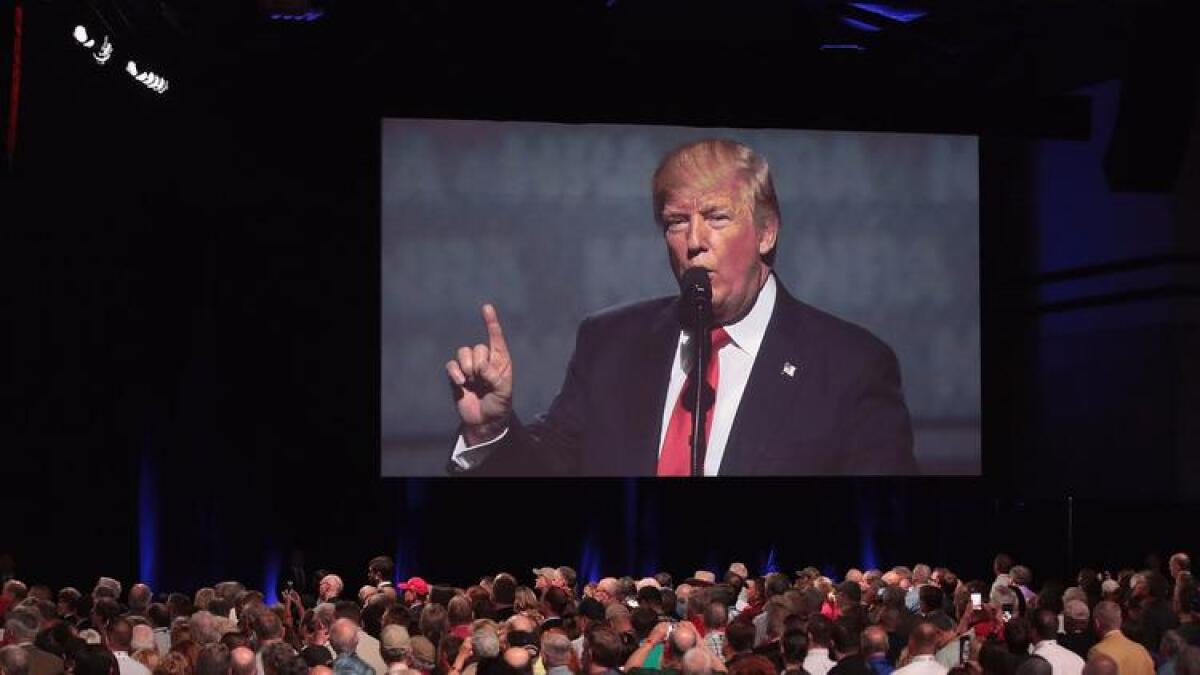
Trump administration lawyers are urging the Supreme Court to reject a 2nd Amendment claim that would restore the right to own a gun for two Pennsylvania men who were convicted more than 20 years ago of nonviolent crimes.
The case of Sessions vs. Binderup puts the new administration in a potentially awkward spot, considering President Trump’s repeated assurances during the campaign that he would protect gun ownership rights under the 2nd Amendment.
But the Justice Department under Trump has embraced the same position in this case that was adopted under President Obama: to defend strict enforcement of a long-standing federal law that bars convicted criminals from ever owning a gun, even when their crimes did not involve violence.
Former Sen. Joe Lieberman withdraws from FBI director search
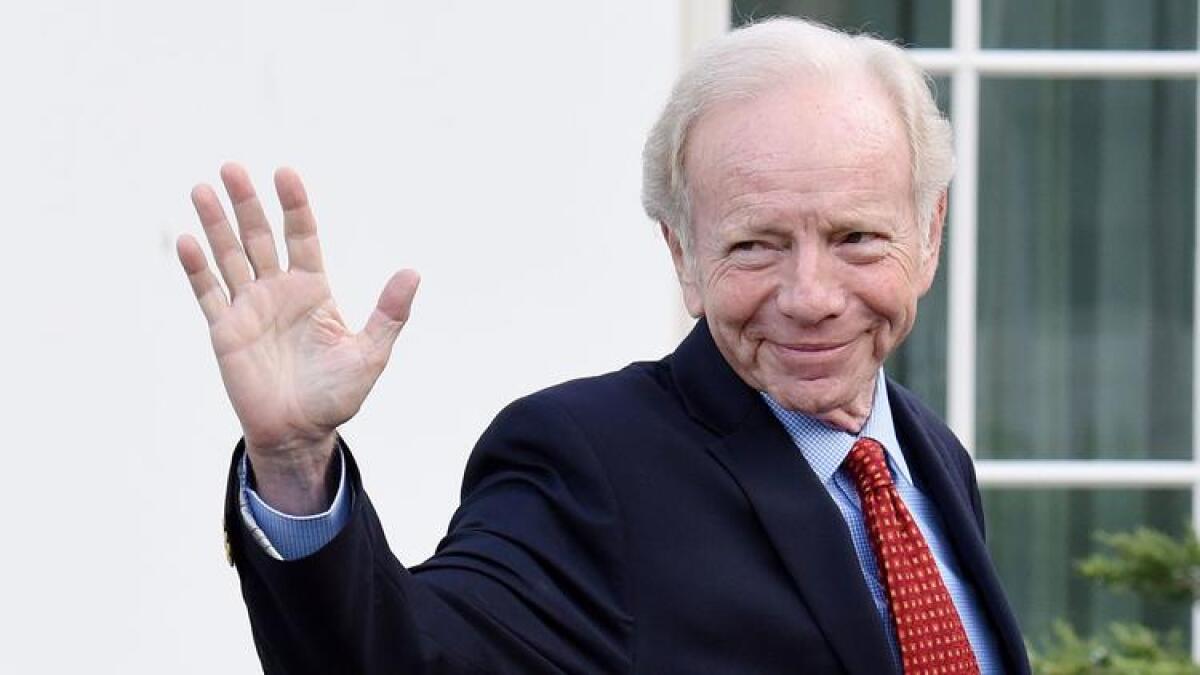
Former Sen. Joe Lieberman of Connecticut has withdrawn his name from consideration for the role of FBI director. Lieberman interviewed last week with President Trump, who publicly identified him as a leading candidate.
But in a letter sent to the White House, Lieberman says he’s pulling out.
He says he wants to avoid the appearance of a conflict of interest, given Trump’s hiring of one of Lieberman’s law partners to represent him in the investigation of ties between Russia and the Trump campaign.
The White House declined to comment. Several other people interviewed for the job have also withdrawn from consideration.
Trump fired former FBI Director James B. Comey earlier this month.
At NATO celebration, Trump tells allies to spend more on defense
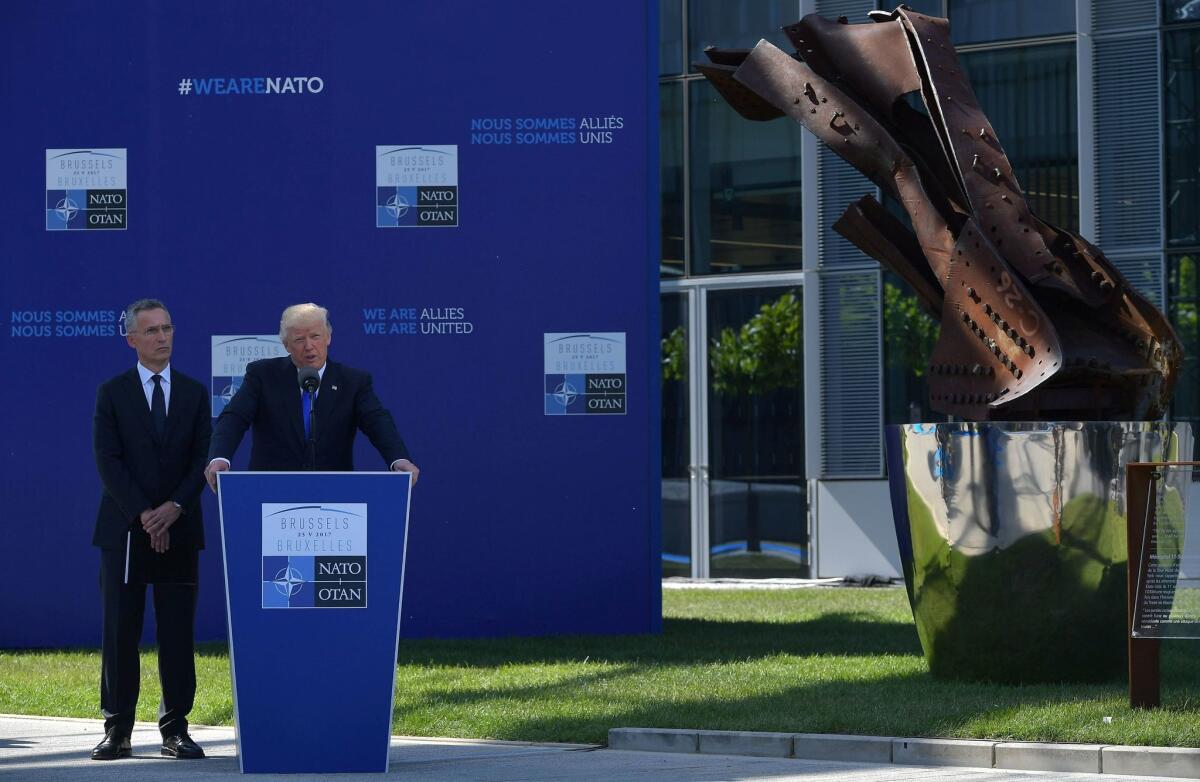
President Trump used his first NATO meeting to rebuke member nations who fail to meet the trans-Atlantic alliance’s defense spending target, saying American taxpayers unfairly are left to pick up the slack.
Speaking at dedication ceremonies for NATO’s new headquarters, Trump noted that the defense budgets of 23 of the 28 members don’t meet a target equal to 2% of each respective nation’s economic output, while the United States has spent more on defense in eight years than the other 27 combined.
“Many of these nations owe massive amounts of money from past years,” he said. “We have to make up for the many years lost.”
By his scolding, Trump was directly delivering to NATO allies the criticism that was a staple of his nationalist campaign for president. But his lecture came at an event intended to be celebratory, showcasing unity and resolve for the nearly 70-year-old alliance: the dedication of its shining, glass-enclosed new headquarters in Belgium’s capital.
The ceremony also was meant to call attention to the fact that the only time NATO has invoked its collective defense agreement was on behalf of the United States, after the Sept. 11, 2001, attacks on New York and Washington. Trump stood beside a section of wrenched steel from the downed World Trade Center Towers, a relic NATO calls the “Article V artifact,” to signify that post-9/11 invocation of the NATO charter’s article holding that an attack on any one member would be considered an attack on all.
Speaking to reporters before the president arrived, NATO Secretary-General Jens Stoltenberg acknowledged that the alliance had a “long way to go” to meet its goals.
“But it’s much better than it was just two years ago,” he said. “The reality is that when we decrease defense spending when tensions are going down, as we did after the end of the Cold War, we have to be able to increase defense spending when tensions are going up. And now we see that tensions are going up.”
Watch: Trump lectures NATO leaders on defense spending

As NATO leaders looked on, President Trump told NATO members that they must “finally contribute their fair share” of defense payments.
President Trump lectured members of the NATO alliance on Thursday, urging them to pay their fair share on defense.
As NATO leaders looked on during a ceremony at the alliance’s new headquarters, Trump said that member nations must “finally contribute their fair share” and meet their obligations.
The president has been urging NATO leaders to live up to a 2011 decision to increase spending on defense to 2% of GDP by 2024.
Trump said 23 of the 28 member nations are not paying what they should and that the situation is “not fair” to the people of the United States.
President Trump promises to review Manchester investigation leaks after anger from Britain
Trying to head off a diplomatic rift with Britain, President Trump on Thursday issued a statement promising “a complete review” of possible intelligence leaks related to this week’s deadly terrorist attack at a Manchester concert.
Some British officials have suggested that U.S. officials are leaking sensitive information to American media outlets about the investigation into the attack.
The New York Times posted forensic photographs collected from the scene of the Manchester concert bombing, which upset British officials. Whether the photographs were provided by U.S. officials or came from some other source is not publicly known.
Trump avoided questions earlier Thursday about the possible leaks. His statement came just before he was set to address NATO at its new headquarters in a speech considered pivotal to his first trip abroad as president. British Prime Minister Theresa May was expected to confront Trump over the issue when they meet later in the day.
May told reporters as she entered the NATO gathering that she would make clear to Trump that intelligence shared between law enforcement agencies “must remain secure.”
“We have a special relationship with the USA. It’s our deepest defense and security partnership that we have,” she said. “Of course that partnership is built on trust, and part of that trust is knowing that intelligence can be shared confidently, and I will be making clear to President Trump today that intelligence shared between law enforcement agencies must remain secure.”
In his statement, Trump said that “the alleged leaks coming out of government agencies are deeply troubling.”
“These leaks have been going on for a long time, and my Administration will get to the bottom of this. The leaks of sensitive information pose a grave threat to our national security.”
The statement continued with a promise to request “the Department of Justice and other relevant agencies to
launch a complete review of this matter, and if appropriate, the
culprit should be prosecuted to the fullest extent of the law.”
Trump also reiterated said there is “no relationship we cherish more” than the special relationship between the two countries.
Separate leaks within his own administration and related to investigations of his campaign ties to Russia have also been a source of anger to Trump.
Montana’s congressional election: that assault charge, the Trump factor, and why is it on a weird day (Thursday)?
It’s election day in Montana after a wild 24 hours, with voters deciding who will fill the House seat vacated when Republican Ryan Zinke left to head the Interior Department under President Trump.
The contest Thursday has drawn nationwide attention and an extraordinary amount of money — and that was before the GOP front-runner was accused of attacking a national political reporter.
The events have turned the contest into one of the strangest in memory.
Trump ignores questions about intelligence sharing ahead of NATO meeting
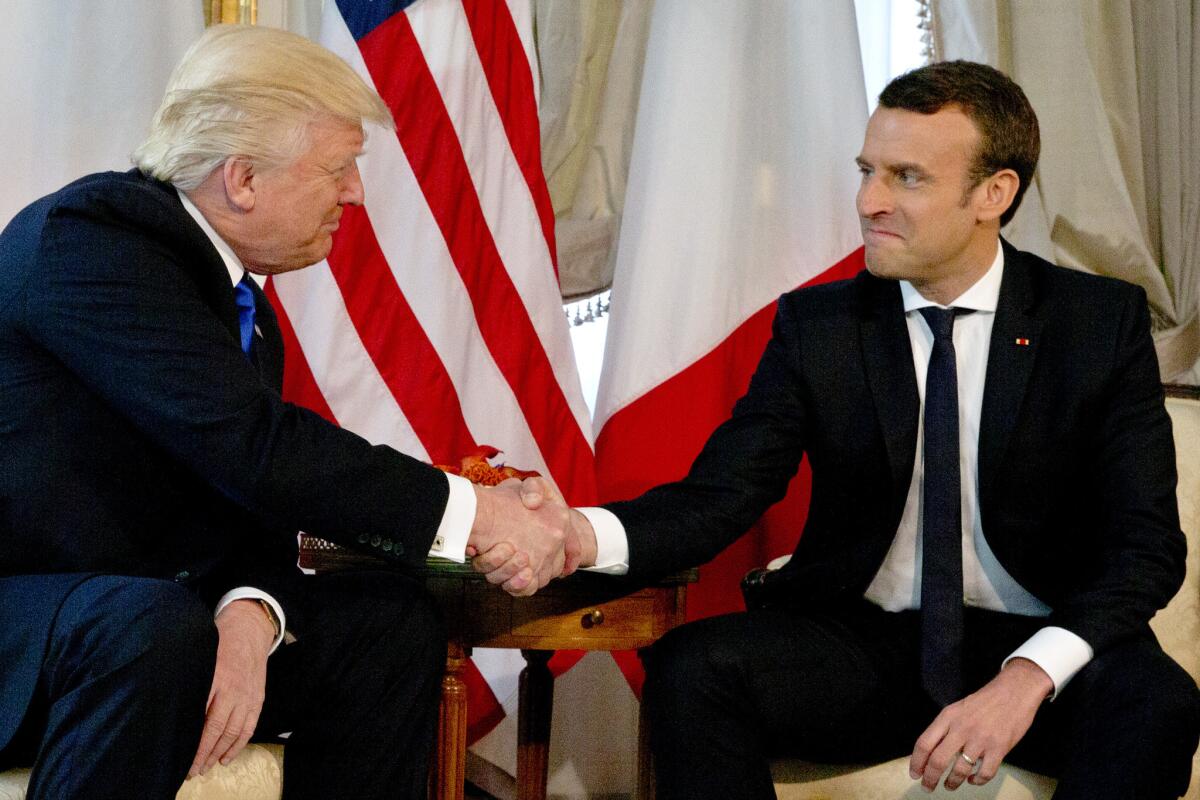
President Trump refused to answer questions Thursday about concerns among key allies on intelligence sharing with the United States, just as he prepares to join many of them here to inaugurate the new NATO headquarters.
During a brief photo opportunity at his first meeting with Emmanuel Macron, France’s newly elected president, Trump for a second time remained silent as a reporter asked about a potential breakdown in the U.S.-United Kingdom intelligence-sharing relationship.
British Prime Minister Theresa May is expected to press Trump on the issue when they meet later Thursday, after the New York Times posted forensic photographs collected from the scene of the Manchester concert bombing. The acting U.S. ambassador to Britain told the BBC that the leaks were “deeply distressing.”
Speaking to reporters at the site of a NATO leaders meeting, Canadian Prime Minister Justin Trudeau also deflected questions about whether the incident has led him to reevaluate his nation’s intelligence-sharing arrangements.
“We will continue to work with all our allies to keep Canadians and all citizens around the world safe,” he said.
Ahead of a working lunch with Macron, Trump said terrorism was at the top of the agenda, while also offering his congratulations to the 39-year-old for his “tremendous victory.”
“All over the world, they’re talking about it,” he said.
In addition to terrorism and the economy, Macron said he planned to discuss climate change and energy. His nation hosted the climate summit that produced the agreement under which countries pledged to reduce their carbon emissions, of which the Trump administration is considering dropping out.
Trump also ignored a question about whether former national security advisor Michael Flynn should cooperate with the investigations into Russian meddling in the 2016 presidential election. Trump has no news conference scheduled with reporters for the entirety of his eight-day foreign trip, which ends Saturday.
Trump visits European Union headquarters; EU leaders cite some differences
Donald Tusk, the president of the European Council, said Thursday that differences remain between the Trump administration and the European Union on Russia, energy and trade.
“I am not 100 percent sure that we can say today… that we have a common opinion about Russia,” Tusk, a former Polish prime minister who is sometimes called “the other Donald,” said after a meeting with President Trump at EU headquarters.
Tusk added that while some issues “remain open, like climate and trade,” the leaders agreed “first and foremost” on the need to combat terrorism.
EU officials were skeptical in advance of Trump’s visit. Their concerns were driven in part by the U.S. leader’s positive stance on Britain’s vote last year to leave the bloc. Trump at the time called it a “great idea.”
However, he has since spoken of the importance of European unity.
European officials are also concerned that the Trump administration might withdraw from the 2015 Paris climate agreement to limit global warming, and turn away from trade arrangements with the EU.
Trump’s visit to Brussels marked the fourth leg of his first overseas trip. Before heading into the talks with Tusk and European Commission President Jean-Claude Juncker, he spoke enthusiastically about his earlier stops in Saudi Arabia and at the Vatican.
His ceremonial welcome last week in the Saudi capital of Riyadh, Trump told the European officials, was “beyond anything anyone’s seen.” The Saudis staged elaborate festivities including a traditional sword dance.
And the president called his private encounter with Pope Francis on Wednesday “very impressive.” The president and the pontiff met privately for half an hour, and Francis presented Trump with gifts including a copy of a papal encyclical on climate change.
“The pope was terrific,” Trump said.
After the visit to the EU’s sprawling new headquarters, Trump headed to a luncheon with the newly elected French president, Emmanuel Macron. The two men were meeting for the first time.
During the French presidential campaign, Trump had praised Macron’s far-right opponent Marine Le Pen for her tough positions on immigration and borders, but he had stopped short of endorsing her.
Manchester attack makes terrorism the focus of Trump’s NATO meeting
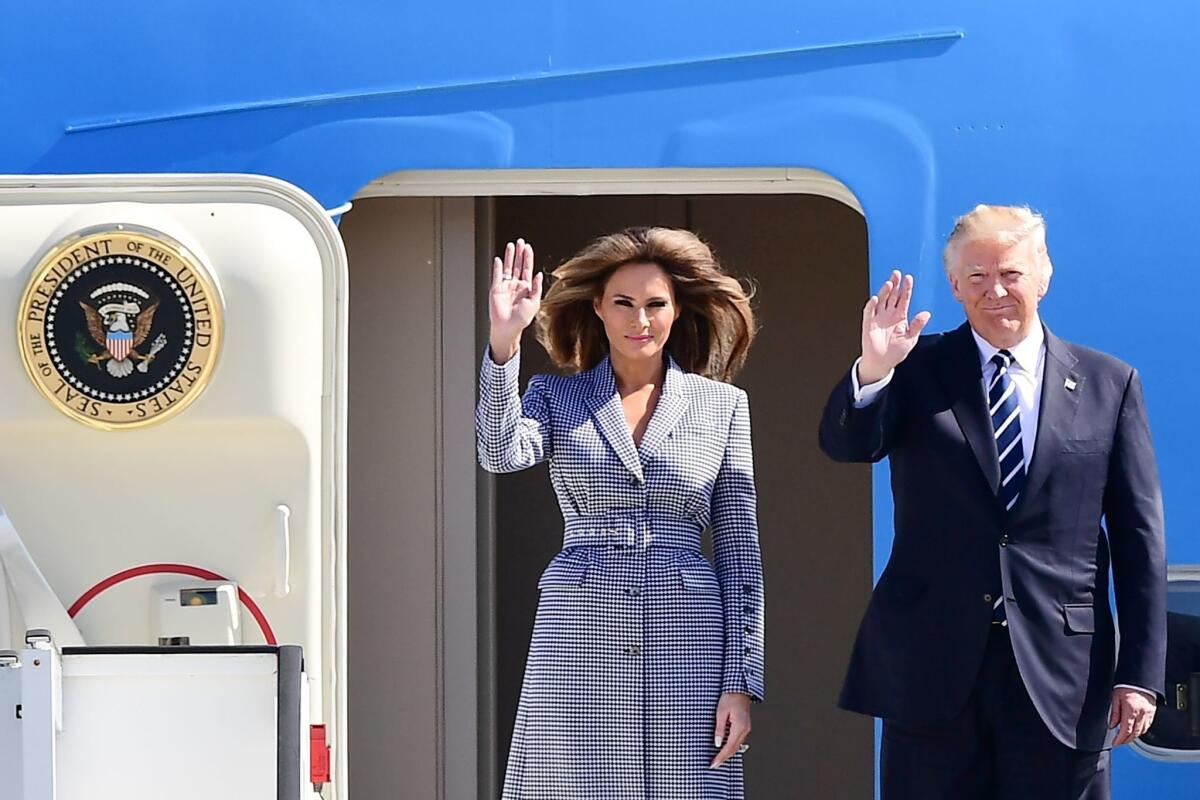
The deadly suicide bombing in Britain and threats of more attacks thrust counter-terrorism to the top of President Trump’s agenda for talks with NATO leaders here on Thursday, buttressing his bid to enlist the alliance he had called obsolete to join the fight against Islamic State.
Secretary of State Rex Tillerson, anticipating the alliance meetings, told reporters flying with the president to Brussels from Rome, where Trump met Pope Francis earlier Wednesday, that Monday’s attack in Britain “is going to strengthen the resolve in this fight against terrorism.”
Tillerson stopped short of predicting that NATO would agree to formally join the U.S.-led coalition fighting Islamic State in Syria and Iraq, but said it “would be a really important step” if the alliance did so.
The attack, which killed 22 people at a pop concert and was said to be the work of a 22-year-old British man whose family is from Libya, also figured in Trump’s brief meeting with the pope at the Vatican.
Some quick analysis of the CBO’s report on the Republican healthcare bill
The Times’ Cathleen Decker is looking through the Congressional Budget Office’s report on the American Health Care Act, the Republican healthcare bill that has passed the U.S. House and is also known as AHCA. Here are a few takeaways.
Analysis says 23 million more people would be uninsured by 2026 under GOP healthcare bill
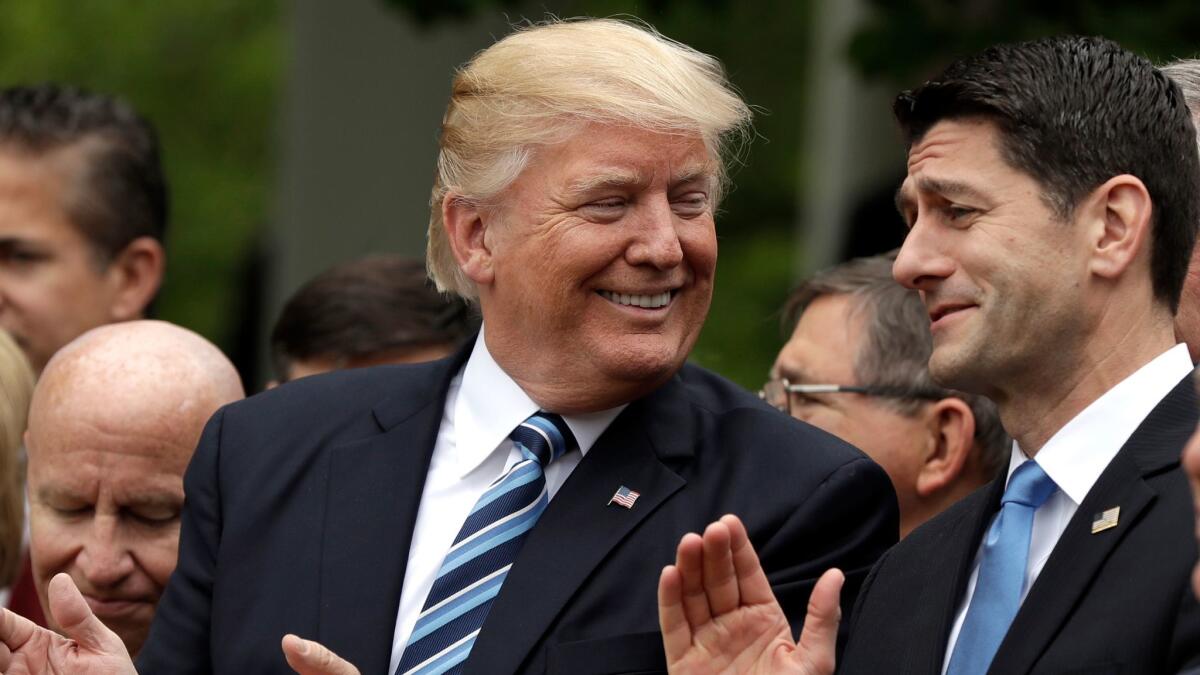
An analysis released Wednesday by the nonpartisan Congressional Budget Office finds that the Republican healthcare bill that passed the House earlier this month would nearly double the number of Americans without health insurance over the next decade.
The report likely will complicate Republican efforts to get the controversial bill through the Senate.
By throwing America’s lot in with Sunni Arabs, does Trump miss opportunities with Iran?
On his first official trip to the Middle East, President Trump has resoundingly thrown America’s lot in with Sunni Arab states and cast Shiite Iran as a global pariah, even as Iranians reelected a president who has offered to work with the West.
During his two days in Riyadh, Trump’s full-throated support for the autocratic monarchies in Saudi Arabia and other Gulf states, as well as his fierce denunciation of Iran, allowed him to claim an historic new coalition of interests.
In the next two days, in Jerusalem, he doubled down and argued that Israel and the Arabs should join forces against Iran and along the way, resolve Israel’s conflict with Palestinians in a grand bargain that has eluded diplomats for decades.
But as he departed for Rome on Tuesday, Trump had little to show beyond lofty rhetoric, symbolic visits and a shower of flattery from kings, potentates and a prime minister.
Fed officials appear ready for another interest rate hike and are considering how to reduce assets
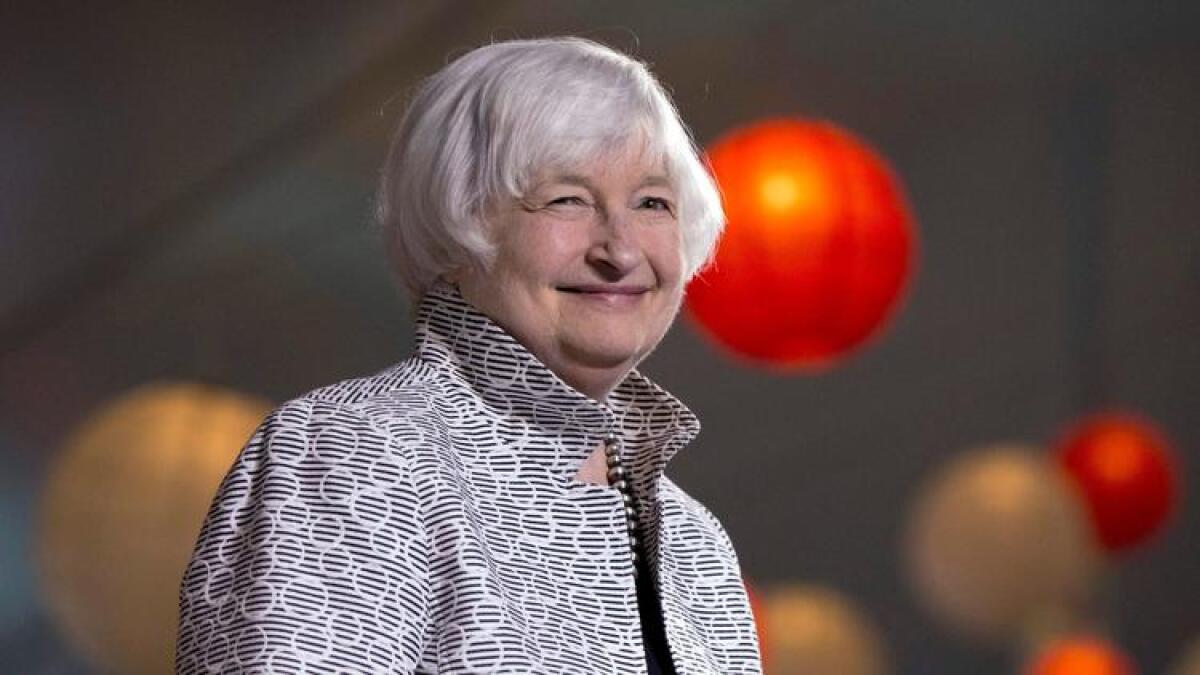
Most Federal Reserve monetary policymakers indicated they were ready for another small interest rate hike -- perhaps as soon as next month -- if economic data strengthened as expected following a weak winter, according to an account released Wednesday of their most recent meeting.
Fed officials also considered a plan to start reducing the $4.5 trillion in Treasury and mortgage securities and other assets the central bank has purchased since 2008 in an attempt to stimulate the economy.
The plan, which they said likely would begin later this year, would involve slowly allowing some of the maturing securities to be cashed in instead of reinvesting the money in new securities, the meeting minutes showed.
The goal would be to avoid roiling financial markets and causing interest rates to jump.
So what’s with the president and Melania Trump holding, or not holding, hands?
First Lady Melania Trump does not say much in public, but her actions seemed to speak louder than words – or at least sent tongues wagging – when she appeared to rebuff the president’s proffered hand as the couple descended from their plane in Rome late Tuesday.
As President Trump looked to take her hand on the steps of Air Force One, Melania Trump quickly moved it out of reach, raising it to her head to adjust her hair.
That made for two such episodes in two days. She had appeared to brush Trump’s hand away at the airport in Tel Aviv during the previous stop in the president’s foreign tour. Video of that scene, often accompanied by snarky commentary, quickly went viral.
Compare that to Melania Trump’s positively hands-on visit on Wednesday to a Rome children’s hospital, Bambino Gesu, following the couple’s visit with Pope Francis.
After praying to a statue of the Madonna at the entrance to the hospital, the Catholic first lady smiled cheerfully and chatted to children, posing for selfies and providing a “very happy, maternal presence,” according to one onlooker.
“Great visiting you! Stay strong and positive! Much love, Melania Trump,” she wrote in the visitors’ book.
Staff at the hospital said Melania Trump had been buoyed by her meeting with Pope Francis, and further proof came when photos emerged of the Trumps’ quick visit to the Sistine Chapel on Wednesday.
As the president and first lady stood together to admire Michelangelo’s 16th century fresco, the Last Judgment, they held hands.
House Intelligence Committee will subpoena Michael Flynn, Schiff says
The House Intelligence Committee is preparing to issue subpoenas to President Trump’s former national security advisor, Michael Flynn, according to the committee’s ranking Democrat, following the lead of the Senate Intelligence Committee.
Rep. Adam Schiff (D-Burbank) said the House subpoenas “will be designed to maximize our chance of getting the information we need” for the committee’s investigation of Russian meddling in the 2016 presidential campaign.
“I think we need to use whatever compulsory [processes] necessary to get the information that he possesses,” Schiff said.
Earlier this week, Flynn’s lawyers said he would refuse separate Senate subpoenas for any records about his former business dealings with Russia, citing his constitutional right to avoid self-incrimination.
The Senate committee then issued separate subpoenas to two of Flynn’s businesses, which the panel said were not entitled to 5th Amendment protections.
A federal grand jury in Virginia also has issued subpoenas regarding Flynn’s business dealings with Turkey and Russia, and the newly appointed special counsel investigating the Russia matter, Robert Mueller III, is expected to focus on Flynn’s role as well.
Given the criminal investigations, Schiff said the House panel is highly unlikely to grant Flynn’s earlier request, through his lawyers, for immunity in exchange for his testimony.
He said the panel would need more information about what Flynn would say and whether the testimony would be truthful. It also would need to ensure that granting immunity wouldn’t affect the special counsel’s ongoing investigation, he said.
“That’s not somthinge I think we would entertain until far later, if at all,” said Schiff, a former prosecutor. “Certainly count me as very skeptical that we would get to that point.”
Trump forced Flynn to resign as national security advisor in February after news accounts revealed Flynn had misled White House officials, including Vice President Mike Pence, about his contacts with Russian officials.
Schiff spoke to reporters at a breakfast Wednesday hosted by the Christian Science Monitor.
Watch live: Education Secretary Betsy DeVos testifies on Trump’s budget
Follow live coverage from Times education reporter Joy Resmovits:
Israel acknowledges ‘pinpoint’ change needed after Trump intelligence disclosure
After a week of silence, Israel publicly acknowledged for the first time, though in oblique terms, that it was the source of sensitive intelligence that President Trump shared with Russian Foreign Minister Sergey Lavrov last week in a White House meeting.
Defense Minister Avigdor Lieberman told Israel’s army radio on Wednesday that Israeli officials had carried out an internal “pinpoint correction” after discussing and reviewing the episode.
Lieberman did not elaborate, and declined to confirm or deny whether Trump’s remarks had endangered an agent of Israel. But he said his government considered the matter resolved.
“Everything that needed to be clarified with the friends in the U.S. was done,’’ he said. “All of the conclusions we had to draw – it was all done.’’
The Israeli defense minister’s comments came the day after Trump wrapped up a two-day visit to Israel and the West Bank. When word of Trump’s disclosure to Lavrov emerged in U.S. news reports last week, the defense minister and other Israeli leaders confined themselves to expressing public confidence in the two countries’ intelligence cooperation.
Israel did not comment more directly, presumably to avoid embarrassing the U.S. president just before his visit. But Trump himself mentioned the controversy anyway, in an awkward on-camera moment during the trip.
With Prime Minister Benjamin Netanyahu biting his lip alongside, Trump volunteered to reporters being hustled out of a news appearance: “Just so you know, I never mentioned the word or name ‘Israel.’ Never mentioned it during the conversation.”
News reports, however, had not said the president mentioned Israel in connection with the intelligence, only that the specificity of his remarks to Lavrov would in all likelihood have allowed the Russians to determine the source.
The White House at first denied Trump’s disclosure to Lavrov had occurred as reported, but then the president himself tweeted about it, saying he had the right to share information as he deemed fit.
Trump calls meeting with Pope Francis an ‘honor’
President Trump held a half-hour private meeting with Pope Francis at the Vatican on Wednesday, declaring it a “great honor” despite their past public dissension.
The unconventional Republican and the first Jesuit pontiff made for an unlikely pair in the Vatican’s Apostolic Palace, where Catholic leaders have presided or centuries and American presidents have come or decades.
Francis was silent as the two sat across one another at the pope’s wooden desk to begin the audience at approximately 8:30 a.m. local time. Exactly a half-hour later, the ringing of a bell signified the end of the private encounter.
For the White House, the Vatican stop caps a tour through key sites of the world’s three major religions, following stops in Saudi Arabia and Israel, designed to promote tolerance and a united approach to terrorism.
“When you put it all together, you’re really showing that this problem of radical extremism is one of the great problems of our time,” a senior Trump aide told reporters Tuesday en route from Israel to Rome, briefing anonymously as is common White House practice. “By putting everybody together you can really build a coalition and show that it’s not a Muslim problem, it’s not a Jewish problem, it’s not a Catholic problem, it’s not a Christian problem, it really is a world problem.”
In an exchange of gifts after their private meeting, Francis offered the president a medal by a Roman artist of an olive, a symbol of peace.
“We can use peace,” Trump responded.
Where Trump’s and Francis’ interests may align on peace and combating terrorism, they disagree sharply on issues like immigration and poverty.
Like Trump, the Argentine pope has shown a predilection for unscripted comments that have shaken the staid Vatican bureaucracy, as when he criticized candidate Trump’s proposed stricter immigration policies including a border wall as “not Christian.” Trump fired back, calling the pope’s remarks “disgraceful.”
Any animosity was not apparent Wednesday, as a meeting between Francis and a larger U.S. delegation ended.
“Thank you. I won’t forget what you said,” Trump said.
Proposed budget would deeply cut State Department and its programs
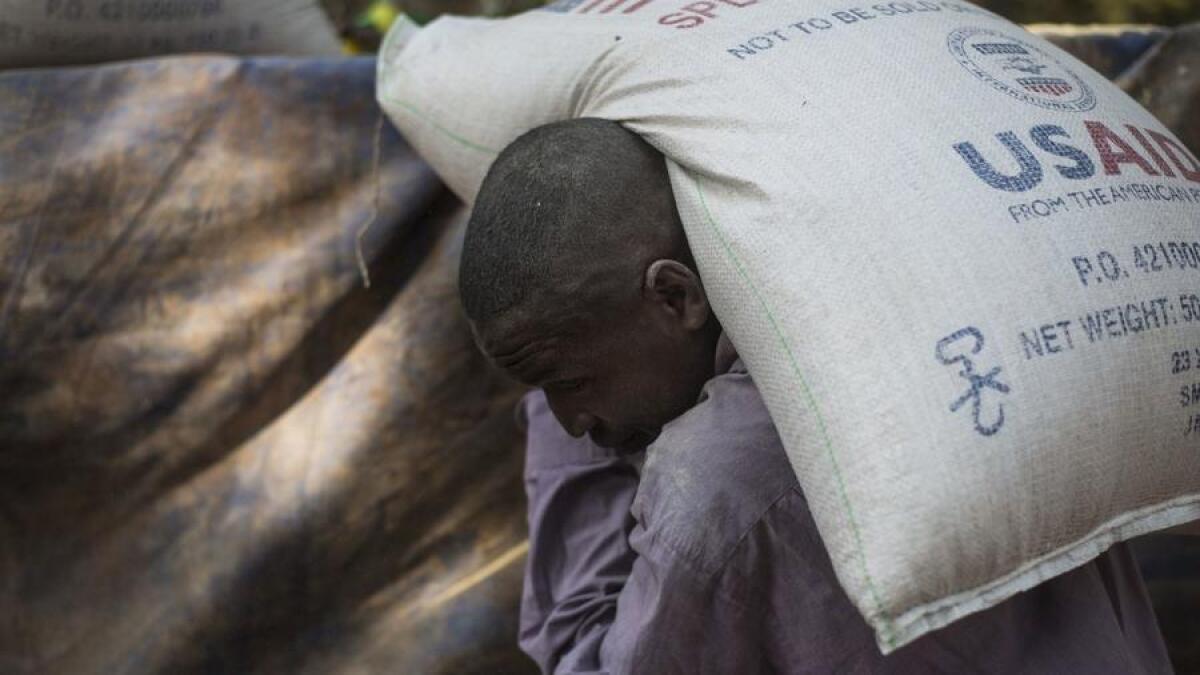
The State Department leadership voiced support for President Trump’s proposed budget, which would impose deep cuts on spending for diplomacy and foreign aid, but critics vowed to fight to restore the funds in Congress.
In a statement, the department said the president’s $37.6-billion request for it and for the U.S. Agency for International Development would support “a leaner, more efficient government” in line with Trump’s “America first” mantra.
If approved by Congress, that would represent a reduction of roughly 30% from the current fiscal year.
Nongovernmental agencies that receive State Department support to carry out humanitarian and other work around the globe expressed deep alarm.
The State Department statement said its new priorities would include efforts to counter terrorism, support Israel, promote border security and battle transnational crime and the spread of infectious diseases.
The statement makes no mention of women-empowerment programs or efforts to fight climate change, issues that rose to prominence under the Obama administration.
The proposed budget would allow the United States to “remain engaged” in the United Nations, but officials would seek a “more fair distribution of the funding burden,” the statement said.
And it would eliminate “direct funding for quasi- and non-governmental organizations that serve niche missions.”
The American Jewish World Service, which fights poverty all over the world through 450 local organizations, said much of its work would be jeopardized.
“At a time when poverty, human rights abuses, famines and conflicts are wreaking havoc globally,” said the group’s president, Robert Bank, “the United States must not abdicate its long bipartisan tradition of providing development assistance and diplomatic support to the most vulnerable people around the world.”
Mercy Corps, a U.S.-based development and advocacy organization that works in 40 countries, said “gutting development programs” was “short-sighted” and “absolutely shameful” and could put millions of lives at risk.
Rep. Eliot Engel (D-N.Y.), ranking member of the House Committee on Foreign Affairs, called the budget “cruel and mean-spirited” and said it would force the United States to abandon “our global role as a champion for freedom, democracy and the rule of law.”
“If President Trump thinks the United States can shrink into a defensive crouch without long-term repercussions, he’s sorely mistaken,” Engel said.
Subpoenas issued for Flynn’s businesses; contempt charge remains an option, senators say
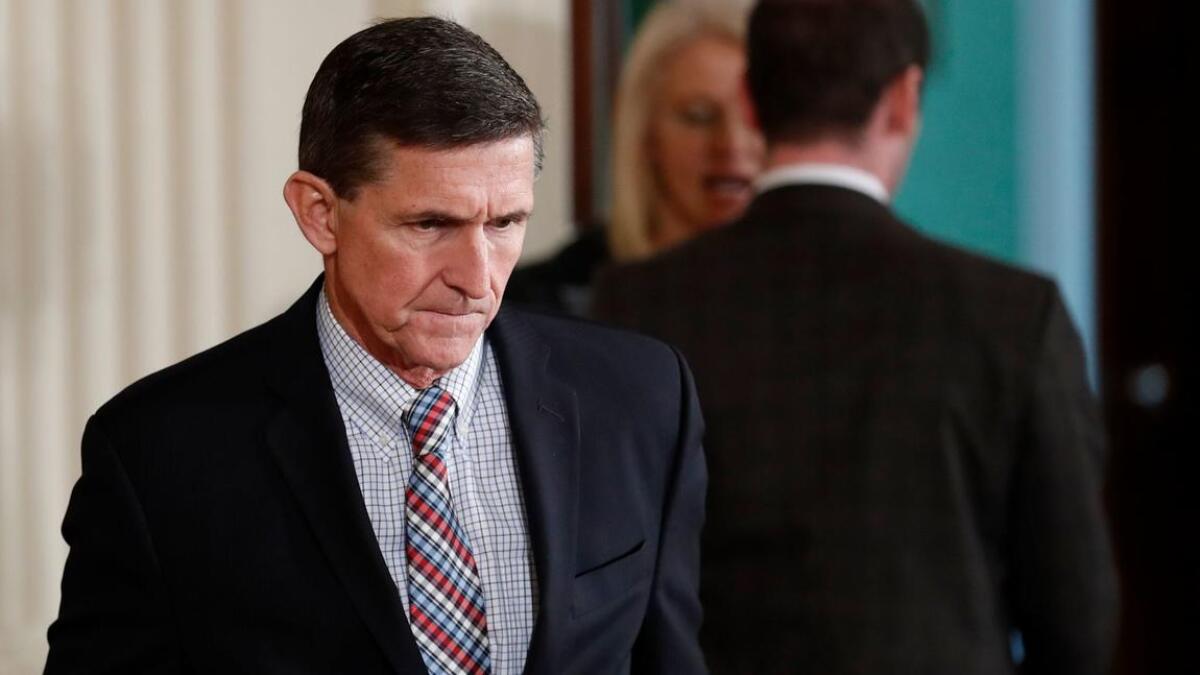
The Senate Intelligence Committee issued two subpoenas Tuesday for Michael Flynn’s businesses after President Trump’s former national security advisor refused to testify before the panel.
Chairman Richard Burr (R-N.C.) and Vice Chairman Mark Warner (D-Va.) announced their decision as the committee continues to pursue Flynn’s assistance in the probe of Russian interference in the 2016 election and possible links to Trump’s campaign.
Warner said the subpoenas to Flynn Intel LLC and Flynn Intel Inc. were being issued on the premise that companies cannot similarly invoke the 5th Amendment right not to testify, as the former NSA chief did.
The panel’s action came at the close of an intense day of testimony on Capitol Hill as former CIA Director John Brennan appeared before the House Intelligence Committee and Dan Coats, who is Trump’s director of national intelligence, appeared before a Senate panel.
Coats was also being invited to appear before the Senate Intelligence Committee, Warner said.
Trump forced Flynn to resign in February over the former general’s failure to disclose to White House officials the details of his interactions with Russian officials. The New York Times has since reported that the White House knew before naming Flynn to the post that he was under federal investigation for his secret lobbying for Turkey.
Flynn, who often warmed up the crowds at Trump campaign rallies, has been central to the Russian probe because of his contacts with Russians during and after the presidential campaign.
The committee also sent Flynn’s lawyer a letter Tuesday pushing back on his reasons for not sharing documents with the committee as it pursues his testimony.
Burr reiterated that while the panel preferred not to hold Flynn in contempt “everything is on the table.”
“That’s not our preference today,” Burr told reporters. “We would like to hear from Gen. Flynn. We’d like to see his documents. We’d like him to tell his story because he publicly said I’ve got a story to tell.”
Sessions’ first proposed budget: A crackdown on immigration and violent crime
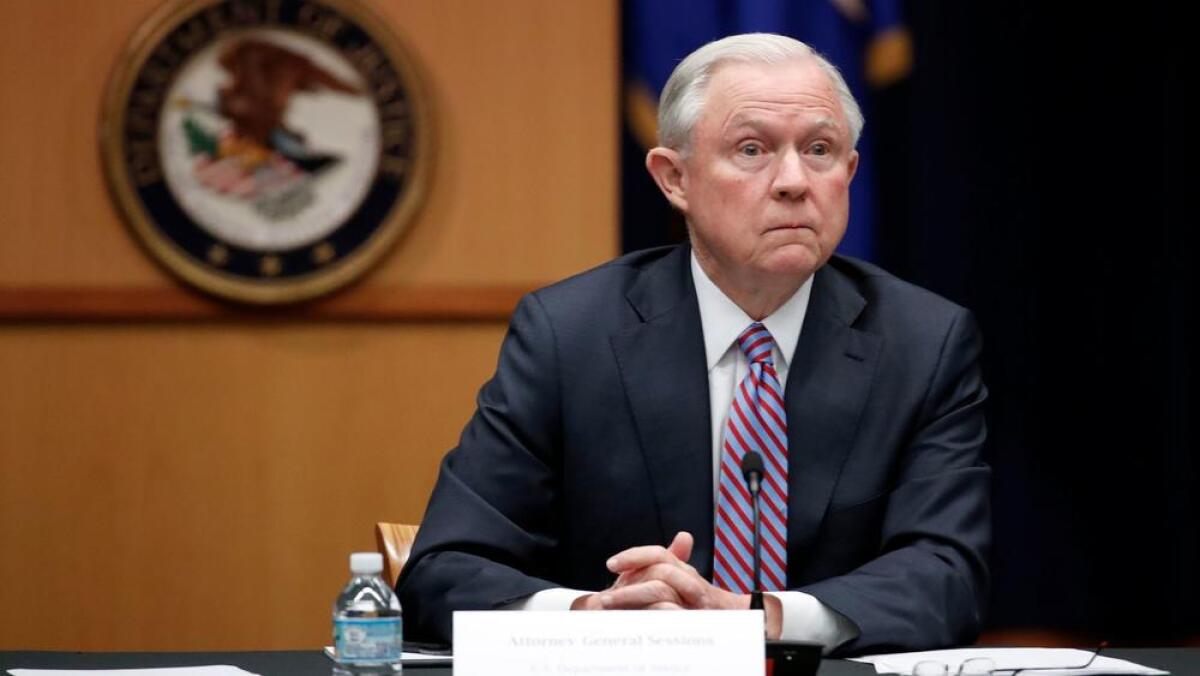
In the first budget proposal under President Trump and Atty. Gen. Jeff Sessions, the Justice Department is seeking hundreds of millions in new funding to pay for an immigration crackdown on the border and a surge in resources to fight violent crime.
Like the Department of Homeland Security budget, which includes billions for expanded immigration detention, more border agents and technology to catch those crossing the border illegally, the Justice Department budget is a reflection of the new get-tough policies promised by Sessions. The budget asks for another 300 federal prosecutors – 230 to focus on violent criminals and gangs, and another 70 to concentrate on filing criminal charges on those crossing the border illegally.
The shift in the spending priorities are in line with other policy changes ordered by Sessions, including a renewed focus on seeking stiff mandatory minimum sentences for drugs and other crimes.
The $27.7-billion budget seeks 450 new attorneys and support workers for the immigration courts, which are now clogged with a backlog of 560,000 cases. There would also be another $50 million for increased immigration detention, plus 40 new U.S. marshal jobs to help take care of the expected increase in immigrants heading to federal court.
With Trump’s immigration initiatives tied up in federal court, the budget seeks another 15 lawyers to handle that litigation, plus 12 more to help handle property acquisition needed for Trump’s promised Southwestern border wall.
Violent-crime enforcement would get another $198 million, with the largest amount, $70 million, going toward setting up more anti-violence and gang task forces. Deputy Atty. Gen. Rod J. Rosenstein said more resources are needed because of what he called an “alarming increase” in the rates of murder and other violent crimes. The department is also asking for another $40 million for more drug enforcement to combat the opioid epidemic, which he said is spreading “havoc throughout the United States.”
Sessions’ new policies should lead to an increase in prison population, so the budget contains funding to fully open a new supermax prison in Thomson, Ill., with room for 1,500 to 2,000 inmates.
The department also wants to put more resources behind the FBI’s efforts to counter cyber attacks and to figure out ways around encryption technology, along with another 50 agents to counter foreign intelligence and threats from homegrown terrorists.
Economists say Trump’s budget proposal doesn’t add up
President Trump’s inaugural budget proposal claims to eliminate the nation’s deficit in 10 years, thanks largely to faster economic growth that it projects will come from the president’s sweeping tax cuts.
Never mind the overly optimistic projections on economic growth. Or that Trump’s tax overhaul has not happened yet. Even allowing for both, economists say Trump’s budget still does not add up.
The administration is counting on generating $2.1 trillion in additional revenue over 10 years from better economic growth. But Trump’s budget proposal leaves out the cost, or the revenue lost, from the massive tax cuts.
In other words, the economic gains that the administration has said it would use to pay for tax reform is apparently also being counted on to pay for deficit reduction. Some people call that double-counting.
“You can’t use the same money twice,” said Marc Goldwein, a senior vice president for the Committee for a Responsible Federal Budget, a nonpartisan group that advocates keeping government budgets under control.
Lawrence Summers, former Treasury secretary in the Clinton administration and top economic advisor to President Obama, called it an elementary but “egregious accounting error.”
Douglas Holtz-Eakin, president of the right-leaning American Action Forum and former director of the Congressional Budget Office, said the proposal did not necessarily mean there was an outright omission or a double-counting.
It’s possible that the administration is looking for such strong economic growth to drive significantly extra revenue from payroll taxes, he said, or it could be that Trump officials were using different base lines from which they were drawing their results. But on the face of it, he said, the budget and tax-plan numbers “don’t seem to match.”
The Committee for a Responsible Federal Budget has estimated that Trump’s plan to cut corporate and individual taxes would cost the federal government about $5.5 trillion over 10 years, adding more than $6 trillion to the national debt.
Details of Trump’s tax overhaul, however, are still being developed, and it’s possible that the administration is assuming a revenue-neutral tax plan — although experts say big tax cuts never pay for themselves.
On Tuesday, Mick Mulvaney, Trump’s budget chief, did not provide a direct answer or explanation to questions about double-counting. Instead, he told reporters that “you have to make assumptions about a budget.” He went on to say that one of the assumptions that was not made was to take into account the uncollected taxes every year, which he said amounted to $486 billion last year.
“And we don’t assume an additional penny of that being closed as part of our tax reform,” said Mulvaney, director of the Office of Management and Budget.
Of the 3% annual economic growth assumption, Mulvaney responded that the Obama administration in its first couple of years had based its budget on growth of 4.5%.
In fact, Obama’s first budget proposal as president, in May 2009, assumed economic growth of between 4% and 4.6% for the budget years 2011 to 2013.
Since the Great Recession ended in mid-2009, the U.S. economy has been growing on average about 2% a year, and the Congressional Budget Office, the Federal Reserve and most private economists see the economy advancing at about 2% annually over the next 10 years.
Alice Rivlin, a former Fed vice chair and director of the Office of Management and Budget under Clinton, said it’s true that the Obama administration’s growth assumptions proved too optimistic. But she noted that those projections were not unreasonable for that time and period in the economic cycle.
Then, there was greater potential for growth with unemployment high and many more people than today available for work. Today, the economy is nearing its eighth year of expansion, and the jobless rate is 4.4%, at or near full employment.
With the aging of baby boomers, labor force growth slowing, and lackluster productivity gains, economists see the current moderate growth persisting for the foreseeable future.
“This has been a very long period of growth and we’re at the high end already,” Rivlin said. “If we are so lucky to have continuous, steady growth, it’s not likely to be at 3% or 4% or 5%.”
Who wins and who loses in Trump’s budget
The White House Office of Management and Budget sent Congress the president’s inaugural budget today, projecting spending and revenues over the next 10 years. The fiscal package, which include a partial “skinny budget” from March, reflects President Trump’s priorities for the nation, but lawmakers are sure to reject many of the deep cuts in domestic and foreign affairs programs.
The departments of State, Agriculture, Health and Human Services, Education and Housing, as well as the Environmental Protection Agency, are the biggest losers. The winners are the Pentagon and Homeland Security programs.
Even with the increases in defense spending and large tax cuts, the administration projects that economic growth spurred by tax cuts will erase annual deficits by 2027. Take a look at some of the numbers released today.
Fox News retracts story alleging DNC staffer Seth Rich leaked information to WikiLeaks before death
Fox News has retracted a story it published on May 16 alleging that an FBI forensics examination showed that Democratic National Committee staff member Seth Rich leaked work emails to WikiLeaks before he was fatally shot.
Sean Hannity says ‘liberal fascism’ is behind efforts to get him fired over Seth Rich story >>
District of Columbia police have said they think Rich was killed in a random robbery attempt, but conspiracy theories have emerged about his death.
Federal and local law enforcement authorities say they have found no evidence that Rich sent any DNC information to WikiLeaks.
On Tuesday, Fox News removed the article and released the statement below.
What that Montana special congressional race will — and won’t — tell us about Trump and his political problems
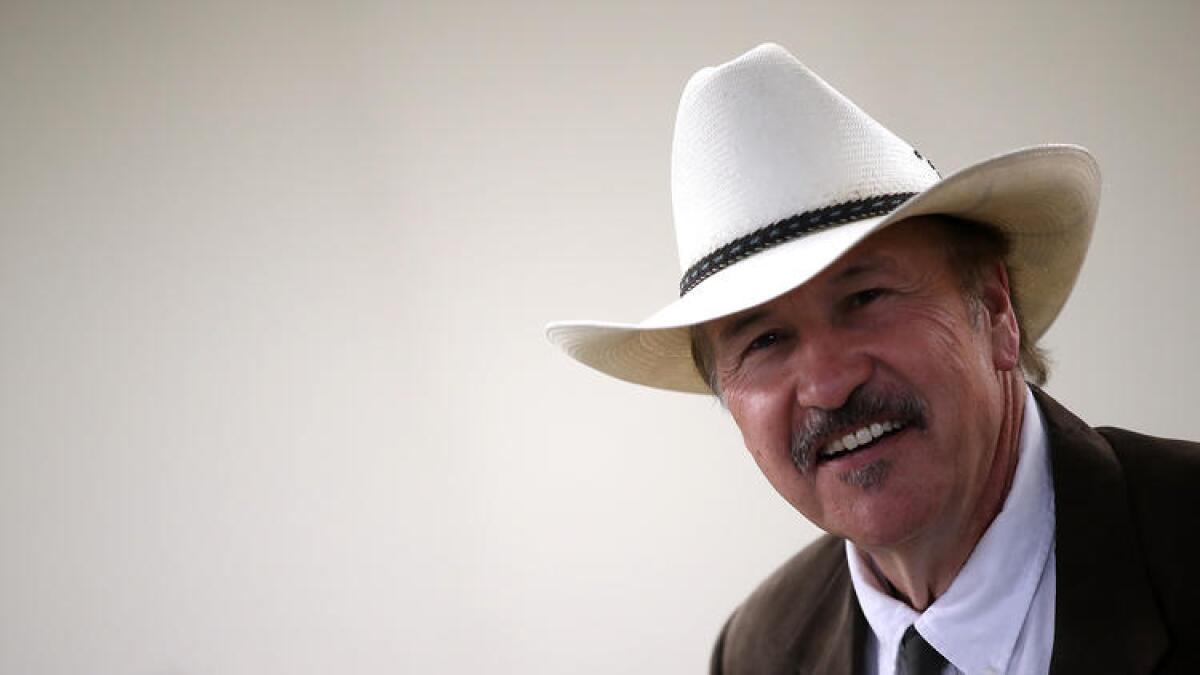
On Thursday, the political world will eagerly look to Montana and a closely fought congressional race for the latest test of Democratic strength and Republican resilience in the turbulent age of Trump.
The major candidates and outside groups have sunk more than $8 million into the contest, a huge sum in a state where $250,000 pays for a robust week of television advertising.
But for all that money and all the outside interest, the election will turn less on national trends than circumstances close to home: on the personalities and histories of the main contestants, their different campaign styles and, perhaps most of all, on who is regarded as the more authentic Montanan.
Terrorist attack in England has conservative media focused on safety of allies
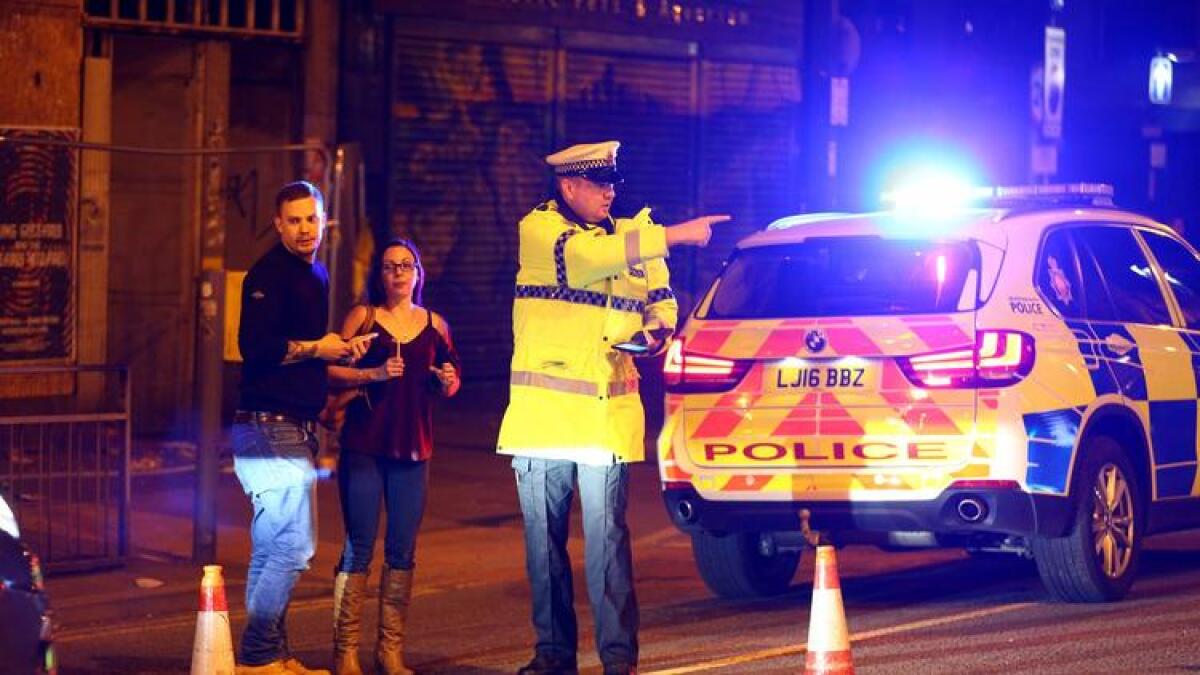
It’s a sight witnessed all too often: an explosion, screams, people sprinting to safety.
Late Monday night, this was the scene at an Ariana Grande concert in Manchester, England, after a man with possible ties to Islamic State militants set off a suicide bomb, killing 22 people and, once again, setting in motion a global discourse on how to fight terrorism.
President Trump, while visiting Bethlehem, said the attack was committed by “evil losers in life.”
Throughout the campaign and early in his presidency, Trump has said defeating the Islamic State is a top priority. (He reiterated that point in a speech Sunday in Saudi Arabia, urging Muslim leaders to plot their own course in combating terrorism.)
In recent months, with attacks in Berlin, Paris and London, conservative media have questioned the safety of Europe and warned that the United States could face similar attacks. With the latest attack, some on the right are again homing in on the safety of our allies.
Here are some of today’s headlines:
2017 has seen a terror attack attempted in Europe every nine days (Breitbart)
The attack in Manchester blankets the home page of the right-wing website.
Europe has indeed been the location of high-profile attacks this year. In Paris last month, Islamic State claimed responsibility for an attack on the Champs-Élysées in which a man fired an automatic weapon, killing a police officer. And in March, a man plowed his car into pedestrians on Westminster Bridge, near the British Parliament in London, and then fatally stabbed a police officer. In all, four people were killed and dozens injured in what police called a terrorist attack.
The Breitbart piece is an analysis of different terrorist attacks attempted and carried out in Europe since January.
“Attacks and attempted attacks have taken place in Austria, France, the United Kingdom, Belgium, Italy, Russia, Sweden, Norway, and Germany,” on average every nine days, the piece says.
Pence’s message of ‘civility and open debate’ lost on those who most needed to hear it (Weekly Standard)
The debate over free speech on colleges campuses continues.
In recent months, conservative speakers have canceled speeches on college campuses in the face of anticipated protests. And others, who have opted to speak, have faced vocal backlash.
On Sunday, as Vice President Mike Pence began to address students at the University of Notre Dame commencement, several dozen stood and walked out of the ceremony. In his speech, Pence talked about “civility and open debate,” and this piece argues that the message was lost on students.
“Today’s campus protesters control the story. It’s what primarily differentiates them from their hippie progenitors, pioneers in campus unrest who couldn’t count on an endless supply of retweets or an elite national press in step with their efforts,” writes Alice B. Lloyd. “And, at least in message, Pence pre-empted them: ‘This university is a vanguard of freedom of expression and the free exchange of ideas at a time, sadly, when free speech and civility are waning on campuses across America.’”
The impeachment delusion (American Spectator)
Some Democrats have already started saying the I-word when referring to Trump.
Yup – last week Rep. Al Green (D-Texas) called for the impeachment of Trump as the president faces continued questions about his ties to Russia and actions that potentially interfered with an FBI investigation.
But conservatives say such talk is nonsense.
“Political power games of the sort beloved in our nation’s capital, where everything in the world is political and nothing else matters, have catastrophic potential,” writes William Murchison of the impeachment talk. “Played fiercely and mercilessly enough, such games can bring ruin not just to the losers but even, in due course, to the winners. They exhaust and deplete and demoralize.”
Trump’s budget arrives in Congress as most do, with a lot of talk and little action
President Trump’s budget landed on Capitol Hill the way White House fiscal proposals traditionally do — with a thud.
It wasn’t just Democrats who dismissed the blueprint as a “nightmare” scenario, with its beefed up military spending and tax breaks for the wealthy; Republicans also winced at steep domestic program cuts and rosy growth projections that may not achieve its promise of balancing deficits.
Administration budgets are largely viewed by Congress as a statements of a president’s priorities, rather than serious governing documents, and the lackluster reception to Trump’s 2018 blueprint was no different than others in recent years.
READ TRUMP’S $4.1-TRILLION BUDGET PLAN
Lawmakers have just a few months to ward off another shutdown crisis and Trump’s budget, which he dubbed “The New Foundation for American Greatness,” remains far from the deal Congress will need to strike later this year to keep government running.
“Clearly, Congress will take that budget and then work on our own budget, which is the case every single year,” said House Speaker Paul D. Ryan (R-Wis.) “But at least we now have common objectives.”
Trump’s budget aligns with many conservative priorities, particularly its promise to bring deficit spending to an end and achieve a balanced budget within 10 years.
That comes as no surprise after Trump, who confounded Republicans on the campaign trail for straying from conservative principles, tapped Mick Mulvaney, a former South Carolina tea party congressman, as his budget director.
Mulvaney helped orchestrate the 16-day government shutdown in 2013 over spending priorities, and his budget approach may prove too severe for even fellow Republicans.
Democrats seized the opportunity to link the White House to the most orthodox flank of the GOP, and Senate Minority Leader Charles E. Schumer (D-N.Y.) lambasted the budget as conservative “fantasy.”
“Trump’s budget exists somewhere over the rainbow where the dreams of Mick Mulvaney, Paul Ryan and the Koch brothers really do come true,” Schumer said, referring to the billionaire industrialists who fund conservative campaigns.
“What is going on in the White House with this kind of budget?” Schumer asked. “How many people in America want to cut cancer research? President Trump evidently does.”
Congress faces its own budget problems this year, as the Republican majority blew past the deadline for crafting a 2018 blueprint.
Republicans are trying to use the budget process to achieve their broader goals — repealing the Affordable Care Act, passing tax reform — but have become tangled in their own infighting on policy differences.
Democrats are likely to submit an alternative to Trump’s budget later this year after having declined to do so at times with Obama in the White House.
At some point, though, the aspirational documents will need to be put aside for an actual funding bill to keep government from shutting down once the 2018 fiscal year starts on Oct. 1.
That is likely to require a compromise between Republicans and Democrats over spending levels and priorities.
“Ultimately we will have to come up with a budget ourselves,” said Sen. John Cornyn of Texas, the No. 2 Republican.
Video: Brennan is asked why Americans should care about Russian interference in the U.S. presidential election

Former CIA Director John Brennan was asked why Americans should care about the investigation into Russian interference in the 2016 U.S. presidential election.
Our ability to choose our elected leaders as we see fit is, I believe, an inalienable right that we must protect with all of our resources and all of our power.
— Former CIA Director John Brennan
Former CIA Director John Brennan is asked about collusion with Russians

Former CIA Director John Brennan tells a Congressional panel investigating Russian efforts to interfere with the 2016 U.S. election that he was concerned about Trump campaign officials interactions “because of known Russian efforts to suborn such in
I encountered and am aware of information and intelligence that revealed contacts and interactions between Russian officials and U.S. persons involved in the Trump campaign.
— Former CIA Director John Brennan
Read Trump’s $4.1-trillion budget plan
President Trump has sent Congress a $4.1-trillion spending plan that proposes to eliminate the deficit in a decade while protecting Social Security and Medicare.
But to achieve balance, Trump is seeking sharp cuts in a variety of programs for the poor, including Medicaid, food stamps and disability payments.
Administration officials say they want to tighten work requirements to get millions of people off government support programs and back into the labor force, saying that will help them achieve their ambitious goal of boosting economic growth on a sustained basis to 3% annual gains.
The submission will set off months of debate in Congress. Democrats have already voiced strong opposition to the plan, and even Republicans are wary of the political dangers in Trump’s draconian cuts.
Former CIA chief John Brennan on classified intelligence leaks: ‘I find them appalling and they need to be tracked down’

Former CIA Director John Brennan discusses Trump allegedly sharing classified intelligence with Russia.
What I was very concerned about, though, is the subsequent releases of what appears to be classified information purporting to point to the originator of the information, liaison partners. They continue to be very, very damaging leaks, and I find them appalling and they need to be tracked down.
— Former CIA Director John Brennan
Trump wraps up Israel and West Bank visit, heads to Europe
President Trump left Israel on Tuesday after making a final appeal for Mideast peace – but he offered few specific suggestions on how to go about resolving the conflict.
With Israeli VIPs looking on at Tel Aviv’s Ben Gurion airport, Trump boarded Air Force One and departed for Rome, ending his two-day visit to Israel and the West Bank.
In a speech delivered at the Israel Museum shortly before his departure, Trump reiterated that he was “personally committed to helping Israelis and Palestinians achieve a peace agreement.”
Speaking hours after having met Palestinian Authority President Mahmoud Abbas in the West Bank town of Bethlehem, the president declared that “the Palestinians are ready to reach for peace.”
He then appeared to put Prime Minister Benjamin Netanyahu somewhat on the spot. Gesturing toward the Israeli leader, the president added: “I can tell you also that he is reaching for peace. … Benjamin Netanyahu wants peace.”
At the airport, Trump and his entourage made their farewells as a trumpet sounded. Trump returned a military official’s salute.
Netanyahu accompanied Trump to the steps of Air Force One. At the top, the president and his wife, Melania, turned and waved farewell.
Public opinion of NATO is improving in the U.S., poll finds
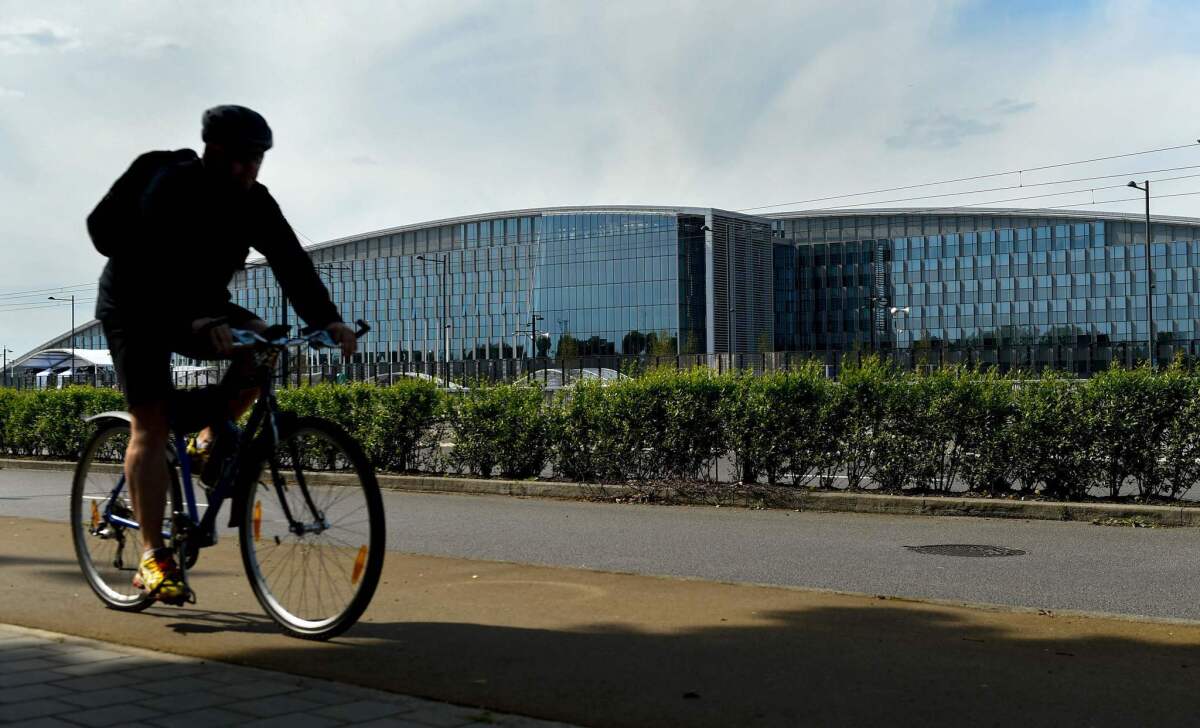
Before taking office, President Trump repeatedly questioned the utility of the North Atlantic Treaty Organization, calling the military alliance that has been a bedrock of Western security since 1949 “obsolete.”
Trump, who plans to attend his first NATO summit in Brussels on Thursday, has since voiced strong support for the security pact, and public opinion of it here in the United States has also improved, according to a poll released Tuesday.
More than 60% of Americans surveyed hold a favorable view of NATO, up from just over half a year ago, the Washington-based Pew Research Center found. Support is stronger among Democrats than among Republicans, it said.
The Trump administration has continued to assail NATO allies for not spending more of their own money on defense and has also pressed them to do more to fight terrorism. Just five of the 28 members — the U.S., Britain, Estonia, Greece and Poland — currently meet the alliance’s target of spending at least 2% of their gross domestic product on defense.
Still, most Europeans surveyed appear confident that the U.S. would honor its commitments under the NATO charter, which states that an attack against one member should be viewed as an attack against all. A median of 66% of those interviewed in seven European nations said they believed the U.S. would come to the defense of a NATO member if it were involved in a serious military conflict with Russia.
Asked about their own country’s obligations in such an event, more than half of respondents in the Netherlands (72%), Poland (62%), Canada (58%) and France (53%) said they believed their government should fulfill its commitment to mutual defense. But in Germany, which has the fourth largest defense budget in NATO, just 40% of respondents said they would back such assistance, Pew said.
The findings are based on interviews with 9,761 people in the U.S., Canada, France, Germany, the Netherlands, Poland, Spain, Sweden and Britain that were carried out between Feb. 16 and April 10.
Palestinians underwhelmed by Trump’s West Bank visit
Many Palestinians seemed less than impressed by President Trump’s brief foray into the West Bank on Tuesday for talks in the town of Bethlehem with Palestinian Authority President Mahmoud Abbas.
Though Trump stood before a backdrop of Palestinian flags and listened to the playing of the Palestinian national anthem, the U.S. president’s remarks did not include any reference to a “two-state solution,” with Israel and a Palestinian state existing side by side.
“There’s not much detail there, as usual. It’s still in the realm of generalizations rather than a specific strategy or approach,’’ said Hanan Ashrawi, a senior official of the Palestine Liberation Organization.
Speaking by phone from Ramallah, the Palestinians’ de facto administration capital, Ashrawi said of Trump: “He’s still on a learning curve, and peacemaking is not a business deal.”
In Bethlehem, some Palestinians joked that the visit’s main achievement was that the municipality had cleaned the streets beforehand, said Akram Al Ayassa, an official with a Palestinian government commission.
Many Palestinians were already irked that Trump spent only about an hour with their leader over the course of his two-day trip to Israel and the West Bank. Locals in Bethlehem had also hoped Trump would visit the town’s most famous attraction, the Church of the Nativity, revered by Christians as the birthplace of Jesus.
The Arabic-language hashtag #45minutes was trending in social-media posts on the visit, said Bethlehem-based blogger and journalist Fadi Abu Sada, who called the Trump-Abbas meeting “public relations and nothing more.”
He said Trump’s White House meeting with Abbas earlier this month had briefly raised Palestinian expectations but wondered how long that initial optimism would last.
“For us, nothing has changed yet,” Abu Sada said. “Things on the ground are still the same.”
Delayed retirement advisor rule will go into partial effect, but changes may still be possible
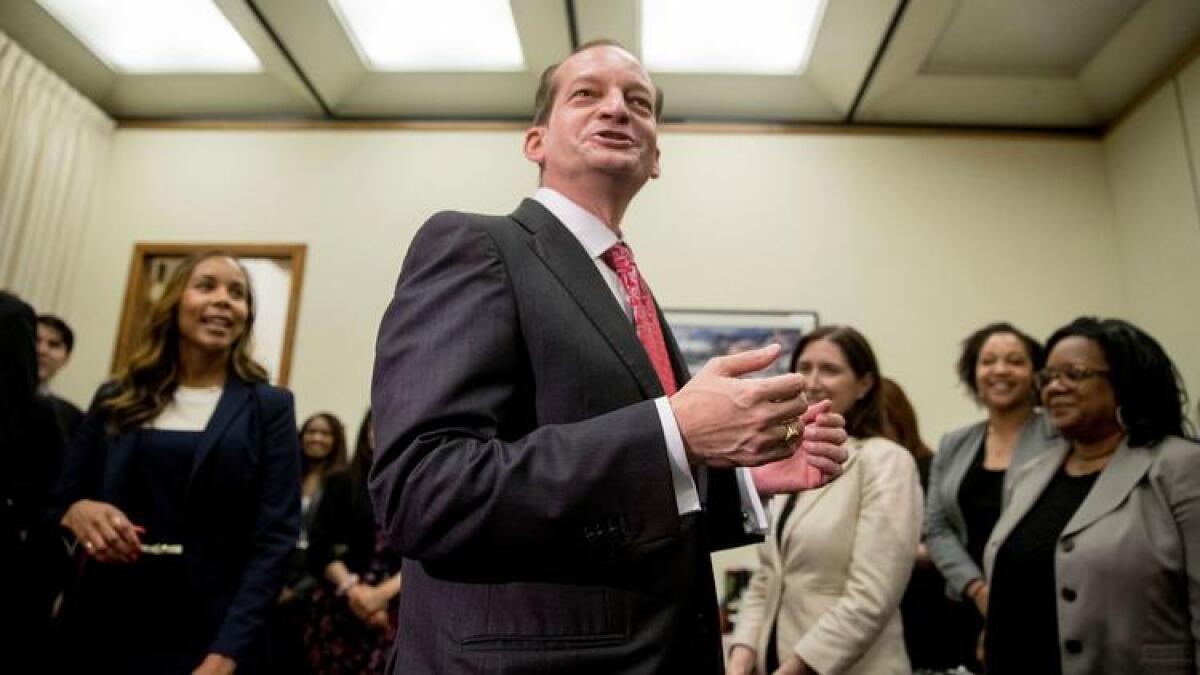
A controversial Obama-era rule for retirement advisors, delayed by a review ordered by President Trump because of strong Republican and financial industry opposition, will partially take effect next month, Labor Secretary Alexander Acosta said.
But Acosta indicated he has problems with the rule and that there still could be changes or a repeal before all of its provisions kick in next year.
The regulation, known as the fiduciary rule, requires investment brokers who handle retirement funds to put their clients’ interests ahead their own compensation, company profits or other factors.
Trump visits Israel’s Holocaust memorial
President Trump, visiting Israel’s national Holocaust memorial, paid solemn tribute Tuesday to the 6 million Jews killed by the Nazis, calling it “history’s darkest hour.”
At the memorial, Yad Vashem, Trump lighted an eternal flame and laid a wreath honoring the victims. He called the Nazi campaign of extermination against European Jewry “the most savage crime against God and his children.”
“Millions of wonderful and beautiful lives -- men, women and children -- were extinguished as part of a systematic attempt to eliminate the Jewish people,” said the president. “It is our solemn duty to remember, to mourn, to grieve and to honor every single life that was so cruelly and viciously taken.”
Trump’s 30-minute visit, on his second and final day in Israel, was briefer than his hosts had wanted. Almost all foreign dignitaries who come to Jerusalem make a lengthy stop at the museum and memorial.
Though short, the visit had emotional moments. Trump was presented with a replica of a personal album that had belonged to a 16-year-old Holocaust victim, Ester Goldstein. Her surviving sister, Margot Herschenbaum, burst into tears after Trump shook her hand.
Trump and his wife, Melania, were accompanied by Trump’s daughter Ivanka, a convert to Judaism, and her husband, Jared Kushner, an Orthodox Jew.
In remarks delivered after the flame-lighting ceremony, Trump hailed the “unbreakable spirit of the Jewish people.” Prime Minister Benjamin Netanyahu, speaking after him, called Trump’s visit “historic” because he was the first American president to include Israel on his first overseas trip as president.
Trump travels to West Bank for talks with Palestinian leader
President Trump traveled to the West Bank Tuesday to meet Palestinian Authority President Mahmoud Abbas, pledging to do “everything I can” to bring Israel and the Palestinians toward a peace accord.
To reach the biblical town of Bethlehem, Trump’s motorcade passed through the security barrier closing off the West Bank from Israel.
In remarks delivered as the two leaders sat together, Trump said he looked forward to working with both Abbas and Israeli Prime Minister Benjamin Netanyahu “toward a lasting peace.”
Trump added that “if Israel and the Palestinians can make peace, it will begin a process of peace all throughout the Middle East, and that would be an amazing accomplishment.”
Abbas, speaking through a translator, said he hoped to “keep the door open to dialogue with our Israeli neighbors.” But he stressed that Palestinian demands remain unchanged: a Palestinian state with its capital in east Jerusalem.
“Our Palestinian people’s attainment of their freedom and independence is key to peace and stability in the world,” he said. “The problem is not between us and Judaism. It is between us and occupation.”
The two leaders shook hands, but their body language was far more stiff and formal than the warmth and friendliness displayed in Trump’s encounters with Netanyahu since his arrival on Monday.
During joint appearances in Jerusalem on Monday, Netanyahu addressed the president as “Donald” and spoke repeatedly of the unbreakable bond between the U.S. and Israel.
Trump budget shows tiny surplus in 10 years, with rosy economic forecast and trillions in domestic cuts
President Trump in his first full budget says he will produce a surplus in a decade, though his fiscal path relies on projections of growth more optimistic than government and private-sector economists expect and deep cuts in anti-poverty programs such as Medicaid.
The budget to be released Tuesday will show that the annual federal deficit, which was $585 billion in the fiscal year that ended Sept. 30, will steadily decline until fiscal year 2027, when the nation will have a $16-billion surplus — the first since the start of the George W. Bush administration, though small in the context of what by then would be a nearly $6-trillion budget.
Nonpartisan budget watchers and even many Republicans are sure to be skeptical. Trump promises to reach balance and even produce a small surplus while he is calling for the deepest tax cuts in history, hefty increases in military and homeland security spending, and no reductions in Medicare and Social Security, the entitlement programs that are a main driver of projected federal debt because of the aging population.
Mourning Manchester victims, Trump condemns ‘evil losers’ behind terrorist acts
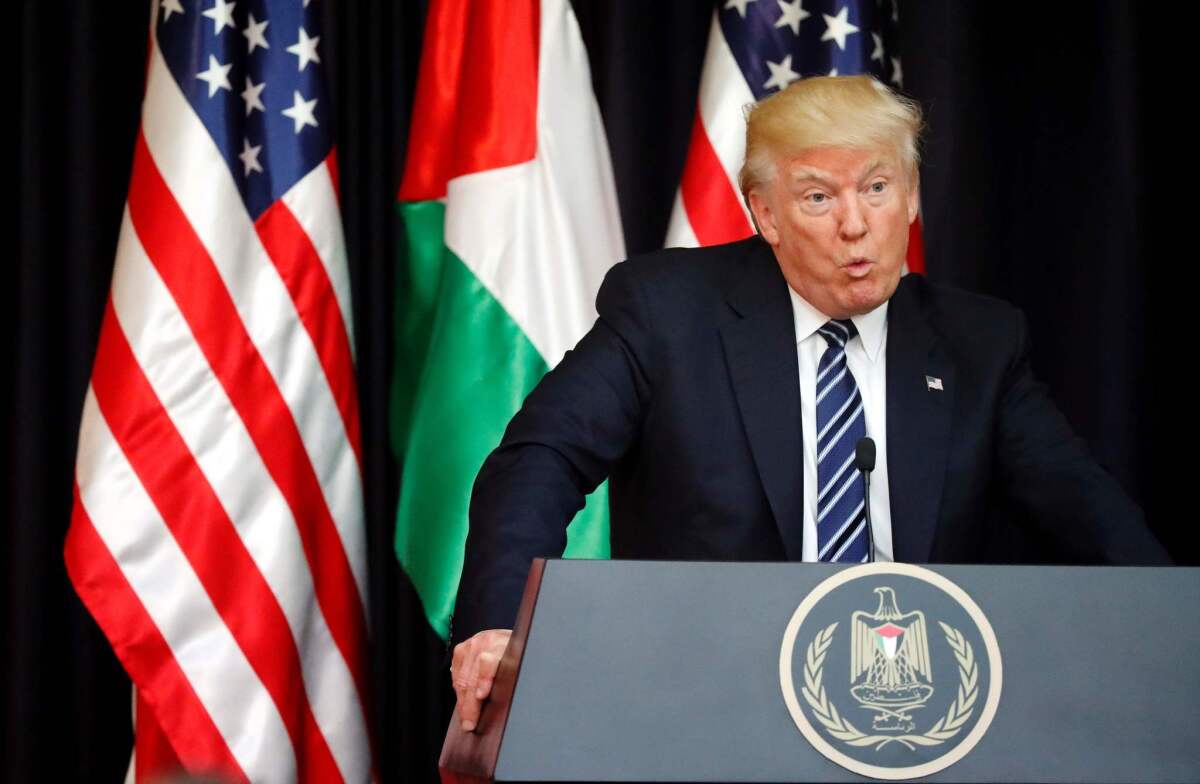
President Trump expressed sympathy for the victims of Monday’s suicide bombing in the United Kingdom and a blunt rebuke for the “evil losers” he said are behind acts of terrorism.
In remarks with Palestinian Authority President Mahmoud Abbas, Trump said the world should have no tolerance for those who cause such bloodshed, particularly when directed at innocents like those killed at an Ariana Grande Concert in Manchester.
“I won’t call them monsters because they would like that term. They would think that’s a great name. I will call them from now on losers, because that’s what they are,” Trump said. “They’re losers. And we’ll have more of them. But they’re losers. Just remember that.”
Preventing terrorist violence is a chief goal behind his international trip, Trump said. The trip so far included a gathering of Arab leaders in Saudi Arabia at which Trump urged his listeners to step up efforts to “drive out” terrorists from their nations.
“I was gratified that President Abbas joined the summit and committed to taking firm but necessary steps to fight terrorism and confront its hateful ideology,” Trump said. “It’s so interesting that our meeting took place on this very horrible morning of death to innocent young people. Peace can never take root in an environment where violence is tolerated, funded and even rewarded.”
Abbas also condemned the “horrible terrorist attack,” before turning to the focus of his discussions with the president: new efforts to reach a peace agreement with Israel.
He said he hoped that Trump would go down in history as the president who finally brokered an Israeli-Arab agreement, adding that his discussions with Trump, both Tuesday and last month at the White House, had given the entire region hope of a breakthrough.
Trump said he would do “everything I can” to bring about peace.
“President Abbas assures me he is ready to work towards that goal in good faith, and Prime Minister Netanyahu has promised the same,” he said. “I look forward to working with these leaders toward a lasting peace.”
Trump condemns ‘evil losers’ behind the Manchester attack
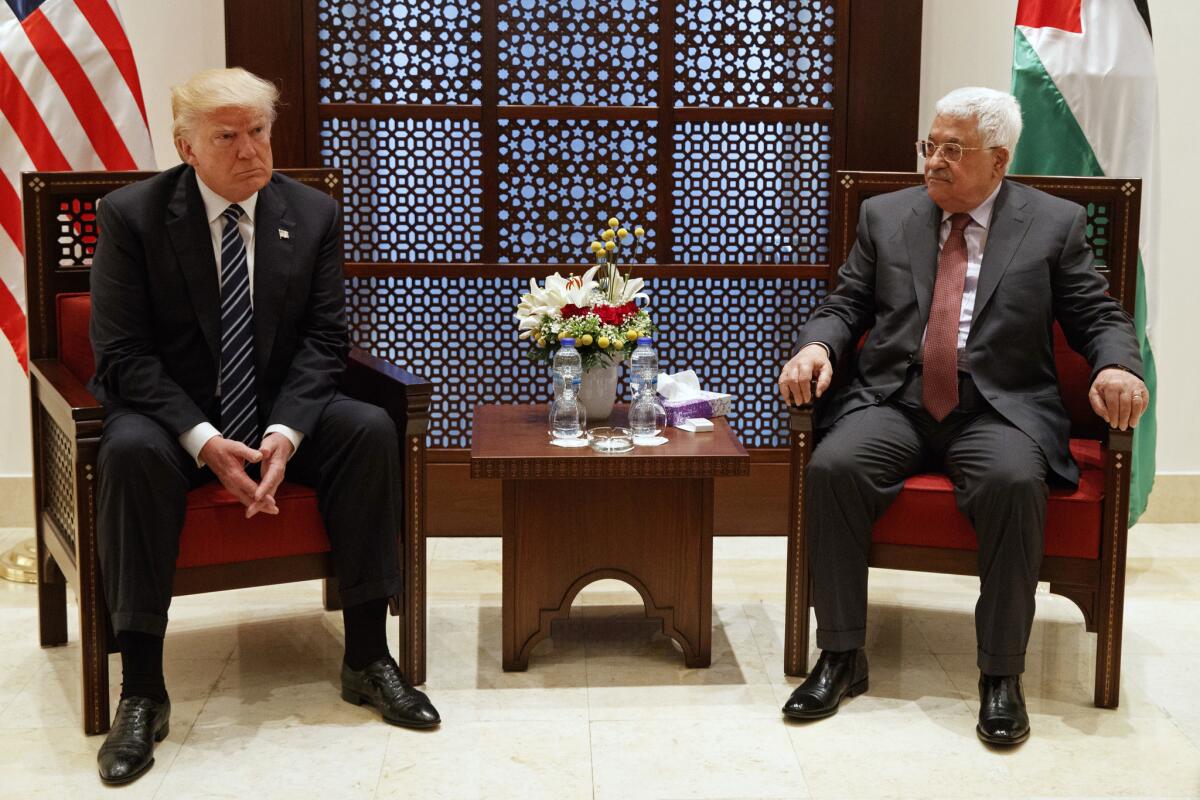
President Trump is expressing solidarity with the United Kingdom in the wake of a deadly explosion at an Ariana Grande concert in Manchester, England, condemning the “evil losers” behind the blast.
Trump spoke Tuesday after a meeting in Bethlehem with Palestinian Authority President Mahmoud Abbas.
Manchester police say an apparent suicide bomber set off an improvised explosive device at the end of the concert. Police raised the death toll to 22 early Tuesday, and dozens more have been reported injured.
Trump said the attack preyed on “innocent children” and said this “wicked ideology must be obliterated. And I mean completely obliterated.”
Trump says “civilized nations must join together to protect human life.”
Flynn invokes 5th Amendment, refuses to comply with Senate subpoena in Russia probe
President Trump’s former national security advisor, Michael Flynn, refused Monday to comply with a Senate subpoena seeking records of his dealings with Russia, invoking his constitutional protection against self-incrimination.
Lawyers for the former three-star Army general said he would not cooperate with the Senate Intelligence Committee inquiry because the “escalating public frenzy against him” and the Justice Department’s recent appointment of a special counsel put him at legal risk if he turned over the documents.
Flynn, who was forced to resign from the White House in February, is a key figure in the growing political scandal. The FBI is investigating whether members of the Trump campaign cooperated with Russian intelligence agencies during or after the 2016 race.
The subpoena “seeks to compel Gen. Flynn to offer testimony through the act of producing documents that may or may not exist,” his lawyer, Robert Kelner, and two other attorneys wrote in a letter to the Senate committee.
Under the circumstances, they wrote, “Gen. Flynn is entitled to, and does, invoke his 5th Amendment privilege against production of documents.”
The Senate Intelligence Committee subpoena sought records of all of Flynn’s meetings with Russian officials, and any communications he had with the Trump campaign about Russia going back to 2015.
The committee said it would continue to try to obtain the documents.
In a statement, Sen. Richard Burr (R-N.C.), the committee chairman, and Sen. Mark Warner (D-Va.), the top Democrat, said they are “disappointed he has chosen to disregard the committee’s subpoena request for documents relevant and necessary to our investigation.”
The lawmakers added: “We will vigorously pursue Gen. Flynn’s testimony and his production of any and all pertinent materials pursuant to the committee’s authorities.”
Flynn’s lawyers warned that they would fight to protect the records.
Flynn “has more than a reasonable apprehension that any testimony he provides could be used against him,” they wrote.
“Multiple members of Congress have demanded that he be investigated and even prosecuted. He is the target on a nearly daily basis of outrageous allegations.”
The Senate panel last month turned down a request from Flynn’s lawyers that he be given immunity from prosecution in return for testimony. His lawyers said Flynn would testify “should the circumstances permit.”
Adding to his woes, a Democratic lawmaker said Monday that Flynn may have lied to federal investigators when he told the Pentagon during a security review that he was paid $33,750 by a U.S. company for making a speech in Moscow in December 2015, shortly before he began advising Trump’s presidential campaign.
“General Flynn told security clearance investigators that he was paid by ‘U.S. companies’ when he traveled to Moscow in December 2015 to dine at a gala with Russian President Vladimir Putin,” Rep. Elijah Cummings, (D-Md), the top Democrat on the House Oversight and Investigations Committee, said in a statement.
“The actual source of the funds for General Flynn’s trip was not a U.S. company, but the Russian media propaganda arm, RT,” he added, referring to the government-run TV network.
Trump ordered Flynn to resign three weeks into the new administration after news reports disclosed that he had lied to White House colleagues, including Vice President Mike Pence, about his communications with Sergey Kislyak, Russia’s ambassador to the United States.
The day after firing Flynn, Trump met with then-FBI Director James Comey and asked him to halt the bureau’s investigation of Flynn, the New York Times has reported.
“I hope you can see your way clear to letting this go, to letting Flynn go,” Trump told Comey, according to the report. “He is a good guy. I hope you can let this go.”
In addition to the Senate intelligence investigation, Flynn is under scrutiny by three other congressional committees, the Pentagon inspector general, the FBI counterintelligence probe and a federal criminal investigation in northern Virginia.
A grand jury there also has issued subpoenas for documents, reportedly about his business dealings with Turkey and Russia before he entered the White House.
Flynn has denied any wrongdoing.
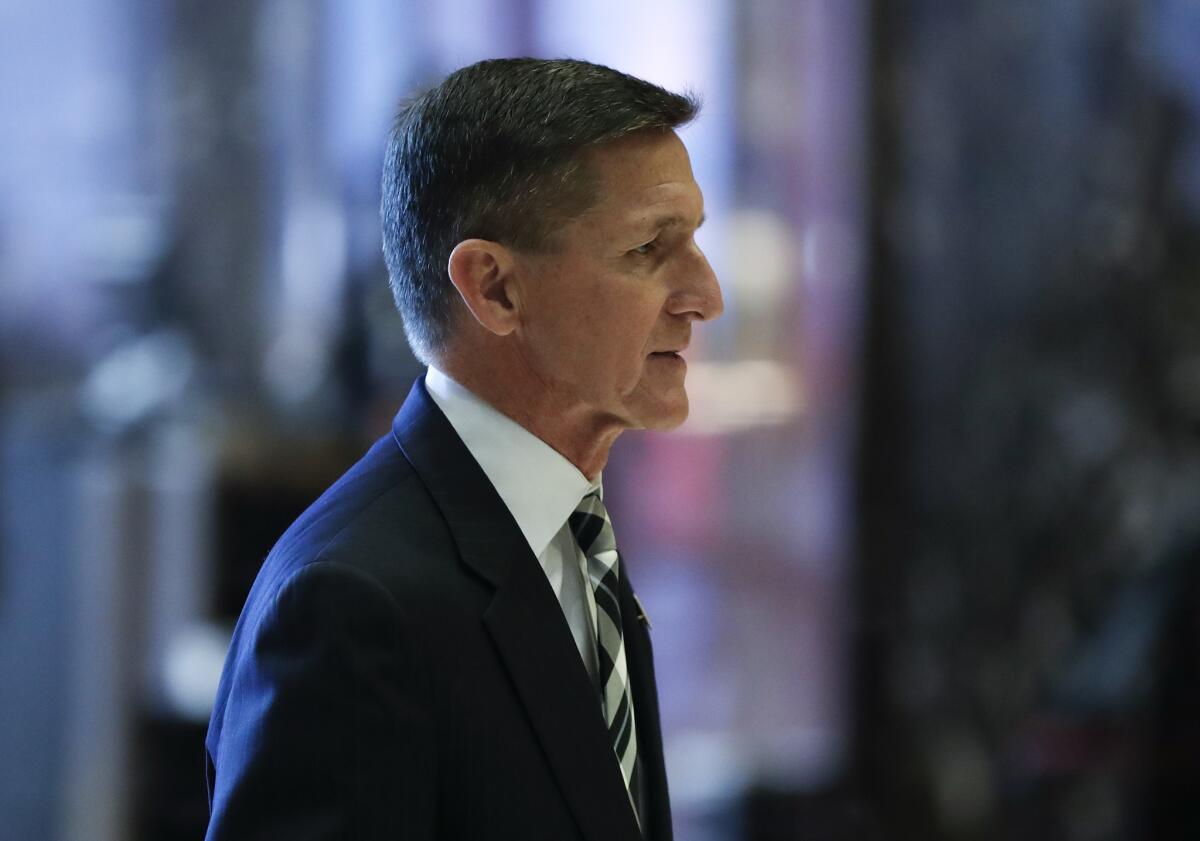
In a legal retreat, Sessions puts limits on financial consequences for ‘sanctuary cities’
In an apparent retreat on the war against cities and counties that refuse to cooperate with immigration enforcement, the Trump administration has settled on a narrow definition of what it means to be a “sanctuary city,” and limited the potential financial consequences for state and local governments.
At most, the sanctuary jurisdictions will lose grants from the Justice Department and the Homeland Security Department – not all federal funds, according to an order signed Monday by Atty. Gen. Jeff Sessions.
During last year’s campaign and the early days of the administration, President Trump and Sessions frequently attacked cities, states and corrections agencies that refuse to assist with federal immigration enforcement, saying illegal immigration was fueling what they described as a surge in gang violence and other crime.
Five days after taking office, Trump signed an executive order that said “sanctuary jurisdictions” were not eligible to receive federal grants. The Justice Department on April 21 sent letters to nine jurisdictions, saying they were at risk of losing their grants from the department.
But U.S. District Judge William Orrick blocked enforcement of Trump’s order nationwide on April 25, saying that it violated the Constitution and brought on “substantial confusion and justified fear” in local governments that they would lose all their federal grants, not just their law enforcement funding.
In an angry tweet, Trump called the ruling “ridiculous” and vowed to “see you in the Supreme Court!”
The Trump administration had never actually spelled out what it meant to be a sanctuary city.
Sessions’ memo, a reaction to Orrick’s order, says it will mean only places that “willfully refuse to comply” with a 1996 federal law that requires federal, state and local governments to share information about someone’s immigration status.
That means that Trump’s threat may not amount to much. When cities and counties accept grants from the Justice Department, they already agree to comply with that law. It also means Trump’s Jan. 25 order won’t apply to cities and counties that refuse to honor “detainer” requests to hold people who are in the country illegally for arrest on immigration charges.
Immigration rights lawyers saw the memo as an admission by the Justice Department that the law was not on its side in the sanctuary city argument.
But Sessions’ memo makes it clear that the administration has not given up on its goals of using the power of federal funding in the future to push for tougher enforcement.
“Going forward, the [Justice] Department, where authorized, may seek to tailor grants to promote a lawful system of immigration,” Sessions wrote.
Supreme Court finds the GOP packed black voters into two North Carolina districts to help win more House seats
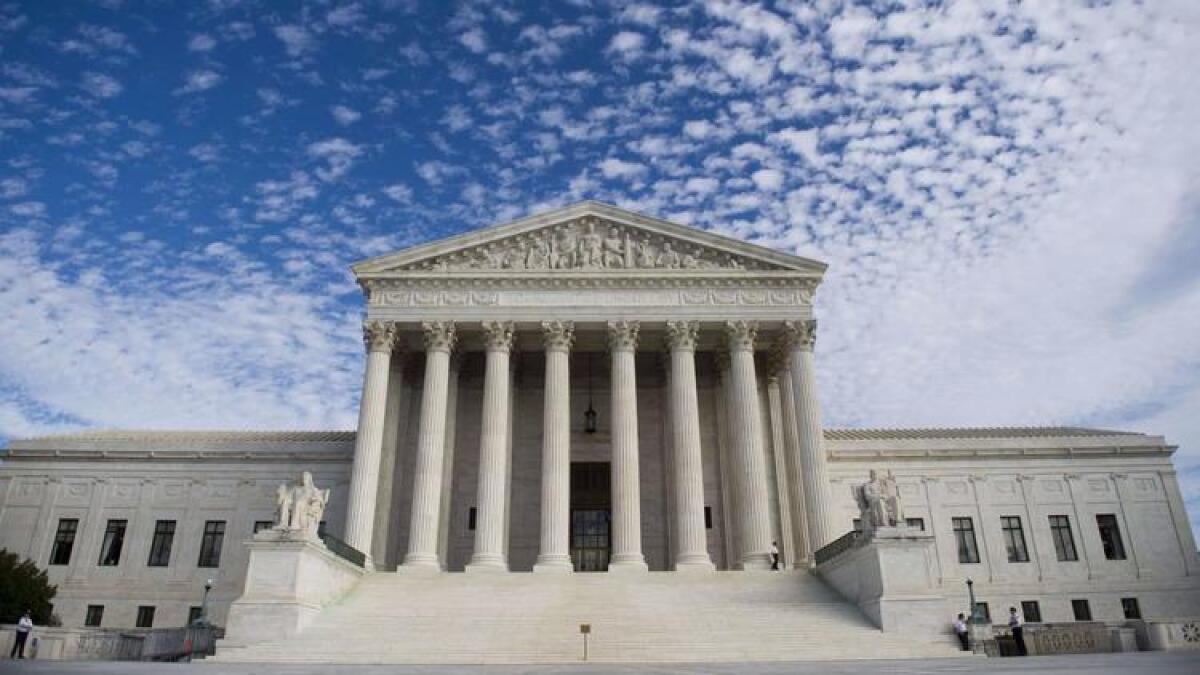
The Supreme Court rebuked North Carolina’s Republican leaders Monday for shifting tens of thousands of black voters into two congressional districts that had steadily elected black Democrats, striking down the move as racial gerrymandering.
The Constitution forbids a state from “separating its citizens into voting districts on the basis of race” without a compelling reason, the high court said in an opinion joined by its four liberals and conservative Justice Clarence Thomas.
The ruling is the third in recent years to fault Southern Republicans for packing more black voters into districts where African Americans were already the dominant voting bloc. By concentrating black voters into a few districts, the revised state maps strengthened the GOP’s hold in the surrounding areas.
Gorsuch dissents as Supreme Court upholds ban on big-money gifts to political parties
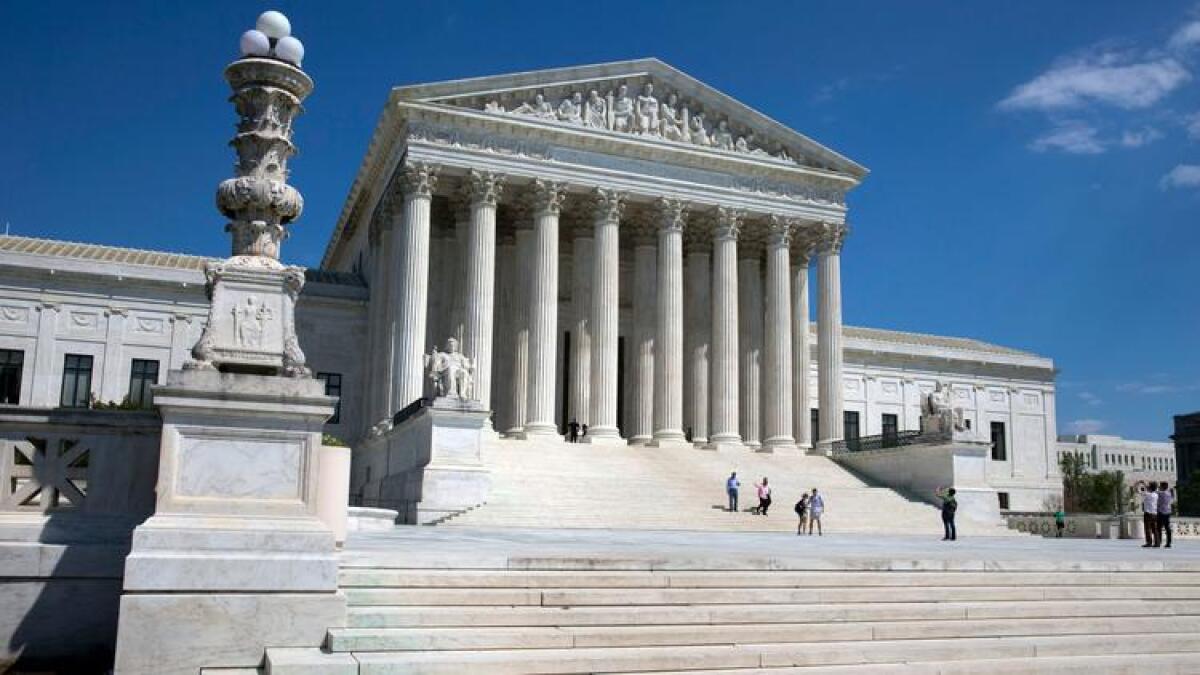
New Justice Neil M. Gorsuch joined Clarence Thomas in dissent Monday when the Supreme Court rejected an appeal from a Republican Party lawyer seeking to strike down limits on big-money contributions to political parties.
By a 7-2 vote, the high court upheld limits set in the McCain-Feingold Act of 2002.
The dissent by Gorsuch is his first and most significant decision since joining the court last month, and it puts him squarely on the side of conservatives and Republican lawyers who believe that limits on political money are unconstitutional.
Democratic congressman says Flynn may have lied to security clearance investigators
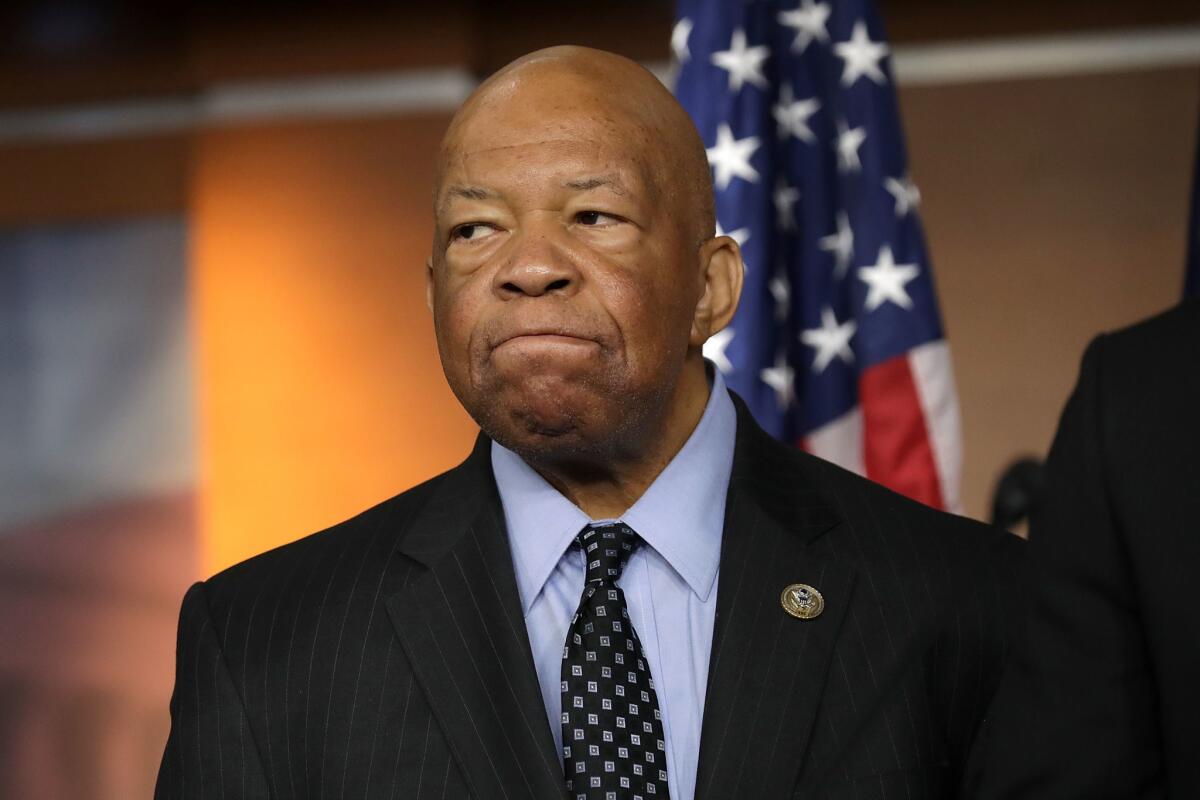
The top Democrat on the House Oversight Committee said documents he has reviewed suggest that former national security advisor Michael Flynn lied to federal security clearance investigators about the source of payments Flynn received.
Rep. Elijah E. Cummings of Maryland said Flynn told the investigators during an early 2016 security clearance review that a trip to Moscow was “funded by U.S. companies.” Cummings says the actual source of the funds was “the Russian media propaganda arm, RT.”
Cummings made the statements in a letter to Rep. Jason Chaffetz, the Utah Republican and chairman of the House Oversight Committee. Cummings sent the letter the same day Flynn declined to provide documents to the Senate Intelligence Committee, citing 5th Amendment protection from self-incrimination.
Flynn attorneys cite ‘public frenzy against him’ as reason for declining Senate subpoena
Attorneys for Michael Flynn say that a daily “escalating public frenzy against him” and the Justice Department’s appointment of a special counsel have created a legally dangerous environment for him to cooperate with a Senate investigation.
That’s according to a letter obtained by the Associated Press that was written on behalf of the former national security advisor under President Trump.
The letter, sent Monday by Flynn’s legal team to the Senate Intelligence Committee, lays out the case for Flynn to invoke his 5th Amendment protection against self-incrimination and his decision not to produce documents in response to a congressional subpoena.
The letter says that the context of the Senate’s investigation into Russia’s meddling in the 2016 election threatens that “any testimony he provides could be used against him.”
Israelis cheered by Trump visit to Western Wall — despite Netanyahu’s absence
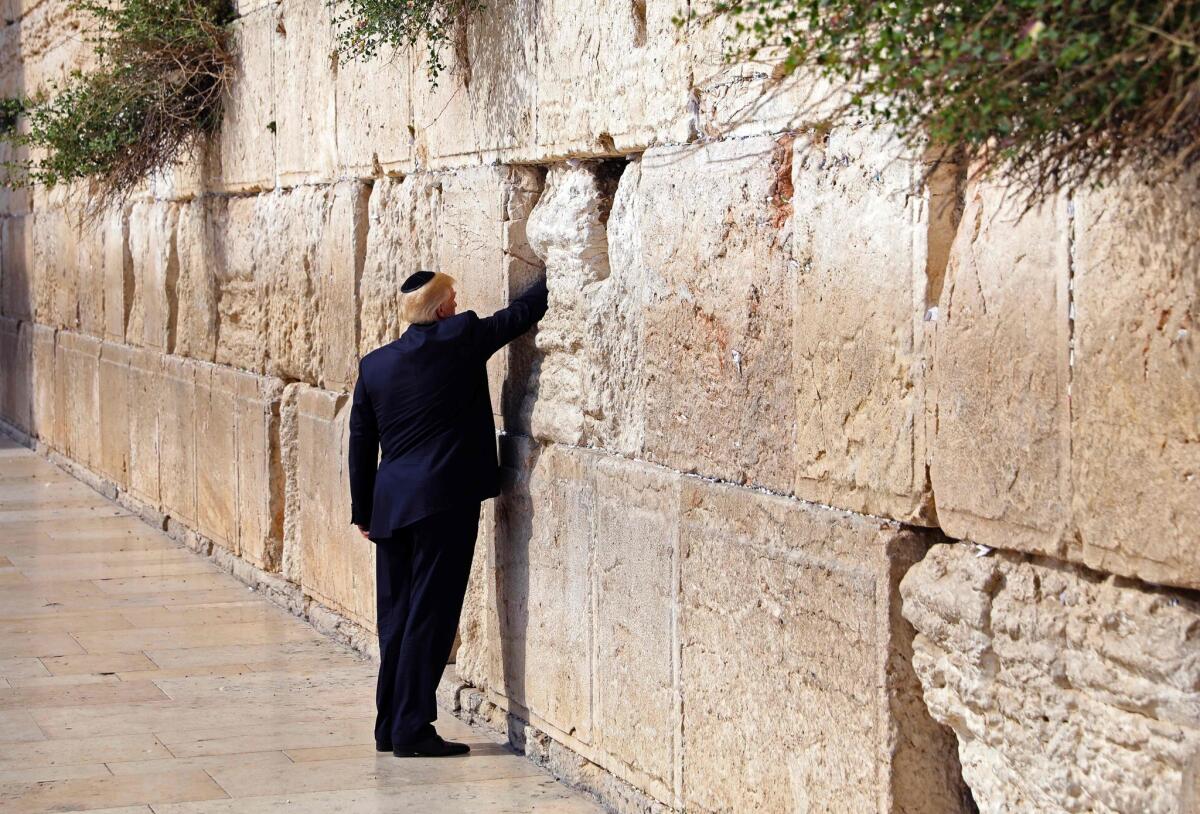
At the insistence of the United States, Israeli Prime Minister Benjamin Netanyahu was notably absent from President Trump’s visit to the Western Wall in Jerusalem — but Israelis seemed content to focus on the upside of the visit.
“There’s a feeling that they acknowledge our feelings,” said Rafi Reshef, a commentator for Israel Channel 10 news who praised Trump for his “bravery” in going to the site. “I don’t know if it will translate into diplomacy.”
Trump’s visit to the wall, a remnant of the ancient Jewish temple, and to the Church of the Holy Sepulchre, believed to mark the site of Jesus’ crucifixion, was the first by a sitting U.S. president to the holy sites in nearly a century. Both stand on land that is contested by Israel and the Palestinians.
Israel had asked if Netanyahu could join the visit to the wall, but was told no, in keeping with U.S. policy that the status of the Old City of Jerusalem is a subject for peace negotiations. Still, many Israelis considered the visit to the wall a tacit recognition of their control over East Jerusalem, captured from Jordan nearly 50 years ago in the Six-Day War.
Standing face to face with the famous giant stone blocks that were the retaining wall of the temple — the holiest site in Judaism — Trump, in a black skullcap, swayed and placed a note deep into the cracks of the wall as is the custom of pilgrims.
Standing with Rabbi Shmuel Rabinovich, the Israeli official in charge of religious ceremonies at the Western Wall, the president was shown sketches of the ancient Temple Mount, the site now dominated by the Al Aqsa Mosque and the golden Dome of the Rock shrine.
Michael Oren, an Israeli deputy minister for diplomacy and a former ambassador to the United States, said on Channel 10 that the visit was significant. “The message is that the Western Wall belongs to the Jewish people,” he said.
In the Muslim Quarter of the Old City, the sentiment was different about Trump’s visit to the 2,000-year-old wall, known as Al Buraq to Muslims. Sitting at the entrance to his antique silver shop on Sunday, Mohammed Awad complained that the site does not belong to Jews and that the president made a mistake by not visiting the Al Aqsa Mosque.
“Like President Bush and Obama, he’s not doing anything,” Awad said.
Trump says he didn’t name Israel in discussing counter-terrorism intelligence with Russians
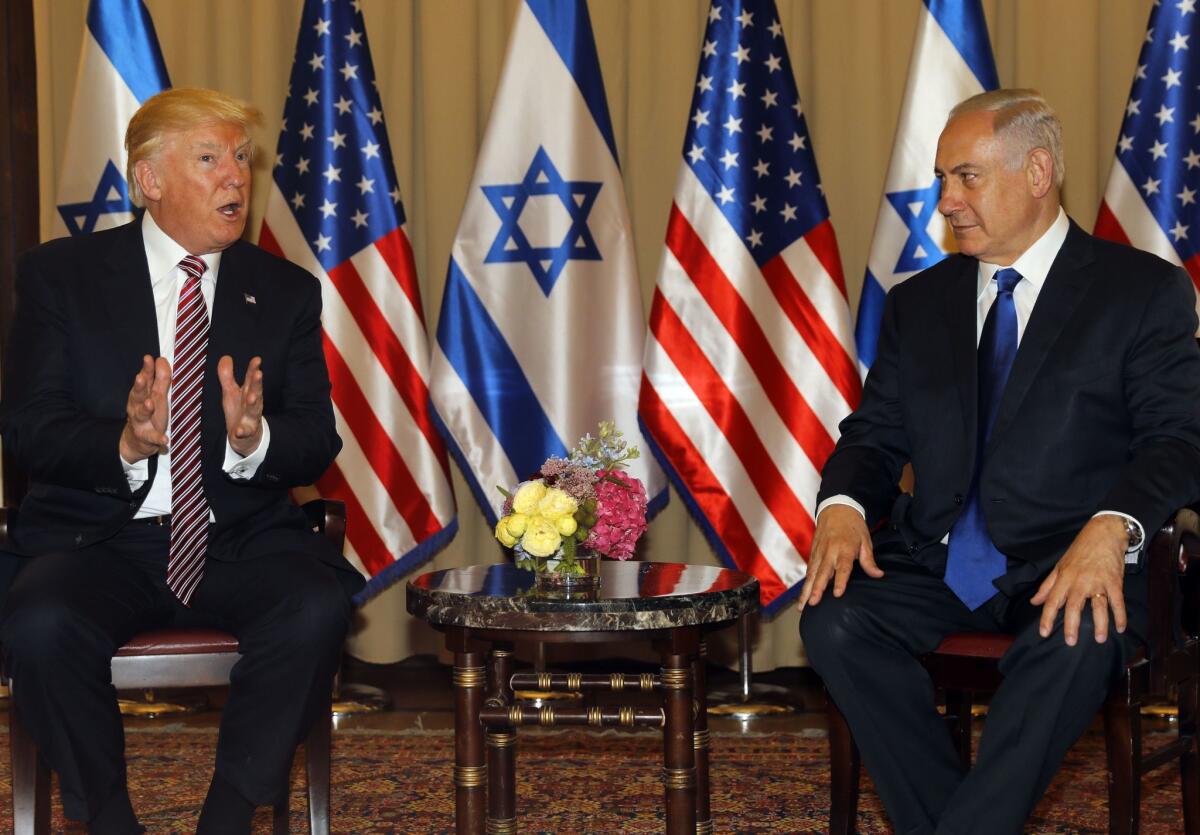
President Trump today denied that he revealed that Israel was the source of intelligence about a terrorist threat to commercial airliners during his meeting with Russian diplomats earlier this month.
Just arrived in Israel on Monday, and speaking here alongside Israeli Prime Minister Benjamin Netanyahu, Trump insisted, “I never mentioned the word or the name Israel.”
“They’re all saying I did,” he said, pointing to reporters. “So you have another story wrong. Never mentioned the word Israel.”
Published reports have not said that Trump identified Israel in his May 10 Oval Office meeting with the Russian foreign minister and ambassador to the United States, only that he divulged intelligence from an unnamed allied country that did not want it shared. Subsequent reports, citing anonymous sources, have said the ally is Israel and that Israeli intelligence officials were furious that Trump shared enough information for Russia to deduce what country was the source.
Netanyahu, however, did not directly address the intelligence controversy.
He cut through the shouts of multiple questioners during the photo opportunity with Trump to say simply, “Intelligence cooperation is terrific. It’s never been better.”
The White House has described as “wholly appropriate” Trump’s decision to share sensitive information during his meeting with Russian Foreign Minister Sergey Lavrov and Ambassador Sergey Kislyak. Trump acknowledged in later Twitter postings that he had discussed the threat that the Islamic State would use laptops as explosive devices aboard passenger planes. He said he wanted Russia “to greatly step up their fight against ISIS & terrorism.”
In their remarks together, Trump and Netanyahu each continued to draw a hard line toward Iran. Trump criticized the nuclear deal negotiated by his predecessor in concert with European allies, including Russia, though as president he has not carried through with a campaign vow to scrap it. The pact put a moratorium on Iran’s further development of nuclear weapons in return for ending some sanctions against the country.
“Instead of being thankful and saying thank you, because they were in serious trouble ... we gave them a lifeline,” Trump said of the Iranians. “Instead of saying thank you to the United States, they now feel emboldened.”
In 2015, Netanyahu took the unusual step of addressing a joint session of Congress -- at Republican leaders’ invitation -- to urge lawmakers to block the deal. The deal was one of the main contributors to the icy personal relationship between Netanyahu and then-President Obama.
Trump administration seeks delay on decision over legal challenge to Obamacare aid for the poor
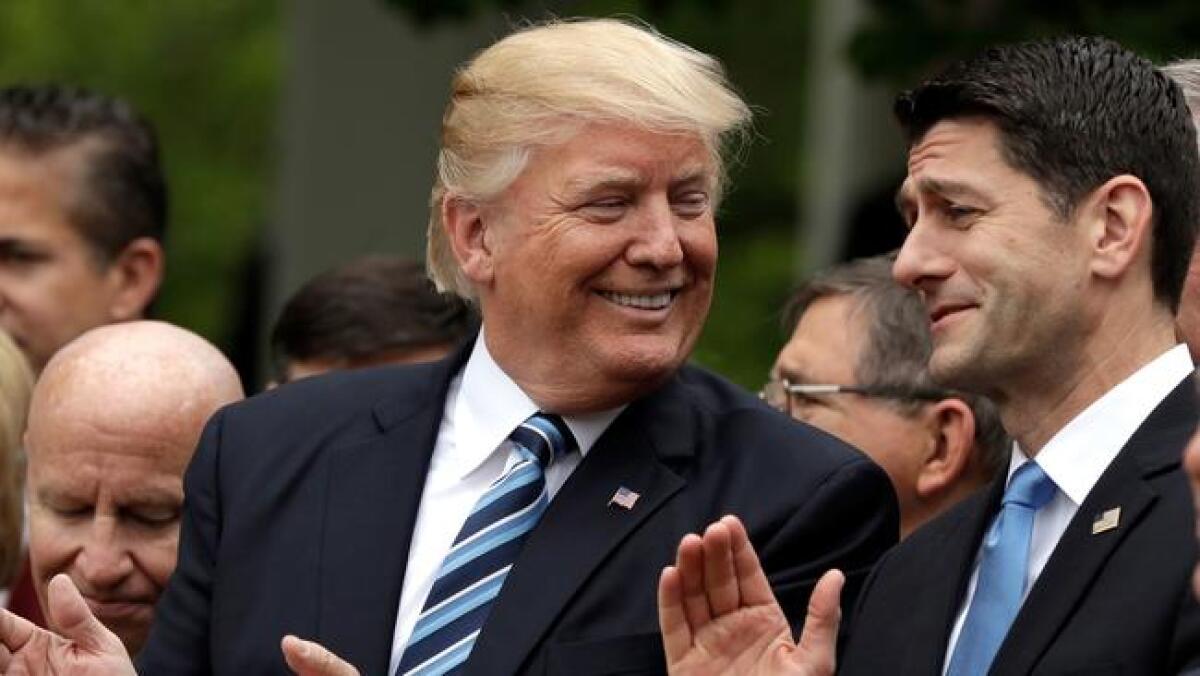
The Trump administration sought more time Monday to decide how to handle a lawsuit challenging federal healthcare aid for low-income Americans who rely on Obamacare health plans.
The move may put off a showdown over the assistance, which health insurers and many experts believe is crucial to sustaining insurance markets created by the Affordable Care Act.
But it will likely to do little to stabilize jittery insurance markets or reassure insurers who have been warning of rising premiums to account for uncertainty over the payments.
The aid, which reimburses insurers for lowering out-of-pocket costs for millions of low-income consumers who have health plans on the Obamacare markets, was paid for years by the Obama administration.
But it is now the subject of a lawsuit by congressional Republicans, who argue Congress must approve the payments, known as cost sharing reductions, or CSRs.
President Trump and his deputies have repeatedly threatened to stop making the payments or stop contesting the lawsuit, which would effectively do the same thing.
Insurers, state regulators and multiple healthcare groups representing doctors, physicians and others have pleaded with the administration and with congressional Republicans not to do that, warning it would sabotage markets and jeopardize coverage for millions of people.
The delay means that the issue may not be settled by the court for at least several more months. However, Trump could still decide unilaterally at any time to cut off the aid.
The U.S. Court of Appeals for the District of Columbia - which is considering the case, known as House vs. Price - must still approve the delay, which was sought by both the Trump administration and House Republicans.
2:54 pm: This story has been updated to reflect the fact that the court has not yet ruled on the delay.
Melania Trump seems to swat away President Trump’s hand during arrival in Israel
Iran’s Rouhani: Trump went to a country where elections are ‘not in their dictionary’
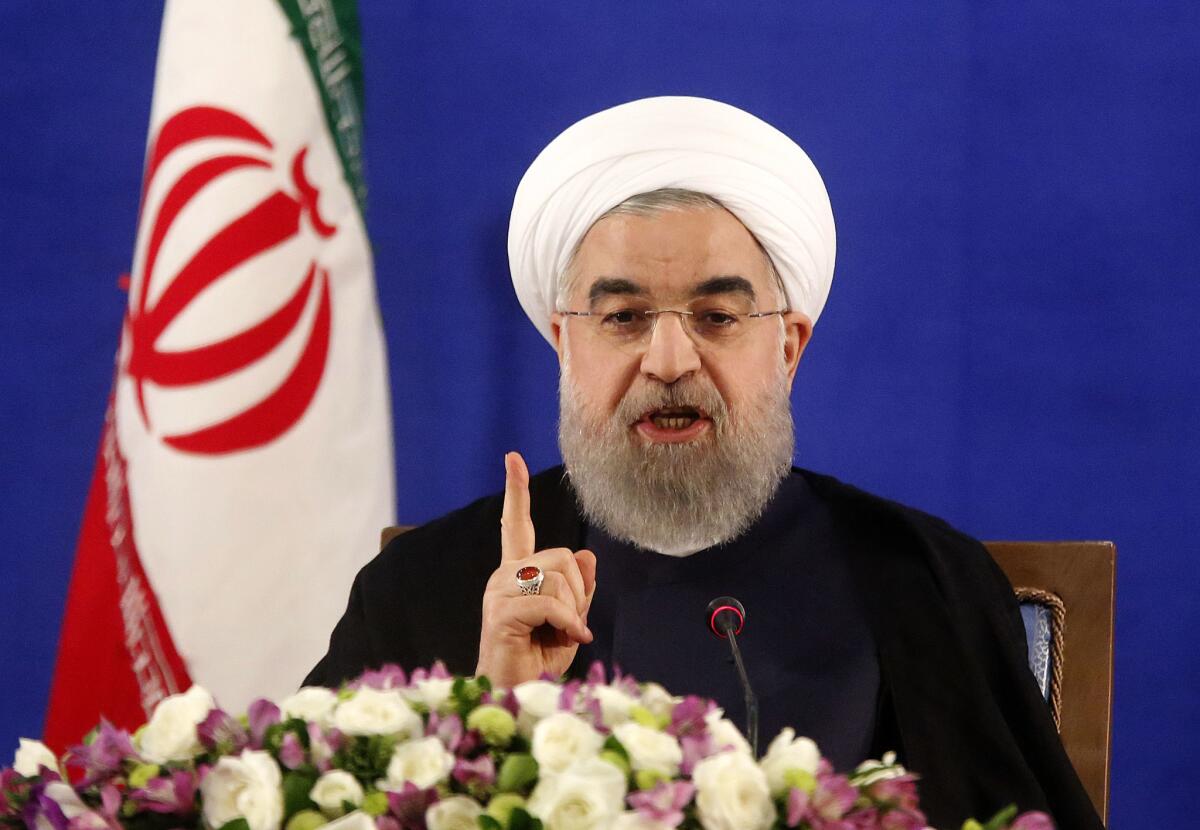
Fresh off a resounding reelection victory, Iranian President Hassan Rouhani criticized President Trump on Monday for visiting Iran’s arch-rival Saudi Arabia, but also insisted that he wanted to improve relations with the U.S.
Rouhani said Trump’s meetings in Riyadh over the weekend were “a sham” and drew laughter from the audience at a press conference in Tehran when he compared the high turnout at Iran’s election Friday to the fact that Saudi Arabia has never held elections.
“Mr. Trump has come to the region at a time when 45 million Iranian people went to polling stations, and he went to a country where they don’t know what elections are about,” Rouhani said. “It’s not in their dictionary.
“Hopefully the day will come when Saudi Arabia will adopt this path.”
His triumphant comments neglected to mention that Iran’s elections are hardly free or fair, with candidates chosen by an unelected 12-man council.
Rouhani’s first extensive remarks since decisively winning a second term signaled that he would continue to seek to engage with the United States even as the Trump administration conducts a three-month review of its Iran policy that could result in tougher economic sanctions other punitive actions.
Rouhani deflected questions about Trump’s calls to isolate Iran over its support for militant groups and its ballistic missile program, suggesting that the new U.S. administration had yet to “settle down” and formulate a coherent policy in the Middle East.
“We are waiting for this new U.S. government to be settled in terms of their stances, posture and future plans,” Rouhani said.
“Hopefully things will be settled down and well established in the U.S. so that we can actually pass judgments on the new administration.”
Special correspondent Mostaghim reported from Tehran and Times staff writer Bengali from Mumbai.
Melania Trump and Sara Netanyahu find a common enemy: the news media
Israeli and U.S. officials like to gush about the two countries’ “special relationship,” their strategic alliance and the democratic values they share.
At the airport welcoming ceremony for President Trump, Prime Minister Benjamin Netanyahu’s wife Sara suggested something else shared by the two countries – a combative relationship between the media and their respective leaders.
While making chitchat with First Lady Melania Trump and the president, Sara Netanyahu said in her uneven English, “The majority of the people in Israel, unlike the media, love us. So we tell them how you are great so they love you.”
The president replied, “We have something very much in common,” and Netanyahu chimed in, “Sounds familiar.”
The prime minister’s wife drove home the point: “Very much in common. We will talk about it at dinner. A lot in common, the same media, and we will talk about it.”
A terrorism scare rattled Tel Aviv before Trump’s arrival

In the final moments before President Trump’s plane touched down at Ben Gurion Airport in Israel, there were fears that the president’s arrival had been marred by a car that plowed into a narrow sidewalk in downtown Tel Aviv.
Around 11:30 a.m., Israeli police, Shin Bet officers and paramedics rushed to a congested intersection of small shops and public commuter buses, amid media reports that a driver was suspected of carrying out a ramming attack in the city’s commercial center.
“There was a giant confusion – it looked like a ramming attack,’’ said Alona Rothschild, a bystander. “It was very stressful.’’
Over decades, Israelis and Palestinians have become accustomed to militant attacks that seemed timed to complicate and upend various rounds of peace talks.
Another bystander said after being interviewed by security officers that the car was speeding and collided with a scooter, but that it looked like a traffic accident rather than a deliberate attack.
Police cordoned off the intersection with tape to keep away bystanders and reporters, making the scene resemble a militant attack.
By the time Trump’s plane had landed, the police announced that their “working assumption” was that what had taken place was actually a routine car crash. Three Israelis were taken to the hospital with light injuries, the police said.
That’s not the initial word that Trump heard: On the red carpet, Israeli Public Security Minister Gilad Erdan -- who is responsible for the police -- informed the president that it appeared that a “terror” attack at just transpired. Prime Minister Benjamin Netanyahu immediately interjected, however, to suggest it was only an accident.
Trump arrives in Israel, hoping to rekindle peace process

President Donald Trump paid his respects at Jerusalem’s Western Wall, the holiest place where Jews can pray, on Monday.
President Trump, wearing a Jewish skullcap, touched the ancient stones of the Western Wall in Jerusalem on Monday, after voicing hopes that his visit to Israel and the West Bank would bolster chances for Mideast peace.
Trump aims to use his two-day stay to further his quest for what he has called the ultimate deal: jump-starting peace talks between the Israelis and Palestinians.
“We have before us a rare opportunity to bring security and stability and peace to this region and to its people, defeating terrorism and creating a future of harmony, prosperity and peace. But we can only get there working together,” Trump said at an arrival ceremony at Tel Aviv’s Ben Gurion Airport. “There is no other way.”
Trump was holding formal meetings Monday with Israel’s president and Prime Minister Benjamin Netanyahu, both of whom greeted him at the airport. Later, at the Western Wall, he spent a private moment -- although with the clicking of scores of cameras -- tucking a note into one of the crannies.
First Lady Melania Trump and the first daughter, Ivanka, visited the women’s area of the wall, one of Judaism’s most sacred sites.
On Tuesday, Trump is to travel to Bethlehem, in the West Bank, to meet with Palestinian President Mahmoud Abbas. During his earlier visit with Arab leaders in Saudi Arabia, the U.S. leader said he “found new reasons for hope” for a joint peace effort and greater coordination in the fight against terrorism.
Echoing a sentiment voiced by Trump’s top aides, Secretary of State Rex Tillerson said the common threat of terrorist organizations has united Arab nations, Israel and the United States.
“I think [Trump] feels like there’s a moment in time here,” Tillerson told reporters traveling with the president on Air Force One. “I think the president has indicated he’s willing to put his own personal efforts into this, if the Israelis and the Palestinian leadership are ready to be serious about engaging as well.”
In his own brief remarks Monday, Netanyahu said Israel shared Trump’s commitment to peace as outlined in the president’s address to the Arab leaders.
“The peace we seek is a genuine and a durable one in which the Jewish state is recognized, security remains in Israel’s hands and the conflict ends once and for all,” the Israeli leader said.
The president’s arrival in Tel Aviv on Monday afternoon also marked a historic direct flight between Saudi Arabia and Israel, nations that do not have formal diplomatic relations.
Netanyahu, noting the significance of that flight, said one day he hoped an Israeli prime minister could fly directly to Riyadh.
Also Monday, Trump was visiting the Church of the Holy Sepulchre, revered by Christians as the site of Jesus’ tomb. On Tuesday, he is to visit Yad Vashem, Israel’s Holocaust memorial, and deliver a speech on the U.S.-Israeli alliance.
Human rights activists decry U.S. sale of weapons to Saudi Arabia
Human rights advocates say they are appalled at the multibillion-dollar arms deal the United States has just announced with Saudi Arabia.
Visiting Riyadh, the Saudi capital, on his first overseas trip, President Trump over the weekend signed a $110-billion package of weapons sales to the kingdom.
Activists warn that the weapons will be used in the Saudis’ proxy war in Yemen, where they have been accused of recklessly bombing hospitals, markets, homes and other infrastructure, and killing civilians.
“This deal has President Trump throwing gasoline on a house fire and locking the door on his way out,” Eric Ferrero, communications director of Amnesty International USA, said in a statement.
He cited “damning evidence” that the Saudi-led coalition has committed war crimes in Yemen. The United States is part of that coalition, although its participation is primarily in logistics and intelligence-sharing.
Continuing to arm Saudi Arabia, while also including Yemen on the list of countries from which Trump wants to ban arriving travelers, is “unconscionable,” Ferrero said.
The New York-based Human Rights Watch says it can document 81 “unlawful” air strikes in the last two years in Yemen that may constitute war crimes, and that of those, around two dozen were found to have been conducted with U.S. weapons.
Human Rights Watch accused Trump of rewarding Saudi war crimes.
Part of the arms deal he announced was already in the works under President Obama. But the Obama administration suspended some of the sales after an especially deadly air strike killed people at a funeral last fall.
The Trump administration portrays the stepped-up weapons sales as part of a joint strategy to battle Islamist-inspired terrorism. And the sales mean more business for companies like Boeing and Lockheed, and thus more jobs, Trump says.
But activists worry that Trump is further solidifying a policy that puts human rights on the back burner.
The world is “watching as President Trump meets with leaders of other states with records of trampling on human rights in the name of national security,” Amnesty’s executive director in the USA, Margaret Huang, said. “We fear this ‘new partnership’ could lay the foundation for further erosion of human rights in the region and far beyond.”
Graduates walk out on Pence at Notre Dame commencement
Dozens of graduates and family members silently stood and walked out as Vice President Mike Pence began his address at Notre Dame’s commencement ceremony on Sunday.
But Pence was also met with respectful applause when he mentioned how President Trump spoke out against the religious persecution of people of “all faiths” when he addressed the leaders of more than 50 Arab and Muslim nations in Saudi Arabia earlier Sunday.
Trump has been harshly criticized for using anti-Islamic rhetoric during his campaign as well as his administration’s efforts to impose a travel ban on several Muslim-majority nations. Before Pence spoke, valedictorian Caleb Joshua Pine appeared to take issue with the president as he urged his fellow graduates to “stand against scapegoating of Muslims.”
10:44 a.m. This post has been updated with more information on the walkouts. It was originally published at 10:02 a.m.
‘Drive out the extremists,’ Trump tells Muslim leaders
A better future is only possible if your nations drive out the terrorists and drive out the extremists. Drive them out. Drive them out of your places of worship. Drive them out of your communities. Drive them out of your holy land. And drive them out of this earth.
— President Trump, speaking in Saudi Arabia
Trump to Muslim leaders: ‘The Middle East cannot wait for American power to crush this enemy for them’
America is prepared to stand with you in pursuit of shared interests and common security, but the nations of the Middle East cannot wait for American power to crush this enemy for them.
— President Trump, speaking to Muslim leaders about terrorism
North Korea conducts another missile test while Trump is on Saudi visit
The White House said Sunday it was aware of North Korea’s latest firing of a medium-range missile, the most recent in a flurry of ballistics tests that have rattled neighbors in the region.
U.S. officials traveling with President Trump in Saudi Arabia noted that the system used in Sunday’s launch had a shorter range than missiles fired in three previous tests. But the U.S. has repeatedly admonished North Korean leader Kim Jong Un over his drive to improve his reclusive country’s missile technology.
The firing last week of a mid-range missile that the North said was capable of carrying a heavy nuclear warhead drew White House warnings that North Korea posed a “flagrant menace.”
Secretary of State Rex Tillerson, traveling with Trump, said the United States was “early in the stages of applying the economic pressure as well as the diplomatic pressure to the regime in North Korea.”
In an interview on “Fox News Sunday,” Tillerson called the ongoing missile testing “disappointing” and “disturbing.”
In Sunday’s test, South Korean officials said the missile flew eastward about 300 miles from the launch site before landing in the sea. It was tracked by the U.S. Pacific Command.
South Korea’s new president, Moon Jae-in, who took office this month, convened a meeting of top security officials to discuss Sunday’s launch. Moon has said he wants to try to open talks with the North, but that provocative actions would make that difficult or impossible.
Japanese Prime Minister Shinzo Abe also denounced the test and said it would be the subject of discussions this week with Western allies.
Despite international efforts to rein him in, Kim has been actively seeking to develop an intercontinental missile capable of carrying a nuclear warhead. North Korea deemed last week’s test a success, saying the missile, capable of carrying a heavy warhead, achieved a longer flight and greater altitude than in previous tests.
On Saudi visit, Trump has cordial chat with Egypt’s leader
President Trump, wrapping up a visit to Saudi Arabia, had a cordial exchange Sunday with Egyptian President Abdel Fattah Sisi, the two leaders’ second encounter in little over a month.
The meeting was one of a series of talks Trump held during his Saudi visit with regional allies, including the king of Bahrain and the emir of Qatar.
Sisi, a former general, has been sharply criticized by human rights groups and many Western governments over his government’s jailing of thousands of opponents and other repressive policies. But his exchange with Trump included some lighthearted moments.
Sisi called the U.S. president “ a unique personality who is capable of the impossible.” Trump smiled and said, “I agree,” prompting laughter from those assembled.
Reversing the stance of his predecessor President Obama, Trump had given Sisi a warm welcome at the White House in April, one of a series of friendly overtures to strongman-style leaders.
Trump has said little publicly about human rights under Sisi, but White House aides say behind-the-scenes talks have yielded results better than those achieved by Obama.
At the meeting in Riyadh, Trump referred to the case of Aya Hijazi, an Egyptian American who was jailed for three years before being released after Trump and Sisi met last month in Washington.
“The American people appreciated that,” Trump told the Egyptian leader on Sunday. Hijazi, who had started an organization to aid street children, had been held on what rights groups said were fabricated charges that included allegations of abusing children.
Sisi thanked Trump for their partnership and assured him that “Egypt is secure, able and a stable county with the cooperation of the United States.”
Egypt has weathered a series of attacks by Islamic State extremists on security forces and Christians, including twin bombings in Coptic Christian churches on Palm Sunday.
Sisi invited Trump, who repeatedly addressed him as “General,” to visit Egypt. Trump accepted, saying he would come soon.
As issues continue to build in America, Trump gets royal welcome in Saudi Arabia
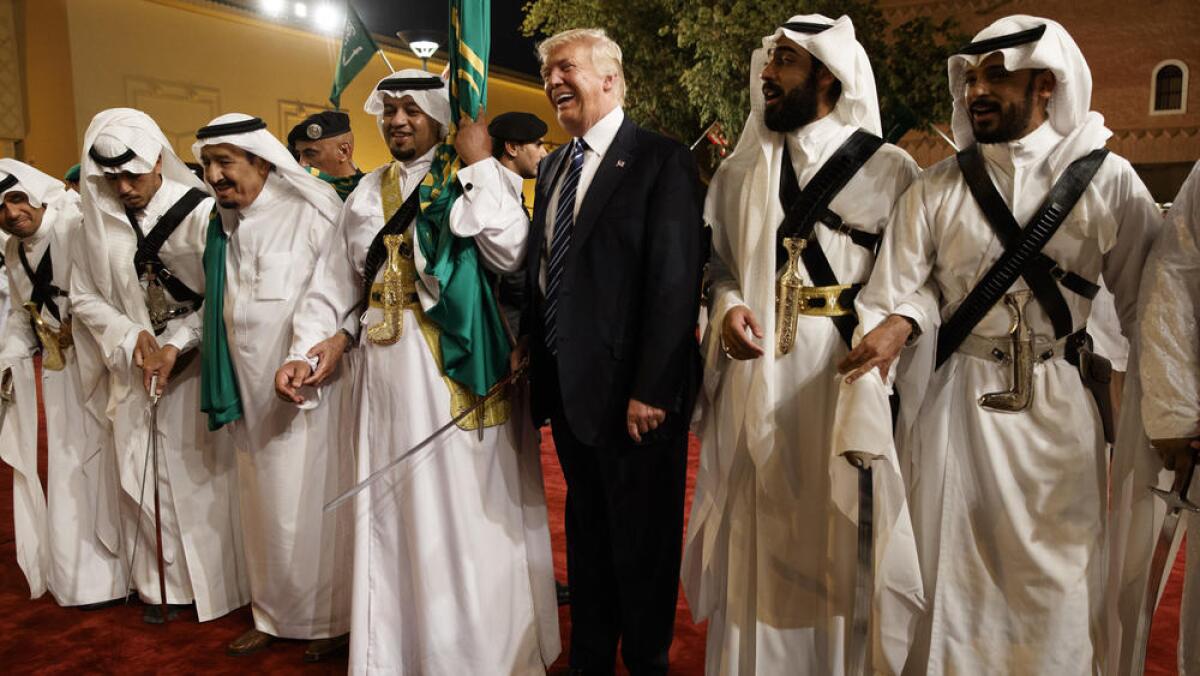
President Trump was greeted with elaborate pomp in Saudi Arabia’s capital Saturday, his first day of a five-country tour that will test his capacity to manage complex international diplomacy while the White House faces a growing political crisis at home.
In choosing the oil-rich kingdom as his first foreign stop since taking office, Trump found a host eager to use all the opulent symbols of state to seek a reboot in relations after the strains of the Obama era.
In a ceremony at the lavish Royal Court, King Salman presented Trump with the nation’s highest honor, the Collar of Abdulaziz Al Saud, for “his quest to enhance security and peace in the region and the world.”
Hours earlier, Salman personally greeted Trump on a red carpet at the foot of Air Force One before a dramatic flyover of military aircraft honored the visiting president.
When President Obama last visited, in April 2016, the king famously snubbed him, sending the governor of Riyadh to welcome him on the runway while the king greeted other visitors at the airport.
If the Saudis worried about Trump’s harsh language during the campaign — when he called for a “total and complete shutdown of Muslims entering the United States” — they clearly had forgiven him.
Melania and Ivanka Trump’s newsmaking style in Saudi Arabia
Melania Trump made her debut on the foreign stage Saturday, stepping off Air Force One in Riyadh, Saudi Arabia, without a head scarf or abaya, the traditional black gown required for most women.
“Thank you for a beautiful welcome to Riyadh,” she tweeted, along with a photo of herself in a pantsuit with large gold belt and matching gold detailing at the neck.
Although her choice to appear bareheaded provoked a flurry of tweets, few here were surprised that the first lady chose to forego a head scarf.
Michelle Obama did the same during a January 2015 visit with then-President Obama.
Donald Trump criticized Mrs. Obama for her decision, saying at the time that the people of Saudi Arabia “were insulted.”
On Friday, some Trump supporters tweeted photos of Obama and Hillary Clinton wearing hijabs, or head scarves, next to pictures of Melania Trump with her long brown hair down.
But former First Lady Laura Bush didn’t wear a scarf to meet the Saudi royal family and neither have female heads of state, such as German Chancellor Angela Merkel and British Prime Minister Theresa May (who also appeared here without abayas).
“We don’t ask anyone to wear a scarf here unless you go into a place of prayer,” said Muna Abu Sulayman, a Saudi television host known as the “Oprah of the Middle East” who was covering the event here wearing a head scarf and abaya.
Melania Trump’s outfit still caused a stir on social media, in part because at first glance, her black pantsuit resembled an abaya. Abu Sulayman started receiving posts in her Whatsapp women’s group as soon as the Trumps landed.
The pantsuit was a hit, although Ivanka Trump — who is more widely known in the kingdom as a style icon and businesswoman — received more plaudits for her choice of attire: a calf length black, white and maroon floral dress.
“They think she looks sexy,” said Abu Sulayman, who agreed, scrolling through messages featuring footage of the Trumps’ arrival.
She thought Melania Trump’s oversized gold belt was a bit much — “somebody else might not have pulled it off” — but appreciated the former model’s modest hemline (she recalled Michelle Obama’s colorful dress was shorter) and choice of black.
“It was a really considerate gesture,” she said, since, “A lot of people associate it with the abaya.”
While most of the focus for the next nine days will be on President Trump as he makes his first international trip as commander in chief, there will be plenty of eyes on the first lady.
“I am very excited for the upcoming trip,” she said in a statement released Friday. “This will not just be an opportunity to support my husband as he works on important matters of national security and foreign relations, it will also be my honor to visit and speak with women and children from different countries, with different perspectives.”
The trip, which includes two days in Saudi Arabia and additional stops in Israel, Rome, Brussels and Sicily, will likely shine an unaccustomed spotlight on the first lady, who hasn’t moved into the White House, staffed an office or outlined a platform.
Melania Trump is the only first lady in recent memory born outside the U.S., in Slovenia, and also lived in Paris and Milan before moving to New York. She speaks five languages, including Italian, which could come in handy during the Italy and Vatican stops.
Her overseas schedule will be packed with events alongside her husband, but she is also expected to venture out on her own, aides said.
“She wants to take advantage of every moment and stop, and thus has a robust independent schedule planned,” East Wing communications director Stephanie Grisham told CNN.
Trump’s erratic style and thirst for a deal has some Israeli officials unnerved
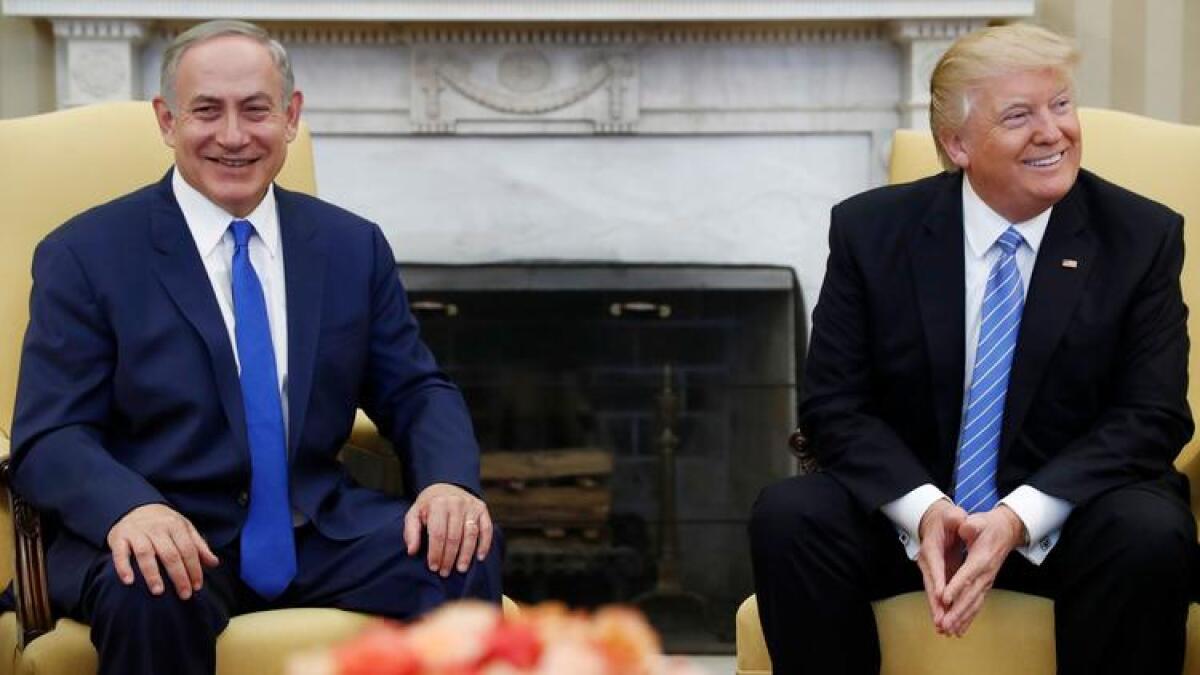
President Trump‘s erratic style and thirst for what he has called “the ultimate deal” has some Israeli officials anxious about how much he might give away if he can restart long-stalled peace talks with Palestinians.
As they await his arrival Monday in Jerusalem, Israeli officials are trying to attune themselves to Trump’s free-wheeling approach to diplomacy and a new cast of unlikely, untested advisors, including Trump’s son-in-law and two of Trump’s long-time personal attorneys.
They worry in part because since taking office, Trump has hesitated on his campaign pledge to move the U.S. Embassy from Tel Aviv to Jerusalem. White House officials fear such a relocation would infuriate Palestinians, who also claim the city as their capital.
Trump arrives in Saudi Arabia, with domestic troubles looming
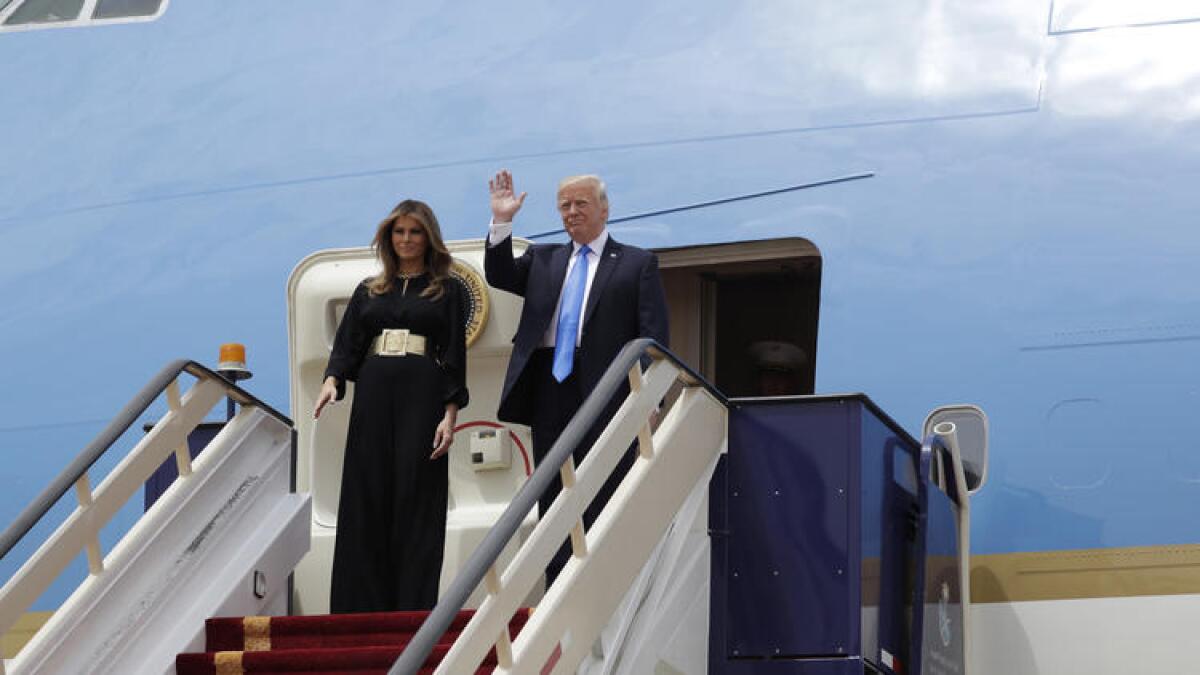
President Trump has arrived in Saudi Arabia’s capital to begin an eight-day foreign tour that will test the new administration’s capacity to manage complex international diplomacy and a growing political crisis at home.
Air Force One touched down at Riyadh’s King Khalid International Airport just before 10 a.m. local time, delivering the Republican who has angered Muslims around the world with his proposed travel ban to the nation that houses Islam’s most holy sites.
Saudi’s royal family is offering an elaborate welcome to a new U.S. president for whom they have great hopes of resetting a bilateral relationship that became increasingly strained during the Obama administration over its pursuit of a nuclear agreement with rival Iran.
White House does not dispute that FBI probe includes at least one Trump aide
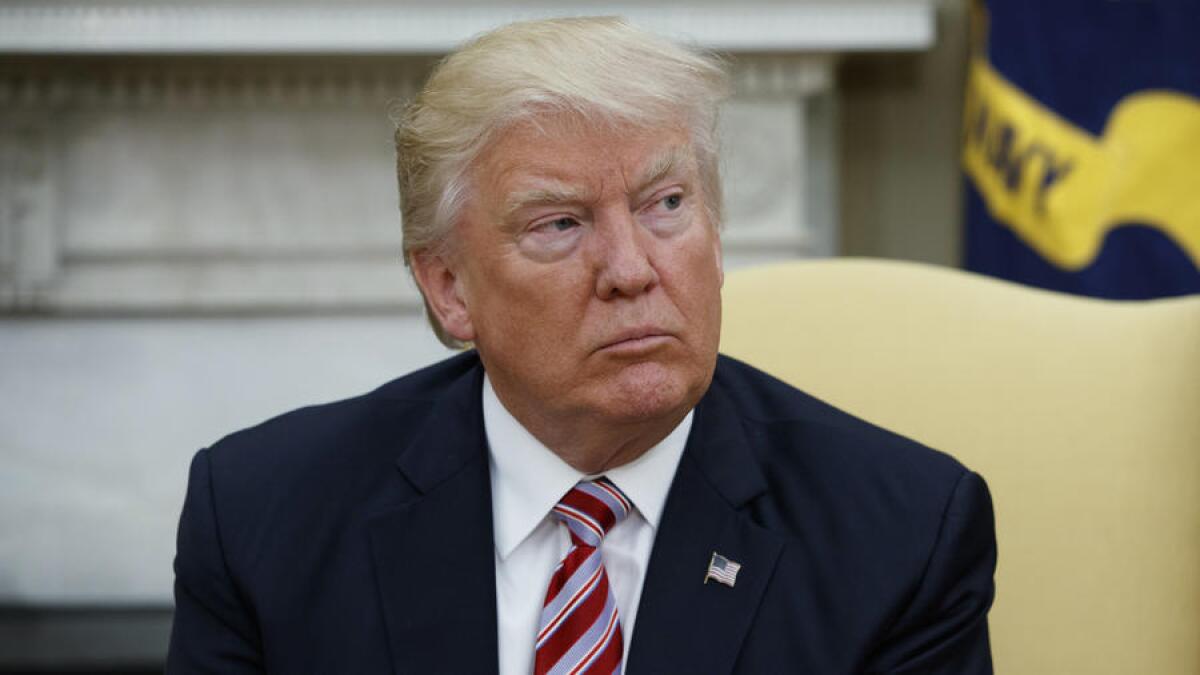
President Trump told a pair of Russian envoys that his abrupt decision to fire FBI Director James B. Comey — whom he described as “crazy, a real nut job” — had relieved “great pressure” on him because of the Russia investigation, according to a published report.
Adding to Trump’s cascading legal and political woes, the FBI investigation reached directly into the White House for the first time Friday with a separate report that an unnamed Trump aide is under federal scrutiny as a person of significant interest.
The White House did not dispute either account, which created a new furor just as Trump was taking off from Andrews Air Force Base on his first official trip overseas, a nine-day visit to five countries in the Middle East and Europe.
Until now, the FBI probe was only known to be focused on whether members of Trump’s campaign or other associates had colluded with Russian intelligence to interfere with the 2016 presidential race.
Trump told Russian diplomats that firing ‘nut job’ Comey from FBI relieved ‘great pressure,’ report says
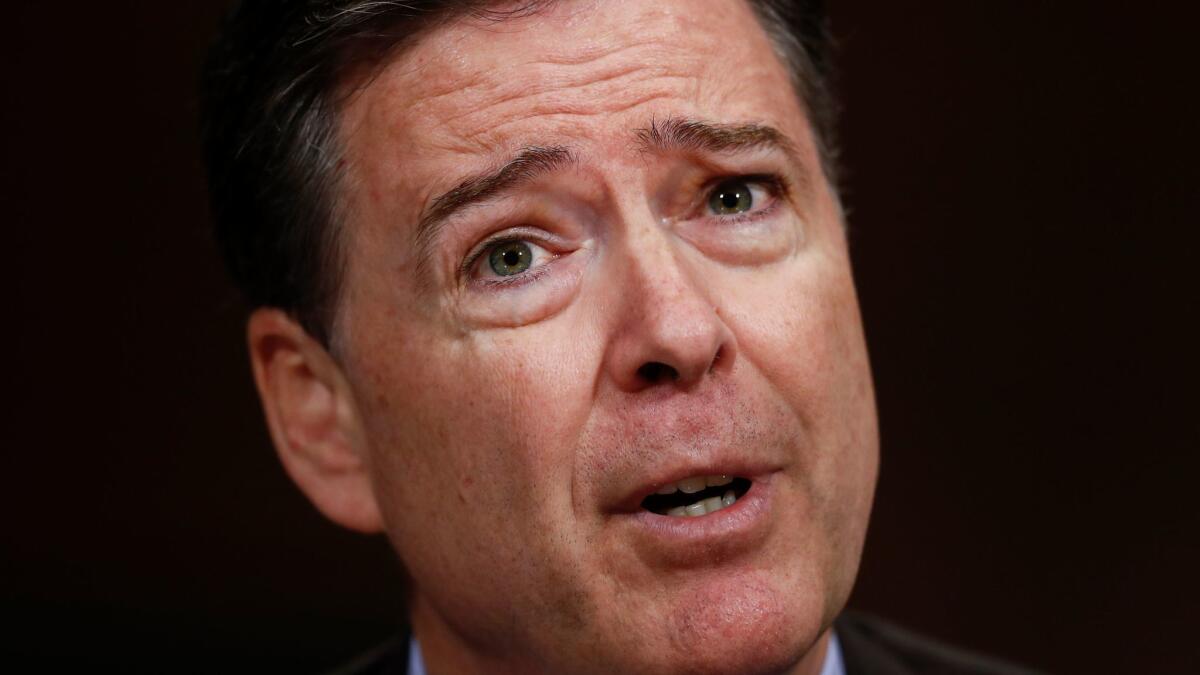
During his meeting with Russian officials last week, President Donald Trump said recently fired FBI Director James Comey was a “nut job” whose ouster relieved “great pressure” on him, according to a report Friday in The New York Times.
The Times cited notes from a May 10 Oval Office meeting, the day after Trump fired Comey.
Separately, The Washington Post reported Friday that the FBI investigation into possible coordination between Russia and the Trump presidential campaign was moving closer to the White House. Law enforcement officials now consider a senior Trump adviser a “person of interest” in the probe, the Post reported, citing people familiar with the matter. The report did not name the adviser.
LATEST: Trump’s Russia troubles worsen even as he heads overseas
The developments were a blow to White House efforts to tamp down interest in the Russia investigation as Trump and his staff boarded Air Force One for Saudi Arabia, first stop on his first foreign trip as president. The details of his comments to the Russians would seem to bolster theories that Trump fired Comey in an effort to choke off the Russia investigation.
Earlier this week, the Justice Department appointed former FBI Director Robert Mueller to take over the federal investigation in an effort to re-establish independence from the White House.
Deputy Attorney General Rod Rosenstein told Congress Friday he stands by a memo he wrote bluntly criticizing Comey. But he made clear it was not his intention for Trump or other White House officials to use the document to justify firing Comey, which is what they have done.
In closed-door meetings with lawmakers on Thursday and Friday, Rosenstein said he wrote the memo after Trump told him one day before the May 9 firing that he wanted to dismiss Comey. Rosenstein said that though he was personally fond of Comey, “I thought it was appropriate to seek a new leader.”
The Justice Department on Friday issued the text of Rosenstein’s opening remarks for the briefings on Capitol Hill. That was two days after Rosenstein named Mueller as a special counsel to investigate possible coordination between Russia and the Trump campaign to influence the 2016 presidential election.
Trump has said he plans to nominate a new FBI director soon, and that had been expected before his departure. However the White House said there would be no announcement Friday.
The appointment of Mueller as special counsel has drawn generally favorable comments from Democrats and from some Republicans as well. But lawmakers at both congressional sessions expressed frustration that Rosenstein would say little in answer to their questions about his actions — or others’ — before Comey’s firing.
“There was considerable frustration in the room,” said Rep. Seth Moulton, D-Mass., a member of the Armed Services Committee. “This renewed my confidence that we should not have confidence in this administration. I don’t think (Rosenstein) did a lot to bolster our confidence in him today.”
The White House has struggled since Comey’s firing to explain the chain of events that led to it and who exactly made the decision. Trump has insisted at times that the decision was his alone, but he also has pointed — as recently as Thursday — to the “very strong” recommendation from Rosenstein.
Rosenstein made it abundantly clear to the lawmakers that he drafted his memo only after Trump told him of his plans to dismiss the FBI director.
“My memorandum is not a statement of reasons to justify a for-cause termination,” he said. But he added, “I wrote it. I believe it. I stand by it.”
The memo focuses on Comey’s handling of the Hillary Clinton email investigation, particularly the FBI director’s decision to divulge details to the public at various junctures. Rosenstein denounced that as “profoundly wrong and unfair.”
House members and senators said Rosenstein in his briefings steered clear of specifics in answering questions about his appointment of Mueller but made clear the former FBI director, will have wide latitude to pursue the investigation, potentially including criminal charges.
Trump has reacted furiously to the appointment. However, at a combative news conference Thursday, he fell short in trying to resolve questions about investigations into his campaign and his first four months in office.
Asked point-blank if he’d done anything that might merit prosecution or even impeachment, Trump said no — and then added of the lingering allegations and questions: “I think it’s totally ridiculous. Everybody thinks so.”
The appointment of the special counsel indicates other believe that’s still open to question.
On Capitol Hill, Rosenstein said that he and Attorney General Jeff Sessions had “discussed the need for new leadership at the FBI” in one of their first meetings, and that he believed Comey had damaged the credibility of the bureau and the Justice Department through the Clinton case. Sessions has recused himself from the Trump-Russia probe, citing his close involvement in the Trump campaign last year.
Rosenstein denied media reports from last week that Comey had asked him for additional resources for his investigation before Trump fired him.
This story was originally published at 12:59 p.m. It has been updated with new information.
Reporter says he was ‘manhandled’ by FCC security at net neutrality meeting
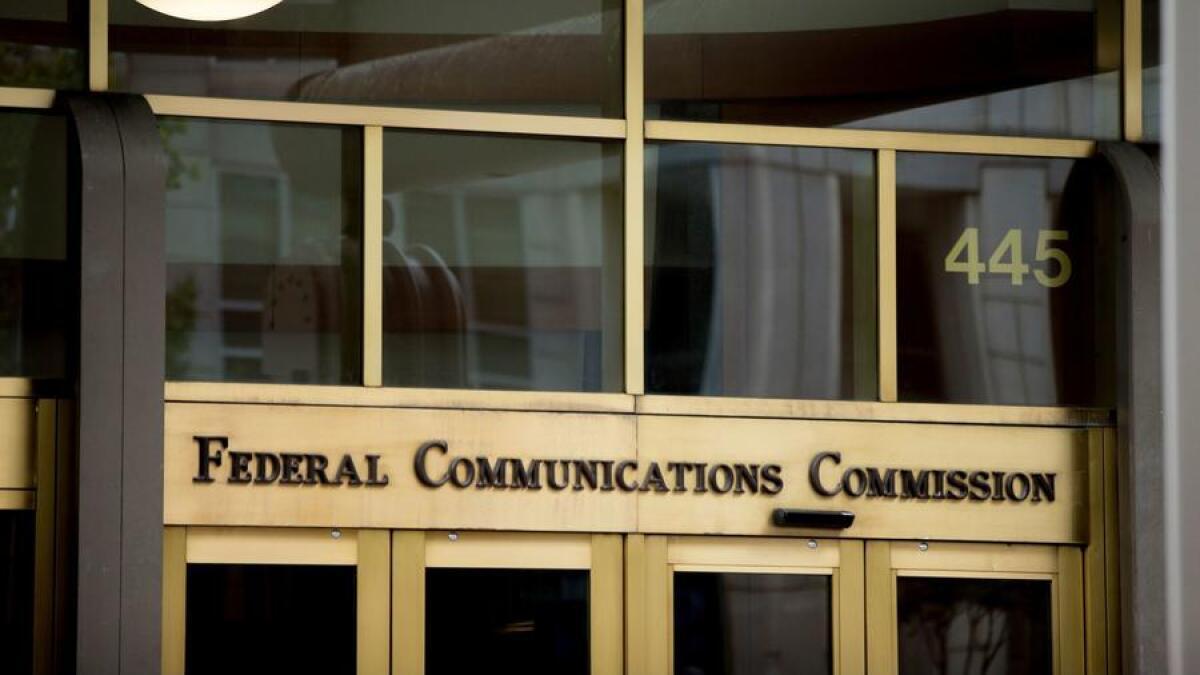
As the Federal Communications Commission considered changes to net neutrality rules designed to preserve an open Internet, some people said the environment at the agency’s public meeting this week was anything but open.
John Donnelly, a reporter for CQ Roll Call, said he was “manhandled” by two FCC security guards when he tried to question Commissioner Michael O’Rielly as he left the room after voting on Thursday to start dismantling the online traffic rules.
“Not only did they get in between me and O’Rielly but they put their shoulders together and simultaneously backed me up into the wall and pinned me to the wall for about 10 seconds just as I started to say, ‘Commissioner O’Rielly, I have a question,’” Donnelly said Friday.
Donnelly said he was stopped long enough to allow O’Rielly to walk away.
Trump speechwriter Stephen Miller, a Santa Monica High grad, pens address for president’s Middle East visit
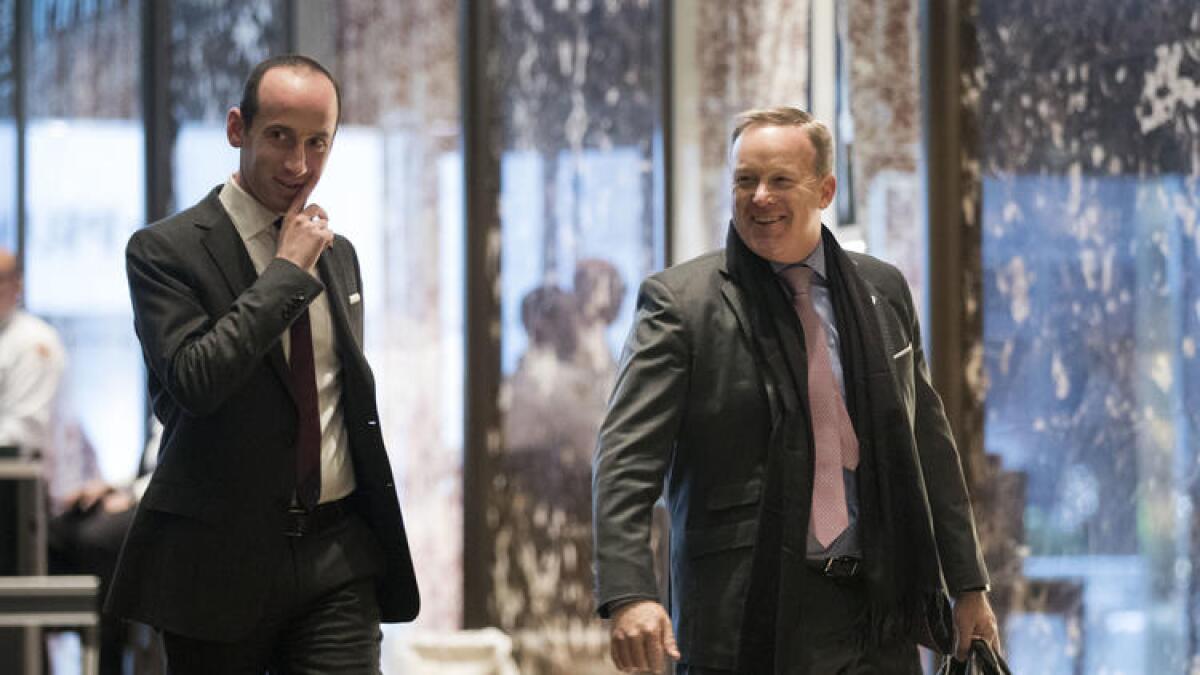
White House adviser Stephen Miller, the firebrand architect of President Trump’s travel ban, penned an early draft of a speech the president is set to deliver on confronting radical ideology Sunday in Saudi Arabia.
Miller, 31, an early ally of Stephen Bannon during his Breitbart News days, is known for his nationalist and populist views, particularly his opposition to increased immigration to the United States. Aides said the initial speech draft was revised after input from Jared Kushner and others to dull its rhetoric.
Here is a Los Angeles Times profile from earlier this year on how Miller’s youth as a conservative contrarian at Santa Monica High School shaped his outlook and led him to Trump’s White House.
Russia probe reportedly has current White House advisor under scrutiny
The Washington Post is reporting that a current senior White House advisor is under scrutiny as part of an investigation into possible coordination between the Trump campaign and Russia.
The newspaper is citing unidentified people familiar with the investigation. The advisor under scrutiny has not been named, but is described as someone close to Trump.
The Post says the revelation comes as the investigation appears to be entering a more open and active phase, with investigators conducting interviews and using a grand jury to issue subpoenas.
Current administration officials who have acknowledged contacts with Russian officials include Trump’s son-in-law, Jared Kushner, Atty. Gen. Jeff Sessions and Secretary of State Rex Tillerson.
Rosenstein briefs Congress for second day. ‘This is about the fight for the soul of our democracy,’ says one lawmaker
Deputy Atty. Gen. Rod Rosenstein returned to Capitol Hill for a second day Friday, an extraordinary briefing for all House members on the naming of a special counsel to investigate Russian interference in the 2016 election and possible links to President Trump’s campaign.
Rosenstein make few new disclosures during the private briefing, but he left lawmakers with the understanding that the probe underway by Special Counsel Robert Mueller III, a former FBI director, will be wide-reaching and attempt to restore Americans’ confidence in the political system.
“This will not be a partisan activity,” said Rep. Darrell Issa (R-Vista), who spoke to reporters afterward. “There was great consensus that going after the Russians for interference with our election is a non-partisan or bipartisan issue… This is about public confidence.”
Lawmakers of both parties are pushing to retain their own investigations, which are already underway through the congressional committees, even as Mueller’s criminal probe takes precedence.
“The Congress has a very significant role, as does the special counsel,” said Rep. Elijah E. Cummings of Maryland, the top Democrat on the House Oversight Committee.
“We’ve got to let this process play out,” he said. “This is about the fight for the soul of our democracy. We can not afford to lose this one.”
Rosenstein delivered opening remarks, as he did the day before in a briefing for all senators, specifically telling lawmakers that he knew Trump wanted FBI Director James B. Comey fired before writing his own memo to the president on his concerns over Comey’s performance.
Murmurs rippled through the secure basement meeting room when Rosenstein was unwilling go further, declining to answer further questions about the reasoning behind his memo, which the White House had initially used as justification for firing Comey. Trump disclosed in an interview days later that he wanted Comey out anyway and that the bureau’s investigation into Russian interference in the election was on his mind when he did so.
“I wrote it. I believe it. I stand by it,” Rosenstein told lawmakers, according to his opening statement.
Rosenstein also disputed reports that Comey had asked for more funding for the Bureau’s investigation.
“I am not aware of any such request,” he said.
Normally, closed-door briefings by administration officials hold limited interest, as lawmakers tend to peel off after initial remarks are delivered.
But Friday’s hour-long session captivated lawmakers, who packed the session, as senators did for Thursday’s all-Senate briefing.
Mueller’s appointment as special counsel has been widely praised by lawmakers in both parties, and many hope the investigation will begin to bring some answers to the chaos that has upended Trump’s White House.
Applause erupted when Rosenstein told lawmakers his intent in naming Mueller to take over the investigation was to restore Americans’ confidence in the political process.
“For the first time there’s this willingness on this particular issue to jointly pushback and to show a level of independence said Rep. Jackie Speier (D-Hillsborough), a member of the House Intelligence Committee.
“Our obligation is to protect this institution for the American people. And if we are not a check on the executive branch, then we are not doing our job.”
Even Republican lawmakers who stand by the president seemed satisfied that Mueller would bring some stability to the questions circling the White House and the GOP.
Rep. Joe Wilson (R-S.C.) sides with Trump’s view that the investigations are a “witch hunt” -- “I actually agree with the president,” he said. But he said he hopes Mueller’s probe can bring some answers. “It was reassuring to me.”
12:37 p..m: This story was updated with additional reaction.
Historically black colleges view Trump administration warily, but also with some optimism
Since taking office, President Trump has pledged “unwavering support” for the critical educational missions of historically black colleges and universities, invited leaders of those institutions to the White House and even dispatched his Education secretary to deliver her first commencement address of graduation season at a historically black school.
The moves, by a president who won just 8% of the black vote in November, have surprised and pleased some African American educators, who say Trump already has outpaced the steps taken by previous administrations, including that of the nation’s first black president, Barack Obama.
While some leaders and groups associated with black colleges have welcomed the young administration’s overtures, others -- notably students -- remain wary of Trump and assail the White House as tone-deaf and insensitive. Those views were on display last week when Education Secretary Betsy DeVos delivered the commencement address at Bethune-Cookman University in Daytona Beach, Fla. As DeVos began to speak, students booed and turned their backs on her.
Since his inauguration, Trump’s most overt outreach to African Americans has been his efforts to woo students and leaders of black colleges that were founded in the years after the Civil War and today include 101 public and private schools nationwide.
Both sides laud Robert Mueller as special counsel, even as Trump says he faces a ‘witch hunt’
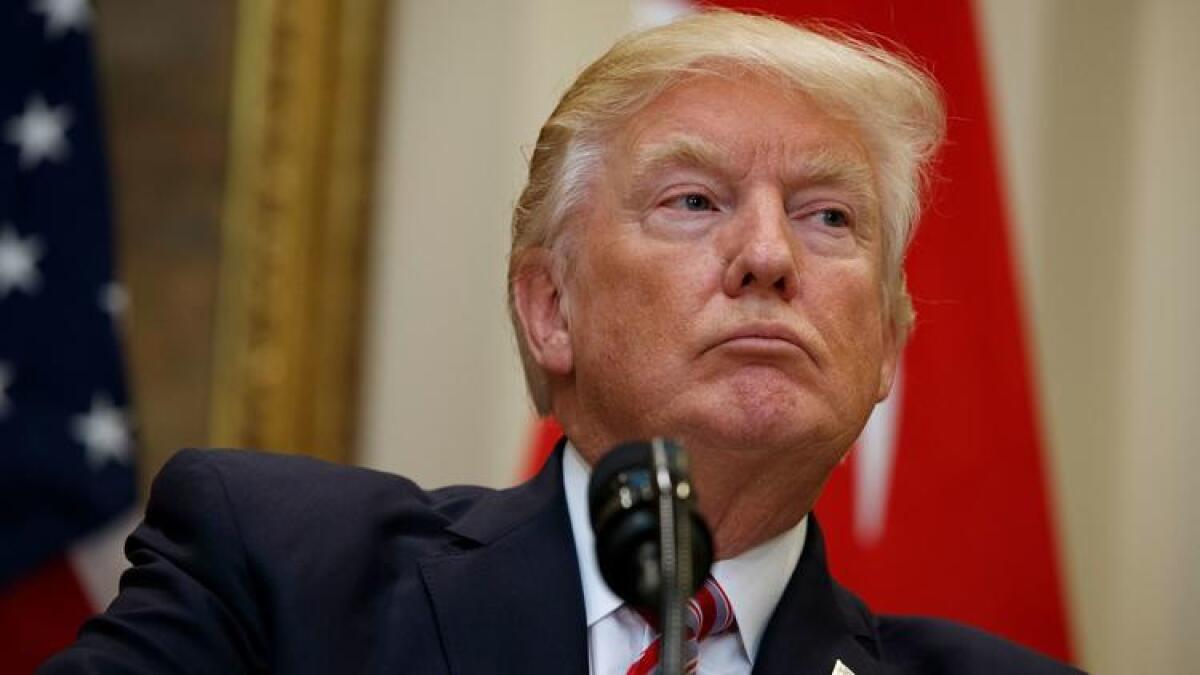
While President Trump said he respects the Justice Department’s decision to name Robert Mueller special counsel of an FBI investigation into possible collusion between Trump’s presidential campaign and Russia, he still insists it’s a non-story -- a “witch hunt.”
“There has been no collusion between certainly myself and the campaign … and the Russians. Zero,” Trump said at a news conference on Thursday.
In a week that’s seen its share of news, the announcement of Mueller as special counsel has mostly been lauded by Democrats and Republicans alike.
Here are some of Friday’s headlines, and a snippet of a radio interview with House Speaker Paul D. Ryan (R-Wis.):
Robert Mueller: A solid choice for Trump-Russia investigation ‘special counsel’ (National Review)
Mueller has served under both Republican and Democratic presidents and has admirers on both sides of the aisle. This piece highlights that bipartisan admiration.
“He is highly regarded by both parties,” writes Andrew C. McCarthy. “This is perhaps best exhibited by the fact that when his ten-year term as the FBI director appointed by President George W. Bush expired in 2011, President Obama asked him to stay on for an additional two years, and Congress quickly agreed to extend his term. He is a straight shooter.”
McCarthy also offers a critique of Democrats.
“Democrats are so Trump-deranged that I suspect, despite Mueller’s solid reputation, they will claim the fix is in if impeachment does not appear to be on the horizon in short order. But most people will give Mueller a chance. And he deserves that,” he writes.
Destroying Donald Trump is all that matters in the newsrooms of the mainstream media (Washington Times)
Almost daily, Trump blames the controversies surrounding his administration on the news media. He and his advisers have branded the media the opposition party.
This op-ed seems to agree.
“There’s no cure or even treatment for Trump Derangement Syndrome, a disease as wild and as swiftly lethal as anything imported from the Ebola River valley of the dark continent,” writes Wesley Pruden. “The rules and taboos that once guided even the sleaziest excuse for a newspaper no longer apply.”
He assails the focus given to Trump’s possible ties to Russia.
“There’s no fire and only a few wisps of something that might be smoke, or more likely, the passing of partisan gas,” he writes.
Ryan on Trump: ‘He clearly did have a bad two weeks’ (Hugh Hewitt)
Well, it seems some Republicans can agree with Democrats on something--the president’s had a few rough weeks. While speaking on conservative talk radio, Ryan offered his take on Trump’s administration as of late.
“Obviously, he clearly did have a bad two weeks, and clearly it’s my hope that he does right the ship, that he improves so that we can just get it going. But just so you know, we’re still doing our work, working with the administration, getting our work done. It’s not as if things stop and we wait for a better news story,” he said on the Hugh Hewitt show on Friday.
Joe Biden slams Hillary Clinton: ‘I never thought she was a great candidate’
Joe Biden has a reputation for saying what’s on his mind, and on Thursday night, he reportedly didn’t hold back at all about former Democratic presidential candidate Hillary Clinton.
“I never thought she was a great candidate. I thought I was a great candidate,” Biden reportedly told an audience of hedge fund managers at the annual SALT conference in Las Vegas.
ALSO: Biden launches new PAC, keeping the 2020 door open
“No man or woman should announce for the presidency unless they genuinely believe that for that moment in the nation’s history they are the most qualified person to deal with the issues facing the country,” Biden continued, according to TheStreet’s Ronald Orol.
Despite his criticism of Clinton as a candidate, Biden did add that he thought Hillary would have been “a really good president.”
Biden had considered running for the Democratic nomination against Clinton and Bernie Sanders in 2016, but decided against it following the death of his son, Beau, in 2015. Biden has repeatedly said his emphasis right now is on his family being “put back together,” but on Thursday, he left the door open about a possible run in 2020.
“If I get those things done, and I’m healthy and viable, and it looks like I’m the best man to do it, I may very well do it,” Biden said. “But my family comes first.
“Could I? Yes,” Biden continued. “Would I? Probably not.”
This isn’t the first time Biden has spoken with regret about the 2016 election. In March, Biden told students at Colgate University in New York that he thought he could have won the election against Trump.
“I had a lot of data and I was fairly confident that if I were the Democratic Party’s nominee, I had a better than even chance to becoming president,” Biden said.
Biden isn’t alone in thinking he could have beaten Trump.
“If Joe Biden would have run against Donald Trump, Biden would have won in a landslide,” Republican Sen. Ben Sasse of Nebraska told the New York Times in April, noting that Trump won largely because of “who his opponent was,” referring to Clinton.
Biden would be nearly 78 years old in 2020. At age 70, President Donald Trump is the oldest president to assume office.
Former Rep. Anthony Weiner pleads guilty in sexting case
Former U.S. Rep. Anthony Weiner pleaded guilty in a case involving his online communications with a teenage girl in North Carolina.
He was charged with transferring obscene material to a minor as part of a plea agreement with the U.S. attorney’s office in Manhattan, the New York Times reported. Weiner surrendered to the FBI early Friday morning and is to appear in court at 11 a.m. EDT.
The FBI began investigating Weiner in September after a 15-year-old North Carolina girl told a tabloid news site that she and the disgraced former politician had exchanged lewd messages for several months.
She also accused him of asking her to undress on camera.
The Democrat’s sexting scandals ended his political career and led to a controversial investigation of Democratic presidential nominee Hillary Clinton before the election.
The investigation of his laptop led to the discovery of a cache of emails from Clinton to her aide Huma Abedin, Weiner’s wife.
Read More---------
UPDATE
8:40 a.m.: Updated with confirmation of Weiner’s plea.
6:47 a.m.: This post was updated to add a report that Weiner will enter a guilty plea.
All is not peachy as Georgia’s special congressional election takes a detour through San Francisco
The commercial plays as a blend of perky exuberance and conservative fever dream.
The characters are a fantasia of Left Coast lunacy: the earnest millennial, the retro-hippie, the girl in chunky glasses, the dude in dreadlocks. Together they happily praise higher taxes, a weak military and the virtues of one Jon Ossoff.
It may be confusing, especially for its audience in the Atlanta suburbs. With the sound off and flashes of Fisherman’s Wharf, the Golden Gate Bridge and a cable car, it could be a tourist promotion for one of America’s most enchanting cities.
But that’s not at all the point.
The purpose of the TV spot is to tie Ossoff, the Democratic candidate in a tight Georgia congressional race, to the supposed depravity and twisted liberalism of San Francisco and its elected representative, Nancy Pelosi. The strategy is older than some of the actors involved.
The artist who projected a message onto Trump’s D.C. Hotel has a new target
Days after a protest message directed at President Trump was projected onto the president’s hotel in D.C., the artist behind the visuals took on a new target: Atty Gen. Jeff Sessions.
Filmmaker and video editor Robin Bell projected his latest message onto the Department of Justice building, calling for Sessions to be fired.
Bell has been working with projections in one form or another since 2001 — first for musical acts, then as a form of activism.
This has included, for example, elaborate messages projected onto the facade of the Environmental Protection Agency headquarters, in collaboration with Defend Our Future, a project of the Environmental Defense Fund, in protest of the nomination of Scott Pruitt to head the agency.
Lawmaker from Salem tells Trump he can think of a worse ‘witch hunt’
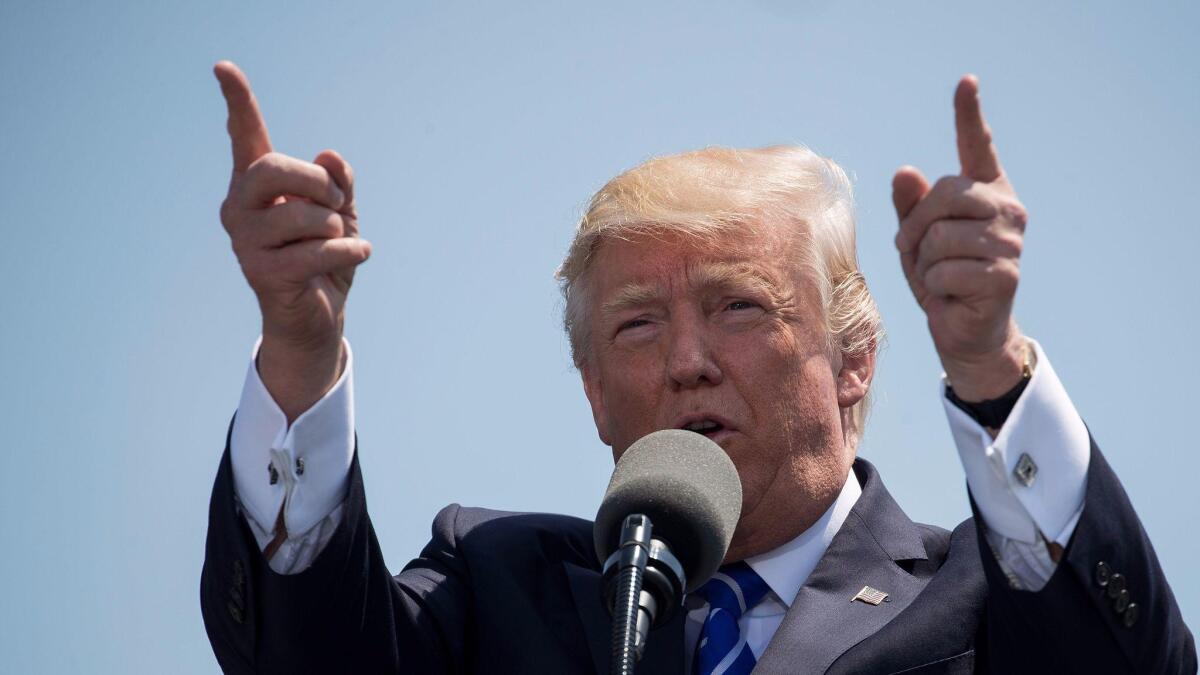
In the early morning hours Thursday, President Trump tweeted an accusation:
“This is the single greatest witch hunt of a politician in American history!”
“This” being the appointment of a special counsel to the Russia investigation that has vexed his presidency from the near-beginning.
Trump reiterated the claim hours later during a news conference with Colombian President Juan Manuel Santos.
One person who disagrees with the president? Rep. Seth Moulton (D-Mass.) of Salem — home to arguably the greatest actual witch hunt in American history.
“I can confirm that this is false,” he tweeted about Trump’s statement.
Some back story.
About 200 people were accused of witchcraft and about 20 were executed during the Salem witch trials of 1692 and 1693. The events were immortalized in Arthur Miller’s 1953 play “The Crucible” and more recently in the 1993 children’s film “Hocus Pocus.”
According to Merriam-Webster dictionary’s website, the first written use of the term “witch hunt” dates to a December 1878 edition of the Tamworth Herald, a newspaper in England.
It wasn’t until the early 1920s that the term took a more figurative meaning, often in reference to political opponents.
Searches for the term on Merriam-Webster’s site have spiked by more than 8,000% since Trump’s tweet.
In recent months, Merriam-Webster has routinely fact-checked, and sometimes corrected, Trump’s off-kilter phrases and word choices.
‘No, no, next question’: Trump says he didn’t urge Comey to back down on investigating Flynn
President Trump denied urging former FBI Director James B. Comey to close or back down from the bureau’s investigation into Trump’s former national security advisor, Michael Flynn.
“No, no, next question,” Trump said when asked by a reporter at a news conference Thursday with Colombia’s president, Juan Manual Santos.
Trump last week fired Comey, who was overseeing the FBI investigation into whether anyone associated with Trump’s campaign cooperated with Russian intelligence officials in their effort to influence the 2016 presidential election.
Trump said it was “ridiculous” to think he may have done anything worthy of criminal charges or impeachment.
“I think it’s totally ridiculous -- everybody thinks so, and again we have to get back to working our country properly so that we can take care of the problems that we have,” Trump said.
Asked about the decision by Deputy Atty. Gen. Rod Rosenstein to name former FBI Director Robert S. Mueller III to oversee the Russia investigation as a special counsel, Trump repeated criticism he made earlier on Twitter.
“I respect the move, but the entire thing has been a witch hunt,” Trump said.
“There has been no collusion between certainly myself and the campaign -- but I can always speak for myself -- and the Russians: zero,” Trump said. He appeared to mean that he could “only” speak for himself.
Trump said the investigation has divided the country and distracted from his agenda. The U.S. has seen job gains, a decrease in illegal border crossings and military success against Islamic State since he became president, he said.
“I’m fine with whatever people want to do, but we have to get back to running this country really, really well,” Trump said.
Trump is close to picking a new FBI director and he’s leaning toward Joe Lieberman
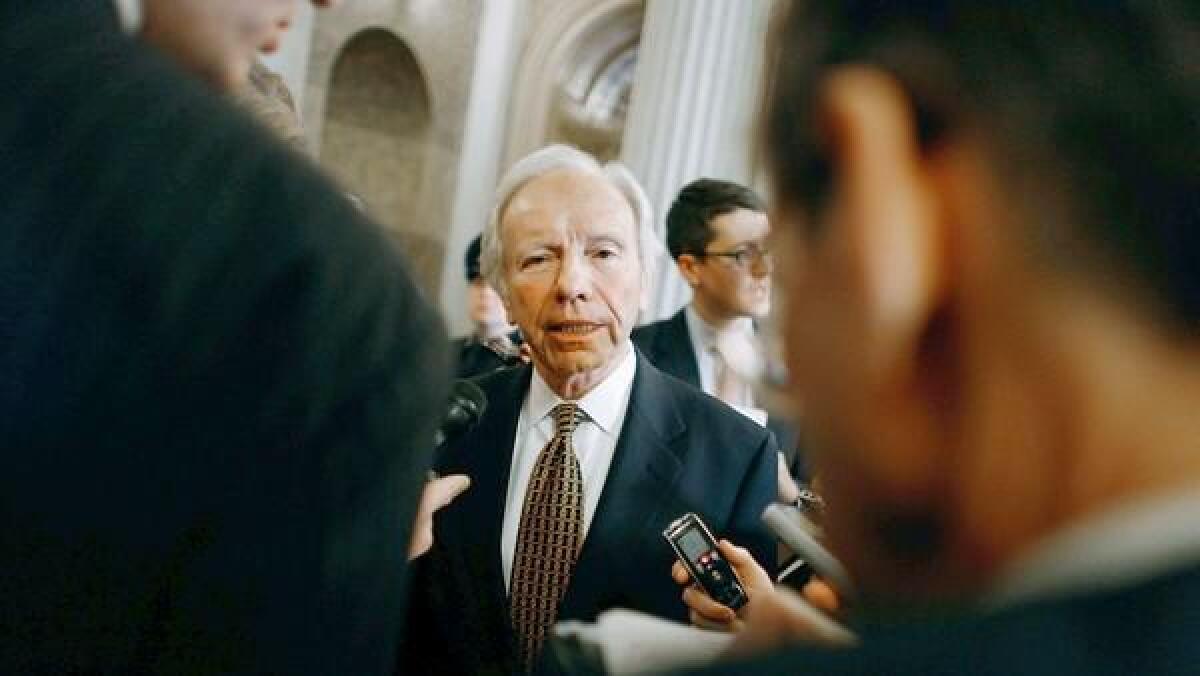
President Trump is leaning toward tapping Joe Lieberman to head the FBI and could announce his pick before he leaves for the Middle East on Friday, a White House official said.
Lieberman, who was Democratic presidential nominee Al Gore’s running mate in the 2000 campaign, made a favorable impression on Trump during a meeting in the White House on Wednesday, the official said.
Lieberman, who is 75, would be an unusual choice and not just because he has limited experience in law enforcement.
He was Connecticut’s attorney general for six years before he was first elected to the U.S. Senate in 1988 and served four terms. He was a Democrat for most of that 24-year period, and unsuccessfully ran for president in 2004.
He later became an independent, and in 2008, spoke at the Republican National Convention to endorse Sen. John McCain (R-Ariz), then the GOP presidential nominee. Lieberman endorsed Hillary Clinton in last year’s election.
During a meeting Thursday with Colombian President Juan Manuel Santos, Trump told reporters Thursday that he’s “very close” to choosing a new FBI director. Asked if Lieberman was one of the finalists, Trump replied “yes.”
Trump has been scrambling to find a new FBI chief since he abruptly fired former FBI Director James B. Comey on May 9.
On Wednesday, the Justice Department appointed an independent special counsel to take over the FBI’s investigation of possible collusion between Trump’s campaign and Russia during last year’s presidential race.
That means a new FBI director won’t have direct oversight of the probe.
It would be unusual to name a former politician to run the FBI, a law enforcement agency that views itself as outside partisan politics. The director’s job has a 10-year term, precisely to avoid a political taint, although few FBI chiefs serve the full term.
Lieberman got a vote of confidence from a former colleague and close friend, Sen. Lindsey Graham (R-S.C.)
“I think Joe Lieberman is a pillar of credibility,” Graham told reporters in the Capitol. “I think he would be a good choice.”
Now that there’s a special counsel, Graham added, the “new FBI director doesn’t have to worry about riding herd over an investigation of the man who appointed him.”
Since leaving the Senate, Lieberman has worked at a large New York law firm that has represented Trump’s business interests in the past.
He helped the Trump administration earlier this year when he introduced Trump’s nominee for Secretary of Education, Betsy DeVos, during her Senate confirmation hearing.
In addition to Lieberman, Trump met Wednesday afternoon with former Oklahoma Gov. Frank Keating, FBI acting director Andrew McCabe and former senior FBI official Richard A. McFeely.
A handful of other candidates interviewed for the job have publicly bowed out.
Rep. Trey Gowdy (R-S.C) withdrew his name on Monday, as did Sen. John Cornyn (R-Tex.), who said he wanted to stay in the Senate to push for conservative legislation.
Alice Fisher, a former senior Justice Department official under President George W. Bush, also withdrew her name.
Rosenstein knew Comey was going to be fired before writing his memo, senators say
Deputy Atty. Gen. Rod Rosenstein knew James B. Comey was about to be fired before writing his scathing memo to President Trump about the FBI director, senators said Thursday.
Rosenstein was briefing senators at a closed-door meeting at the Capitol in the aftermath of Comey’s firing and his own appointment of a special prosecutor to probe Russian interference in the 2016 election and the Trump campaign’s possible connection to that interference.
“He knew that Comey was going to be removed prior to writing his memo,” Sen. Claire McCaskill (D-Mo.) told reporters after emerging from the session.
“He knew the day before,” said Sen. Richard Durbin of Illinois, the No. 2 Democrat. “On May 8 he learned.”
However, Republican Sen. Marco Rubio of Florida did not come to the same conclusion.
“I’m not sure he addressed that with a level of clarity,” Rubio said.
As Robert Mueller takes over the Russia probe, some senators have warned that the congressional panels investigating Russia will lose influence.
“The shock to the body is this is now considered a criminal investigation,” said Sen. Lindsey Graham (R-S.C.), who had opposed naming of a special counsel. “And Congress’ ability to conduct an investigation of all things Russia is severely limited. I think a lot of members wanted the special counsel to be appointed but don’t understand you’re pretty well knocked out of the game.”
Scandals won’t derail Trump’s overseas trip, officials insist
Senior Trump administration officials sought Thursday to dispel concerns that the political scandals swirling around the White House will distract from President Trump’s first official trip abroad.
“This trip will convey that America is back,” Secretary of State Rex Tillerson said in a news conference at the State Department.
Trump departs Friday on an eight-day trip to the Middle East and Europe that the White House hopes will give his administration a chance to reboot after a crippling cascade of problems that came to a head with his abrupt firing of FBI Director James B. Comey.
Trump will visit Saudi Arabia, Israel and Vatican City before he attends NATO and G-7 summits in Brussels and Sicily, respectively.
Tillerson said governments that had felt “neglect and outright dismissal” under President Obama were eager for “the re-engagement of America.”
Obama had notably frosty relations with leaders in Saudi Arabia and Israeli Prime Minister Benjamin Netanyahu. But he was greatly admired in most of Europe, polls showed, and worked closely with Pope Francis to restore diplomatic relations with Cuba.
As part of his “America First” policy, Trump said during last year’s campaign that he was only interested in engaging internationally when the United States stood to gain.
But since taking office he has backed off some of his more provocative foreign policy promises, including withdrawing from the Iran nuclear deal, ditching the NAFTA trade agreement, and declaring China a currency manipulator.
He also authorized an airstrike on a Syrian military airfield in response to what the White House said was a nerve gas attack on civilians.
Tillerson said other governments were especially looking for greater U.S. leadership in the war on terrorism. He said the Trump administration will retake “our role as convener and facilitator.”
He said Trump’s message will be that the battle is not one of religion or culture but “good versus evil.”
“We are all in this together,” he said.
Asked about the multiple investigations of the Trump election campaign and his associates’ possible ties to Russia, Tillerson said most countries “don’t have time to pay attention to what’s happening here.”
Homeland Security Secretary John Kelly concurred, saying his recent meetings in Jordan and Saudi Arabia conveyed no concern.
“I feel no effect ... when the president is taken to task by the press,” Kelly said.
Tillerson and Kelly spoke to reporters after a meeting with their Mexican counterparts, Foreign Secretary Luis Videgaray and Interior Minister Miguel Angel Osorio Chong, to discuss cross-border security and drug-trafficking.
Tillerson puts onus of drug trafficking crisis on consumption by Americans
It has long been a Mexican talking point.
But on Thursday, it was the top U.S. diplomat who said the root of the deadly drug trafficking crisis killing thousands of people on both sides of the border was American drug habits.
“Americans must confront the reality that we are the market,” Secretary of State Rex Tillerson said. “We Americans must own this problem.”
Tillerson spoke after the latest in a series of meetings between senior U.S. and Mexican officials on security, drug trafficking, violence and related issues.
Both Tillerson and his Mexican counterpart, Luis Videgaray, spoke of new strategies involving “joint” and “integral” approaches, but offered little details.
Videgaray acknowledged they had no firm agreement but said both sides had a better understanding of the magnitude of the drug crisis.
Tillerson said drug trafficking had to be addressed as a “business model,” attacking cash flow, gun procurement, production and distribution.
Mexicans long have argued that U.S. counter-narcotics strategies have failed to focus on the demand side: U.S. addicts and recreational users consuming huge amounts of cocaine, heroin and marijuana that is smuggled in from Mexico by violent drug cartels.
That, Tillerson said, must change.
“But for us,” Tillerson said, “Mexico wouldn’t have the trans-criminal organized crime problem and the violence that they’re suffering. ... We really have to own up to that.”
Tillerson was joined by Homeland Security Secretary John Kelly, and both sought to emphasize a willingness to cooperate with Mexico despite strained relations at the start of the Trump administration.
U.S. military says it conducted airstrike on pro-government forces in Syria
U.S. warplanes conducted airstrikes on forces believed to be loyal to Syrian President Bashar Assad in southern Syria on Thursday as a protection measure for U.S. forces based in the region, U.S. officials said.
The airstrikes, in the southern town of Tanf, mark the first time that the U.S. military deliberately hit the regime out of a perceived threat for American troops, which have steadily increased in numbers in recent months throughout Syria.
U.S. commanders became concerned when they saw tanks, bulldozers and other heavy equipment advance into a “de-confliction” zone without authorization near a base where U.S. forces were located, according to the officials, who spoke about the incident after requesting anonymity because they were not authorized to discuss the matter publicly.
It was not clear if the advancing forces were Syrian army troops or other pro-government allies, but they were flying Syrian flags and began constructing berms and fighting positions, officials said.
It’s been publicly known for nearly a year that U.S. special operations forces operate out of the base, near where the borders of Jordan, Iraq and Syria meet, training Syrian rebels in their fight against Islamic State militants. Pentagon officials have said in the past that the U.S. military would defend its forces if they were threatened inside Syria by Assad’s government.
The U.S. military does not speak with the Syrian government. So U.S. military commanders, at an air command center in Qatar, called their Russian counterparts on a special hotline set up to ensure the two countries’ pilots do not mistakenly run into — or fire upon — one another in the skies above Syria.
After warning the Russians of the impending strikes, the United States flew near the Syrian ground forces and fired a warning shot as a “show of force,” officials said. After the ground forces continued their activity, the U.S. carried out the airstrike, the officials said.
The strike is the second time this year the U.S. military has targeted Syrian forces. The U.S. military attacked a Syria-government airfield with 59 Tomahawk cruise missiles on April 6 in response to a chemical attack that killed dozens of civilians, including children.
Senate panel now says it has not received a subpoena response from Flynn’s lawyer after chairman’s contrary comments
The Senate Intelligence Committee corrected comments its chairman made early Thursday regarding fired national security advisor Michael Flynn, saying it had not received a response from Flynn’s lawyer stating that he would not honor a subpoena for private documents.
Panel Chairman Sen. Richard M. Burr, a Republican from North Carolina, had said earlier Thursday that a lawyer had informed the committee of Flynn’s decision to refuse to answer the subpoena.
The committee is one of several on Capitol Hill investigating possible collusion between Russia and President Trump’s 2016 campaign.
Flynn was ousted in mid-February after less than a month in his senior administration post.
UPDATES:
10:11 a.m.: This post was updated with the Senate panel disclosing that it had not, in fact, received a response from Flynn’s lawyer.
This post was originally published 8:32 a.m.
Utah Rep. Jason Chaffetz expected to leave office by the end of June, state leader says
A top Utah state lawmaker says that U.S. Rep. Jason Chaffetz is expected to leave office by the end of June.
Utah House Speaker Greg Hughes said Wednesday in a caucus meeting that the Republican Chaffetz is expected to announce his resignation soon and that it would take effect by June 30.
Chaffetz representatives on Thursday did not return telephone and email messages seeking comment.
Chaffetz said last month that he would not seek reelection in 2018 and that he was considering leaving office early.
Hughes’ chief of staff Greg Hartley said in a text Thursday that Hughes “has heard that he [Chaffetz] could be out of office as soon as the end of June. He doesn’t know for certain.”
FCC takes first step to repeal tough net neutrality rules
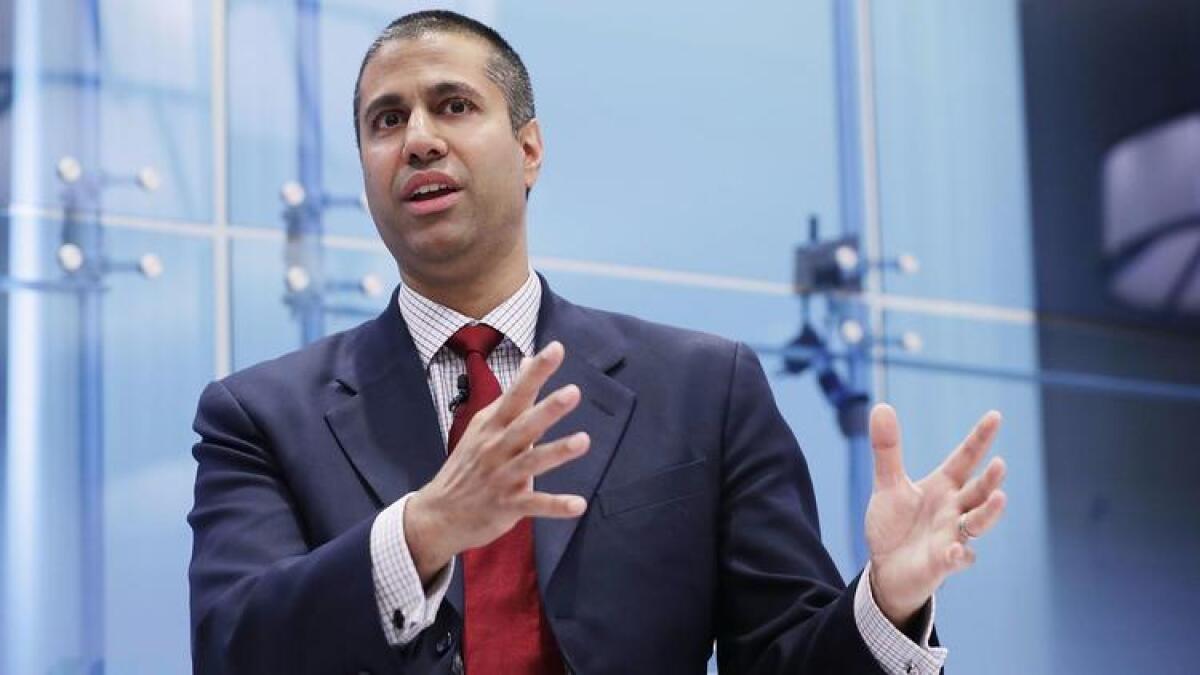
Federal regulators on Thursday took the first formal step toward repealing tough net neutrality rules enacted two years ago that imposed strict oversight of Internet service providers to ensure the unfettered flow of online content.
The move by the Federal Communications Commission — cheered on by major broadband companies and strongly opposed by consumer advocates — is part of a broader effort by Republicans since President Trump took office to undo regulations enacted during the Obama era.
With net neutrality supporters, including Sen. Edward J. Markey (D-Mass.), protesting outside the agency’s building, the Republican-controlled FCC voted 2-1 along party lines to start a formal, months-long process of dismantling the rules put in place in 2015
The FCC said the goal was to restore the “light-touch” regulation that had allowed the Internet to flourish.
Trump administration takes formal step to launch renegotiation of NAFTA
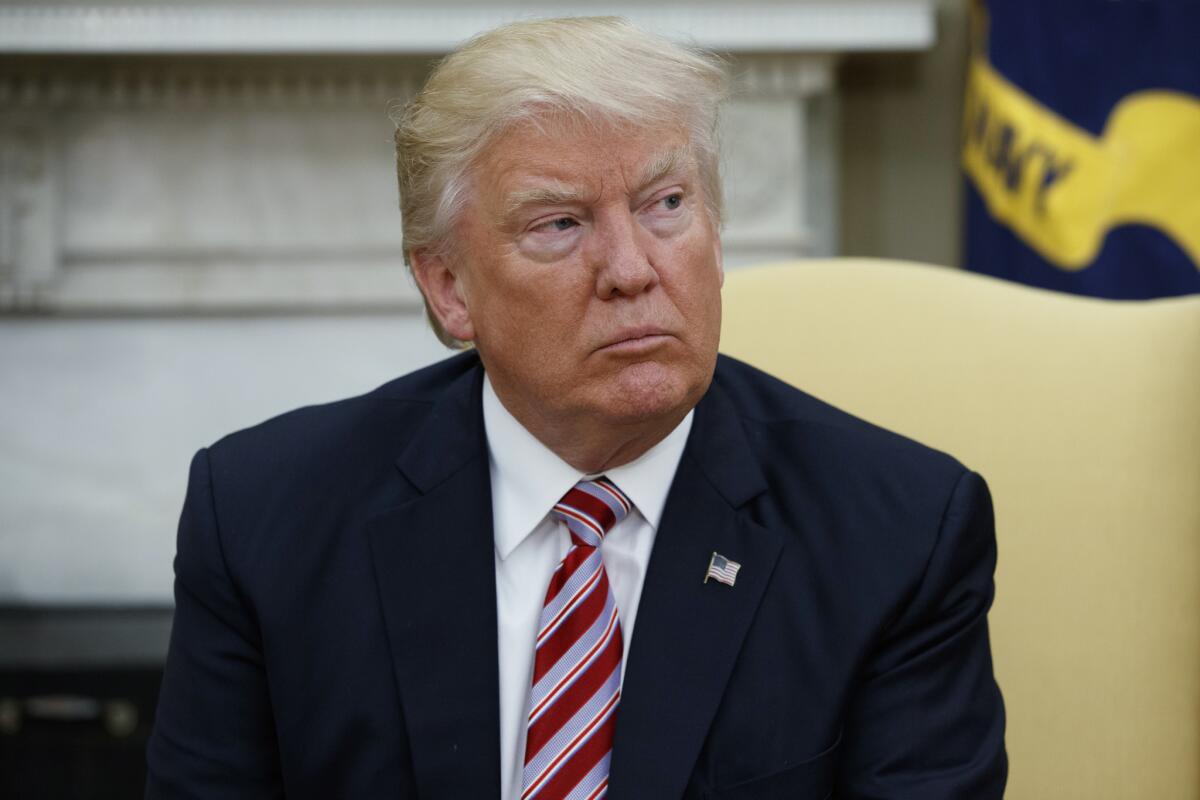
The Trump administration, taking the first formal step toward overhauling the North American Free Trade Agreement, on Thursday notified Congress of its intent to renegotiate the pact with Canada and Mexico in 90 days.
The letter to lawmakers, sent by the newly confirmed U.S. Trade Representative Robert Lighthizer, means that Trump’s trade officials could launch talks with Canadian and Mexican officials as soon as Aug. 16.
Lighthizer, during a hastily called telephone briefing with reporters, said that in giving notice to Congress of a 90-day consultation period – which is required under so-called fast-track trade legislation – President Trump was moving to fulfill his promise to “permanently reverse the dangerous trajectory of American trade.”
During the campaign and as president, Trump repeatedly trashed NAFTA as a “disaster,” calling it the worst trade agreement ever. Just weeks ago, Trump said he was close to issuing an order to withdraw from NAFTA, only to reconsider the action hours later.
Lighthizer, a veteran trade lawyer and negotiator who was confirmed last week as Trump’s last Cabinet member, on Thursday took a much more conciliatory tone.
Although Trump has often held out the threat of pulling out of NAFTA, Lighthizer said that his hope and expectation was that such action would not be necessary, noting that “as a starting point for renegotiations, we should build what has worked in NAFTA and change what has not.”
He called his Mexican and Canadian trade counterparts “tremendously talented individuals,” and said the parties were “all entering the process in good faith.”
Canada and Mexico are the United States’ top trading partners after China. Two-way trade in goods and services between the U.S. and Canada has nearly tripled since NAFTA took effect, and U.S. trade with Mexico has jumped more than six-fold since then. Last year the U.S. had a $62.7 billion trade deficit with Mexico and a $8 billion surplus with Canada.
Lighthizer said he believed that NAFTA, which took effect in January 1994, had proved successful for some sectors, including investment services, agriculture and energy. But he singled out manufacturing as an area of deficiency, particularly involving Mexico.
He also noted that the 23-year-old agreement did not include provisions related to digital trade and that matters of the environment were “an afterthought.”
“Our aim is that NAFTA be modernized,” Lighthizer said in a letter notifying Senate and House leaders of both parties. Among the provisions that Lighthizer cited that would be addressed are intellectual property rights, regulatory practices, state-owned enterprises, labor and environment. The list did not mention currency practices, something that congressional Democrats have sought to be included in trade deals, as have such groups as labor unions and the American Automotive Policy Council, a lobbying group for Ford, General Motors and Fiat Chrysler.
While lawmakers had anticipated the notification, their reaction to it Thursday reflected a range of attitudes reflecting the complicated trade politics in which Trump will be relying largely on Democratic members to push through significant changes in the agreement.
Rep. Henry Cuellar (D-Texas), who represents a border district in the Laredo area, said he was glad to see that the administration was moving to “update NAFTA, not dismantle it.”
Sen. Bob Casey (D-Pa.), calling NAFTA “deeply flawed,” commended the step to overhaul the agreement but insisted that “we must see real details on how the administration intends to level the playing field for our workers.”
Many Republican lawmakers have been wary of Trump’s anti-free trade rhetoric, and concerned about the risks of hurting the economy in opening up NAFTA.
“Congress looks forward to working hand-in-hand with the Trump administration to achieve the best deal possible for American workers and our economy,” said House Speaker Paul Ryan (R-Wis.).
Lighthizer’s letter did not mention specific areas in manufacturing that he planned to address, but Trump and his administration officials, including Commerce Secretary Wilbur Ross, who with Lighthizer is leading the charge on trade, have been particularly critical of NAFTA’s effect on domestic car production and suppliers, many of them now in Mexico.
Trump’s trade officials also are likely to try to limit Canadian and Mexican companies’ access to U.S. government procurement contracts, and the administration is almost certain to seek the elimination of a provision that allows an arbitration panel to decide complaints about goods that are allegedly dumped or subsidized by governments – a change that Canada in particular is expected to resist.
Chrystia Freeland, Canada’s minister of Foreign Affairs, acknowledging the notification to the U.S. Congress, said Thursday: ““We are at an important juncture that offers us an opportunity to determine how we can best align NAFTA to new realities — and integrate progressive, free and fair approaches to trade and investment.”
The Trump administration recently slapped tariffs on Canadian lumber shipped to the U.S., claiming they are unfairly subsidized, and the two sides have sparred over Canada’s dairy import policies.
Like Canada, Mexico has been preparing for the negotiations by consulting with domestic businesses and other parties. Trump had threatened to levy tariffs on Mexican goods, sparking concerns about a trade war, and bilateral tensions rose earlier this year when Trump insisted that Mexico pay for a wall across the border.
On Thursday, the Mexican government issued a statement that it “welcomes this important step in the United States’ domestic process to modernize NAFTA. We reaffirm our willingness to update the agreement in order to successfully address the challenges of the 21st century.”
In keeping with Trump’s belief that the U.S. has been short-changed in multilateral trade agreements, Lighthizer said he expected a lot of the negotiations to be bilateral, although he did not take a hardened position on that.
In the letter to lawmakers released Thursday morning by his office, Lighthizer described the broad goal of opening up NAFTA as getting a deal that would produce higher-paying jobs for Americans and grow the economy. Lighthizer said specific U.S. objectives for a revised NAFTA would be provided to Congress at least 30 days before the start of the talks.
Lighthizer said he hoped that negotiations could be concluded this year.
1:30 p.m.: This story was updated with additional reaction.
Trump lashes out at special counsel, once again undercutting White House message
President Trump doesn’t seem to be responding well to the appointment of a special counsel to head the investigation into whether anyone tied to his campaign cooperated in Russian efforts to affect the outcome of the 2016 election.
As usual, he took to Twitter to express his thoughts -- and send a message to his followers.
His reaction undercut the carefully measured statement the White House issued last night after Deputy Atty. Gen. Rod J. Rosenstein announced that Robert Mueller, the former head of the FBI, would head the investigation.
That statement in Trump’s name said nothing specifically about the special counsel, but declared that “as I have stated many times, a thorough investigation will confirm what we already know — there was no collusion between my campaign and any foreign entity,”
Rosenstein’s announcement took White House officials by surprise. He did not inform either the White House or Atty. Gen. Jeff Sessions about the appointment of Mueller until after the order had been signed.
Rosenstein heads to Capitol Hill today to give senators a briefing about the investigation.
In Montana, miles from Trump’s Russia crisis, there’s no clamor to impeach
In Washington, some people — Democrats mainly — are practically counting down the days left in Donald Trump’s presidency, as one stunning revelation quickly overruns another.
But outside the Beltway, where people aren’t glued to cable TV for the latest on FBI Director James B. Comey’s firing, or consumed with their Twitter feed for the latest on Trump divulging sensitive intelligence to Russia, there is hardly the same sense of urgency, much less crisis.
“Fake news,” shrugged Bob Winninghoff, 84, a Republican who used to sell Fords for a living here in rural western Montana.
Are net neutrality supporters wasting their time by filing comments at the FCC?
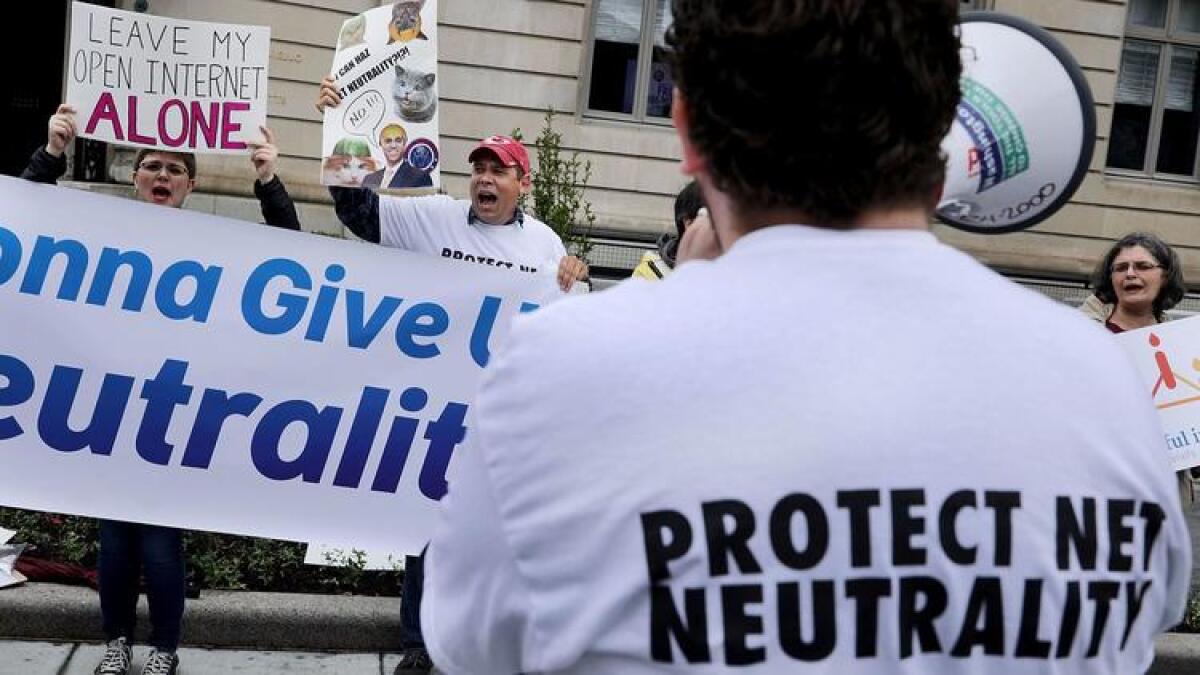
A warning to the hundreds of thousands of people publicly urging the Federal Communications Commission to keep its tough net neutrality rules:
You might be wasting your time.
Three years ago, a historic outpouring of about 4 million public comments — fueled by a viral video rant by HBO’s John Oliver — led the then-Democratic-controlled agency to install strict oversight of Internet service providers to ensure they allow the unfettered flow of online content.
But President Trump’s election shifted control of the FCC to Republicans. They oppose the current rules and on Thursday are expected to vote to formally start the process of repealing them.
This time, the FCC’s Republicans have indicated they won’t be swayed by the electronic messages flooding the agency’s website.
13 years ago, Comey and Mueller teamed up to prevent coercion by the Bush administration
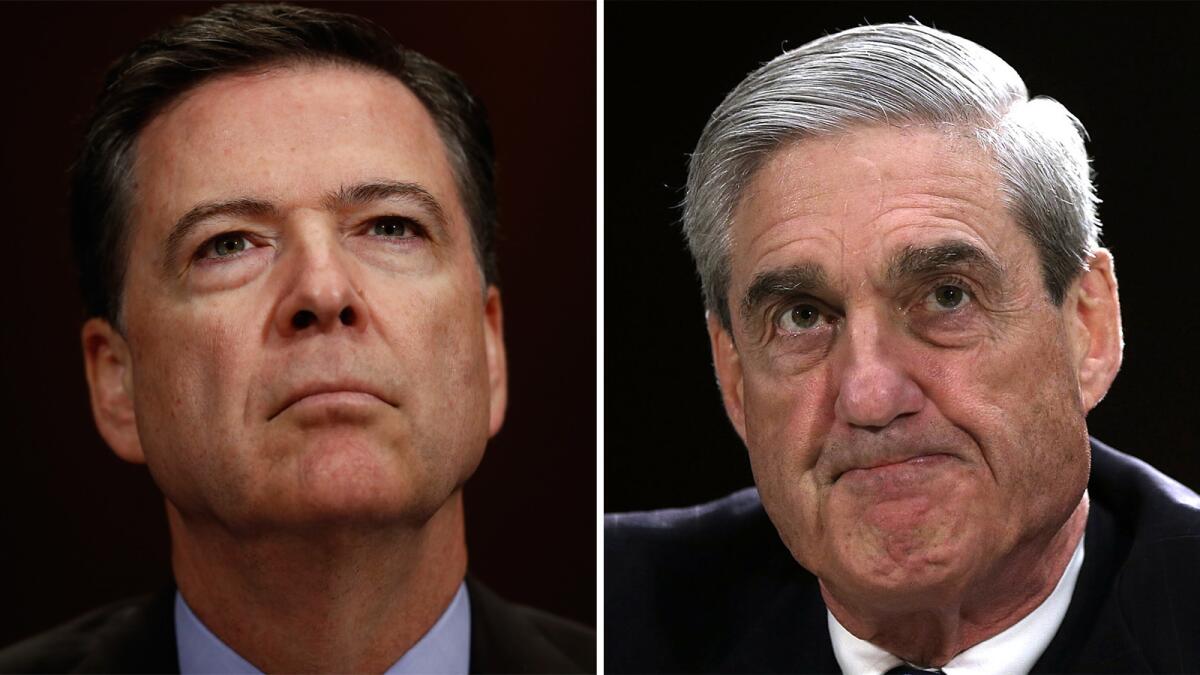
It’s not the first time James B. Comey and Robert S. Mueller III find themselves together at the center of an unfolding Washington drama.
In March 2004, Comey, then deputy attorney general, was summoned to the hospital bed of his boss, Atty. Gen. John Ashcroft.
Ashcroft, weak from gallbladder surgery, was under pressure from White House officials Alberto Gonzales and Andrew Card to sign papers reauthorizing the domestic surveillance program secretly launched after the Sept. 11 terrorist attacks.
Ashcroft’s wife was distraught about the visit from the White House counsel and chief of staff, according to testimony Comey later gave to a Senate committee.
She called Comey to stop the uninvited visitors. Just the previous week, her husband had agreed not to reinstate the program.
Comey called in help, asking Mueller, then the FBI director, and several top aides to meet him at the hospital.
Congress welcomes Robert Mueller as special counsel, some more enthusiastically than others
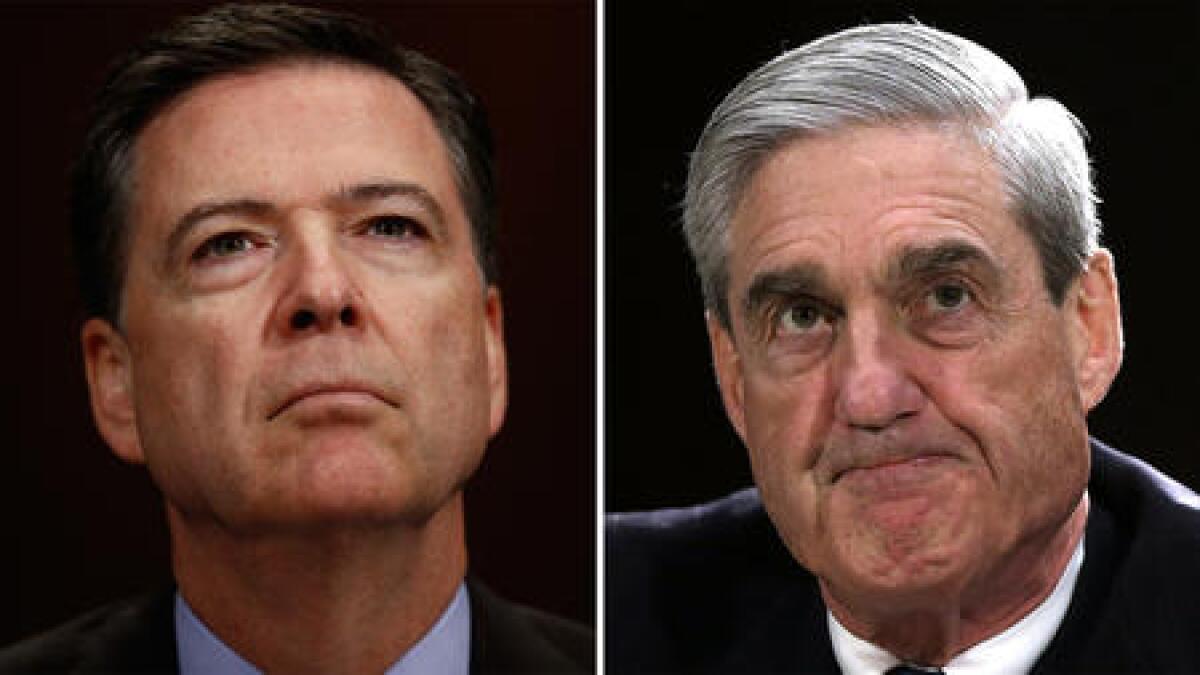
Reaction in Congress was lopsided over the appointment of Robert S. Mueller III as a special counsel to investigate Russian interference in the election and possible links to President Trump’s campaign, as Democrats welcomed the inquiry and Republicans gave lukewarm support.
Senate Minority Leader Charles E. Schumer (D-N.Y.) called the appointment late Wednesday “very much needed.”
Schumer said Deputy Atty. Gen. Rod Rosenstein did “the right thing” by naming Mueller to the job.
But Republicans, who have preferred to keep the investigation relegated to congressional committees, were less enthused and slower to react.
Senate Majority Leader Mitch McConnell (R-Ky.) said the appointment “confirms that the investigation into Russian intervention into our election will continue.”
House Speaker Paul D. Ryan (R-Wis.) said: “My priority has been to ensure thorough and independent investigations are allowed to follow the facts wherever they may lead.... The addition of Robert Mueller as special counsel is consistent with this goal.”
Mueller is a widely praised figure on Capitol Hill, having served as the FBI director under Presidents George W. Bush and Obama, with backing from both sides of the aisle.
“It’s fine. I just don’t think there is any need for it,” said Rep. Peter T. King (R-N.Y.), who blamed the interest in Trump’s potential dealings with the Russians on “a rabid press corps and a very intense Democratic Party.”
“I am satisfied there is nothing there. If there is something there, I am sure they will find it. But you don’t need Mueller to do that,” King said.
Other Republicans, though, said the appointment was needed.
“For the sake of the country, all parties must fully cooperate with his efforts,” Sen. Marco Rubio (R-Fla.) said.
But House Minority Leader Nancy Pelosi (D-San Francisco), who has repeatedly pressed for an independent committee to investigate, said, “A special prosecutor is the first step, but it cannot be the last.”
“He cannot take the place of a truly independent, outside commission that is completely free from the Trump administration’s meddling,” Pelosi said.
Special counsel named to head Russia investigation; White House caught by surprise
The Justice Department on Wednesday named a special counsel, former FBI Director Robert S. Mueller III, to take over the investigation of Russian meddling in the 2016 election and possible collusion between Russian agents and associates of President Trump.
The move heightened the legal and political stakes for the president and his young administration. It came after days of allegations against Trump raised new questions about whether administration officials could oversee an inquiry that has the president at its center.
“My decision is not a finding that crimes have been committed or that prosecution is warranted,” Deputy Atty. Gen. Rod Rosenstein said in announcing the appointment. “I have made no such determination.”
But, he said, a special counsel is necessary in order for the “American people to have full confidence in the outcome” of the investigation.
“The public interest requires me to place this investigation under the authority of a person who exercises a degree of independence from the normal chain of command,” Rosenstein wrote.
The president, in a statement, reiterated his insistence that he is innocent of wrongdoing.
“As I have stated many times, a thorough investigation will confirm what we already know – there was no collusion between my campaign and any foreign entity,” Trump said.
“I look forward to this matter concluding quickly. In the meantime, I will never stop fighting for the people and the issues that matter most to the future of our country.”
Rosenstein, who is overseeing the Russia investigation because Atty. Gen. Jeff Sessions recused himself, did not inform either the White House or Sessions about the decision until after he had signed the order appointing Mueller, according to a Justice Department spokesperson who spoke on condition of anonymity.
About half an hour before the order was made public, a Justice Department official informed White House Counsel Don McGahn. Trump spokesman Sean Spicer abruptly left a scheduled meeting with reporters as White House aides huddled to draft a response.
As recently as Monday, Spicer had insisted that “there’s frankly no need for a special prosecutor” when reporters pressed him about calls in Congress for such an appointment.
Mueller, a former federal prosecutor who served as U.S. attorney in San Francisco under President Clinton and was named FBI director by President George W. Bush, is well regarded as a nonpartisan figure. He was FBI director for 12 years, kept on by President Obama.
In the Bush administration, Mueller worked closely with James B. Comey, his successor as FBI director, who was fired last week by Trump.
His appointment drew praise from Democrats who have been demanding an independent counsel.
“Rosenstein has done the right thing,” Senate Democratic leader Charles E. Schumer of New York said.
“I now have significantly greater confidence that the investigation will follow the facts wherever they lead.”
House Democratic leader Nancy Pelosi offered more measured approval.
“A special prosecutor is the first step, but it cannot be the last,” she said. “He cannot take the place of a truly independent, outside commission that is completely free from the Trump administration’s meddling.”
Sen. Dianne Feinstein, a Democrat who knows Mueller well from his years in the Bay Area, her base, said there was “no better person who could be asked to perform this function. He is respected, he is talented and he has the knowledge and ability to do the right thing.”
John Ashcroft, the former attorney general under Bush, who worked with Mueller in the chaotic first days after the Sept. 11, 2001, terrorist attacks, praised him in an interview on Wednesday.
“It’s impossible to think about Washington without politics blowing people off course,” Ashcroft said. “But if anyone can stay on course and not be deterred by the whims of politics, it’s Bob Mueller.”
“He won’t be swayed by the barking dogs. He’ll go after the facts.”
Some Republicans, however, were nonplussed.
“It’s fine,” said Rep. Pete T. King of New York, who called Mueller a “solid guy.”
“I just don’t think there is any need for it.”
Mueller will have the ability to hire a staff and request a budget from the Department of Justice. He will resign from his law firm, WilmerHale.
The appointment is only the second time that those special counsel rules have been invoked.
The first was the 1999 appointment of former U.S. Sen. Jack Danforth to investigate the deadly siege of the Branch Davidian compound in Waco, Texas.
Patrick Fitzgerald’s investigation into the leaking by the White House of a clandestine CIA operative’s name wasn’t made under this rule since Fitzgerald was already working for the Department of Justice.
Trump says investigation will show no collusion between his campaign and Russia
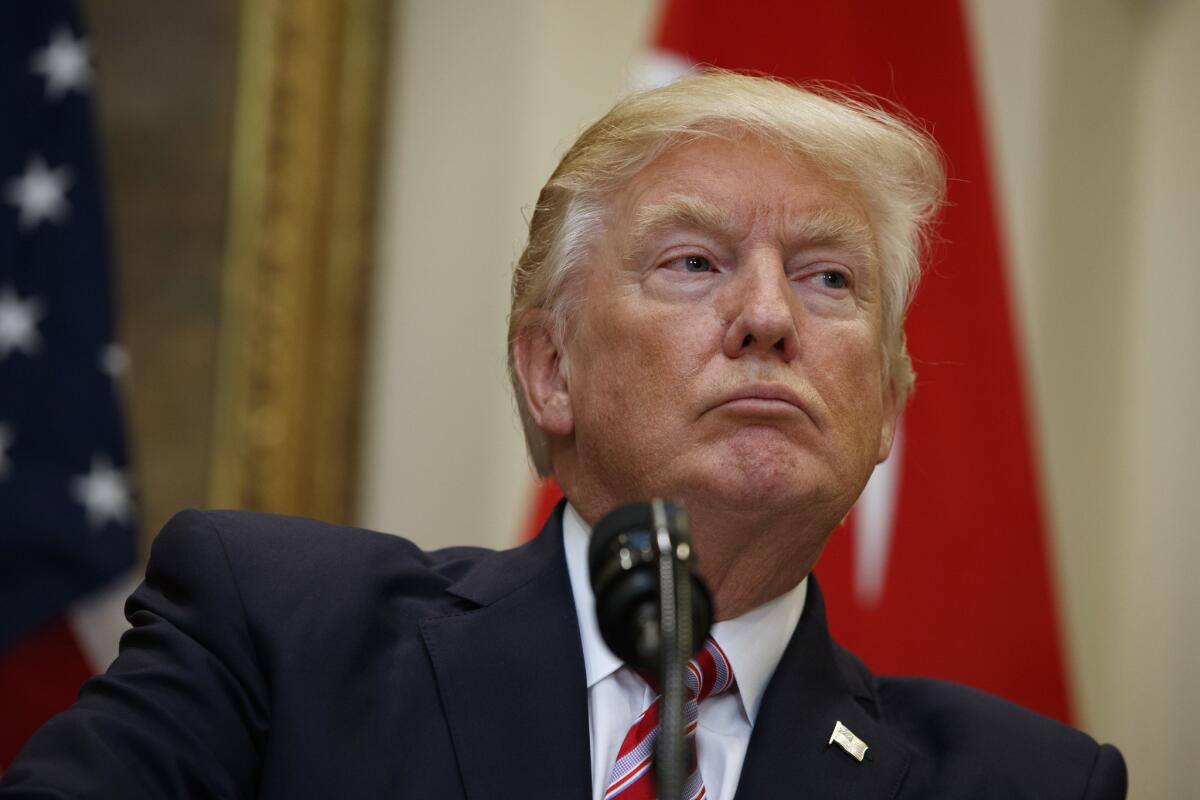
President Trump said a thorough investigation will confirm what he says is already known: that there was no collusion between his presidential campaign and “any foreign entity.”
Trump commented late Wednesday after the Justice Department announced the appointment of former FBI Director Robert S. Mueller III to oversee the investigation into Trump-Russian connections in the 2016 election.
Trump said in a written statement that he looks forward to “this matter concluding quickly.”
He also pledged to never stop fighting for the people and issues that are important to the country’s future.
Trump last week fired James B. Comey as FBI director, later explaining that it was partly because of the Russia investigation.
Trump administration slaps new sanctions on Iran but preserves nuclear deal
As it reviews the landmark Iranian nuclear deal President Trump once vowed to tear up, the Trump administration imposed a fresh set of sanctions on Tehran’s ballistic missile program Wednesday.
But the administration also re-upped the program that eased other economic sanctions on Iran as a result of the 2015 international deal that has essentially blocked Tehran’s ability to create the fuel used for nuclear bombs.
The dual action appears to be part of strategy to stick with the nuclear agreement while trying to punish Iran for its continued development of ballistic missiles and support for terrorist groups, a policy consistent with President Obama’s approach.
The sanctions were announced two days before Trump heads to the Middle East on his first foreign trip. His stops in Saudi Arabia and Israel will emphasize, in part, a shared antipathy toward Iran’s government.
It also comes two days before Iran holds presidential elections in which President Hassan Rouhani, who was party to the nuclear deal, hopes to win a second term.
Wednesday was the deadline for the Trump administration to extend sanctions relief for Iran, which must be renewed every 120 days.
Since Trump took office, his advisors have warned him that pulling out of the nuclear deal was more complicated and less advisable than he had indicated during last year’s campaign.
The United Nations nuclear watchdog agency, which is charged with monitoring Iran’s compliance, says that the accord is working so far and that nuclear activity is controlled.
Supporters of the deal argue that if the United States pulls out, it would be in violation of the U.N. Security Council resolution that approved the accord and that Iran would have a justification for resuming its nuclear program.
Under the deal, which was negotiated by the U.S. and five other world powers, key sanctions on Iran’s economy were lifted, allowing it to sell oil on the open market, join global financial systems and do business with once-proscribed nations.
Although it is leaving those concessions in place, the Trump administration is insisting it will take other punitive actions.
“This ongoing review does not diminish the United States’ resolve to continue countering Iran’s destabilizing activity in the region,” Stuart Jones, acting assistant secretary of State for Near Eastern affairs, said Wednesday.
That includes Iran’s backing of Syrian President Bashar Assad in that country’s civil war and its support for militant organizations such as Hezbollah in Lebanon and the Houthi rebels of Yemen.
Officials said the Treasury Department put new sanctions on seven targets involved in Iran’s ballistic missile program, which was not covered in the nuclear deal.
They include two senior Iranian defense officials, one of whom allegedly helps to arm Assad, the Treasury Department said in a statement.
Another target was a China-based network, Ruan Runling, that allegedly supports Iran’s military by supplying millions of dollars’ worth of items used in missile production.
“We are taking action to curtail this behavior,” Treasury Secretary Steven T. Mnuchin said in a statement. “The United States will remain vigilant when it comes to Iran.”
The designation of the seven people and entities freezes any assets they might have in the United States and bars Americans from doing business with them.
Putin calls flap over Trump’s meeting with Russian diplomats ‘political schizophrenia’
Russian President Vladimir Putin’s offer to provide a transcript of a controversial private Oval Office meeting between President Trump and two Russian diplomats has further fueled allegations that the White House has had improper dealings with Moscow, a U.S. adversary.
Putin said allegations that Trump had disclosed top-secret intelligence to Russian Foreign Minister Sergei Lavrov and Sergey Kislyak, Moscow’s ambassador to the U.S., proved that the U.S. was “developing political schizophrenia,” according to the Russian state-controlled news agency Tass, which quoted comments Putin made at a Wednesday news conference in Sochi, Russia.
“If the U.S. administration considers it possible, we are ready to submit a transcript of Lavrov’s talk with Trump to the U.S. Senate and Congress, if, of course, the U.S. administration would want this,” Putin said.
According to Tass, the Russian president jokingly told reporters that he would have to “reprimand” Lavrov for being “bad” and not sharing “these secrets neither with me nor with the Russian secret services, which is very inappropriate on his part.”
Putin’s comments followed Monday’s revelation by the Washington Post that Trump had disclosed highly classified information to the Russian diplomats that a U.S. ally had provided on condition that it be kept confidential.
Reuters reported that a Kremlin aide later told reporters that Moscow had a written record of the conversation and not an audio recording.
The way Lavrov’s meeting with Trump came about has also raised questions over whether the U.S. president had been played. According to the Washington Post, in a phone call eight days before the Russian foreign minister showed up at the White House, Putin requested that Trump meet with Lavrov, who was headed to the U.S. for previously scheduled meeting with Secretary of State Rex Tillerson during a gathering of the Arctic Council in Fairbanks, Alaska.
“Putin glossed over that detail with Trump, however, and once he agreed to a face-to-face meeting with Lavrov, the Russian minister changed his plans to jet first to Washington,” the Post reported.
Several U.S lawmakers dismissed Putin’s offer to provide a transcript of Trump’s meeting with the Russian diplomats, from which the U.S. news media was barred and only a Russian photographer permitted to attend.
In an interview with CBS News, Rep. Adam Schiff (D-Burbank), the top Democrat on the House Intelligence Committee, said Putin was “the last person Trump needs to vouch for him right now,” adding that the credibility of any transcript the Kremlin could provide “would be less than zero.”
Sen. Marco Rubio (R-Fla.) also scoffed at the trustworthiness of Moscow’s transcript offer, telling Fox News that “if it comes in an email, I wouldn’t click on the attachment.”
The Kremlin has ridiculed the flap in the U.S. over allegations of possible collusion between members of Trump’s campaign during his run for the White House and the president’s seemingly cozy relations with Putin. Moscow has denied meddling in U.S. elections and political affairs.
Putin warned that the United States’ anti-Russian rhetoric could backfire.
“You know what surprises me? They are destabilizing the internal political situation in the United States under anti-Russian slogans,” Putin said, according to Tass. “They either do not understand that they are harming their own country, which means they are just shortsighted, or they understand everything, and that means that they are dangerous and unscrupulous people.”
Tillerson says he doesn’t know whether Russians bugged the Oval Office
Amid the swirling scandals involving Russia and the Trump administration, Secretary of State Rex Tillerson has made one thing clear: He doesn’t know if Russia bugged the Oval Office.
“I would have no way to know that,” Tillerson said Wednesday.
His response to a reporter’s question came at the end of a brief appearance with Algerian Foreign Minister Ramtane Lamamra at the State Department, and after Russian President Vladimir Putin offered to provide U.S. lawmakers with “a record” of the Trump’s Oval Office meeting with Russian officials.
At issue is whether Trump disclosed highly classified intelligence on Islamic State threats to civil aviation during a May 10 meeting with Russian Foreign Minister Sergei Lavrov and Russia’s ambassador to the United States, Sergey Kislyak.
The White House has insisted Trump’s comments were “wholly appropriate.” In a tweet, Trump said he had the authority to reveal information to the Russians in his efforts to develop greater cooperation with Moscow on counter-terrorism issues.
No members of the American news media were allowed in the meeting. Official U.S. and Russian government photographers were there, and Russia’s Tass news service quickly posted pictures online, embarrassing the White House.
Kislyak has been at the center of U.S. investigations into whether members of the Trump election campaign had improper contact with Russian officials during the campaign last year.
On Wednesday, Putin attempted to come to Trump’s aid.
Speaking at a news conference in Sochi, Russia, Putin denied that Trump had shared classified information with the Russian envoys and said he was ready to give Congress “a record of the conversation” in the Oval Office.
Putin did not specify if he meant a clandestine recording, a transcript of one, or just the official notes of the meeting by the Russian envoys or their aides.
The Russian word for “record” can refer to an audio recording, but the Interfax news agency quoted a Kremlin aide, Yuri V. Ushakov, as telling reporters that Moscow had in its possession a written record of the conversation, not a recording.
Two Senate committees want Comey memos; intelligence panel asks him to testify
Two Senate committees have asked the FBI to turn over copies of any memos that former FBI Director James B. Comey wrote about his encounters with President Trump.
The Senate Intelligence Committee invited Comey to testify before the panel and requested that the FBI turn over any memos alleging President Trump sought to halt the bureau’s investigation into former national security advisor Michael Flynn.
“I think we need to hear from him as soon as possible in public to respond to the issues that have been raised in recent days,” the Senate Majority Leader, Sen. Mitch McConnell of Kentucky, told the Wall St. Journal.
The committee hopes to have a response from the FBI within 72 hours, and expects to hear from Comey soon, possibly next week.
“We’ve reached out,” Chairman Richard Burr, a Republican from North Carolina, told reporters Wednesday. “We hope to have a response.” The top Democrat on the Intelligence Committee, Sen. Mark Warner of Virginia, said the panel invited Comey to testify in open and closed sessions.
“We don’t lack for questions,” Warner said. “I don’t think I know of any member I’ve talked to publicly or privately -- Democrat or Republican -- that doesn’t think that Jim Comey deserves a chance to tell his side of the story.”
Not long afterward, the leaders of the Senate Judiciary Committee made a similar request for all memos that Comey may have written about meetings with the president.
The Senate committees’ requests came as the chairman of House Oversight Committee, Rep. Jason Chaffetz, requested all “memoranda, notes, summaries, and recordings” between Trump and Comey.
Trump fired Comey last week, and the president said in a later interview that he was unhappy with the FBI’s probe into his campaign’s possible links to Russian interference in the 2016 election.
Trump later warned the fired FBI director in a tweet that Comey had better hope that no “tapes” exist of their talks. The White House has refused to comment on whether such recordings were made. But if they exist, lawmakers also want those.
This week, it was reported that Comey wrote a private memo describing a meeting in which Trump allegedly asked him to stop the FBI review of Flynn, who was forced to resign earlier this year after the White House determined he had lied about his contacts with the Russians.
1:47 p.m. This post was updated with a quote from Sen. Mitch McConnell/
Republican Sen. Lisa Murkowski: ‘We may need to look to an independent commission or special prosecutor’
Here’s how the Comey memo story is — and isn’t — being covered in the news
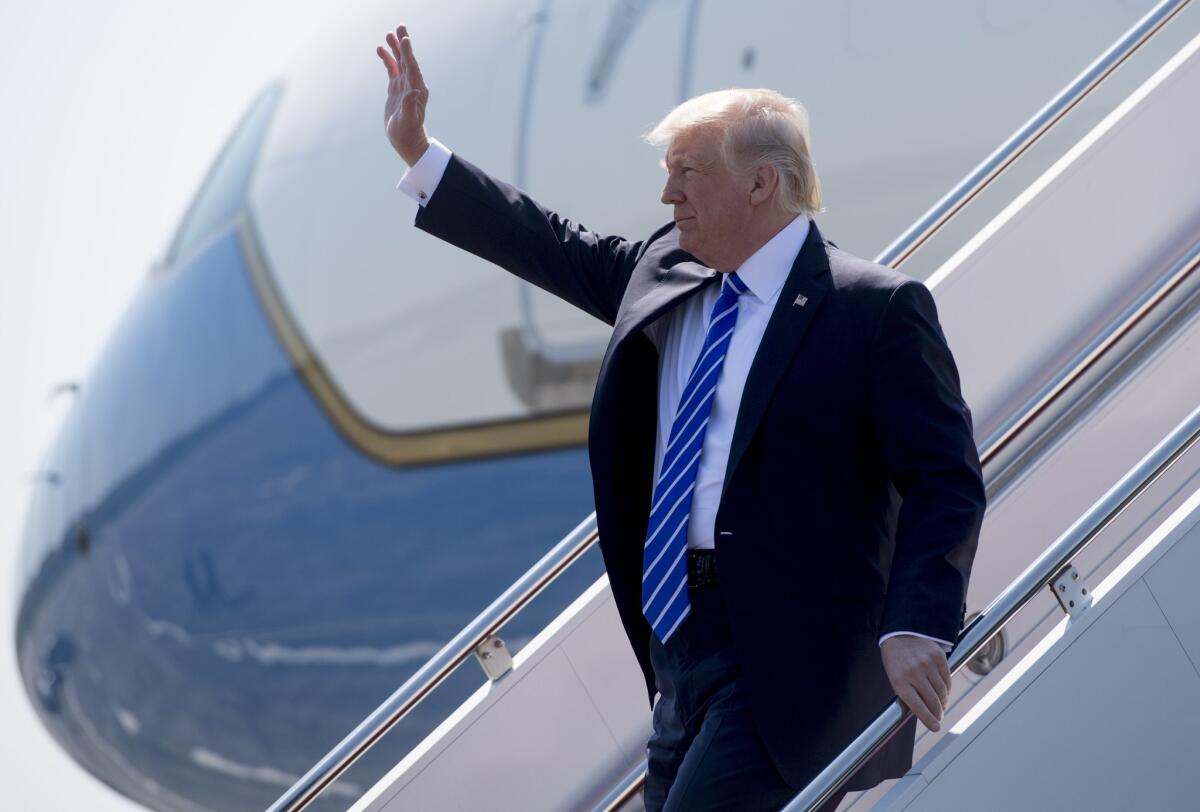
The narratives are in stark contrast, depending on which news channel you’re watching.
As President Trump exited Air Force One in Groton, Conn., on Wednesday ahead of a commencement speech at the U.S. Coast Guard Academy, the chyron on CNN read: “Sources – Comey says Trump tried to end Flynn probe.” On MSNBC: “Memo claims Trump urged Comey to drop Flynn probe.” And on Fox News: “Pres Trump to speak at U.S. Coast Guard Academy.”
A day after reports surfaced that FBI Director James B. Comey had written a memo noting Trump asked him to end an investigation into the ties between former national security advisor Michael Flynn and Russia, the headlines on cable television provided a glimpse into how this major story is being reported.
While most mainstream news outlets, including the Los Angeles Times, are leading homepages with stories centered on the Comey memo, conservative media are, for the most part, focused on different angles of the story — or, in fact, different stories altogether.
Here are some of today’s headlines:
Vladimir Putin: Russia can prove Donald Trump did not give classified intel to diplomats (Breitbart)
Scrolling through the Breitbart website early Wednesday, there was no mention of the Comey memos. Instead, the website led its homepage with a story on how Russian President Vladimir Putin could possibly help prove Trump did not leak classified intelligence.
Yeah, the other big story of the week (indeed, it’s only Wednesday) was a report that Trump shared highly classified intelligence about the Islamic State in his Oval Office meeting last week with Russian Foreign Minister Sergei Lavrov and Ambassador Sergey Kislyak. Trump has defended his conversation with the Russian diplomats, saying he shared information “pertaining to terrorism and airline safety.”
What’s noteworthy about the piece is that it casts doubt on the reports that Trump released classified intelligence.
“The media, in a story first reported by the Washington Post and picked up by countless other outlets, are claiming that two unnamed U.S. officials said Trump had disclosed highly classified information to the Russians about the Islamic State (ISIS) and the radical Islamic terrorists’ plan to attack airliners,” notes the story.
Fox News also led its homepage with a piece on Putin’s willingness to provide details on Trump’s meeting with Lavrov and Kislyak.
Speaker Ryan says ‘lot of politics being played’ over Trump accusations (Washington Times)
For now, it appears most Capitol Hill Republicans are unwilling to abandon Trump amid the many controversies surrounding the White House.
On Wednesday, House Speaker Paul Ryan (R-Wis.) insisted more facts surrounding the Comey memos need to be released.
This piece notes some of Ryan’s comments while speaking to reporters.
“We can’t deal with speculation and innuendo, and there’s clearly a lot of politics being played,” Ryan said Wednesday.
Indeed, as noted in this space Tuesday night, some Republicans certainly believe politics are at the root of the controversies facing the White House.
In columns and on television, pundits have called on Republicans to stand up for Trump as some Democrats begin to whisper about impeachment.
The car wreck presidency (Weekly Standard)
Still, not all conservatives are on board with Trump.
In this piece by Gary Schmitt, he writes that “watching the White House these days is like driving down an interstate, but every two miles you have to slow to a crawl as you pass yet another car crash.”
“More than likely, the cause of the wreck is a reckless driver, but, of course, there are the innocent occupants in the other car,” he writes. “Trump’s presidency feels like this endless series of car wrecks, with the victims being the country’s credibility abroad and now the reputations of his national security advisers.”
Trump to Coast Guard cadets: ‘No politician in history ... has been treated worse or more unfairly’

President Donald Trump gives a commencement speech at the Coast Guard Academy in Connecticut on Wednesday.
Never, ever, ever give up. Things will work out just fine. Look at the way I’ve been treated lately, especially by the media. No politician in history, and I say this with great surety, has been treated worse or more unfairly. You can’t let them get you down. You can’t let the critics and the naysayers get in the way of your dreams. ... I guess that’s why we won.
— President Trump
President Trump complained that “no politician in history … has been treated worse or more unfairly” during a commencement speech at the Coast Guard Academy in Connecticut Wednesday.
The comments were his first since reports Tuesday night that he asked FBI Director James Comey, since fired, to drop an investigation of Trump’s former national security advisor. Trump had also refrained from tweeting for 21 hours, a rarity in the midst of controversy.
Though the speech contained much of the traditional praise for the new graduates, and ceremonial pardons of their “oversights or slight violations,” it was also laced with Trump’s hallmark defiance and boastfulness that put himself at the center.
“The people understand what I’m doing and that’s the most important thing. I didn’t’t get elected to serve the Washington media or the special interests,” he said. “I got elected to serve the forgotten men and women and that’s what I’m doing.”
Trump went on to declare that in just months in office, “I’ve accomplished a tremendous amount in a very short time at president.”
Trump listed new jobs, confirmation of a Supreme Court justice, plans to spend more on the military, reduced border crossings, support for gun rights and veterans care, rolling back environmental regulations, plans for a border wall and for cutting taxes.
Trump cast his recent political experience as life advice, pointing as he often does to his election victory.
“You can’t let the critics and the naysayers get in the way of your dreams,” Trump said. “I guess that’s why we won.”
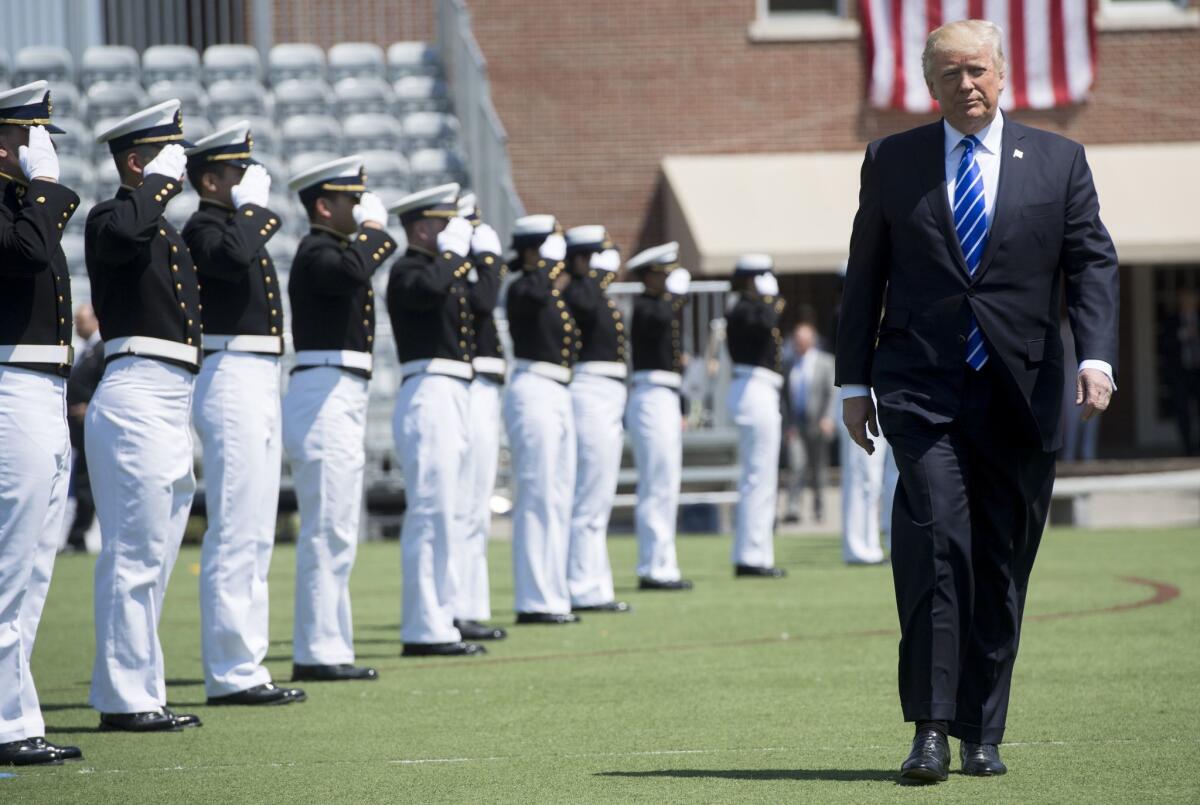
Not the tweets, the Russian issue or Comey’s firing: So what will it take for Republicans to break with Trump?
They fume privately at President Trump’s coziness with the Russians. They wince almost every time he tweets. They talk among themselves about what might have been with a different Republican in the White House.
Yet even as each new crisis seems like it might be the event that moves GOP lawmakers away from Trump, key Republican leaders and rank-and-file members circle the White House, protecting the president from attack and shifting the blame to Democrats and the media.
Tuesday brought the sternest test yet of Republican willingness to stand with the president, as multiple news organizations reported that Trump had personally asked then-FBI Director James B. Comey to drop the bureau’s investigation of former national security advisor Michael Flynn.
The news — denied by the White House — hit a Congress that already was stunned by Trump’s firing of Comey last week and his sharing of intelligence with Russian diplomats.
Whether the latest allegations will prove to be the tipping point for more GOP lawmakers remains to be seen, but initial reactions suggested many were standing behind the president.
Newt Gingrich tells GOP Congress to fight for Trump, or else Democrats will take power
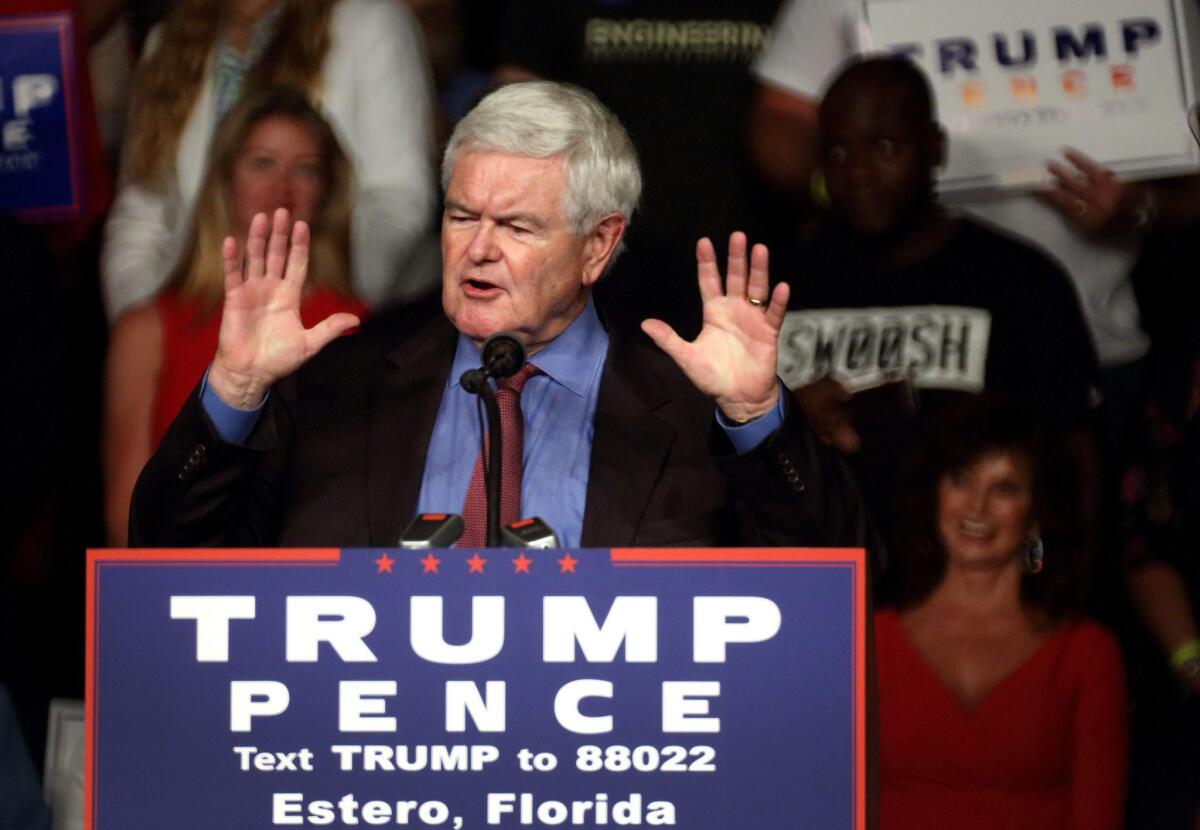
Former House Speaker Newt Gingrich, a close ally of President Trump, said it’s time for Republicans in Congress to either “surrender or fight” for the president. But surrender, he said, would bring House Democrats and their leader, Nancy Pelosi, to power.
“Republicans in general — not just Trump — are in a crossroads,” Gingrich said in an interview. “And if they don’t get their act together, Pelosi is going to become speaker and she’s going to impeach Trump. That’s how big the stakes are.”
“You think the hard left would do anything less?” added the man who as Speaker in the 1990s led House Republicans’ impeachment of Bill Clinton.
Gingrich’s rally ‘round advice is in stark contrast to that of some on the right who say this is a moment for Republicans to challenge the president, especially after the latest leaks opened Trump to questions of obstruction of justice. Gingrich has been one of Trump’s most stalwart supporters. His wife, Callista, is expected to be nominated as ambassador to the Vatican soon.
Other Republicans have been reticent to speak up in Trump’s defense. But Gingrich was fired up and in a chatty mood, speaking by phone during a layover in Frankfurt after several days of speaking engagements in Kiev. He was infuriated with the media, particularly CNN, which he said is giving the rest of the world the impression that “America is terrifying” right now.
He said questions from his foreign audiences included “How close are we to a dictatorship?”
Gingrich had advice for Trump and his advisors: Get tougher on the media. He said the White House should cancel briefings — an idea Trump himself has floated — and refuse to respond to damaging stories, which he labeled “garbage.”
“The reason they’re having a tough time in the White House is that they keep kidding themselves about the environment they’re working in,” Gingrich said. “If you’re surrounded by lions and hyenas, feeding them just increases their hunger.”
Yet Gingrich worried that his Republican allies in Congress are growing wobbly.
“They’re totally rattled,” he said, citing local town hall meetings disrupted by the “hard left,” other forms of intimidation and even death threats.
“You either decide you’re going to cave and let the left own America,” Gingrich said, “or you’re going to fight.”
Speaker Ryan urges caution over Trump allegations; rank-and-file GOP stick with president
House Speaker Paul D. Ryan declined to weigh in on allegations that President Trump attempted to pressure former FBI Director James B. Comey in the bureau’s investigation of links between Russia and Trump’s campaign.
Dismissing some of the reports as “innuendo,” Ryan brushed aside calls for a special investigation or prosecutor.
The Times and other media outlets have reported that Trump asked Comey to back off the FBI’s probe of fired national security advisor Michael Flynn. The White House has denied the account, which was first reported by the New York Times.
“We need the facts,” Ryan said after a morning meeting of House Republicans at GOP headquarters.
He cited the current investigations by congressional intelligence committees and House Oversight Committee Chairman Rep. Jason Chaffetz’s request for transcripts and tapes of Trump’s conversations.
“There are a lot of unanswered questions,” Ryan said.
“The last thing I want to do is pre-judge anything. ... We’re going to keep doing our jobs.”
Several lawmakers said they would like to review any available tapes and transcripts of Trump’s conversations with Comey, and with Russian diplomats during an Oval Office visit last week. During that meeting, Trump shared intelligence about Islamic State terrorists with the Russians.
But many Republicans dismissed the issues swirling around the White House as media hype that isn’t resonating with voters back home.
”I don’t get all wee-wee’d up about this,” Rep. Rod Blum (R-Iowa) said. “People in Iowa care about jobs.”
House Republicans said they didn’t spend much time, if any, discussing the events at the White House.
Instead, the meeting largely focused on upcoming special elections for vacant GOP seats that are facing stiff challenges from Democrats.
Freshman Rep. James Comer (R-Ky.) said Trump is sometimes a “victim” of his off-the-cuff style.
“He jokes a lot,” said Comer, who has spent time with the president. “This is a guy that doesn’t measure everything he says like most politicians, and this is the kind of leader Americans voted for, and I think he deserves a chance.”
U.S. household debt tops 2008 peak, but this time Americans’ finances are better
The recovery from the Great Recession has hit a milestone: Total household debt climbed to $12.73 trillion in the first quarter to top the peak reached in 2008 before the housing market crash and severe economic downturn led to a historic reduction, according to government data released Wednesday.
But this time, Americans are doing much better handling their mortgages, credit cards, auto loans and other borrowing, the data from the Federal Reserve Bank of New York showed.
Consumers were delinquent on 4.8% of total debt, a marked improvement from the 11.9% of debt that was at least 30 days late at the end of 2009.
Rising household debt — up from $12.58 trillion in the fourth quarter of last year — can indicate that Americans are confident in their jobs and the overall economy.
A quiet morning in a White House under siege
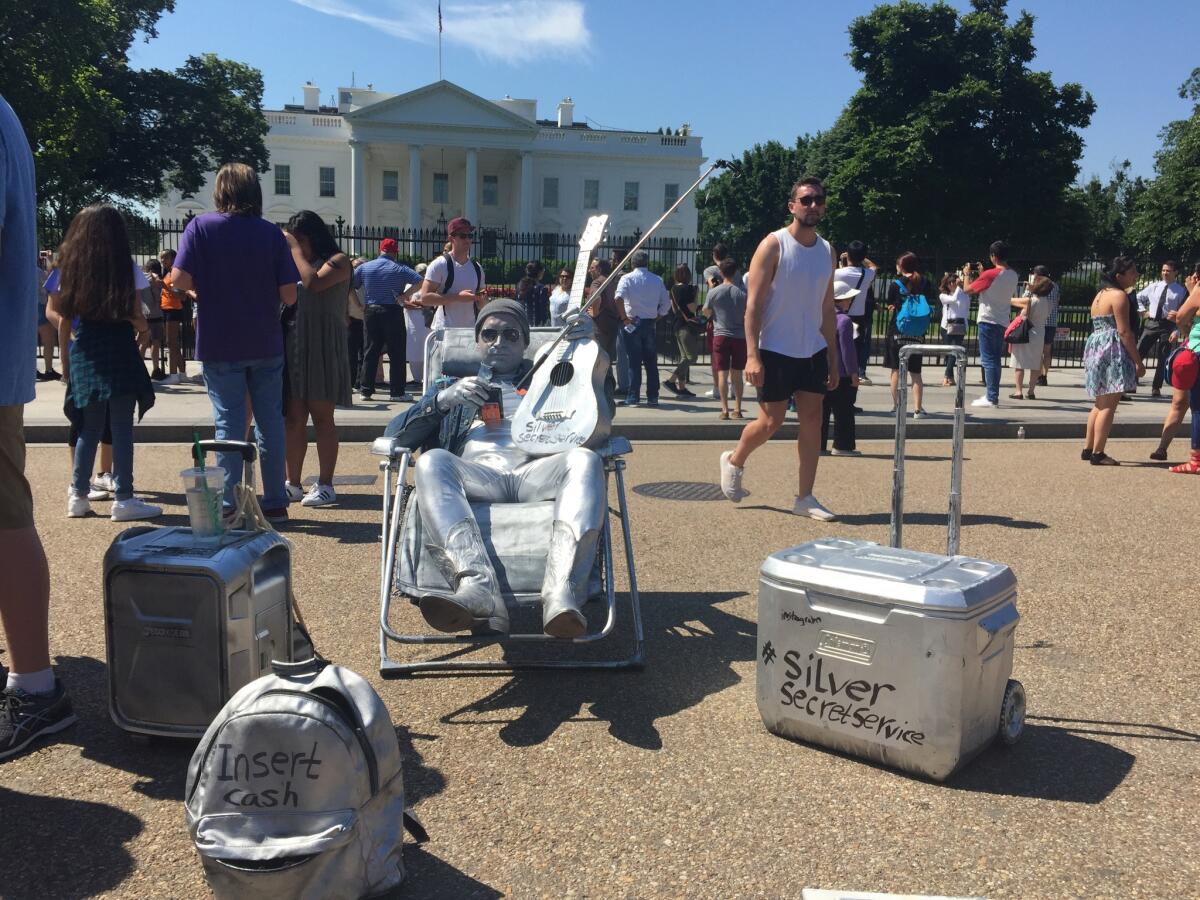
It was a typical spring scene outside the White House on Wednesday morning.
A few student tour groups milled about in front of the cast-iron fence, each group wearing matching T-shirts in maroon, teal and pink, taking pictures of themselves with the iconic columns behind them and waving cheerfully to tourists entering the grounds.
A street performer who calls himself Silver Secret Service danced to club music blaring from a portable amplifier under a postcard-perfect blue spring sky.
Inside the West Wing, the atmosphere was more subdued.
Many of the chairs in the White House press office were empty early in the day, perhaps a result of a string of late nights handling revelations: that President Trump told Russian officials classified details about a threat from Islamic State and that former FBI director James Comey’s notes seem to show that Trump asked him to drop the FBI investigation into former national security advisor Michael Flynn.
With the president out of town for most of the day to speak at the Coast Guard academy graduation in Groton, Conn., and few scheduled public events at the White House, the president’s aides tried to catch their breaths.
President Trump faces big test of his presidency with Republicans, who so far are failing to come to his defense
President Trump faced another threshold day in his presidency Wednesday as Republican allies edged away from him and the Wall Street Journal issued one of its toughest editorials to date.
Reactions from Republican members of Congress will play a large role in how deeply Trump’s spate of controversies wound his presidency as he prepares for his first trip abroad later in the week.
The Journal, owned by the nation’s most powerful conservative media figure Rupert Murdoch, titled its editorial “Loose Lips Sink Presidencies” and warned Trump that his dual storms over his interactions with fired FBI Director James Comey and the security secrets he shared with Russian diplomats could prompt allies in Congress to “drift away if he looks like a liability.”
“Mr. Trump needs to appreciate how close he is to losing the Republicans he needs to pass the agenda that will determine if he is successful,” the Journal wrote.
Trump was notably silent on Twitter, at least through the evening and morning, when he tends to send his most incendiary comments to fire up his core supporters and drive the news of the day.
Likewise, top Republicans stayed away from the morning shows.
Charlie Rose said on “CBS This Morning” that 20 Republicans had declined invitations Wednesday.
Some Democrats and commentators were beginning to talk impeachment. Sen. Angus King of Maine, an independent who caucuses with Democrats, warned them to take a deep breath.
Those Republicans who did appear in public on Wednesday kept their distance from Trump. Sen. Susan Collins (R-Maine) responded incredulously to Russian President Vladimir Putin’s offer to share information that Trump discussed with his diplomats.
“The idea that we would accept any evidence from President Putin is absurd,” she told CNN.
Trump’s only scheduled public comments will come during a commencement speech at the Coast Guard Academy in Connecticut. Because the president is traveling, his embattled press secretary, Sean Spicer, will hold an off-camera briefing with a handful of pool reporters on Air Force One rather than his customary televised briefing from the White House.
Fox News coverage of the Comey memo highlights media war
Viewers tuning into CNN and Fox News on Tuesday evening for coverage of the purported memo by former FBI Director James B. Comey were treated to wildly different accounts.
A close associate of Comey confirmed that the FBI director had written a memo reporting that President Trump had asked Comey to “lay ... off” the investigation of former national security advisor Michael Flynn and his connections to Russian officials. The memo, as first reported by the New York Times, was written after Comey met with the president in February.
While CNN’s coverage focused heavily on whether Trump’s actions constituted obstruction of justice, much of Fox News’ coverage implied the media reports were part of a campaign by Democrats and those media outlets to discredit Trump. “Dems & Media in meltdown over Trump-Russia ties,” read a headline.
In a straight-ahead report, Fox News chief White House correspondent John Roberts said of the bombshell news: “I think it bears repeating: the White House saying the president has never asked Mr. Comey or anyone else to end any investigation, including any investigation involving Gen. Flynn. But what we don’t know, though, is what the president actually did say to the former FBI director during that meeting. We only know what the White House is claiming.”
What followed on Fox News were a series of appearances by guests, including a U.S. senator, who repeated refrains that Trump uses regularly: The outcry was the result of a media double-standard and the real culprits were the government officials who leaked information to reporters.
“You have a couple of large newspapers that are so vitriolic and hateful against the president that every little scrap of paper that blows across their desks that says something bad about him -- they blow it up, and I think that’s what you got,” Sen. Jim Risch (R-Idaho) told Fox News anchor Martha MacCallum.
“There is only one person who committed a crime, and that is whoever the weasel was that disclosed this information,” Risch said. “That’s a felony, it’s un-American, and they endangered the lives of their families and other Americans. And that person is guilty of treason and should be held to answer for it.”
Republican strategist Karl Rove, also speaking on Fox, said there was a double-standard.
“What about President Obama publicly saying that Hillary Clinton had not done anything wrong while the FBI was investigating whether or not she had done something improper?” Rove asked.
He suggested that Trump did the same thing as Obama. “Saying, ‘She hasn’t done anything wrong’ -- in essence, signaling to the FBI: drop it,” Rove said.
Rove, an advisor to former President George W. Bush, suggested that Trump’s problem is his political affiliation.
“He’s a Republican,” Rove said. “He was elected with an R behind his name. Who thinks he is going to get the same treatment that either Bill Clinton or Barack Obama got? Let’s wake up and live in the real world. This is everything that every Republican president has to deal with, and that is that the press is against him.”
Some conservative commentators, however, were more critical of the president’s action.
Marc Thiessen, a resident fellow at the American Enterprise Institute, said Trump was paying a “heavy price” for his handling of the Comey firing.
Here’s what you need to know about Comey’s memo on a conversation with Trump
It’s the latest chapter in the continuing saga of President Trump’s ties to Russia.
On Tuesday, reports surfaced of a memo written by then-FBI Director James B. Comey recording the highlights of a conversation he had with Trump in February about Michael Flynn, who had recently resigned as national security advisor.
Comey, whom Trump fired last week, oversaw a federal investigation of Flynn that centers on his ties to Russia while he worked on Trump’s campaign last year. That FBI investigation remains open.
Here’s some of what we know about the memo:
Why did Comey write the memo?
It’s simple: He routinely took notes on conversations he had with the president.
On Feb. 13, Flynn resigned after it was revealed he had lied to Vice President Mike Pence about phone conversations he had with Sergey Kislyak, the Russian ambassador to the United States.
A day after his firing, according to accounts first published in the New York Times and later confirmed by the Los Angeles Times, Trump and Comey met one-on-one in the Oval Office.
“I hope you can see your way clear to letting this go, to letting Flynn go,” Trump told Comey, according to the memo shared with several news organizations. “He is a good guy. I hope you can let this go.”
House Republicans rally around Trump while Democrats warn of potential obstruction of justice
House Republicans quickly brushed off the latest allegations over President Trump’s conversations with then-FBI Director James B. Comey, but Democrats pushed for fuller airing in what they warned could be obstruction of justice by the White House.
Republicans were returning to the House for the first votes of the week late Tuesday when it was reported, initially by the New York Times, that Comey wrote in a memo that Trump had asked him to halt the investigation of Michael Flynn, the former national security advisor.
“He’s under total assault,” said Rep. Steve Pearce (R-N.M.).
The White House said the president has never asked Comey or anyone else to end any investigation.
Trump fired Comey last week, and said later he was unhappy with the FBI investigation, which is looking into possible links between Trump’s campaign and the Russian interference in the 2016 election.
Flynn resigned earlier this year after the administration said he lied about the nature of his past conversations with Russian Ambassador Sergey Kislyak.
Democrats, meanwhile, said the Comey memo could amount to obstruction of justice by the White House, an impeachable offense by a president.
House Minority Leader Nancy Pelosi (D-San Francisco) said: “If these reports are true, the president’s brazen attempt to shut down the FBI’s investigation of Michael Flynn is an assault on the rule of law that is fundamental to our democracy. At best, President Trump has committed a grave abuse of executive power. At worst, he has obstructed justice.”
Trump asked Comey to end investigation into Flynn, according to Comey memo
President Trump, in a private meeting with then-FBI Director James B. Comey, asked him to end the criminal investigation into ousted national security advisor Michael Flynn, according to a memo written by Comey shortly after the meeting.
According to the memo, the meeting took place Feb. 14, which was the day after Trump fired Flynn. An associate of Comey who has read the memo described its contents. It was first reported by the New York Times.
Comey wrote a number of other memos to record Trump’s statements that he found troublesome, the associate said.
Trump told Comey in the meeting that “I hope you can see your way clear to letting this go,” according to the memo. “He is a good guy.”
A memo memorializing Comey’s conversation with Trump would be consistent with a practice Comey is known to have established in his career of writing memos to document incidents that he found noteworthy or disturbing.
Trump fired Comey on May 9. He subsequently said in an interview with NBC News that he was unhappy about the Russia investigation, though he added that he was not trying to obstruct the FBI investigation into Russian efforts to influence the outcome of the 2016 election.
The bureau is also investigating whether any associates of Trump’s cooperated with the Russian efforts.
Flynn was fired as national security advisor after he lied about the nature of conversations he had with Russian Ambassador Sergey Kislyak. Those conversations were intercepted by the U.S.
The former acting attorney general, Sally Yates, told the White House in late January that Flynn’s public statements were not accurate and might make him vulnerable to blackmail from Russian agents as a result.
Flynn was not fired until 18 days after Yates made that report. The firing came the day that the Washington Post revealed that Yates had warned the White House about him.
The White House on Tuesday denied the account of Comey’s memo, saying that it was “not a truthful and accurate portrayal of the conversation.”
“While the president has repeatedly expressed his view that General Flynn is a decent man who served and protected our country, the president has never asked Mr. Comey or anyone else to end any investigation,” the statement said.
The latest report was met with expressions of astonishment on Capitol Hill, where members of both parties promised to obtain the memos by subpoena and to press for answers on whether the president tried to obstruct the investigation.
The House Oversight Committee “is going to get the Comey memo, if it exists,” Chairman Jason Chaffetz (R-Utah) wrote Tuesday in a tweet.
“I need to see it sooner rather than later. I have my subpoena pen ready.”
“Enough is enough. Congress really needs to get to the bottom of this,” said Rep. Adam B. Schiff, the top Democrat on the House Intelligence Committee.
Times staff writer David S. Cloud contributed to this report.
Rep. Jason Chaffetz says he may subpoena Comey memo
The Republican chairman of the House Oversight Committee says he will seek copies of any memo former FBI Director James B. Comey wrote about his meetings with President Trump.
Rep. Jason Chaffetz (R-Utah) said on Twitter that he has his “subpoena pen ready.”
The tweet comes just hours after the disclosure in news reports that Comey wrote in a memo that Trump asked him to shut down a federal investigation of former national security advisor Michael Flynn.
Trump asked Comey to shut down investigation of Flynn, New York Times reports
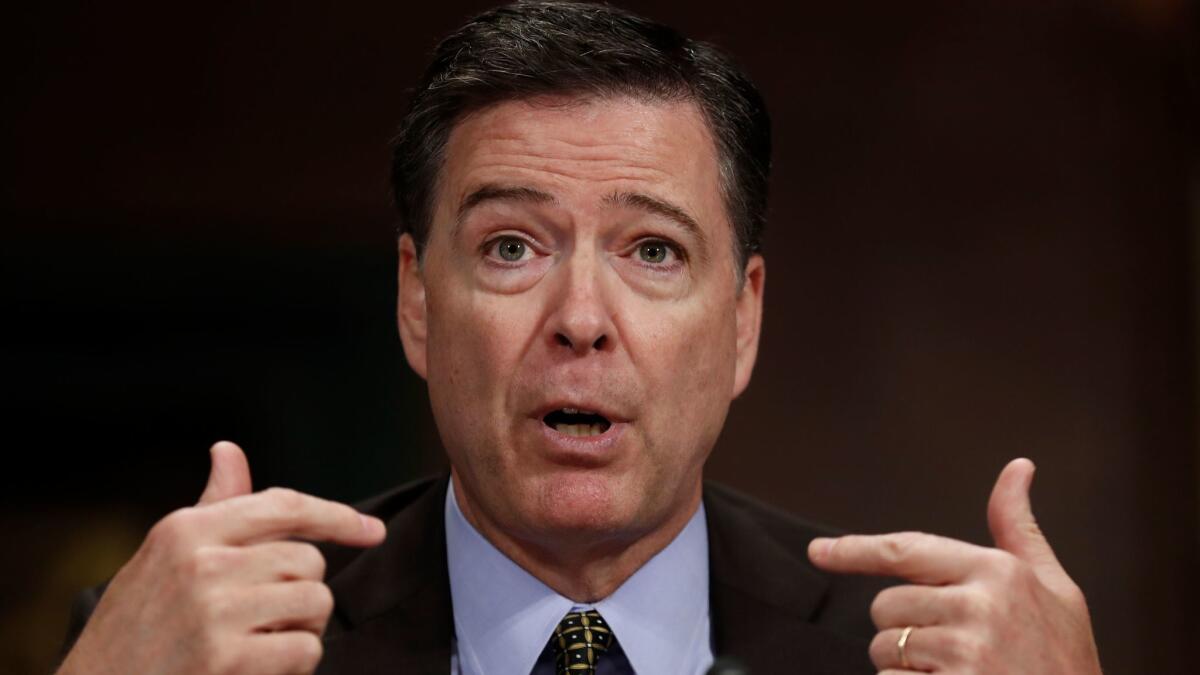
President Trump met with then-FBI Director James B. Comey in mid-February and asked him to end the bureau’s investigation into retired Gen. Michael Flynn, the former White House national security advisor, the New York Times reported.
Comey wrote a memo for his files describing the meeting with Trump, which took place on Feb. 14, according to the article. That would be the day after Trump fired Flynn from his White House job. Two people who had read the memo described its contents, the newspaper said.
“I hope you can see your way clear to letting this go, to letting Flynn go,” Trump told Comey, according to the article. “He is a good guy. I hope you can let this go.”
A memo of that sort would be consistent with a practice Comey is known to have established earlier in his career of writing memos to document incidents that he found noteworthy or disturbing.
The White House contested the article, saying in a statement that “the president has never asked Mr. Comey or anyone else to end any investigation, including any investigation involving General Flynn.”
“The president has the utmost respect for our law enforcement agencies, and all investigations. This is not a truthful or accurate portrayal of the conversation between the president and Mr. Comey,” the statement said, according to the article.
Comey was fired by Trump on May 9.
Sen. John Cornyn says he will stay in the Senate, won’t be FBI director
Texas Sen. John Cornyn has taken himself out of the running to be FBI director, telling the Trump administration that he’ll stay in the Senate.
Cornyn was interviewed for the post after President Trump fired James Comey. But he said in a statement Tuesday that “the best way I can serve is continuing to fight for a conservative agenda in the U.S. Senate.”
A source familiar with Cornyn’s thinking said the senator felt “obligated” to consider the job because a friend, Atty. Gen. Jeff Sessions, asked him to. The source declined to be named because the decision was private.
The administration has interviewed at least eight candidates to replace Comey, of more than a dozen being considered. Trump has said a decision could come as soon as this week.
11:23 a.m.: This post was updated with reporting from the Associated Press. It was originally published at 10:57 a.m.
U.S. will brief top European allies about aviation threats and possible laptop ban
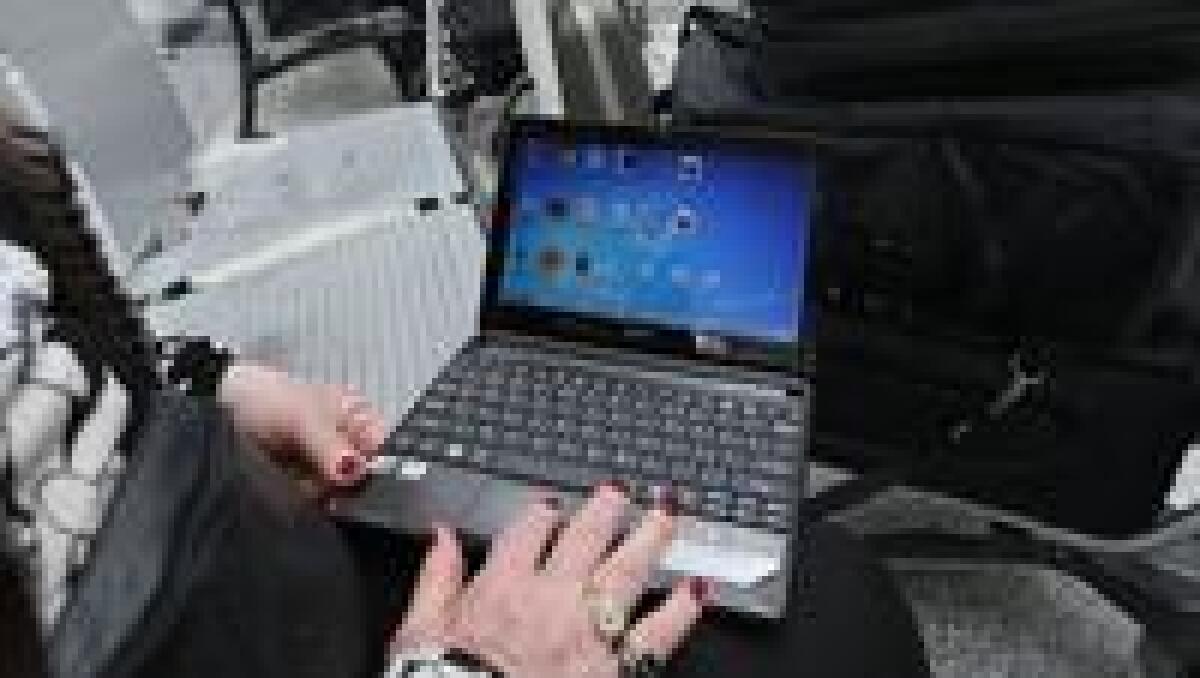
As the Trump administration moves toward a likely ban on computer laptops in cabins of airliners flying from Europe, two of the nation’s top security officials will be in Brussels tomorrow to talk with some of America’s closest allies about a looming terrorist threat — the same topic that President Trump discussed with Russian officials in the Oval Office last week.
Airlines and security officials in Europe have expressed concern about the administration’s plans, which would inconvenience travelers and disrupt airports just as the busy trans-Atlantic summer tourist season begins.
The plan — which could affect additional countries outside of Europe, according to a U.S. official — would expand a U.S. prohibition that already affects flights from ten airports in North Africa and the Middle East.
In a conversation last week with the Russian ambassador and foreign minister, Trump discussed a threat to civil aviation and, according to a report in the Washington Post, shared highly sensitive secret details which had been provided by a U.S. ally about an Islamic State plot.
David Lapan, top spokesman for the Department of Homeland Security, wouldn’t comment on what’s already been shared with European officials or whether the two Russian officials were told more details than U.S. allies in Europe.
“Whenever we have discussions with various entities, the level of information we provide is commensurate with the [security] clearances of the people we’re talking to,” Lapan said in a briefing Tuesday. “We don’t ever get into sources and methods, but the information that we have, that we share, is appropriate given the clearance levels.”
The latest controversy won’t change that, he said: “We will continue to do what we’ve done in the past, and share information that we think is appropriate.”
Elaine Duke, deputy Homeland Security secretary, and Huban A. Gowadia, acting head of the Transportation Security Administration, will be at the meeting on Wednesday with officials from the European Commission and a number of countries, Lapan said.
The United States and Britain in March first imposed a ban on some electronic devices on flights from 10 airports in eight countries, saying terrorists were trying to pursue “innovative methods” to bring down commercial jetliners.
An expansion of that prohibition has been expected for weeks despite heavy opposition from some airlines and aviation experts, partly over concerns that putting laptop computers in aircraft cargo holds poses other dangers. After the first laptop ban, European security officials warned airlines that the lithium batteries in laptops could start fires in cargo holds and crews could not move quickly to put them out.
Though an expanded ban is “probable,” Lapan said that Homeland Security Secretary John F. Kelly had not made any final decisions, including whether to extend it beyond Europe.
The opposition “is certainly something he’s well aware of, but ultimately the secretary’s role and the mission of the department is protecting the homeland and protecting the traveling public,” Lapan said
As to why the U.S. has not put the ban into affect already, Lapan said the intelligence “doesn’t necessarily indicate an imminent action that would require an immediate action on our part.”
So far, there has been no indication that any terrorist networks are trying to move up the timing of a plot before a ban goes into effect, he said.
Adam Schiff says sharing intelligence with Russians is ‘mind-boggling’
Rep. Adam Schiff, the ranking Democrat on the House Intelligence Committee, said he is disturbed by reports that President Trump shared classified material about Islamic State with Russia.
Here’s what the congressman from Burbank said during an interview on the sidelines of the Center for American Progress conference in Washington.
On what he’s looking for in tonight’s CIA briefing: We certainly are going to want to know whether there were any compromises of classified information, of our sources and methods, what impact this might have on our intel relationships, what mitigation steps are necessary.
On what Trump’s advisors should tell him: I would hope, if reports are accurate, that someone will counsel this president about the responsibilities of his office and the need for him to be far more careful in the handling of classified information, particularly talking to the Russians.
On the hypocrisy given his attacks against Hillary Clinton for her handling of classified material: For a president who was so critical of his opponent over this issue, it is mind-boggling that he would do such a thing, if these reports are accurate. We will just have to figure out how to mitigate the damage.
On the GOP reaction: You have heard a number of Republicans speaking out about this and expressing concern. For every Republican you hear speaking publicly, there are going to be 10 more who are desperately concerned privately. We all understand, Democrats and Republicans, that if we lose a source of information on threats to the United states by ISIS, to our aircraft, to our people, it could have catastrophic consequences. This is obviously among the most important information we get. It jeopardizes our relationship with a key ally. That’s another problem, so we take this very seriously
On the needs for special counsel: I think it adds further to the public demand for an independent counsel and an independent commission. There have been so many problems vis-a-vis Russia with this administration, from a national security advisor who was fired, an attorney general had to recuse himself, an FBI director who was fired and now a president who may have disclosed classified information to the Russians. If these aren’t circumstances that warrant independent counsel, I don’t know what is.
Trump’s sharing of classified information with the Russians even draws criticism from some conservative media
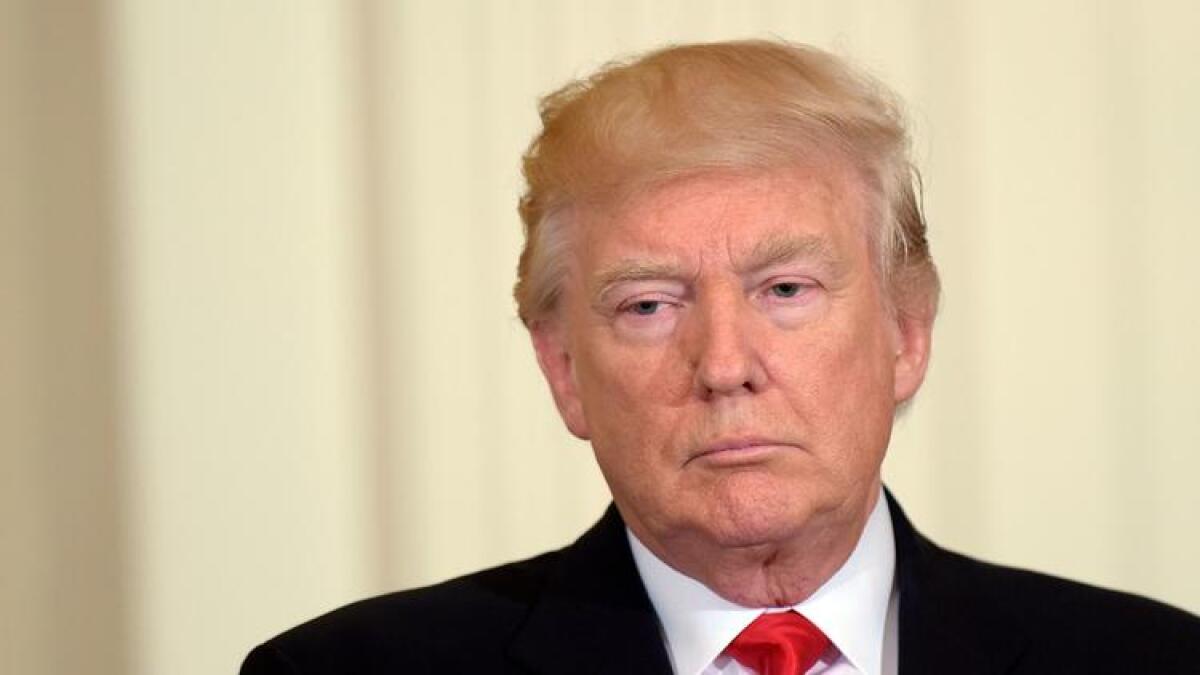
The saga of President Trump and his relationship with Russia continues to grow. And grow. And grow a little more.
On Monday, news reports said Trump shared highly classified intelligence about Islamic State in his Oval Office meeting last week with Russian Foreign Minister Sergei Lavrov and Ambassador Sergey Kislyak.
The intelligence was provided by a U.S. ally on the condition it not be shared, according to the news reports.
Trump’s meeting with Lavrov and Kislyak already had drawn criticism from Democrats and Republicans alike as it came the morning after Trump fired FBI Director James B. Comey, who was leading an investigation into possible collusion between Trump’s campaign and Russia in the 2016 election.
On Tuesday, Trump defended his conversation with the Russian diplomats, saying he shared information “pertaining to terrorism and airline safety.”
“I want Russia to greatly step up their fight against ISIS & terrorism,” he tweeted, using an acronym for Islamic State.
As Trump has called stories surrounding his campaign and Russia “fake news,” many in conservative media have stood by his side.
Even with the latest developments, some conservative media outlets are pointing out that Trump’s sharing of classified intelligence is not illegal because the president has the authority to declassify sensitive material.
But some conservative media also expressed criticism.
Here are some of today’s headlines:
Analysis: If true, Trump’s reported intel spill to Russian officials is alarming, but not illegal (TownHall)
When the Washington Post released the initial bombshell report on Trump sharing classified intelligence with Lavrov and Kislyak, it noted that Trump’s actions were not illegal and within his authority as president.
This analysis makes that point its focus, noting excerpts of the Post report and offering insights.
“This isn’t a minor blip. It’s the president abruptly revealing highly sensitive material, gleaned from a very sensitive foreign intelligence source, regarding a serious ISIS threat -- about which we’ve kept even close allies in the dark thus far,” the article says. “But if Trump didn’t get into specifics, how could this really be a big deal?”
Trump says he shared ‘facts pertaining to terrorism’ with Russians (Weekly Standard)
This article by Michael Warren also delves into the fact that Trump’s sharing of intelligence with the Russians was not illegal. However, it does offer some criticism of the president.
“Trump is correct that he has the ‘absolute right’ to declassify U.S intelligence information as he sees fit. And because the president says the information he did share was related to ‘terrorism and airline flight safety,’ he could argue it was in the national security interest to disclose the information,” Warren writes.
“But his tweets do not grapple with another point from the Post article -- that the information was shared with the United States by the intelligence service of an allied nation. Disclosing intelligence from foreign source without permission, as one former senior intelligence official has told the Weekly Standard, is ‘one of the brightest red lines in the intel world.’”
The sabotaging of the president (American Spectator)
Some of Trump’s most ardent supporters believe that he can do no wrong. Some truly believe that there is a “deep state” ingrained in the government looking to undermine Trump.
This article by Jeffrey Lord, a regular defender of Trump while talking politics on CNN, criticizes the leaks coming from the federal government.
“No one… say again no one … who works for the President of the United States has the right to leak classified information to anyone, least of all a journalist,” Lord writes. “There can be only one reason for this leak, and let me speak that reason plainly: Sabotage.”
Watch: McMaster says Trump was unaware of where revealed intelligence came from

National security advisor H.R. McMaster tells reporters that President Trump did not know how the intelligence he shared with Russian officials was gathered.
President Trump’s national security advisor says Trump didn’t know where information that he shared with Russian officials in an Oval Office meeting last week came from.
H.R. McMaster said at a White House briefing Tuesday that the information was available through “open-source reporting.”
Trump hadn’t been briefed on the source or methods used to collect the information, McMaster said. He didn’t deny that Trump had discussed information deemed classified.
Trump was later informed that he had broken protocol. White House officials then reached out to the National Security Agency and the CIA in an effort to contain any damage.
McMaster identified Trump’s homeland security advisor, Tom Bossert, as the official who contacted both agencies.
Sen. Mitch McConnell floats Merrick Garland as new FBI director; judge isn’t interested, associates say
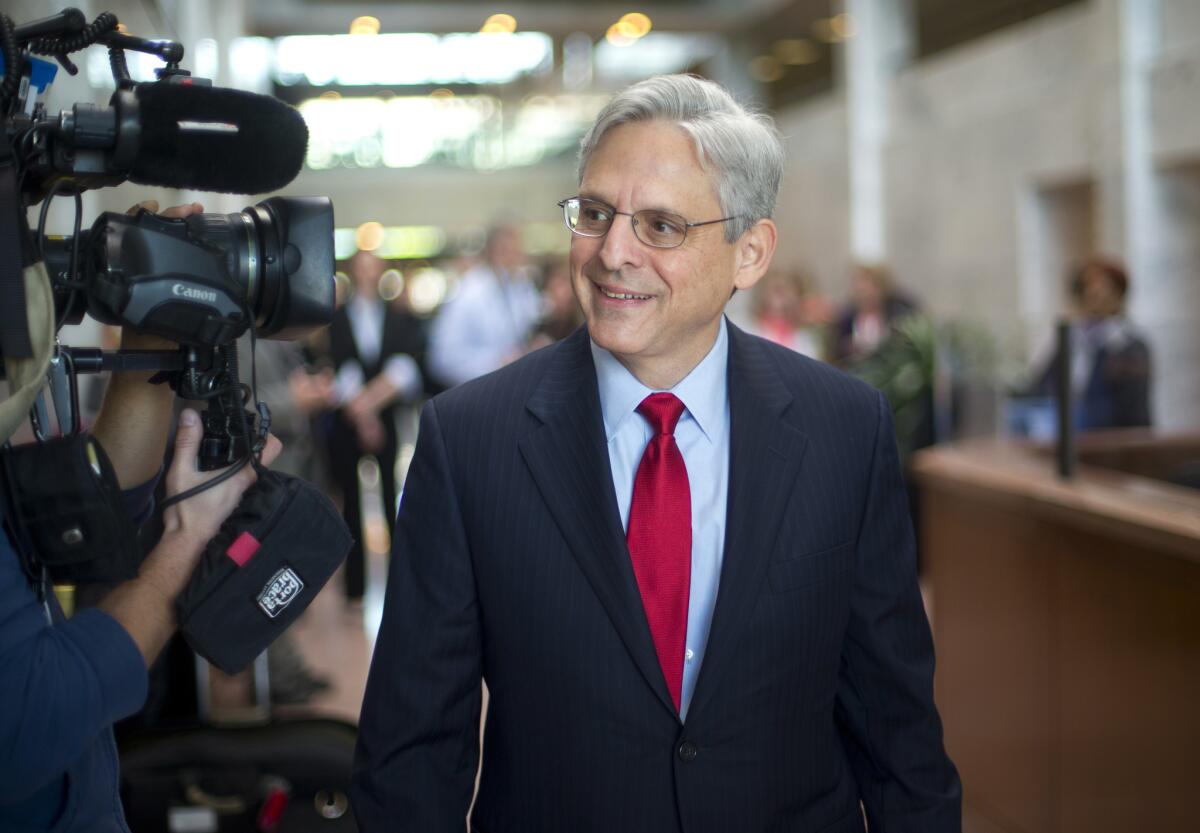
The Senate’s top Republican says “we can do with a little less drama from the White House” so the GOP can focus on advancing the party’s legislative goals.
Appearing Tuesday morning on “Bloomberg Daybreak,” Sen. Mitch McConnell of Kentucky was responding to reports that President Trump revealed highly classified information about the Islamic State group to Russian officials.
McConnell says, “I think we could do with a little less drama from the White House on a lot of things so that we can focus on our agenda.” He said that agenda included deregulation, tax reform and repealing and replacing the healthcare law.
McConnell also says he recommended to Trump that he nominate Merrick Garland to replace fired FBI Director James B. Comey. Garland, the federal judge nominated to the Supreme Court last year by President Obama, was denied a Senate hearing by McConnell.
Garland has not commented, but close associates contacted several news organizations Tuesday morning to say that the judge had no interest in leaving his current position.
This post was updated with comment from Garland associates.
Obama is making $400,000 for a single speech. Is that so different from other presidents?
After a brief hiatus of sun and fun, former President Obama emerged last month in his hometown of Chicago and immediately stepped into controversy over his post-White House buck-raking.
Obama appeared onstage before students and delivered a civic-minded exhortation to public service. What raised eyebrows — or, rather, certain eyebrows — was news the former president would be delivering a paid speech in September at a healthcare conference run by the trading and investment firm Cantor Fitzgerald.
Obama’s payday: a cool $400,000.
Here’s what past presidents have charged to dispense wisdom from their time in office, as pieced together from various accounts. (Former presidents are not required to report their sources of income and, given the likelihood of negative publicity, there is not a great incentive to do so.)
Rod Rosenstein says he’s unconcerned about Washington criticism over Comey firing
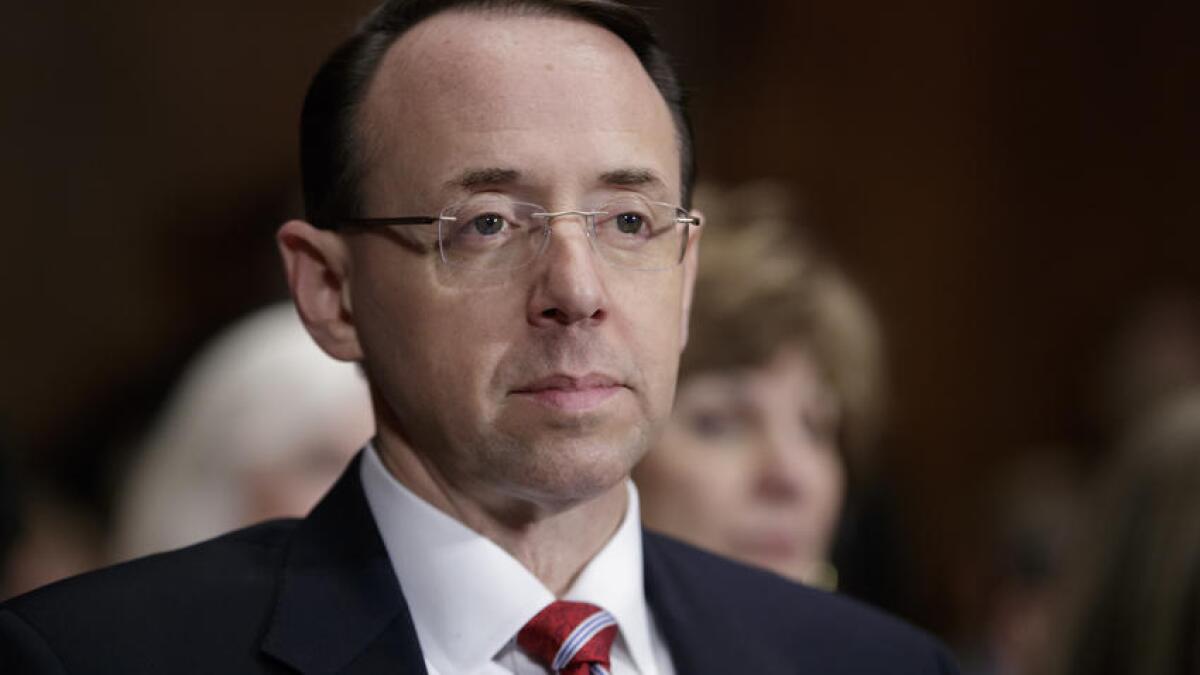
The deputy attorney general in the middle of the furor over the Russian investigation and the firing of former FBI Director James B. Comey said in a speech Monday night that he was focused on protecting the republic and not his reputation.
“I took an oath to preserve, protect and defend the Constitution of the United States. There is nothing in that oath about my reputation,” Rosenstein said in a speech to a business group in Baltimore.
“If you ask me, one of the main problems in Washington, D.C., is everybody is so busy running around trying to protect their reputation instead of protecting the republic, which is what they’re supposed to be doing,” Rosenstein said.
The speech was reported by the Baltimore Sun.
Because of the recusal of Atty. Gen. Jeff Sessions, Rosenstein will make the decisions for the Justice Department on the investigation of Russian interference in the election, and possible collusion with figures from the Trump campaign.
At the request of President Trump, Rosenstein last week also wrote a letter criticizing Comey for overstepping his role by making public statements about the Hillary Clinton email investigation.
The White House initially said that letter was the reason Trump fired Comey, though Trump later said he’d already made the decision before reading it.
Rosenstein is scheduled to brief the full Senate on Thursday.
Pressure is mounting on Rosenstein. Last week, several Democratic senators said he should resign if he was unwilling to appoint a special prosecutor to take over the Russia investigation.
Rosenstein, who was confirmed to the No. 2 job in the Justice Department last month, was picking up an award for demonstrating courage in public service.
“I didn’t deserve it in April, I don’t deserve it tonight, but I will try to earn it,” he said.
Rosenstein drew laughs when he read from a newspaper article.
“‘Some say Rod Rosenstein’s job is one of the most precarious positions in public service.’ That was written in 2007. I was U.S. attorney for Maryland at the time,” Rosenstein said. “Some things do not change.”
After the messy Comey firing last week, Rosenstein said a friend texted him advice to “get out of there.”
He said he replied that there “is no place I would rather be.”
“What is courage in government? It certainly includes standing on principle, ignoring the tyranny of the news cycle, resisting the urge to spin, remaining focused on the things that matter,” he said.
The ‘resistance’ heads to Trump’s D.C. hotel
The latest form of protest against President Trump took the form of projections onto the front entrance of his Washington hotel Monday night.
A group by the name Bell Visuals took credit for the act on Twitter.
Robin Bell, an artist and filmmaker, told CNN he projected those words onto the hotel’s facade from a van across the street to “call attention to accusations that President Donald Trump is allowing foreign leaders to pay for access by staying at a Trump property just a few blocks from the White House.”
The Constitution bars the president from accepting “emoluments” -- meaning gifts or payments -- from foreign governments. Whether a foreign official staying at a Trump hotel would be a violation of that ban has been hotly contested between Trump’s supporters and opponents.
Trump admits sharing information with Russia about terrorism threat
In tweets Tuesday morning, President Trump said he had shared “facts pertaining to terrorism and airline flight safety” with Russian diplomats in an Oval Office meeting last week, confirming a key part of a news report his aides had denied the night before.
Trump said he had shared the information in the hopes of getting Russia to “greatly step up their fights against ISIS and terrorism,” referring to the Islamic State.
Trump did not address the allegation at the heart of the story published Monday evening by the Washington Post -- that the information he gave Russian Foreign Minister Sergey Lavrov and Ambassador Sergei Kislyak included details provided to the U.S. by a foreign intelligence service that were highly sensitive and that the U.S. had promised not to share with other countries.
But his reference in the tweet to having an “absolute right” to share the information implied that he knows that some of what he said involved classified material. Under federal law, the president has a legal right to declassify information.
In a brief appearance Monday night, White House national security advisor H.R. McMaster had said the Post story was false “as reported,” a carefully worded denial that went on to dispute something that the story had not alleged. Trump had not shared any information that divulged “sources or methods” of intelligence collection, McMaster said.
The story said that the details Trump had shared, which included the name of the city in Syria where Islamic State operatives were preparing an airline bomb plot, could have allowed the Russians to deduce which foreign intelligence service had provided the information. That could jeopardize cooperation with that country, U.S. officials feared, according to the Post.
The plot appears to have involved using laptop computers to conceal bombs, according to U.S. officials.
The New York Times reported that it had confirmed a similar account Monday night.
Trump’s tweets marked the second time in a week that he has made statements that forced his staff to change their story about a major news development.
Last week, in an interview with NBC, he said he had decided to fire FBI Director James Comey regardless of any recommendation from Justice Department officials. White House representatives had spent the previous 36 hours insisting that he had acted on the recommendation of Deputy Atty. Gen. Rod J. Rosenstein.
Trump also said in the interview that he had been thinking about the “Russia thing” when he fired Comey, a reference to the FBI’s investigation into Russia’s efforts to influence the outcome of the 2016 election. His aides had also denied that.
As he has before, Trump suggested that the real problem wasn’t his conduct, but the fact that U.S. officials had told the press about it.
Russia denies reports that Trump revealed classified information to officials
Russia’s foreign ministry spokesman has denied reports that President Trump revealed classified information to senior officials during the Russian minister’s visit to the Oval Office last week.
The Washington Post reported on Monday that the revelation put a source of intelligence on Islamic State at risk.
Maria Zakharova, spokeswoman for the Russian foreign ministry, described the reports Tuesday on Facebook as “yet another fake.”
The reports came several days after the White House faced criticism for a possible security breach after it allowed a Russian news service photographer into the Oval Office to snap photos of Trump with Russian Foreign Minister Sergey Lavrov and Russian Ambassador Sergey Kislyak last week.
Trump shared highly classified intelligence about Islamic State with Russians, reports say>>
Trump took to Twitter Tuesday morning to defend his decision to share the information.
--
This card was updated at 4:31 a.m. to add Trump’s tweets.
Senators call report that Trump disclosed highly classified intelligence to Russians ‘appalling,’ ‘reckless’
Senators offered sharp reactions to reports that President Trump disclosed highly classified material to Russian officials during a recent meeting at the White House, calling the president’s action, if true, “terrifying,” “reckless” and “deeply disturbing”
The Washington Post reported the disclosure late Monday just as senators were arriving for an evening vote, and many shared the information as it was unfolding.
“This conduct by the president is not only dangerous, it’s reckless,” said Sen. Richard J. Durbin (D-Ill.), the assistant minority leader.
“That disclosure may not only jeopardize our troops and our people, but the security of those who risk their lives to tell us what is actually happening,” Durbin said. “I hope that members of the president’s own political party will step up at least in this instance and make it clear that this reckless conduct jeopardizes our national security.”
“If true, deeply disturbing,” tweeted Sen. John McCain (R-Ariz.).
Bob Corker, chairman of the Senate Foreign Relations Committee, told reporters he was concerned by the report.
“To compromise a source is something that you just don’t do,” he said. “That’s why we keep the information that we get from intelligence sources so close, is to prevent that from happening.”
Corker added, “Obviously they’re in a downward spiral right now and they’ve got to figure out a way to come to grips w all that’s happening.”
Some Republicans declined to comment, saying they had yet to read the report. The Washington Post said Trump bragged about the quality of U.S. intelligence during a meeting last week with Russian Foreign Minister Sergei Lavrov and Ambassador Sergey Kislyak at the White House.
The Russians met the president the day after Trump fired FBI Director James B. Comey amid the ongoing U.S. investigation into the Trump campaign’s possible links to Russian interference in the 2016 presidential election.
Trump reportedly discussed certain details with the Russians regarding an Islamic State threat involving laptops on aircraft, a disclosure that would have been illegal by lower-ranking U.S. officials.
Sen. Lindsey Graham (R-S.C.) said: “If it’s true, it’d be troubling.”
“I’m not going to speculate,” said Graham. “I’m tired of speculating about Trump every five minutes.”
Sen. Richard Blumenthal (D-Conn.) said colleagues chatting on the chamber floor as news broke were either “astonished or appalled.”
Even though the president’s actions may not be illegal, he said that “no one is above the rule of law in this country.”
“It is absolutely terrifying,” Blumenthal said. “It’s another example of the free press uncovering stuff that the American people should know that hopefully will cause an outcry and outrage that will have some cumulative effect in protecting our democracy.”
Deputy Atty. Gen. Rod Rosenstein to brief Senate on Trump’s firing of FBI’s Comey
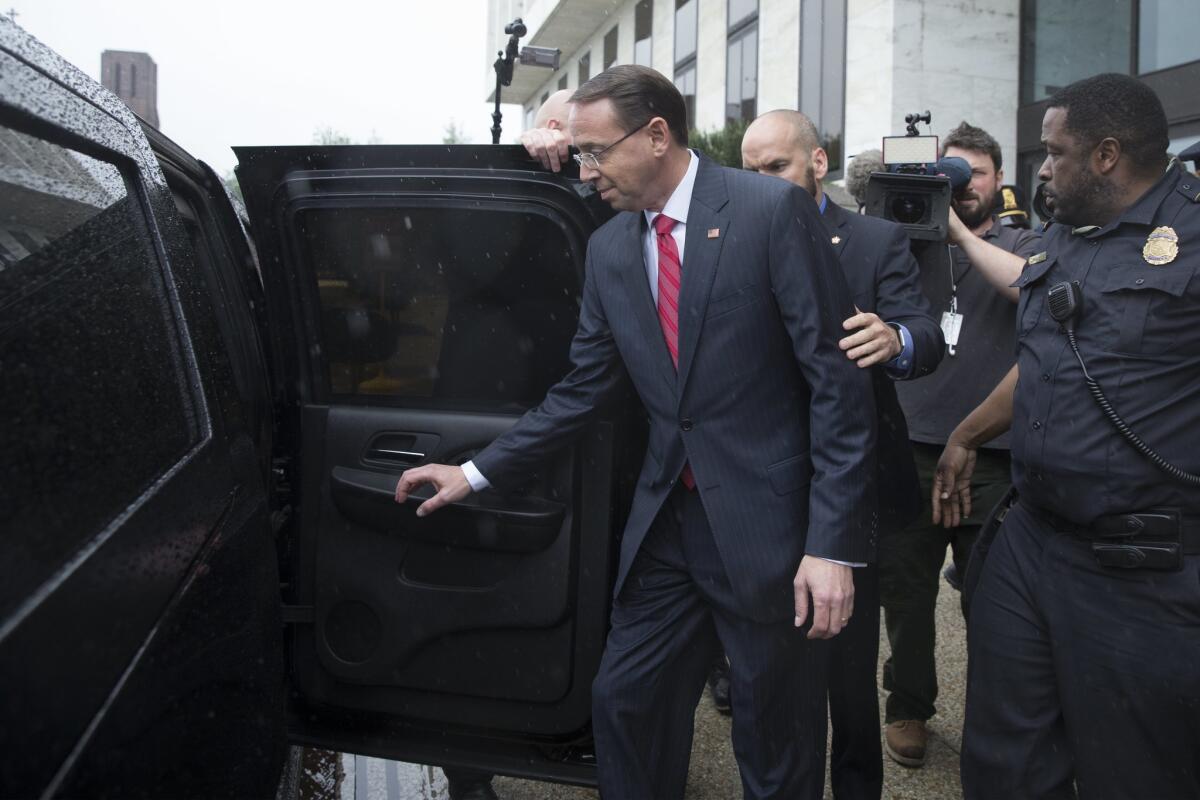
Deputy Atty. Gen. Rod Rosenstein will brief all members of the Senate on Thursday about President Trump’s firing of FBI Director James Comey, according to Senate Majority Leader Mitch McConnell’s office.
Last week, Democratic Leader Chuck Schumer said he made a request for Rosenstein to answer lawmakers’ questions about his memo on Comey and the circumstances surrounding his dismissal.
North Carolina voting law falls as Supreme Court turns down GOP appeal
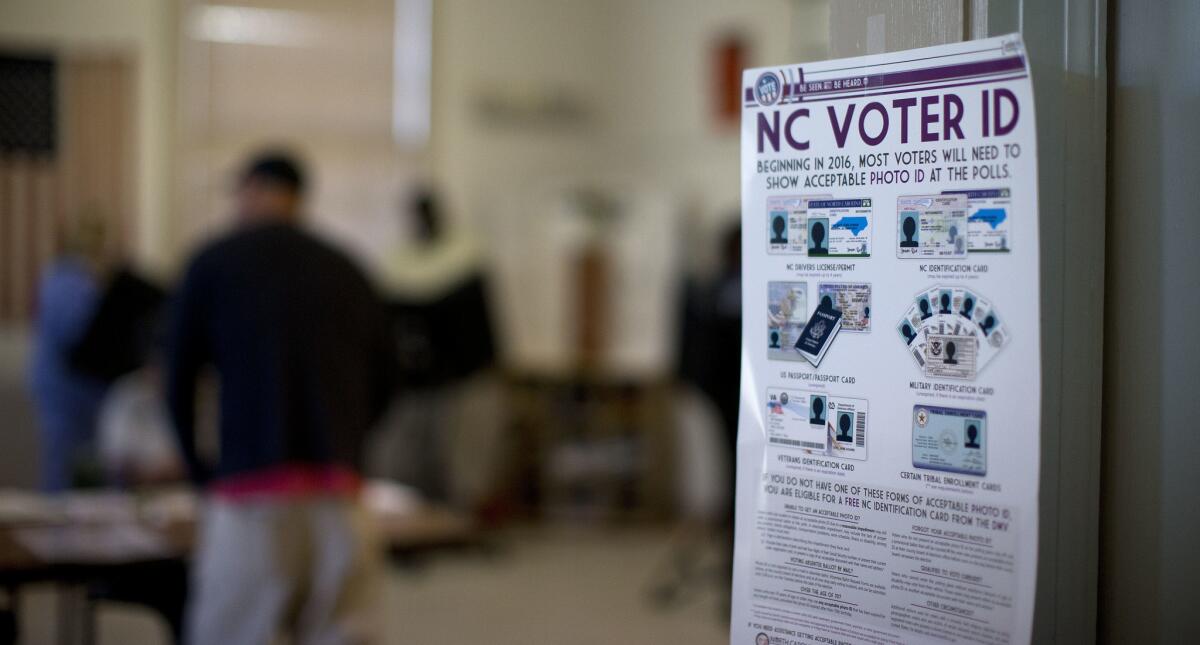
In a victory for voting rights advocates, the Supreme Court has turned down an appeal from North Carolina’s Republican leaders and let stand a decision that struck down their 2013 law that added new restrictions on voting.
The 4th Circuit Court had branded the law as racially biased and said North Carolina lawmakers had targeted black voters “with almost surgical precision.”
North Carolina lawmakers took action immediately after the Supreme Court by a 5-4 vote had voided part of the historic Voting Rights Act that required some states, including North Carolina, to get federal approval before altering their voting laws.
Watch live: U.S. 9th Circuit Court hears appeal on Trump’s travel ban
For political street fighter Nancy Pelosi, there’s new power in opposing Trump
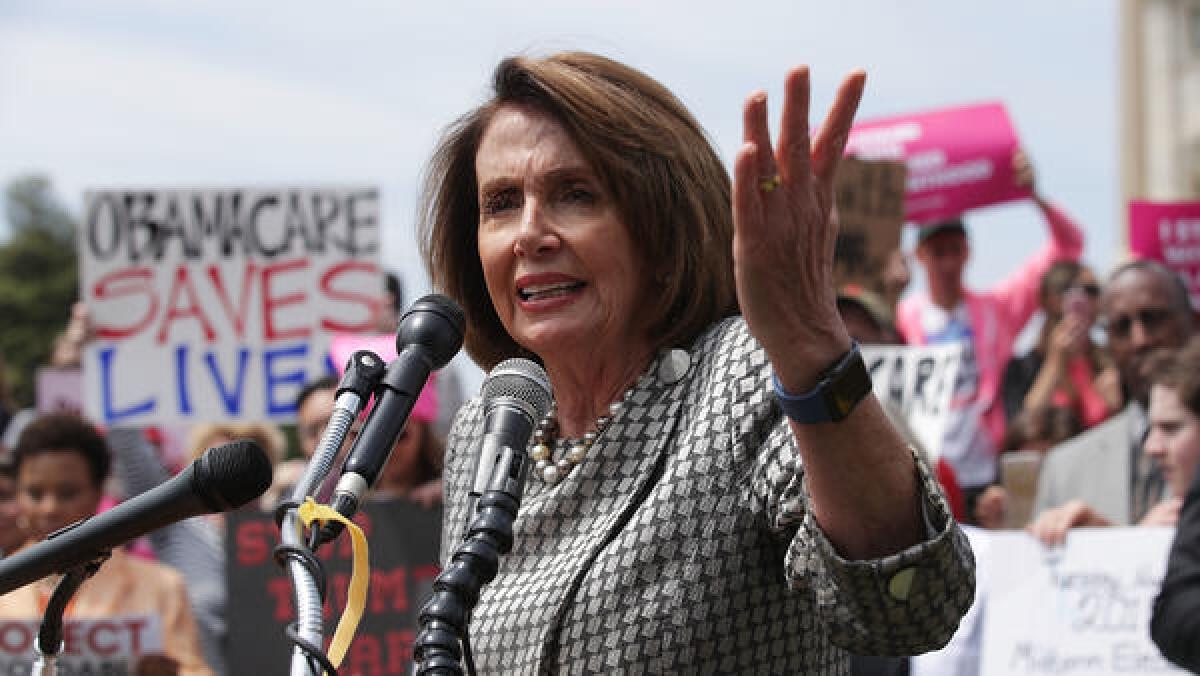
Even six months after Donald Trump won the White House, House Minority Leader Nancy Pelosi doesn’t want to talk about election night, preferring to fast-forward to what happened the next day.
That Wednesday morning was hard for Democrats. Many were so disheartened by Trump’s defeat of Hillary Clinton that they stayed up all night crying. Pelosi knew what to expect.
“Usually after an election when you don’t win, it’s very silent. Nobody calls,” Pelosi recalled during an interview in her bright yellow office steps from the House floor.
To her surprise, the phone started ringing. And it didn’t stop.
“We were overwhelmed, inundated by people saying, ‘This is urgent. What can we do to help?’” she said.
“People just showing up,” she continued, pointing to the spontaneous protests in the following weeks at airports, the Supreme Court and town hall meetings. “And the minute they showed up, they saw their power. And they continued to show up.”
After a week of self-inflicted chaos, Trump could see long-term costs to his presidency
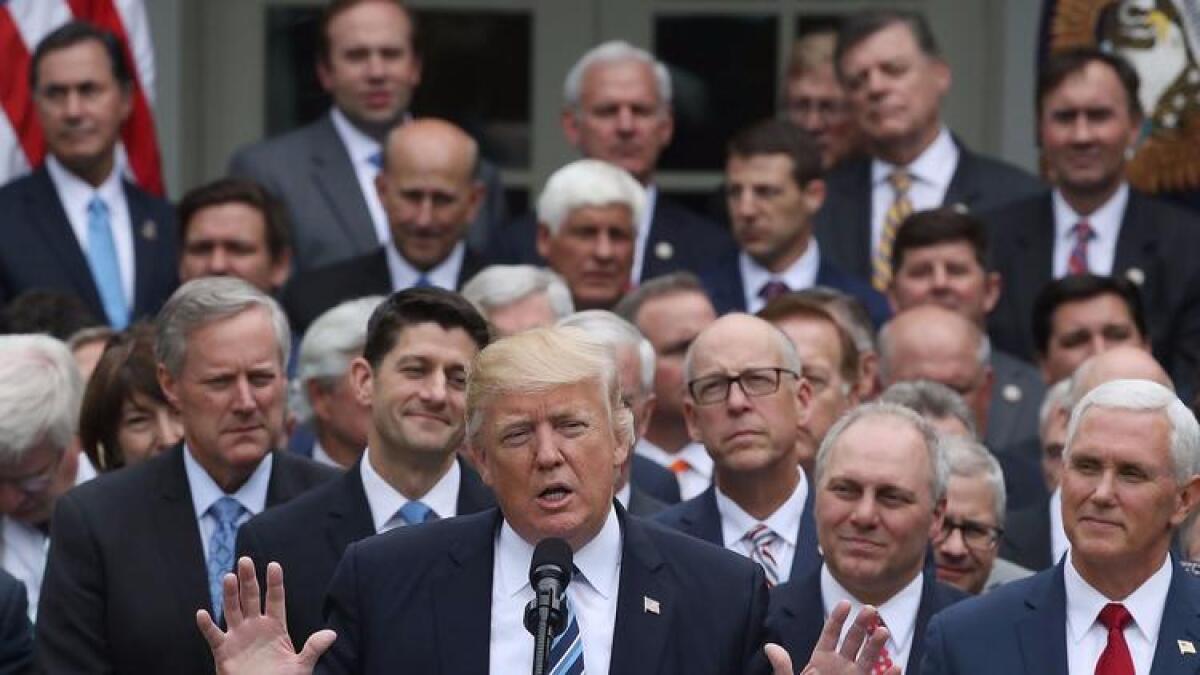
The string quartet had just finished when President Trump raised his arms in triumph.
“Am I doing okay?” Trump asked, turning to chuckling Republican leaders who had once shunned him but now surrounded him in the Rose Garden to celebrate the House’s passage of a healthcare bill. “I’m president! Hey, I’m president. Can you believe it?”
That was just over a week ago, and though the path ahead in the Senate for the bill looked difficult, administration officials and supporters could truthfully say, after several false starts, that they were moving forward on their legislative agenda.
Trump changed that in a hurry.
Trump prepares for first overseas trip, with anti-globalism at bay
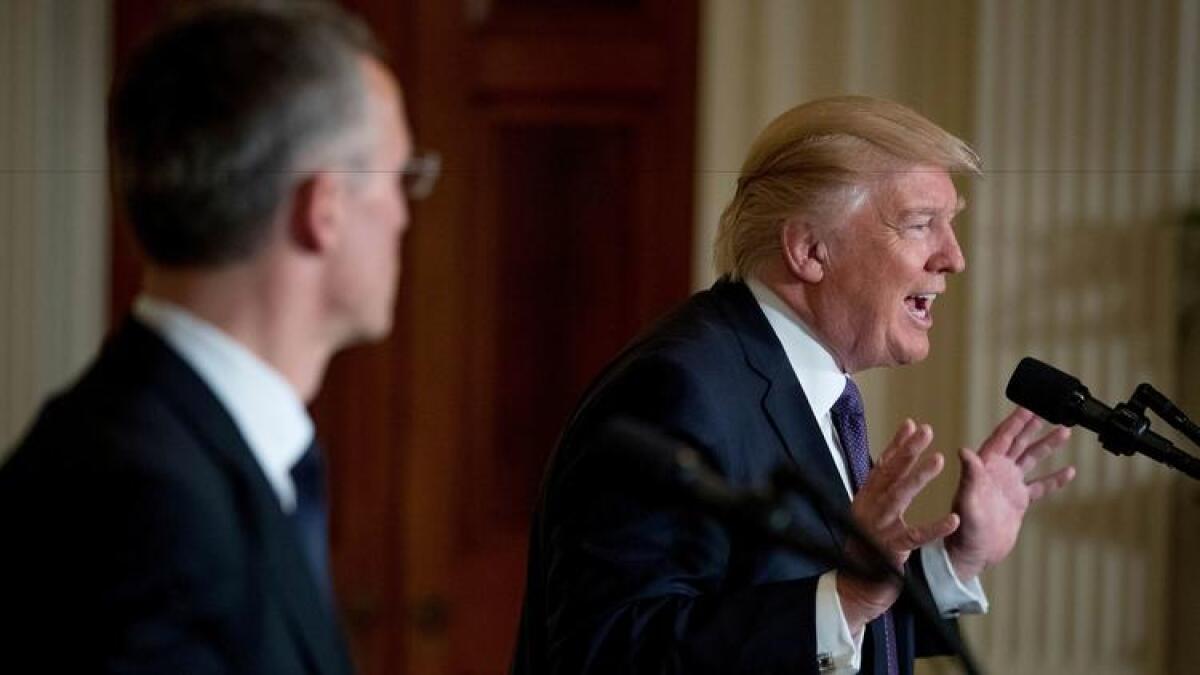
At his inauguration in January, President Trump looked down the National Mall and described a nation beset by “carnage,” its jobs going overseas and its military overextended to the advantage of other countries. He declared “America first,” a new inward-looking doctrine that invoked the phrase of the nationalists who opposed entering World War II.
Yet as Trump prepares to depart Friday for his first trip abroad, he no longer behaves like a president eager to disengage from the world, and from the postwar alliances of the last seven decades that he so denigrated as a candidate. Nor is the foreign stage looking as receptive to his anti-globalism as he had once expected, and hoped, when nationalists seemed ascendant only months ago.
Senators push Trump not to choose a political figure to head FBI
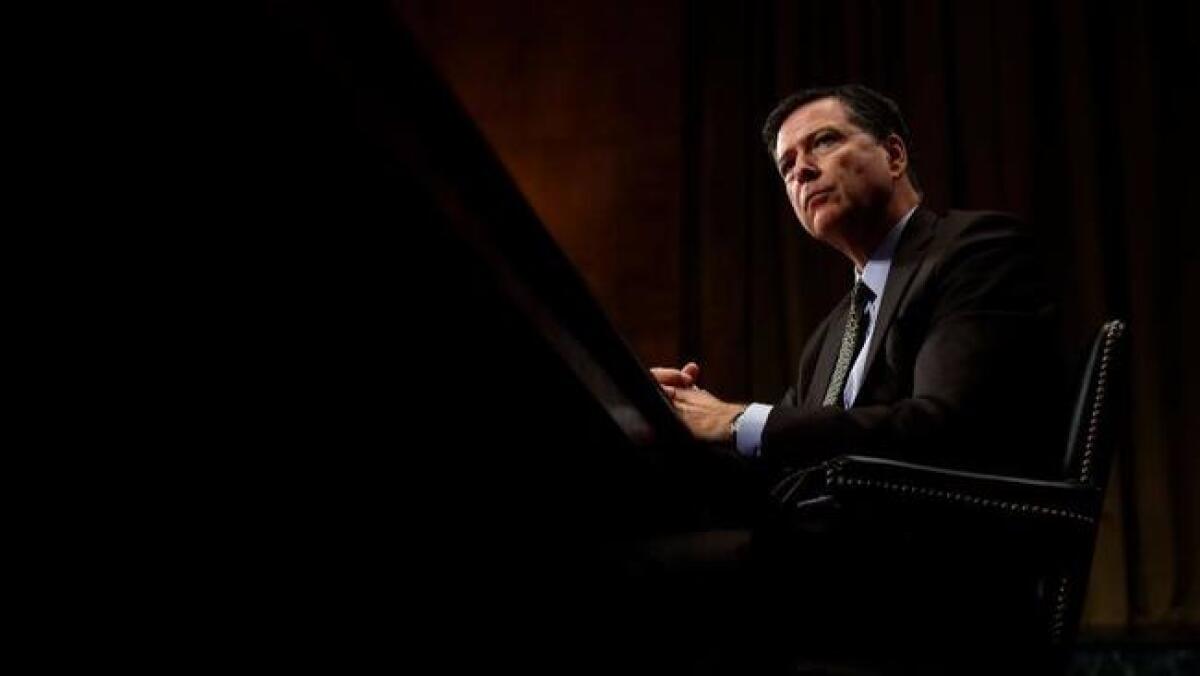
Even before he announces his choice for a new FBI chief, President Trump is getting pushback from the Senate, which will need to approve his pick to replace the fired former director, James Comey.
Democrats say they may try to block Trump’s nominee, whomever it might be; at least one leading Republican and many Democrats are saying the appointee shouldn’t be a political figure.
At least eight candidates have been interviewed for the post, which was vacated when Trump fired Comey last week. Trump, who leaves the U.S. on Friday on his first international trip as president, said it was possible he might make a “fast decision” and unveil a choice before he departs.
One leading contender is Sen. John Cornyn (R-Texas), but senior GOP colleague, Sen. Lindsey Graham of South Carolina warned against picking an elected official because the issues surrounding the appointment are so highly charged.
“John Cornyn under normal circumstances would be a superb choice to be FBI director, but these are not normal circumstances,” Graham said Sunday on NBC’s “Meet the Press.”
“The president has a chance to clean up the mess that he mostly created,” Graham said, referring to the array of explanations offered up by Trump and his staff for Comey’s firing.
The Republicans, with 52 seats, control the 100-member Senate. But if even three of them defect, the nomination would fail.
Democrats have raised an outcry over the dismissal of Comey, who as FBI chief was in charge of the investigation into Russian meddling in the U.S. election. Critics say Comey’s ouster could be an effort to impede the FBI probe.
Interviewed on CNN’s “State of the Nation,” the Senate’s top Democrat, Sen. Charles E. Schumer of New York, said his party might seek to block approval of Trump’s nominee to head the FBI to express strong disapproval over the circumstances of Comey’s removal.
“I think there are a lot of Democrats who feel that way,” Schumer said. “We have to discuss it as a caucus, but I would support that move.”
Schumer and other senior Democrats continued to demand clarity from the White House on whether Trump recorded conversations he had with Comey earlier this year.
The president tweeted on Friday that the fired FBI chief “better hope that there are no ‘tapes’ of our conversations.” White House spokesman Sean Spicer on Friday repeatedly declined to clarify whether such tapes exist.
Trump said in his dismissal letter to Comey that the director had informed him on three separate occasions that he was not under investigation -- once at a private dinner and twice in phone conversations, he later told NBC News’ Lester Holt. Comey associates have cast doubt on that account.
“If there are tapes, the president should turn them over immediately” to congressional investigators,” Schumer said, adding: “To destroy them would be a violation of law.”
Rep. Adam Schiff (D-Burbank), the top Democrat on the House Intelligence Committee, said in an earlier statement that Trump must either hand over the tapes or acknowledge they did not exist.
Schiff said Sunday on CBS’ “Face the Nation” that the person chosen to head the FBI must have “absolute” integrity and independence.
“I would strongly urge the administration to pick someone who is completely apolitical, who doesn’t come out of the political process,” he said. He suggested a retired or acting judge.
-------------
FOR THE RECORD
9:45 a.m.: An earlier version of this article misspelled Sen. John Cornyn’s last name as Cornryn, and referred to Sen. Charles E. Schumer as Charles S. Schumer.
Tillerson on Russia: No ‘free pass’ on election interference
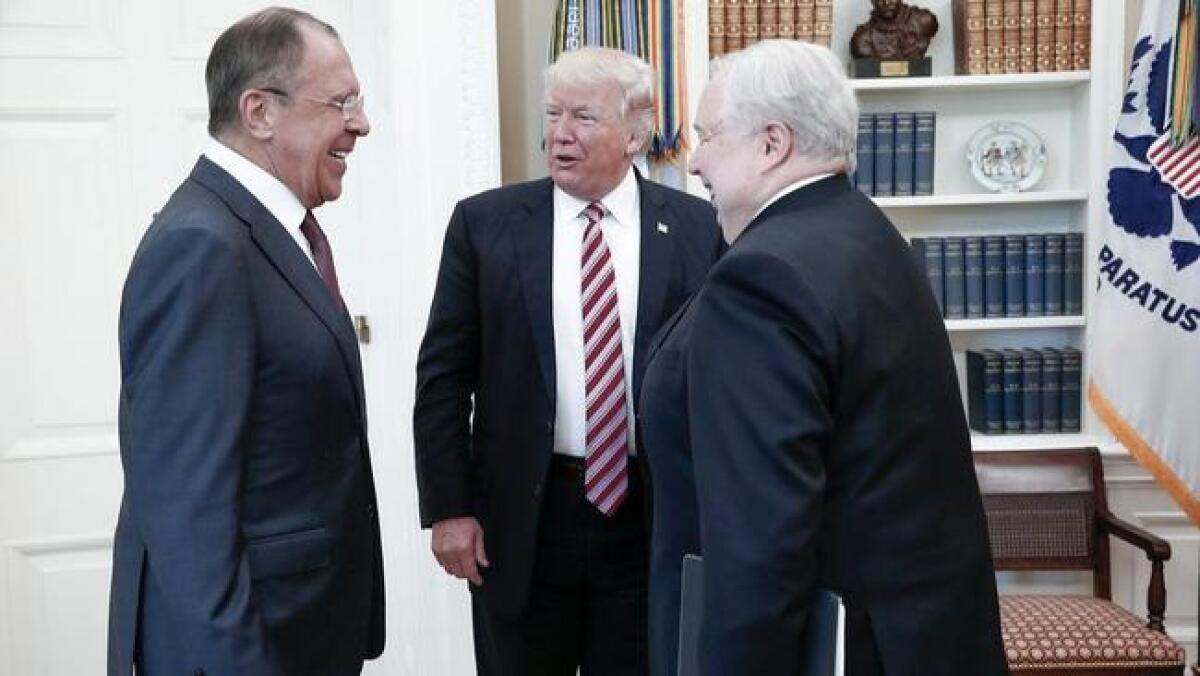
Secretary of State Rex Tillerson says the Trump administration is not giving Russia a “free pass” on interference in last year’s U.S. election.
Appearing on NBC’s “Meet the Press,” the secretary was questioned about an assertion by Russia’s foreign minister, Sergei Lavrov, that the issue was not raised during his talks last week in Washington with Tillerson – or at a White House meeting with President Trump.
Tillerson did not directly confirm that Russian election-meddling went unaddressed in the talks, but told interviewer Chuck Todd “we’re not trying to start with a clean slate” in dealings with Moscow.
“We’re starting with the slate we have, and all the problems that are on that slate,” he said. “We don’t dismiss any of them. We don’t give anyone a free pass on any of them.”
Discussing Russia and the election has become something of a minefield for Trump’s senior aides. The difficulties mounted this past week after Trump fired FBI chief James Comey while he was in the midst of overseeing an investigation into Russian interference and the possibility of collusion on the part of people associated with Trump’s campaign.
Trump himself has reluctantly acknowledged the U.S. intelligence finding that interference occurred, but says its effect cannot be known.
Pressed as to whether he believes Russian meddling took place, Tillerson said Moscow’s election-linked cyberattacks had been a proven problem for the United States and for other countries as well.
“I think it’s been well documented -- it’s pretty well understood, the nature of that interference, here and elsewhere,” he said.
“These are not new tactics on the part of the Russian government,” he added.
The secretary said Comey’s firing did not cause him any concerns about his own degree of independence in carrying out his duties.
“I have a great relationship with the president,” he said. “I understand what his objectives are. When I’m not clear on what his objectives are, we talk about it.”
Tillerson demurred when asked about the participation of Russia’s ambassador to the United States, Sergey Kislyak, in the Oval Office meeting Wednesday between Trump and Lavrov.
Kislyak is a major figure in the probe of Russian interference. Trump’s national security advisor, Michael Flynn, was fired in February for lying about the nature of conversations he had with the ambassador before Trump’s inauguration.
The Russian envoy’s presence at the meeting was not disclosed by the White House, but Russia’s state-sponsored news agency, Tass, released official photos of the encounter, which was closed to U.S. journalists.
Asked why Kislyak’s participation was not made public by the Trump administration, Tillerson replied: “You’d have to put that question to the White House and the protocol people .… I don’t know.”
White House calls North Korea ‘flagrant menace’ after missile test launch
The White House is calling North Korea a “flagrant menace” following the test launch of a ballistic missile, the seventh such firing this year.
President Trump was briefed on the missile test, according to a statement the White House released late Saturday. The missile firing took place on Sunday, North Korea time, with the projectile landing in the sea between North Korea and Japan.
“The United States maintains our ironclad commitment to stand with our allies in the face of the serious threat posed by North Korea,” the statement said.
The statement called for stronger sanctions against the North, but did not directly threaten U.S. military action. Trump has said previously that bellicose actions by Kim Jong Un’s government could trigger “major, major conflict.”
The test firing, against a backdrop of rising tensions on the Korean peninsula, came four days after South Korea’s new president, Moon Jae-in, took office. Moon has called for outreach to Kim, North Korea’s mercurial leader.
In its statement, the White House appeared to call indirectly for Russian support in containing Kim’s nuclear ambitions, suggesting they posed a threat to Russia as well.
“With the missile impacting so close to Russian soil – in fact, closer to Russia than to Japan – the president cannot imagine that Russia is pleased,” the statement said.
Russia, a onetime ally of North Korea, is a member of a six-nation consortium aimed at reining in the reclusive nation’s nuclear program through diplomatic and financial incentives, but that forum has been inactive for nearly a decade.
Russia’s Interfax news agency cited military officials as saying that the missile had posed no danger to its territory. It said the projectile was tracked by Russian anti-missile defenses during its 23-minute flight before plummeting into the sea more than 300 miles off the Russian coast.
Embattled Trump lashes out at ‘pathetic’ critics and ‘broken’ system
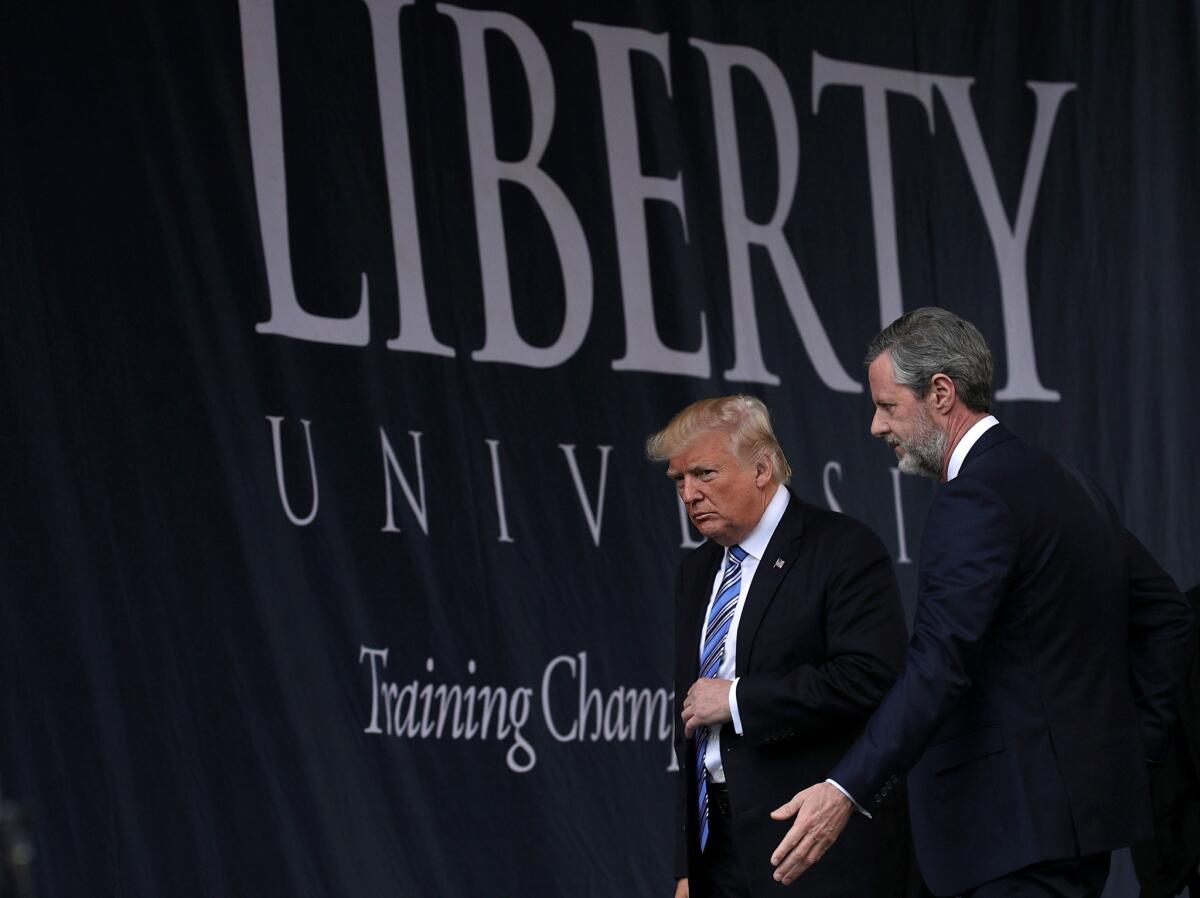
In a respite from the tumult in Washington he set off with the firing of his FBI director this week, an embattled President Trump on Saturday lashed out at “pathetic” critics and the establishment class he charges with trying to block his path.
Speaking to graduates at Liberty University, the president returned to his outsider message. He spoke defiantly about challenging the Washington order as he grapples with a political crisis that has intensified amid his administration’s contradictory explanations for the FBI shake-up.
“I’ve seen firsthand how the system is broken,” Trump said, and how a “small group of failed voices” attempts to dictate how to live and how to think.
“No one has ever achieved anything significant without a chorus of critics standing on the sidelines explaining why it can’t be done,” Trump said. “Nothing is easier or more pathetic than being a critic, because they’re people that can’t get the job done. But the future belongs to the dreamers, not to the critics.”
Trump is struggling to contain the fallout from his firing of FBI Director James Comey amid the president’s admission that Comey’s investigation into Russian connections to Trump’s inner circle was a factor. Trump’s threatening tweet warning Comey that he may have taped private conversations between the two of them has intensified concerns on both sides of the aisle about whether Trump is working to undermine the independence of the nation’s top law enforcement agency.
But on Saturday, he talked of courage of conviction and how those who lack it don’t have “the guts or the stamina” to do what’s right. “Being an outsider is fine. Embrace the label,” Trump said. “Because it’s the outsiders who change the world and who make a real and lasting difference.”
The speech was Trump’s first public appearance outside the White House since Comey’s firing on Tuesday. On Saturday, officials from the Department of Justice were set to interview several candidates to replace Comey, who served less than half of the 10-year term he began after being nominated by President Obama and being overwhelmingly confirmed by the Senate in 2013.
Trump told reporters he could make a “fast decision,” before he leaves for his first foreign trip on Friday.
Trump says he may choose a new FBI director by Friday
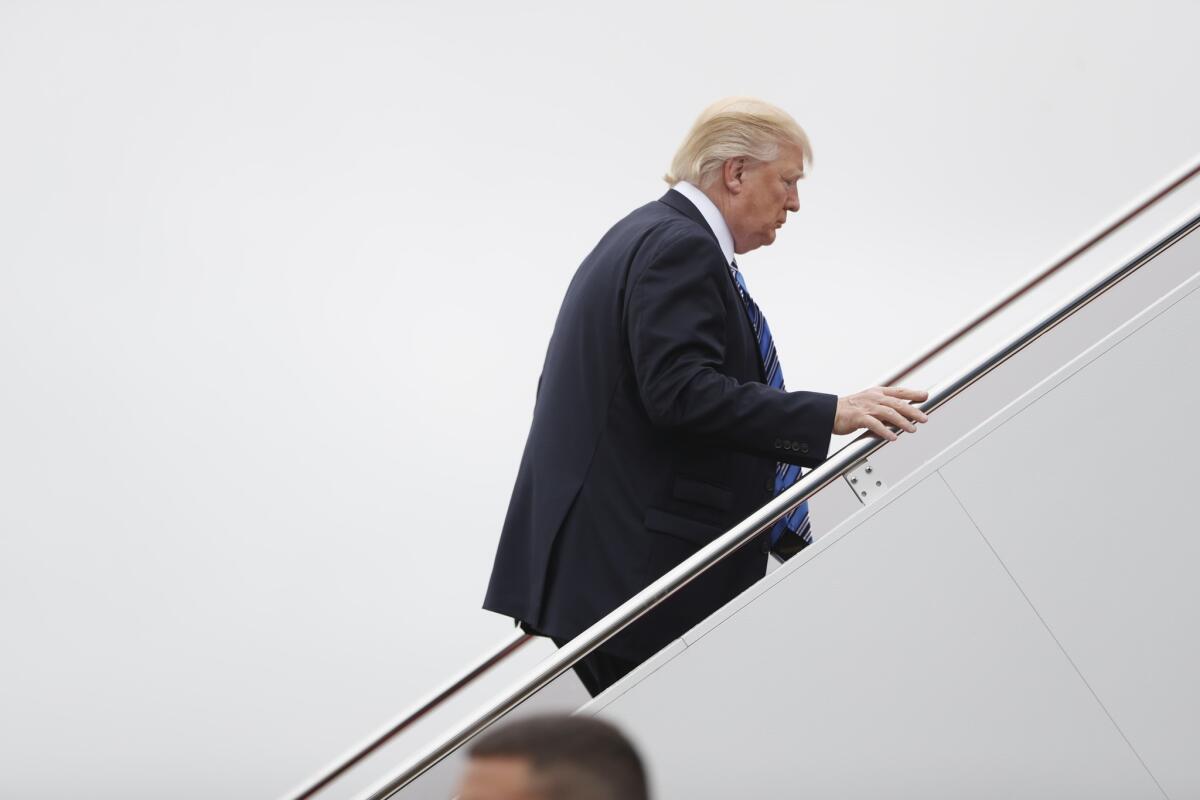
President Trump said he could make a “fast decision” on selecting a new FBI director, perhaps naming the replacement for James Comey before he leaves for his first foreign trip on Friday.
The potential nominees “are very well known, highly respected, really talented people,” the president told reporters aboard Air Force One.
Justice Department officials will be interviewing several possible candidates Saturday.
Trump’s comments about the search came as he traveled to Lynchburg, Va., to deliver the commencement address at Liberty University.
He is scheduled to depart next Friday on an eight-day foreign trip, his first as president, beginning in Saudi Arabia.
Trump’s statements linking Russia investigation to Comey firing could lead to legal problems
A growing number of legal experts say President Trump has opened himself up to a charge of obstruction of justice this week when he said “this Russia thing with Trump” was on his mind when he fired FBI Director James Comey.
The federal law against obstruction of justice, a felony, is written broadly and applies to pending investigations. It can cover anyone who “corruptly … endeavors to influence, obstruct or impede the due and proper administration of the law under which any pending proceeding is being had before any department or agency of the United States.” In another section, the word “corruptly” is defined as “acting with an improper purpose.”
Trump’s repeated references to the Russia investigation in interviews, tweets and the letter he sent Comey informing him that he’d been fired could be interpreted as an effort to “obstruct or impede” the investigation, the legal experts said.
The threat is not a completely theoretical one: President Nixon, who was forced to resign under threat of impeachment, and President Clinton, who was impeached, were both accused of obstruction of justice.
‘Garden Spicer’ lets you put Sean Spicer in (or among) the bushes of your choosing
Looking for a way to spruce up your landscaping or make your Mother’s Day flowers stand out? Look no further than “Garden Spicer,” an homage to a recent moment for the White House Press Secretary.
While being questioned by reporters about former FBI Director James Comey’s firing, Sean Spicer and his staff stood “among bushes,” per the Washington Post. (The report originally said he was “in” the bushes; it was later amended.)
Thanks to a Facebook user named Lisa Kadonaga, you can download and print out a hiding Spicer for your own use.
And since we’re so close to a gardening-related holiday:
Download your own “Garden Spicer” for free on Dropbox.
Trump pledges to campaign for GOP candidates in midterm, forecasts gains for party
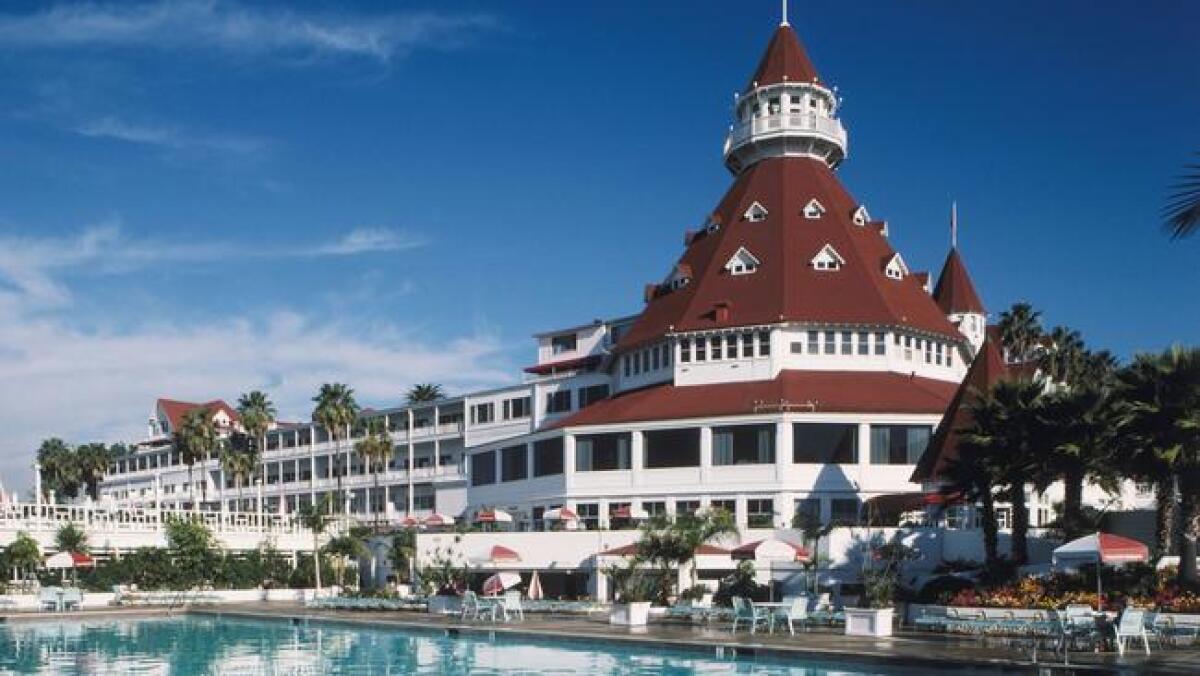
President Trump praised his administration Friday for “rapidly” fixing problems voters want fixed and pledged to travel widely before the 2018 elections to extend Republican advantages in the House and Senate.
In a video aired at the Republican National Committee meeting in Coronado, Calif., Trump listed gains he said had been made during his early tenure: “taking bold action” to reorganize federal agencies, cutting regulations and, in a comment that drew applause, putting “another conservative voice on the Supreme Court for future generations.”
“Without your leadership in the states, we would not have accomplished so much so fast — don’t forget we set lots of records — and I think we’re going to do even better next time,” he said.
It was not clear whether that was a reference to a reelection campaign in 2020 or the looming 2018 congressional elections.
But Trump did contend that he would be an active participant in trying to break a hex that has struck most presidents two years after their initial election: losing House seats in the midterms.
“I’ll be going around to different states. I’ll be working hard for the people running for the Congress and for the people running for the Senate,” he said.
“We can pick up a lot of seats especially if it all keeps going like it’s going now. Together, we will put this country on the right path to make America great again. Remember, make America great again or, if you want, America first.”
Trump did not mention the firestorm over his firing this week of FBI Director James Comey. Nor did he mention the difficult effort to repeal and replace Obamacare — one of his most consistent promises of 2016.
The fight over healthcare has made Trump’s 2018 goal more difficult; congressional campaign analysts have suggested that nearly two dozen seats have moved in the direction of Democrats since the Republican plan surfaced.
In his video message, the president looked forward, instead, to reforming the nation’s tax laws. He pledged to cut business taxes from 35% to 15% and said he would change tax rules that have led U.S. companies to park profits offshore.
“We’re going to have money that can’t come back into our country come flowing back in by the trillions,” he said. “Could be $4 [trillion] or $5 trillion that’s coming back into our country. Right now, you can’t get it back; the taxes are too high, and the bureaucracy is too strong.”
Prior estimates have suggested that figure was on the high end of repatriation benefits. In 2015, estimates suggested $2.4 trillion was in offshore accounts.
Trump also made a point of praising Homeland Security Chief John Kelly, saying that he has done “an incredible job” in limiting illegal immigration into the country.
“The security of our country and safety of the American people are at risk,” Trump said. “We want to strengthen our military and defend our borders if we have any goal of keeping our people safe.”
The president made the remarks just miles from the Mexican border, and in a state where Republicans are far more likely than their counterparts elsewhere to support immigration reform that allows a path to citizenship — an option Trump has ruled out.
Sean Spicer won’t deny that Trump is secretly recording White House conversations
Press Secretary Sean Spicer was given several opportunities Friday to deny that President Trump is secretly recording conversations that occur in the White House. He never did.
Trump has complained bitterly about his belief that the Obama administration had secretly tapped his phones. The possibility that he might be surveilling his own White House was raised by a tweet he sent Friday morning.
“James Comey better hope that there are no ‘tapes’ of our conversations before he starts leaking to the press!” he wrote, referring to discussions he had with FBI Director James B. Comey, who Trump fired this week in a move that set off a political firestorm.
When asked if that meant that Trump was recording conversations, Spicer said he had asked the president about the issue.
Based on that conversation, he offered this response: “The president has nothing further to add on that.”
He stuck to that response several times as reporters circled back to the question of whether Trump is using recording devices in the White House.
Spicer had been absent from the press briefing room for two days while serving Navy Reserve duty at the Pentagon. It was his deputy, Sarah Huckabee Sanders, who had to step in to brief the media under circumstances that would challenge even the most veteran administration spokesman.
In separate tweets Friday morning Trump seemed to hint at dissatisfaction with how his communications team has weathered the firestorm he created with the abrupt decision to fire Comey on Tuesday.
Spicer defended the hard work of his team, talking about the long hours they put in, before seeming to echo the president in explaining why it was not always possible to present a clear and accurate message to reporters, and, through them, to the public.
The president, Spicer said, is incredibly active and maintains a “robust schedule.”
“Sometimes we don’t have an opportunity to get in to see him and get his whole thinking,” he said.
With tough sentencing policy, Atty. Gen. Sessions pledges redoubled war on drugs
Atty. Gen. Jeff Sessions is promising to renew the federal government’s war on drugs, saying tough new sentencing policies are necessary to combat what he described as a surge of violent crime in cities.
The Justice Department on Friday released a memo from Sessions ordering federal prosecutors to pursue the highest charges possible, including those that carry mandatory minimum sentences, for drug offenders.
“If you are a drug trafficker, we will not look the other way,” Sessions said Friday at the Justice Department. “We will not be willfully blind to your conduct.”
Sessions is ending Obama administration policies that told federal prosecutors to avoid charging low-level offenders with crimes that carry heavy mandatory sentences.
The new Justice Department policy was met with fierce criticism from sentencing advocates, some former federal prosecutors and even some Republicans in Congress who have been pursuing sentencing-reform measures.
“To be tough on crime we have to be smart on crime,” tweeted Sen. Mike Lee (R-Utah). “That is why criminal justice reform is a conservative issue.”
Violent crime has increased over the last two years in many of the nation’s cities, though it is still far below rates in the 1990s. Overall, according to the FBI, the nation’s crime rate fell 50% between 1993 and 2015.
Sessions said the crackdown was “a key part of President Trump’s promise to keep America safe,” linking drug trafficking to increased homicide rates in some cities.
“Drug trafficking is an inherently violent business,” he said. “If you want to collect a drug debt, you can’t file a lawsuit in court. You collect it by the barrel of a gun.”
He said heroin is cheaper, more pure and more easily available than ever. Advocates of justice reform say that the nation’s opioid crisis is evidence that tough policies of the past have failed.
But Sessions said that tougher enforcement could “reverse that trend.”
“So we are returning to the enforcement of the law as passed by Congress – plain and simple,” he said.
Watch live: White House holds daily press briefing
Something Trump and Elizabeth Warren agree on: Bringing back Glass-Steagall to break up big banks
Carter Glass and Thomas Steagall have been dead for more than 70 years. But the two congressmen apparently can still accomplish the seemingly impossible: unite big names in a sharply divided Washington.
The roster of those who want to break up the biggest U.S. banks by restoring a key piece of legislation Glass and Steagall sponsored in the midst of the Great Depression includes President Trump; liberal firebrand Sen. Elizabeth Warren; Trump economic advisor and former Goldman Sachs executive Gary Cohn; avowed democratic socialist Sen. Bernie Sanders; Sen. John McCain, the 2008 Republican presidential nominee; and progressive icon Rep. Barbara Lee.
Glass-Steagall, as the 1933 law was known, is credited with helping keep the U.S. financial system safe from a major crash until it was largely repealed in 1999.
Within a decade, the financial system was in severe crisis.
Trump lawyers push back against Russia ties in letter
Lawyers for President Trump said Friday that a review of his last 10 years of tax returns do not reflect “any income of any type from Russian sources,” with some exceptions. It’s the latest attempt by the president to tamp down concerns about any Russian ties amid an ongoing investigation of his campaign’s associates.
The attorneys did not release copies of Trump’s tax returns, so their conclusions can’t be independently verified. Their review also notably takes into account only Trump’s returns from the past 10 years, leaving open questions about whether there were financial dealings with Russia in earlier years.
In a letter released to the AP, the attorneys said there is no equity investment by Russians in entities controlled by Trump or debt owed by Trump to Russian lenders. But it did reflect some exceptions, including income from the 2013 Miss Universe pageant that was held in Moscow and a property sold to a Russian billionaire in 2008 for $95 million.
The White House said Trump asked his lawyers for the letter following a request from Sen. Lindsey Graham (R-S.C.) for information on any ties Trump might have to Russia. Graham leads one of the congressional committees investigating Russia’s interference in last year’s election.
The letter came amid an active FBI probe into the Trump 2016 campaign’s possible ties to Russia’s election meddling and days after Trump’s stunning firing of FBI Director James Comey.
“I have no investments in Russia, none whatsoever,” Trump said Thursday in an interview with NBC News. “I don’t have property in Russia. A lot of people thought I owned office buildings in Moscow. I don’t have property in Russia.”
The president said he “had dealings over the years,” including the Miss Universe pageant and the sale of a home to “a very wealthy Russian.” ’’I had it in Moscow [a] long time ago, but other than that I have nothing to do with Russia,” he said, referring to the pageant.
The unnamed Russian billionaire cited by the Trump company’s lawyers is Dmitry Rybolovlev, whose financial empire springs from his companies’ production of potash, often used for fertilizer.
Trump had purchased the 62,000-square-foot estate for $41.35 million in 2004; he sold the mansion to Rybolovlev in July 2008 for $95 million. The deal was widely reported at the time, including by the Associated Press.
When Trump was pressed during a campaign conference last year about his ties to Russia, he said: “You know the closest I came to Russia, I bought a house a number of years ago in Palm Beach,” adding that “I sold it to a Russian for $100 million.”
The letter, written by attorneys Sheri Dillon and William Nelson from the law firm of Morgan, Lewis & Bockius LLP, simultaneously leaves open the possibility of other Russian ties while attempting to dismiss them.
The letter doesn’t vouch for any of Trump’s personal federal tax returns that predate the past decade. The attorneys also write that over the last 10 years, it is likely that the Trump Organization sold or rented condos, or other products, that “could have produced income attributable to Russian sources.”
“With respect to this last exception, the amounts are immaterial,” the attorney wrote.
North Korea sends a letter of protest to Congress over sanctions
A North Korean parliamentary committee on Friday sent a rare letter of protest to the U.S. House of Representatives, complaining about a proposed new package of tougher sanctions.
The sanctions were condemned as a “heinous act against humanity” by the foreign affairs committee of the North’s Supreme People’s Assembly, according to a state media report.
It was not immediately clear how the protest was conveyed — if it was sent by mail or how it was addressed — because North Korea and the United States have no diplomatic relations and virtually no official channels of communication. The report, carried by the North’s Korean Central News Agency, said the letter was sent Friday.
Trump says Comey better hope there are no ‘tapes’ of talks
President Donald Trump, in an apparent warning to his fired FBI director, said Friday that James Comey had better hope there are no “tapes” of their conversations. Trump’s tweet came the morning after he asserted Comey had told him three times that he wasn’t under FBI investigation.
“I said, ‘If it’s possible, would you let me know, am I under investigation?’ He said, you are not under investigation,” Trump said in an interview Thursday with NBC News. He said the discussions happened in two phone calls and at a dinner in which Comey was asking to keep his job.
Comey has not confirmed Trump’s account. Late Thursday, the New York Times cited two unnamed Comey associates who recounted his version of a January dinner with the president in which Trump asked for a pledge of loyalty. Comey declined, instead offering to be “honest.” When Trump then pressed for “honest loyalty,” Comey told him, “You will have that,” the associates said.
White House spokeswoman Sarah Huckabee Sanders disputed the report and said the president would “never even suggest the expectation of personal loyalty.” Officials did not immediately respond to questions about whether Trump recorded his discussions with the FBI director.
The president’s morning Twitter comments again raised the specter of Richard Nixon, who secretly taped conversations and telephone calls in the White House during the Watergate investigation that ultimately led to his downfall. Trump’s firing of Comey already has left him with the dubious distinction of being the first president since Nixon to fire a law enforcement official overseeing an investigation tied to the White House.
Also on Friday, Trump criticized recent news coverage, saying it isn’t possible for his “surrogates to stand at podium with perfect accuracy” and threatening to cancel press briefings.
Sunshine, optimism and a few crossed fingers as Republican Party leaders gather in California to plan for 2018 election

Across the country in Washington, fresh trouble was breaking out by the hour, enveloping a Republican president and stalling a raft of campaign promises in his young presidency. But here, at a gathering of Republican Party leaders, the mood was upbeat.
On Wednesday, the second day in which President Trump’s administration was buried in fallout from his decision to fire FBI Director James B. Comey, Republican National Committee members and guests gathered under festive white lights on the lawn of the elegant Hotel del Coronado, serenaded by a guitarist who played “Hotel California” as the sun set.
“Desserts, more beverages and … fine cigars” were waiting at the RNC’s next private party stop, a host told the happy and relaxed crowd.
On Thursday, RNC members heard optimistic assessments of the party’s financial standing, listened to an invitation-only speech by the president’s daughter-in-law Lara Trump and talked up strategies for the 2018 election.
For a few days, the members of the RNC are happily in a bubble.
Members of Congress might be growing a bit wobbly on Trump and the media atmospherics may be cloudy and getting darker, but little of that negativity was visible at this sun-splashed resort.
Trump now says he’ll release his taxes — maybe — after he leaves office
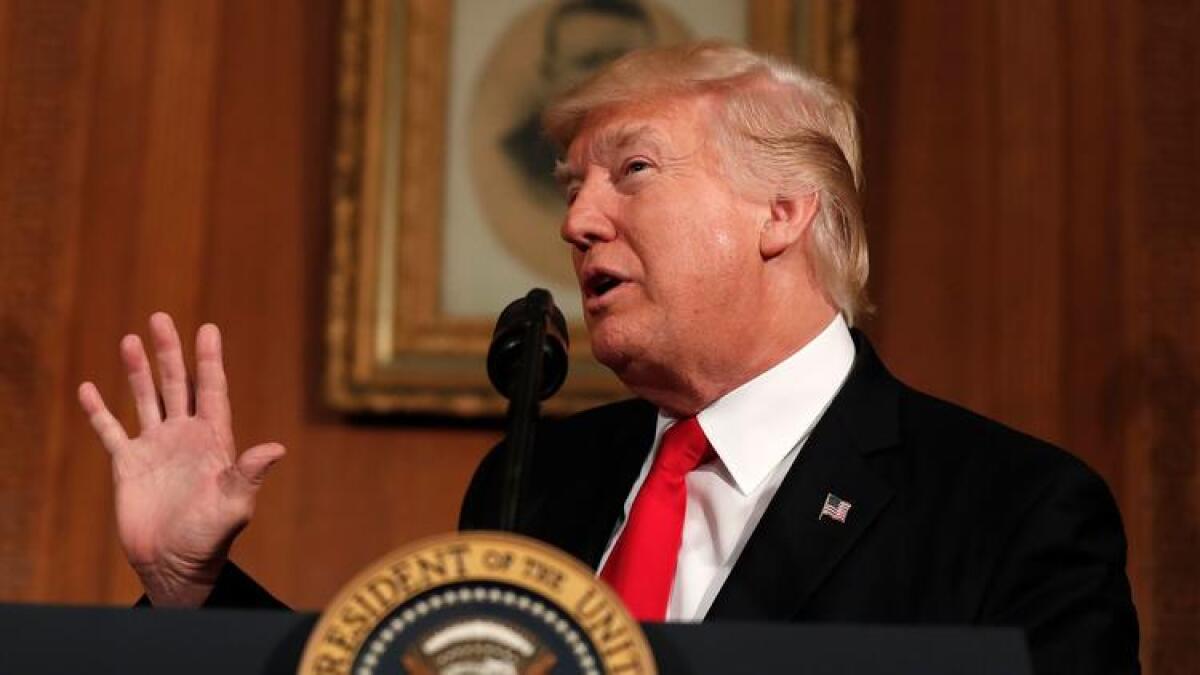
The timing of when President Trump might release his taxes continues to change.
Initially, during the campaign, Trump said he would release his tax returns after an audit is complete. Now he says he could release his returns after he leaves office — perhaps 2021 or 2025.
“Nobody cares about my tax return except for the reporters. Oh, at some point, I’ll release them. Maybe I’ll release them after I’m finished because I’m very proud of them, actually. I did a good job,” he told the Economist in an interview published Thursday.
In the interview, Hope Hicks, a spokeswoman, interrupted.
“Once the audit is over,” she said, using the campaign talking point.
“I might release them after I’m out of office,” Trump responded.
If you’ve followed this matter closely since 2016, the safe bet is this: Don’t expect to see Trump’s taxes anytime soon.
Last year, Trump said he won’t release any of his returns until the Internal Revenue Service completes an audit. The IRS says all taxpayers are free to make their own tax returns public, regardless of any audit. Critics have speculated that Trump’s refusal stems from his fear of a political backlash should his returns show that he still pays little or no taxes, makes scant charitable contributions or has questionable financial ties.
The president’s 1995 tax records, made public by the New York Times in October, revealed that he claimed a $916-million loss that could have allowed him to avoid paying income taxes for up to 18 years.
In the coming months, Trump has indicated he wants to focus on tax reform, and some Democrats have hinted that negotiations must include Trump’s releasing his returns.
Trump’s response?
“I would never consider it as part of a deal,” he said.
Senate Intelligence Committee leaders abruptly leave hearing to meet with Deputy Atty. Gen. Rod Rosenstein
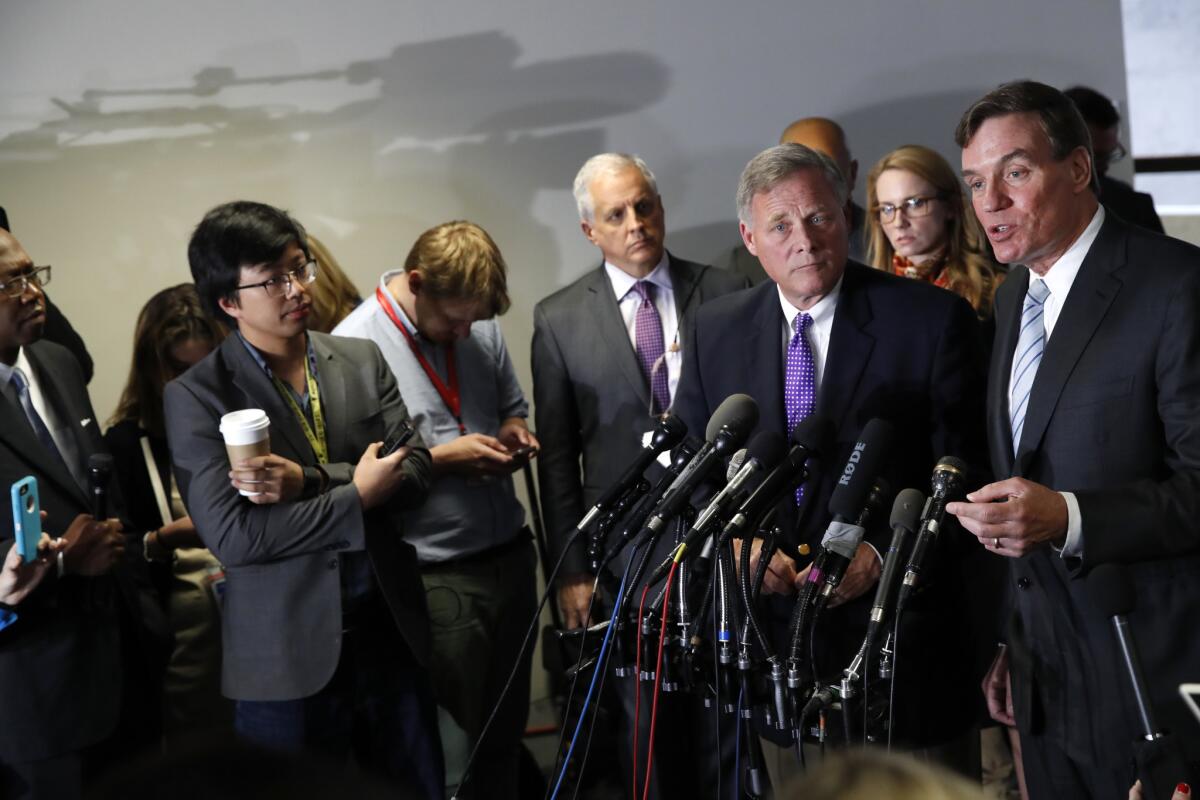
Senate Intelligence Committee leaders caused a stir when they abruptly left a congressional hearing on world threats to meet with Deputy Atty. Gen. Rod Rosenstein. Speculation swirled that the meeting signaled a development in the ongoing saga of why President Trump fired James Comey as FBI director.
The media gathered outside the meeting, but when senior committee members Sens. Richard Burr (R-N.C.) and Mark Warner (D-Va.) emerged, they said Comey’s firing wasn’t discussed.
Rather, the senators said, the meeting was about how the their committee’s probe into Russian activities during last year’s election could proceed without interfering with the FBI’s investigation into the matter.
Comey was ostensibly fired over his handling of the Hillary Clinton email investigation. But critics think Trump was trying to disrupt the FBI’s investigation into his campaign’s possible contacts with Russia.
Trump to NBC’s Lester Holt: Comey’s ‘a showboat,’ ‘I was going to fire regardless of recommendation’
President Trump planned to fire FBI Director James B. Comey even if his attorney general had not recommended his dismissal, Trump said in an interview Thursday, contradicting his previous written statement and the accounts White House officials have provided over the past two days.
“I was going to fire Comey-- my decision. There is no good time to do it, by the way,” Trump told NBC News’s Lester Holt. “I was going to fire regardless of recommendation.”
In his letter notifying Comey that he had been fired, Trump said he was acting at the recommendation of Atty. Gen. Jeff Sessions and Deputy Atty. Gen. Rod J. Rosenstein. White House officials over the last two days repeatedly have said that Trump had a conversation about Comey with Sessions and Rosenstein on Monday and decided Tuesday based on their recommendation.
But Trump insisted in the interview that he had already made up is mind to terminate the FBI director.
“He’s a showboat, he’s grand-stander, the FBI has been in turmoil,” Trump said of Comey. “You take a look at the FBI a year ago, it was in virtual turmoil, less than a year ago. It hasn’t recovered from that,” he said.
Trump also described Comey telling him on three separate occasions – once during a dinner and twice on the phone -- that he was not under investigation.
Since last year, the FBI has been investigating what contacts the Russian government may have had with associates of Trump during the campaign.
“I said, if it’s possible would you let me know, ‘Am I under investigation?”
“He said, ‘You are not under investigation’,” Trump said.
It is highly unusual for a sitting president who has authority over the FBI to ask about an existing investigation, although such action probably does not violate the law, legal experts have said.
Trump noted that the denial didn’t involve others in his campaign.
“I’m not talking about campaigns. I’m not talking about anything else,” he said. “I’m not under investigation.”
In the wide-ranging interview, Trump also insisted there was no “collusion between me and my campaign and the Russians.”
Acting FBI Director McCabe, contradicting White House, says Comey ‘enjoyed broad support within FBI’

Acting FBI Director Andrew McCabe tells Congress that “Director Comey enjoyed broad support within the FBI and still does to this day.”
I hold Director Comey in the absolute highest regard. I have the highest respect for his considerable abilities and his integrity, and it has been the greatest privilege and honor of my professional life to work with him. ... [He] enjoyed broad support within the FBI and still does.”
— Acting FBI Director Andrew McCabe
FBI will not update the White House on Russia probe, acting FBI director says
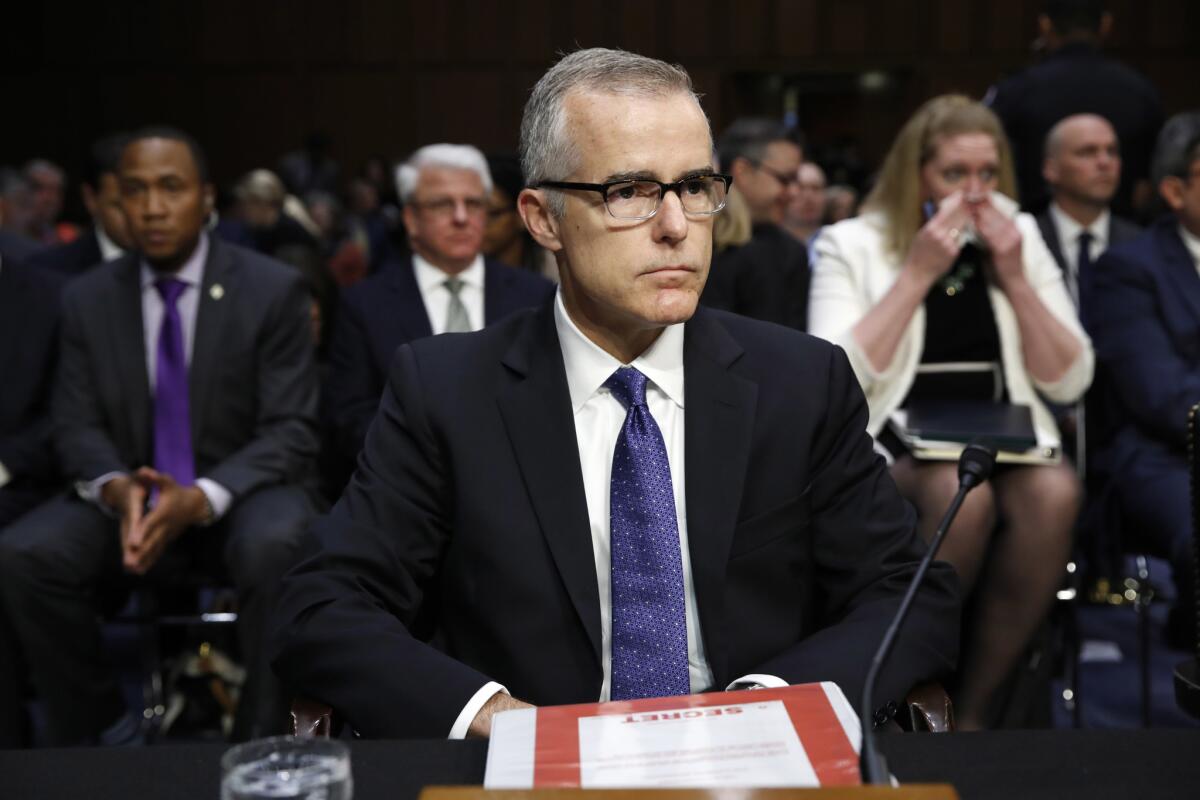
Acting FBI Director Andrew McCabe has agreed to refrain from updating the White House about any investigation into Russian meddling in the presidential election.
McCabe made the commitment under questioning Thursday at a Senate hearing.
He was made acting director Tuesday evening following the firing of James Comey. Justice Department leaders are interviewing other candidates for the position.
McCabe earlier would not confirm President Trump’s assertions that Comey had told Trump multiple times that he was not under investigation.
Acting FBI Director Andrew McCabe: ‘You cannot stop the men and women of the FBI from doing the right thing’

At the Senate Intelligence Committee’s annual hearing with other agency heads, acting FBI Director Andrew McCabe said the work of the FBI has not been impeded after the firing of FBI director James Comey.
Here’s what you should know about Trump, Comey and special prosecutors (with some disco thrown in)
With his abrupt firing of James B. Comey as FBI director, President Trump faces more strenuous demands that an independent counsel be appointed to investigate any possible collusion between his campaign and Russian agents working to undermine rival Hillary Clinton.
Critics assert that Trump’s move was an attempt to stymie the FBI’s probe and insist that the only way to ensure a full, impartial investigation is to hand the matter to a special prosecutor with no ties, or obligations, to Trump or his administration.
The president and his surrogates have adamantly insisted that his campaign had nothing to do with Russian meddling in the presidential race and efforts to find a connection are nothing more than partisan witch-hunting.
What is a special prosecutor?
A special prosecutor, or independent counsel, enjoys broad investigative power with wider-ranging authority than a typical federal prosecutor.
The law calls for the appointment of a special counsel if it is determined that a criminal probe is warranted, and that the investigation “would present a conflict of interest” for the Justice Department and that it would be “in the public interest” to place the matter in the hands of someone outside the administration.
The “special” part simply means they’ve been selected to pursue a specific matter; a kind of one-off.
Republican who revived healthcare bill faces onslaught of anger
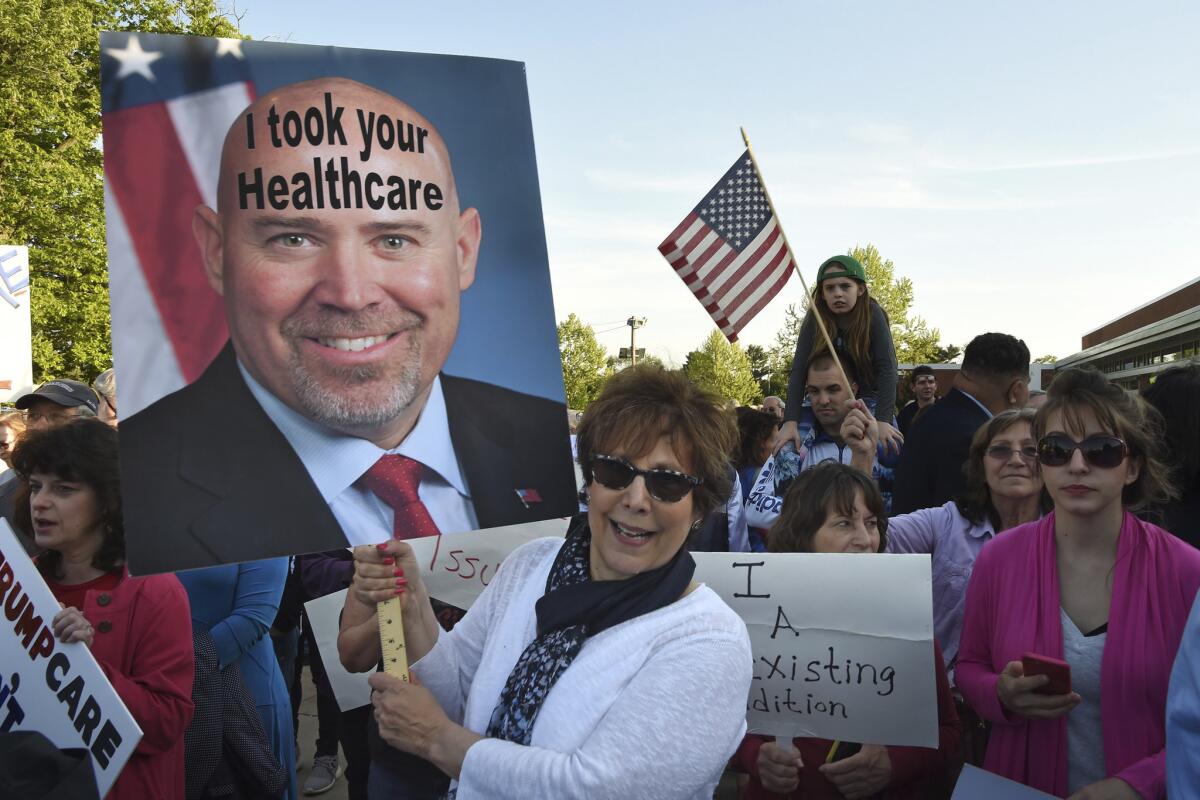
A Republican who headed the effort to revive the healthcare overhaul passed by the GOP-led House faced jeers and insults Wednesday as anger boiled over among voters at a town hall in a heavily Democratic part of his district.
Rep. Tom MacArthur faced hundreds of angry voters for nearly five hours, seeking to both sell and defend the healthcare plan that has drawn widespread outrage and fears among those worried they may be at risk of not being able to afford coverage.
A group of protesters outside lay on the ground with tombstones during a die-in, while inside MacArthur answered heated questions about the bill and President Trump. Some voters chanted “goodbye” to MacArthur, who’s being targeted by Democrats ahead of 2018 midterm elections.
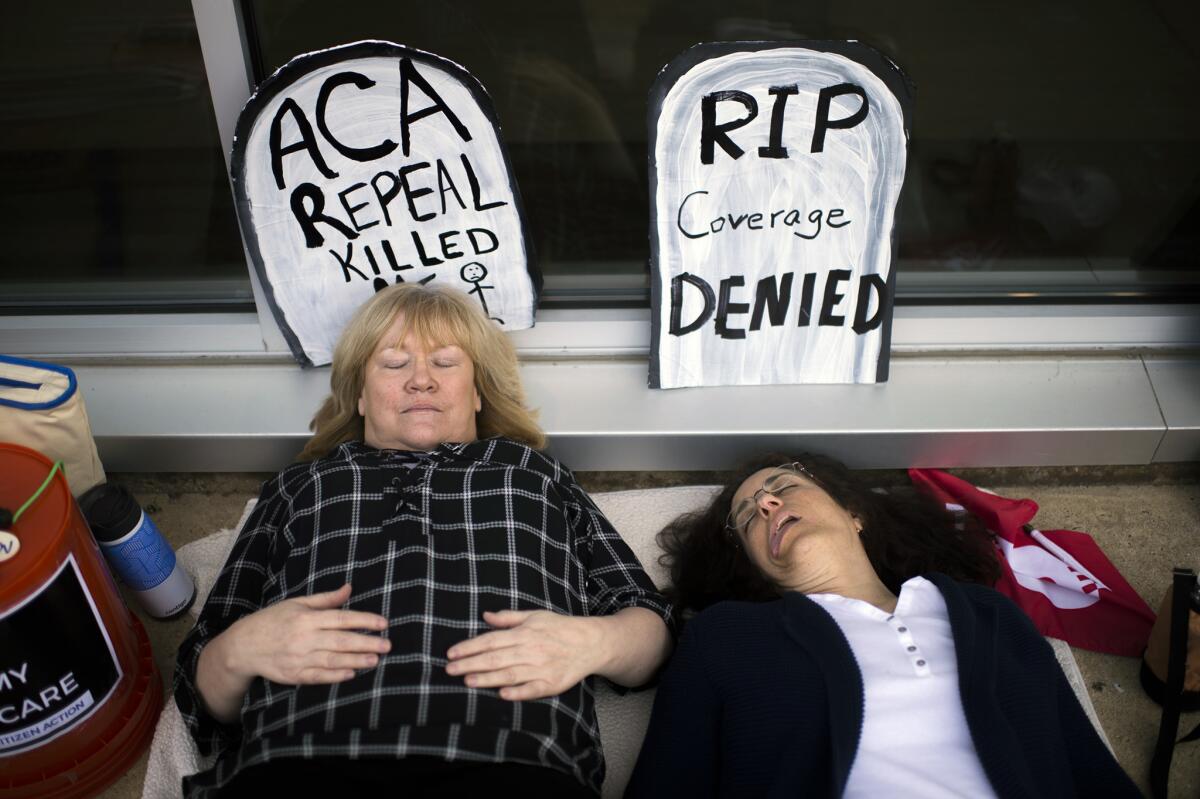
“I hear people calling their congressman an idiot,” he said. “I wonder, really wonder, how any one of you would perform in Congress.”
MacArthur said he came to the Democratic part of the district for his first town hall since the healthcare bill passed because he wants to represent both sides and he’s aware of the “anxiety” over healthcare.
“Whether it’s fun or not, I owe you that,” he said.
One member of the audience called out “shame” when MacArthur began discussing his daughter Gracie, who was born with special needs and died at age 11 in 1996. MacArthur, who has cited his daughter’s death as a reason he got involved in the healthcare debate, responded “shame on you.”
Heckles erupted when the former insurance executive said he’s “watching an insurance market that is collapsing,” which was followed by a shout of “because you drilled holes in it” from a member of the crowd.
MacArthur also faced angry questions about Trump, with one person asking him how long he was “going to defend this American nightmare.”
“I didn’t come here to defend the president,” said MacArthur, who added that he thinks the House and Senate should continue investigating Russian interference in last year’s election.
Feinstein: Rosenstein’s memo on Comey reads like a ‘hastily assembled’ political document
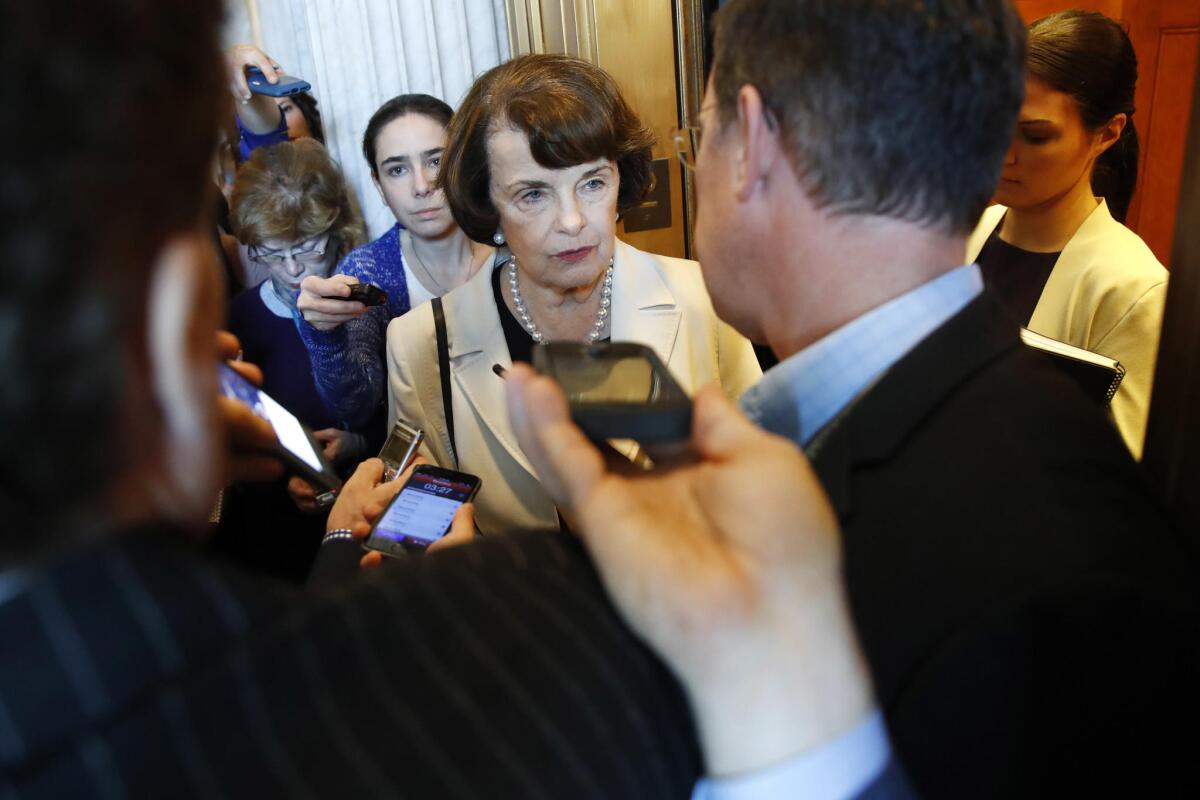
In a scathing statement released Thursday, Sen. Dianne Feinstein (D-Calif.) calls on both Atty. Gen. Jeff Sessions and Deputy Atty. Gen. Rod J. Rosenstein to recuse themselves from the “appointment, selection and reporting of a special counsel” to investigate Russia’s meddling in the U.S. presidential election.
Feinstein also calls Rosenstein’s memo recommending the ouster of FBI Director James Comey a “political document”; “hastily assembled to justify a preordained outcome.”
Here’s the text of her statement:
“I’ve now read Deputy Attorney General Rod Rosenstein’s memo three times. With each read I’ve become more troubled by the contents of this unusual document.
Given Rosenstein’s legal expertise and 27-year Justice Department career, I would have expected him to produce a detailed and comprehensive rationale for Director Comey’s firing including input from the agents and staff who worked with Director Comey.
But instead of a document that provides meaningful analysis, the memo reads like political document. It includes quotes from op-eds and television appearances that are as old as six months. It doesn’t include any contemporary insights from inside the FBI. The memo appears to have been hastily assembled to justify a preordained outcome.
The attorney general and deputy attorney general should recuse themselves from the appointment, selection and reporting of a special counsel. This issue should be handled by the most senior career attorney at the Justice Department.”
Acting FBI director to testify on Russia, other threats
Acting FBI Director Andrew McCabe is set to testify before Congress on Thursday, a day after he was named to replace fired director James B. Comey.
Appearing with other agency heads at the Senate Intelligence Committee’s annual hearing on worldwide threats, McCabe will likely be the target of lawmakers’ questions about Russia’s interference in last year’s elections and Comey’s ouster by President Trump.
A Justice Department spokesman said McCabe and four other candidates were being considered to become interim FBI director. The choice could be announced as early as Thursday.
McCabe has a powerful foe. Sen. Charles E. Grassley, (R-Iowa), chairman of the Senate Judiciary Committee, said Wednesday he did not think McCabe should run the FBI even for the short term because of his wife’s involvement in Democratic politics in Virginia.
The four others under consideration as interim director are William Evanina, director of the National Counterintelligence and Security Center in the office of the director of national intelligence; Adam Lee, who heads the FBI’s office in Richmond, Va..; Michael Anderson, who heads the FBI’s office in Chicago; and Paul Abbate, an assistant director for the FBI’s cyber response branch.
The White House is separately looking at candidates who Trump could nominate for a full 10-year term as FBI director, putting his own stamp on the nation’s premier law enforcement agency.
Also scheduled to testify at the hearing are Daniel R. Coats, director of national intelligence; Michael Pompeo, director of the Central Intelligence Agency; Adm. Michael Rogers, director of the National Security Agency; Lt. Gen Vincent Stewart, director of the Defense Intelligence Agency; and Robert Cardillo, director of the National Geospatial-Intelligence Agency.
Trump spokesperson says she is ‘not aware’ of Rosenstein’s threats to resign
Deputy Press Secretary Sarah Huckabee Sanders said she was “not aware” of reports Rod Rosenstein threatened to resign over the way the Comey dismissal was attributed in part to the memo he wrote, in an interview on NBC’s “Today” show.
She also said the Trump White House isn’t trying to quash the investigation.
“Any investigation that was taking place on Monday is still taking place today,” she said.
Democrats are urging the naming of a special counsel, and argue this would be the best way to take politics out of the probe.
------------
UPDATE
5:45 a.m.: This post was updated to add White House Deputy Press Secretary Sarah Huckabee Sanders’ “Today” show interview, replacing her earlier comments.
>> All eyes in Washington are on Rod Rosenstein. Does he have what it takes to investigate Trump?
House Speaker Paul Ryan backs Trump’s dismissal of Comey as ‘entirely within the president’s role’
House Speaker Paul D. Ryan has been unusually silent over the firing of FBI Director James B. Comey, but when he shared his views late Wednesday on Fox News, he stood by President Trump’s decision.
Ryan acknowledged the dismissal “was no small thing,” but he joined others in the party who have split from those more troubled by the abrupt firing, which stunned Washington amid the investigation of the Trump campaign’s possible ties to Russian meddling in the 2016 election.
The speaker joined Senate Majority Leader Mitch McConnell in brushing back calls for an independent investigation, saying the ongoing congressional and federal reviews were sufficient.
“I think the truth is James Comey, who is a worthwhile and dedicated public servant, I think he had just basically lost the confidence of a lot of Republicans and a lot of Democrats based upon his conduct, his actions, and some of the comments that he made,” Ryan said. “Most importantly, he lost the confidence of the president, and it is entirely within the president’s role and authority to relieve him, and that’s what he did.”
GOP discomfort over Comey firing grows, but doesn’t yet translate into more investigation
Unease among Republicans over President Trump’s firing of FBI Director James B. Comey rippled through Congress on Wednesday, though most GOP lawmakers refused to join calls, mainly from Democrats, for an independent panel or a special prosecutor for the Russia investigation.
Divisions among Senate Republicans grew more stark. Among those pressing for more aggressive efforts, Sen. John McCain of Arizona renewed his bipartisan push for a separate committee to examine Russian interference in the 2016 election and Moscow’s ties to Trump’s campaign. Top GOP senators, including Sen. Richard M. Burr of North Carolina, the chairman of the Intelligence Committee, and Sen. Ben Sasse of Nebraska, an outspoken critic of Trump, forcefully expressed their concerns about the administration’s timing of and rationale for the abrupt and unusual firing.
But Senate Majority Leader Mitch McConnell of Kentucky continued to resist, insisting on keeping the investigation contained to the Intelligence Committee. Others, including Sen. Ted Cruz of Texas, echoed the White House’s contention that both parties have had complaints over Comey and it was time for him to go.
Republican senators said they spent just about two minutes discussing Comey’s dismissal at their regular policy lunch before moving on to unrelated business -- deliberations about repealing the Affordable Care Act.
The House is on recess this week, but Minority Leader Nancy Pelosi (D-San Francisco) called on Speaker Paul D. Ryan (R-Wis.) to hold a vote as soon as lawmakers return next week on legislation to form an independent investigatory commission.
Ryan continued through the day to have no comment on Comey’s dismissal, though he was expected to appear for a television interview later Wednesday.
“The fireworks at the Department of Justice demand that we remove the investigation from the Trump-appointed Justice Department leadership,” Pelosi wrote in a letter to colleagues Wednesday, warning that Democrats would force the vote through parliamentary tactics if Ryan refuses. “If the President has nothing to hide, then he should welcome the creation of a commission providing an independent investigation to remove all doubt of a coverup.”
Senate Democrats also signaled their willingness to resort to procedural maneuvers to cause delays and force action, blocking committees from meeting Wednesday.
No talk of election interference during meetings with Trump and Tillerson, Russian foreign minister says
Russian Foreign Minister Sergei Lavrov said allegations of Kremlin interference in last year’s U.S. presidential campaign did not come up during his meetings Wednesday at the White House and the State Department.
Lavrov said the talks focused instead on building “businesslike relations” between Moscow and Washington after years of tension.
Lavrov’s visit to Washington, his first since President Trump took office, was overshadowed by the outcry over Trump’s firing of the FBI director, James Comey, who had been overseeing a probe of Russian attempts to influence the election.
During the campaign, Trump repeatedly praised Russian President Vladimir Putin and called for improving relations with Moscow. But he has toned down those calls as the FBI and three congressional committees began investigating Russia’s role in the election.
Addressing reporters at the Russian Embassy after his nearly hourlong meeting at the White House, Lavrov -- speaking through a translator, although he speaks English -- said “no compelling evidence [was] given to anyone about Russian intervention” in the election.
The two governments, he said, should turn their attention to pressing global issues.
“It’s very important that President Trump and President Putin act at solving problems on the international agenda,” Lavrov said.
He said talks were underway about arranging for Trump and Putin to meet in early July on the sidelines of the G-20 conference in Hamburg, Germany. The two leaders have spoken by phone three times since the election.
Over the months, the Kremlin has issued many denials of the U.S. intelligence assessment that Putin’s government sought to influence the election outcome, working to aid Trump against Democratic rival Hillary Clinton.
Moscow has also tried to distance itself from the Comey affair.
Earlier Wednesday, Dmitry Peskov, a spokesman for Putin, said the firing of the FBI director was an internal U.S. matter that had “nothing to do” with Russia.
Lavrov told reporters that his talks Wednesday morning with Secretary of State Rex Tillerson focused on matters of mutual concern including “deescalation zones” in Syria.
He also made scornful reference to former President Obama, saying that by contrast, Trump and his associates were “people of action.”
“Whenever people are taking care of business instead of putting forth their ideological preferences, it’s much more useful,” the foreign minister said.
Conservative media focus their criticism on Schumer, Democrats following Trump’s firing of Comey
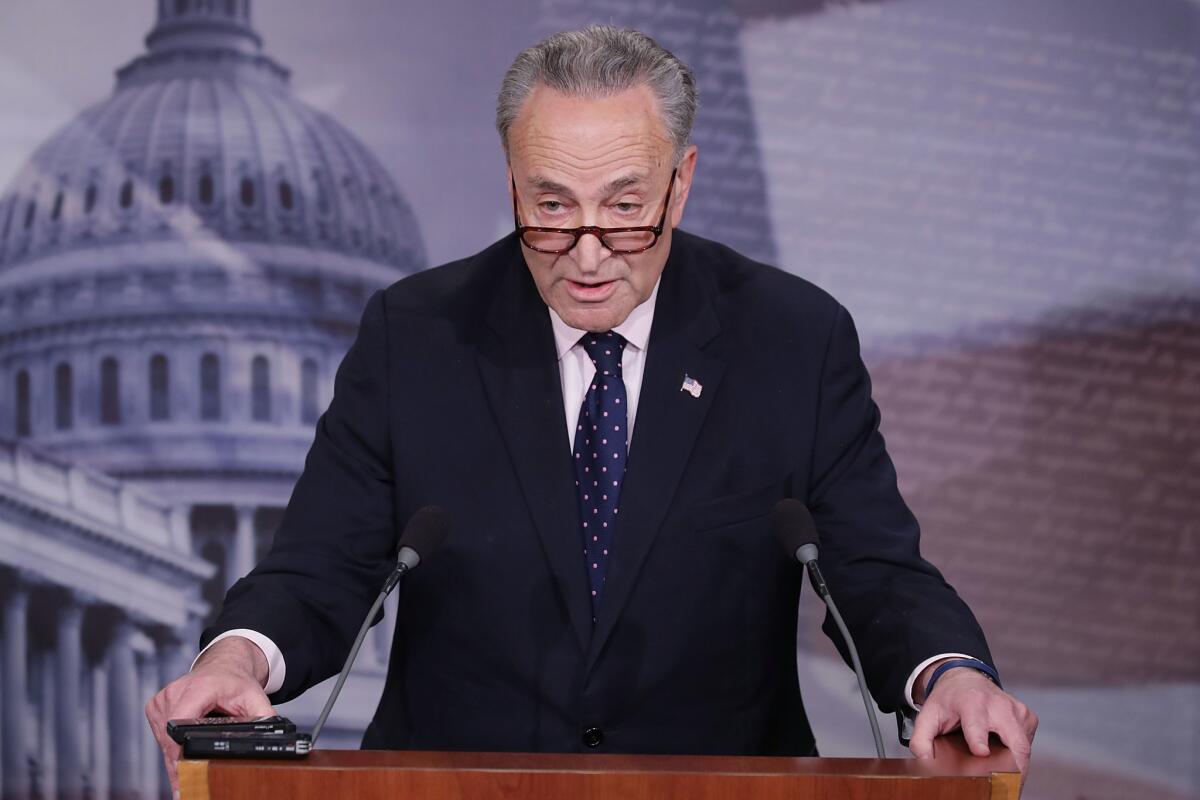
Even Republicans were surprised.
After President Trump abruptly fired FBI Director James B. Comey on Tuesday, Democrats and Republicans questioned the timing given that Comey was heading an investigation into whether Trump’s campaign cooperated in Russian intelligence meddling in last year’s presidential race.
Trump said Wednesday that he had a simple reason for sacking Comey: He “wasn’t doing a good job.”
Following the White House lead, conservative media began accusing senior Democrats, who had called for Comey’s dismissal last year during the campaign for his pronouncements concerning investigations of Hillary Clinton’s email practices, of hypocrisy for now crying foul.
Here are some of their headlines from today:
Chuck Schumer’s shameless hypocrisy and faux outrage over James Comey’s firing (TownHall)
Shortly after Comey disclosed on Oct. 28 -- 11 days before the election -- that he was reopening an investigation into whether Clinton mishandled classified emails while at the State Department, Sen. Charles E. Schumer (D-N.Y.) said he had lost confidence in the FBI director.
On Tuesday, after Trump fired Comey, Schumer said he was troubled by the decision.
This article, prominently displayed on TownHall’s homepage, noted some of Schumer’s past criticism of Comey.
“It was just a few short months ago that Schumer, backed by a number of Democrats on Capitol Hill and in the media, expressed his lack of confidence in Comey’s ability to lead the Bureau,” the article said.
In his first public comments since dismissing Comey, Trump took aim at Schumer on Twitter.
“Cryin’ Chuck Schumer stated recently, ‘I do not have confidence in him (James Comey) any longer.’ Then acts so indignant. #draintheswamp,” he tweeted.
Shut the Chuck up (American Spectator)
Yeah, the headline went there.
Schumer was also the focus of scorn in several other conservative and right-wing media columns on Wednesday,
This piece by Scott McKay assailed the Senate minority leader as a political opportunist.
“No one should have been surprised, in the aftermath of President Donald Trump’s firing of FBI director James Comey, to see Sen. Chuck Schumer (D-New York) rush to a podium and grab a microphone. And no one should have been surprised to see Schumer express alarm and outrage over the firing of someone he said he’d ‘lost confidence in’ back in November,” McKay wrote.
He added, “Schumer’s antics open a window into something else that ought to be obvious to all, which is this: If your beliefs are solely driven by opposition to people you hate, your rationality and logic — and shortly thereafter, your credibility — will suffer horribly for it.”
Tucker Carlson: Comey firing ‘overdue’ — ‘everyone in Washington knows it’ (Breitbart)
He’s now among the most prominent of figures on Fox News, and Tucker Carlson is lauding Trump’s decision to can Comey.
This Breitbart piece highlighted some of Carlson’s comments late Tuesday night.
“It came unexpectedly and for a moment you could almost hear official Washington pause, wondering which talking points to use. And then the barking began. Several Democratic senators have already and productively called the firing Nixonian as if you’re watching something from during Watergate but you are not,” Carlson said on his show. “This firing was overdue and everyone in Washington knows it.”
...Even as most conservatives lauded Trump’s firing of Comey, some did offer criticism.
The Comey Ouster (National Review)
This editorial casts blame on how Trump handled the firing of Comey.
“Of course, Donald Trump has often been less than forthright in his public statements, and the reasons that President Trump should have fired Comey — for example, those outlined by Rosenstein — appear not to be the reasons he did. Press reports suggest that Trump was angry about the Russian probe, Comey’s ubiquity in the media, and the FBI director’s refusal to make a statement exonerating him. If true, none of this speaks well of Trump,” it reads. “Politically, the firing obviously isn’t going to tamp down the Russian controversy, but intensify it. As will the White House’s typically shambolic handling of the dismissal.”
Senate Intelligence Committee invites Comey to appear next Tuesday
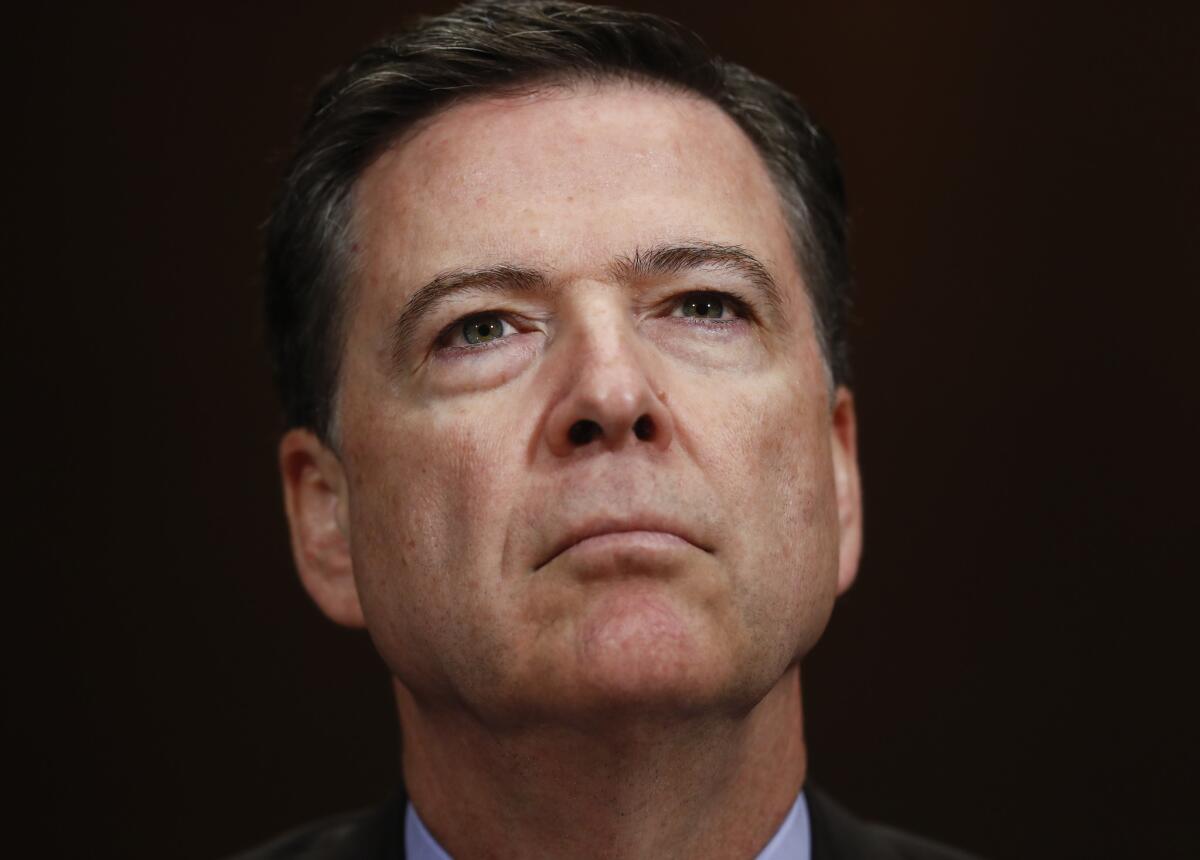
The Senate Intelligence Committee on Wednesday asked ousted FBI Director James Comey to appear before the panel next week.
It is the first time Comey has been asked to appear before Congress as a private citizen since he was fired by President Trump on Tuesday.
Rebecca Watkins, a spokeswoman for the committee, said Comey has been invited to meet in a closed session next Tuesday.
Comey had been slated to appear before the committee later this week to discuss ongoing threats to U.S. security. But the committee said acting FBI Director Andrew McCabe will stand in for Comey at Thursday’s hearing. Several high-ranking intelligence officials are expected to join McCabe at that open hearing.
Five candidates under consideration for acting FBI director
A day after President Trump fired FBI Director James B. Comey, the Justice Department is considering five candidates to serve as interim director of the nation’s premier law enforcement agency until Trump nominates a fulltime replacement, a Justice spokesman said.
One of the candidates is Andrew McCabe, the FBI deputy director who took over the bureau when Comey was summarily sacked on Tuesday.
After the announcement, McCabe met with Atty. Gen. Jeff Sessions and Deputy Atty. Gen. Rod Rosenstein, at the Justice Department.
Sen. Charles E. Grassley (R-Iowa), chairman of the Senate Judiciary Committee, told CNN on Wednesday that he did not think McCabe should run the FBI, however.
McCabe’s wife, Jill McCabe, was a Democratic candidate for state senator in Virginia, and received financial backing from Virginia Gov. Terry McAuliffe, a longtime ally of Bill and Hillary Clinton.
According to the Justice Department, the other candidates under consideration for interim director include:
* William Evanina, director of the National Counterintelligence and Security Center in the Office of the Director of National Intelligence
* Adam Lee, FBI special agent in charge of the Richmond office
* Michael Anderson, FBI special agent in charge of the Chicago office
* Paul Abbate, executive assistant director for the FBI’s Criminal, Cyber, Response and Services Branch.
Rosenstein and Sessions were scheduled to interview the five candidates on Wednesday.
Calls grow for an independent special prosecutor to investigate Trump campaign ties to Russia
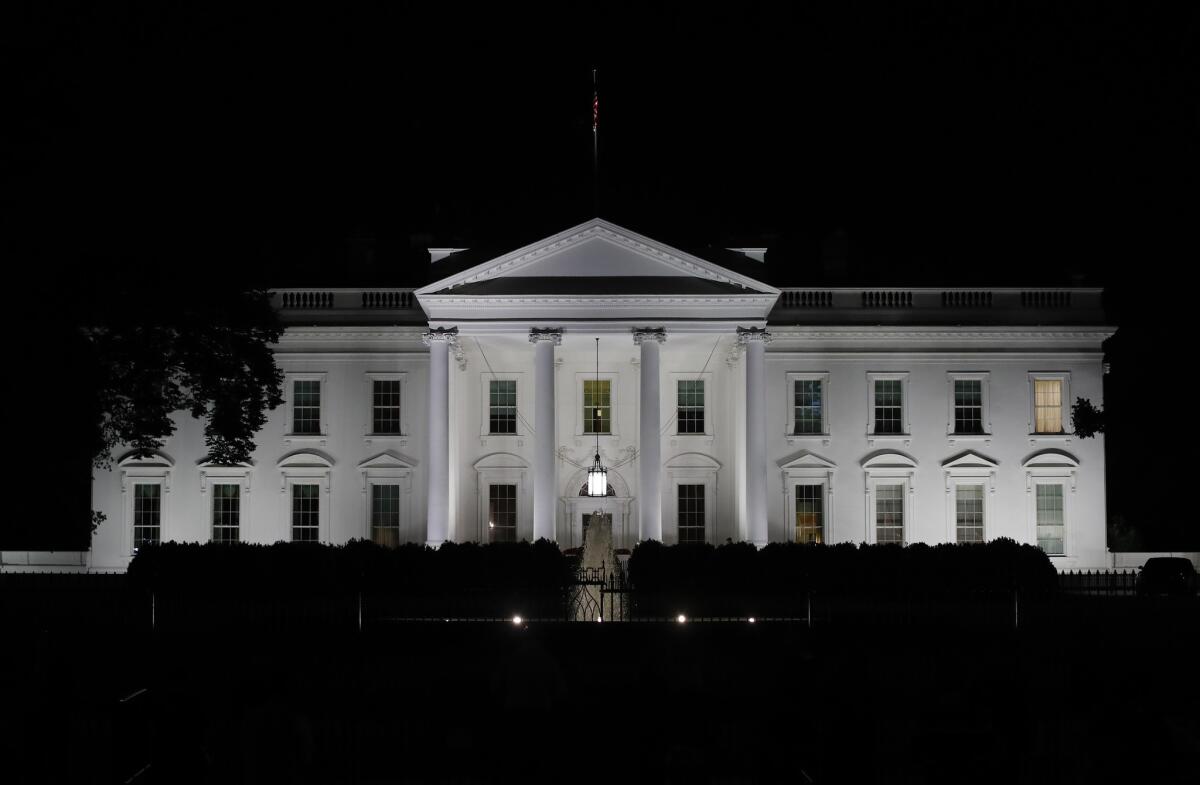
Pressure mounted Wednesday for the Justice Department to name an independent special prosecutor to look into whether anyone close to President Trump worked with Russia to sway the election in Trump’s favor.
A day after Trump abruptly fired FBI Director James B. Comey, top Senate Democrats doubled down on their demand for an independent investigation.
Liberal activist groups such as Moveon.org took to social media to rally supporters in front of the White House and at Senate offices around the country to press the Justice Department to wall off the investigation from political interference.
Sen. Dianne Feinstein (D-Calif.) renewed her call for appointment of a special prosecutor and said Trump’s startling decision to fire Comey now is “beyond surprising.”
On March 15, Comey met in a classified session with Feinstein, the top Democrat on the Senate Judiciary Committee, and the committee chairman, Sen. Charles E. Grassley (R-Iowa), and laid out in detail how the FBI’s investigation into Russia’s hacking and other actions intended to influence the presidential election, Feinstein said.
The briefing was “rather comprehensive,” Feinstein said Wednesday. “The FBI was precise and presented us with substantial information.”
Feinstein wants Deputy Atty. Gen. Rod Rosenstein to appear before the committee and explain why Comey’s firing occurred this week, and not after Trump first took office in January.
Rosenstein laid out the case for Comey to be removed in a three-page memo that the White House released Tuesday.
“To have this happen and happen now is beyond surprising,” Feinstein said.
Sen. Richard M. Burr (R-N.C.), chairman of the Senate Intelligence Committee, said his panel’s probe into Russia’s role in the election would move forward.
Sen. John McCain (R-Ariz,), chairman of the Senate Armed Services Committee, called for creating a special congressional committee, such as the select committee that investigated the Iran-Contra scandal during the Reagan era.
“Removal of Director Comey only confirms need for select [committee] to investigate,” McCain tweeted.
Sens. Lindsey Graham (R-S.C.), who has been critical of Trump, said he did not question the president’s authority to fire Comey, and supported the decision.
“Given the recent controversies surrounding the director, I believe a fresh start will serve the FBI and the nation well,” Graham said Tuesday night.
The House is on recess, and many senators were caught off guard as the news emerged Tuesday night.
Sen. Marco Rubio (R-Fla.) was presiding over an almost empty Senate chamber when an aide slipped him information about the firing.
“It wasn’t expected, but it’s certainly within his prerogative,” Rubio, a member of the Senate Intelligence Committee, told reporters.
He said he didn’t think Comey’s dismissal would impact the committee’s work.
Comey sought more resources for Russia investigation before he was fired, officials say
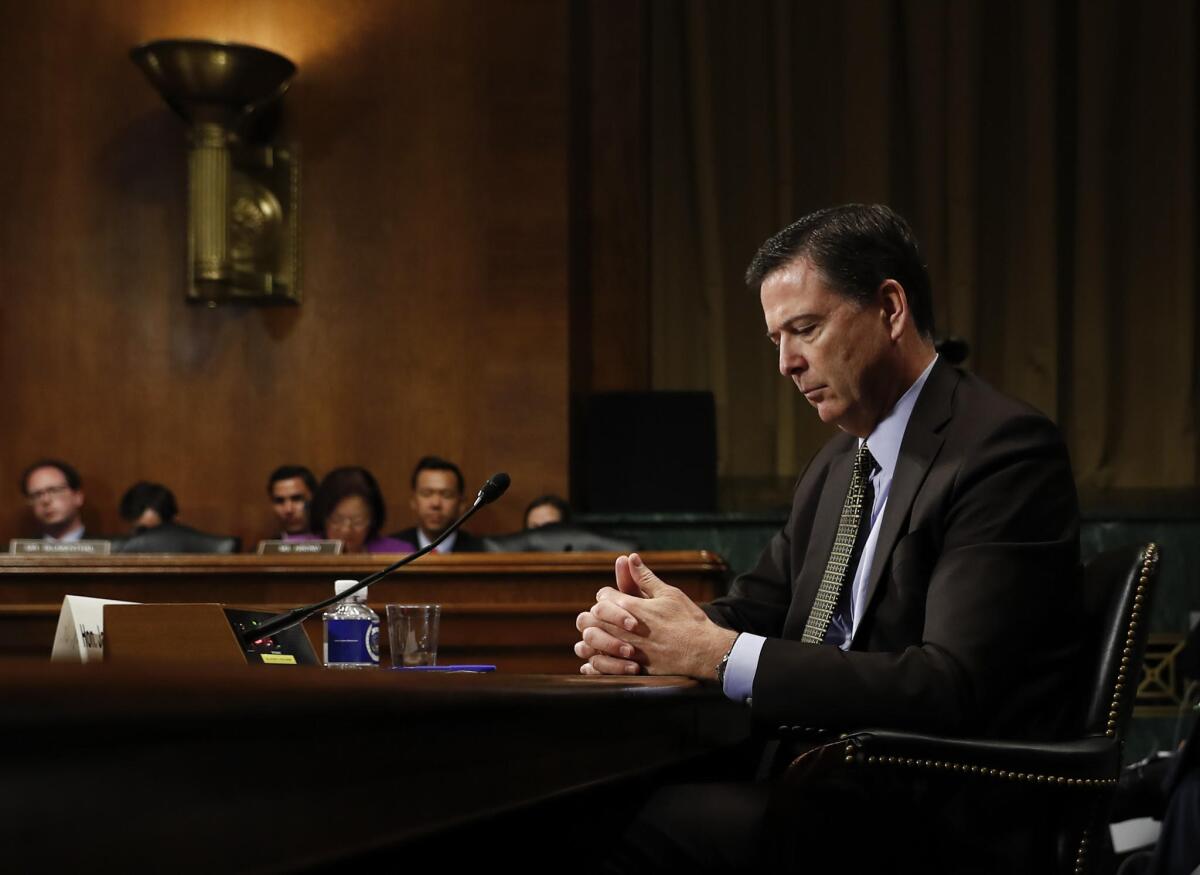
FBI Director James B. Comey met last week with Rod Rosenstein, the new deputy attorney general, and asked for both money and personnel to step up the investigation into possible coordination between Russian intelligence and members of Donald Trump’s presidential campaign, according to two officials who spoke on condition of anonymity.
One Democratic congressional aide said the request was for a “significant increase in resources.”
But a Justice Department spokesman denied that Comey had made the request.
“Totally false,” said Ian Prior. Comey “never made the request for more resources and money for the Russia investigations.”
Prior declined to comment on whether Rosenstein and Comey met last week, and what was discussed. The FBI declined to comment.
Trump abruptly fired Comey on Tuesday, saying he based his decision on a recommendation from Rosenstein and Atty. Gen. Jeff Sessions.
In a letter dated Tuesday, Rosenstein said Comey should be replaced because he had breached department protocol by repeatedly making statements about the FBI investigation into Democratic presidential nominee Hillary Clinton’s emails.
But the future of the Russia investigations looms over Trump’s decision to fire Comey.
Rosenstein, who was confirmed as deputy attorney general on April 25, is heading the Justice Department’s investigation into the Russia dealings.
Sessions recused himself after news reports revealed he had met with the Russian ambassador twice during the campaign and failed to disclose the meetings in his Senate confirmation hearing.
Senate fails to kill Obama methane rule that had looked doomed
Some Republican lawmakers balked at fully embracing the Trump administration’s climate skepticism Wednesday, as the Senate failed to kill an Obama-era plan for containing methane emissions that had deep support among environmental activists and many landowners in the West.
Three Republican senators joined Democrats in blocking the effort to kill the methane restrictions that the GOP congressional leadership had been confident it could scuttle. The push to scrap the methane rules faltered amid an uprising of protest in Western states, where tens of thousands of residents near drilling operations risk exposure to the toxic compounds that leak in tandem with the methane.
At issue is 41 billion cubic feet of a greenhouse gas leaking from many of the nearly 100,000 oil and gas wells on federally owned land. Methane is among the most potent accelerators of global warming, 25 times more harmful than carbon dioxide.
A House vote in March to eliminate an Obama-era Bureau of Land Management rule requiring energy firms to trap the escaping gas and convert it to electricity was followed by a swift public backlash. Several Republican senators wavered on the measure in recent weeks.
The vote, said Gene Karpinski, president of the League of Conservation Voters, “shows that President Trump’s plans to unravel hard-won environmental protections are not a foregone conclusion.” The Republican senators who joined Democrats in voting against the rule were Susan Collins of Maine, John McCain of Arizona and Lindsey Graham of South Carolina.
After the vote, the American Petroleum Institute warned the methane rule will prove costly to consumers and ineffective at limiting emissions. “The rule could impede U.S. energy production while reducing local and federal government revenues,” said a statement from Erik Milito, who directs upstream and industry operations at API.
The fight over the restrictions does not end with the Senate vote. Trump administration officials have expressed their own misgivings with the methane restrictions, and they will likely work through their agencies to try to roll them back. But such efforts involve a laborious bureaucratic process that is ultimately vulnerable to legal action from environmental groups and states supportive of the methane rule.
The Obama administration had concluded the amount of methane escaping each year from drilling operations is enough to provide electricity for nearly 740,000 homes. The Government Accountability Office alerted Congress in July that capturing it would boost royalties owed to taxpayers by $23 million.
Trump, speaking publicly for first time since he fired FBI director, says Comey ‘was not doing a good job’
President Trump said Wednesday his reason for firing FBI Director James Comey was simple: “He was not doing a good job.”
Trump’s comments to reporters in the Oval Office, as he sat beside former Secretary of State Henry Kissinger, were his first in public since Comey’s abrupt dismissal Tuesday evening.
The meeting with Kissinger, which Trump said was to discuss Russia “and various other matters,” was not initially listed on the president’s public schedule.
It occurred immediately after Trump met with Russian Foreign Minister Sergei Lavrov and Russian Ambassador to the United States Sergey Kislyak, his first meeting with senior Russian officials since taking office in January.
Trump told reporters he had a “very, very good meeting” with the Russian foreign minister and said both countries were working to end the “horrible, horrible killing in Syria as soon as possible.”
Trump spoke by phone with Russian President Vladimir Putin last week. The two are expected to meet on the sidelines of a G-20 economic summit in July in Hamburg, Germany.
Vice President Mike Pence on Comey firing: ‘The president made the right decision at the right time’
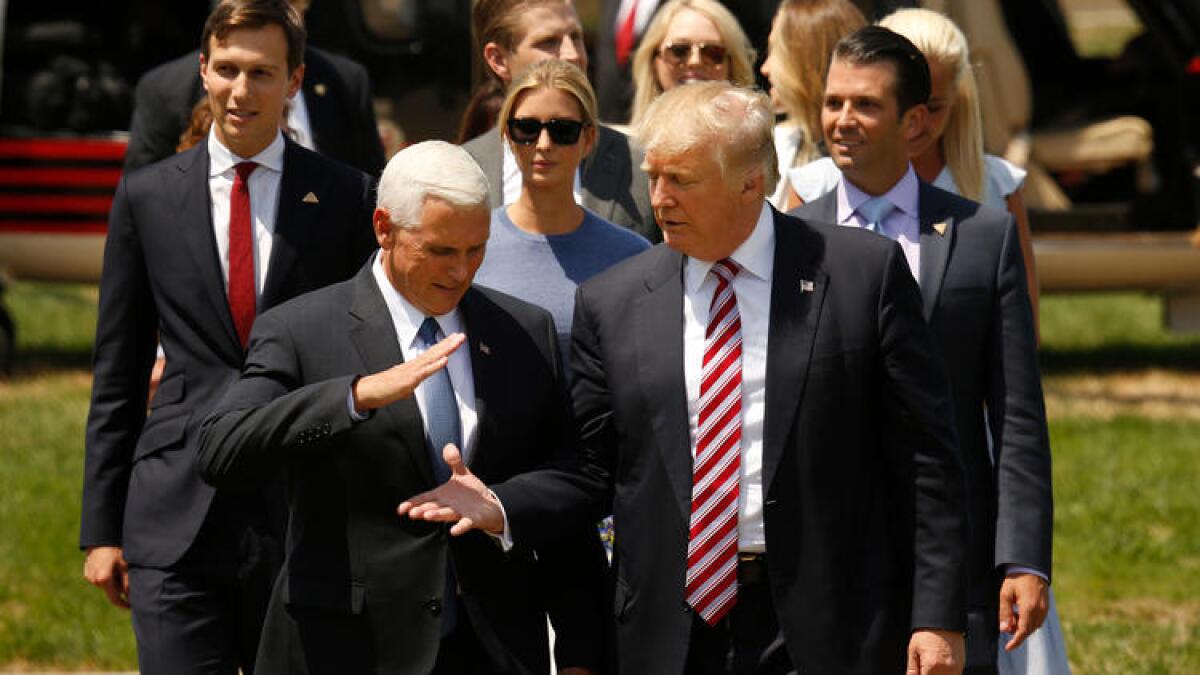
Vice President Mike Pence told reporters at the Capitol that he did not think an independent prosecutor was necessary to investigate potential collusion between the Trump campaign and the Russian government.
“The facts that are in public today are very clear,” Pence said in an interview televised by CNN.
“The former director of DNI has said there is no evidence of collusion,” Pence added, though that misstated what James Clapper, former director of national intelligence, has testified.
Pence defended Comey’s ouster against accusations that it was designed to halt the Russia investigation, repeatedly praising Trump’s “decisive action” and leadership.
“The president made the right decision at the right time,” Pence said.
Pence repeated the White House talking point that the decision was based on the recommendation of Deputy Atty. Gen. Rod Rosenstein. He said Trump has begun evaluating potential replacements.
“The simple fact is Director Comey had lost the support of the American people,” Pence said.
Trump’s claim in Comey termination letter was ‘totally inappropriate,’ former Bush attorney general says
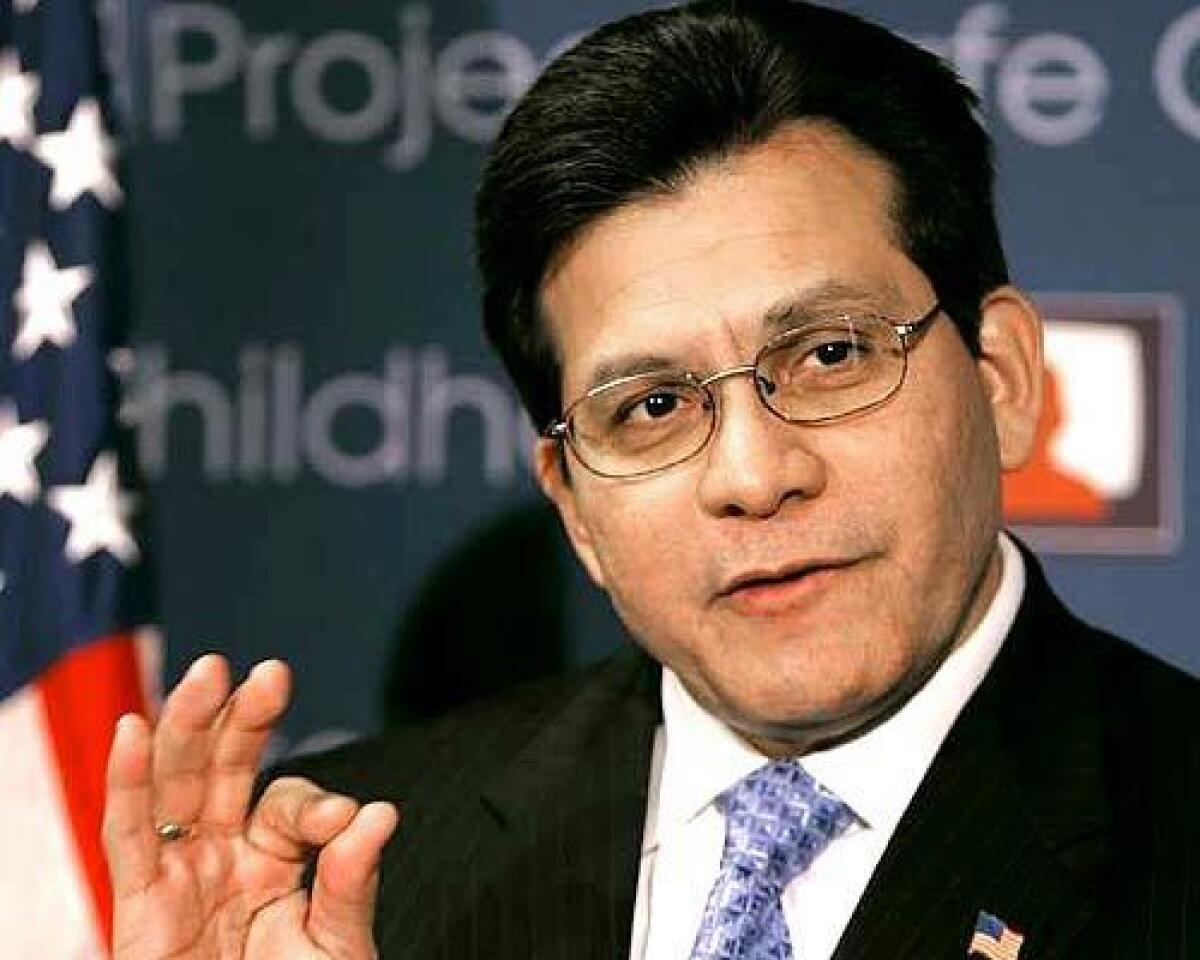
The Republican who was both attorney general and White House counsel to President George W. Bush criticized as “totally inappropriate” that President Trump’s claim in his letter firing FBI Director James B. Comey that Comey had three times assured the president that he was not under investigation.
“Including it in that letter seemed totally inappropriate,” Alberto R. Gonzales, Bush’s former lawyer, told CNN on Wednesday.
Gonzales also suggested that he has some doubt as to substance of the president’s claim. He said it would be inappropriate if Comey did in fact offer Trump assurance that he was not part of the FBI’s investigation of both Russian meddling in the 2016 election to undercut Democratic nominee Hillary Clinton and possible complicity by the Trump campaign. Similarly, Gonzales said it would be inappropriate if Trump had asked for such assurance.
The president’s letter firing Comey did not elaborate on the three instances in which the FBI director allegedly reassured Trump, nor has the White House done so since the letter’s release Tuesday evening.
Trump wrote to Comey, “While I greatly appreciate you informing me, on three separate occasions, that I am not under investigation, I nevertheless concur with the judgment of the Department of Justice that you are not able to effectively lead the bureau.”
Gonzales added his voice to a those of a growing number of Republicans who have said, in the wake of Trump’s firing of the man leading an investigation of potential Russia-Trump campaign collusion, that they would support creation of an independent investigatory commission or special prosecutor, as many Democrats demand.
Senate Majority Leader Mitch McConnell declines to criticize Trump’s firing of FBI Director James Comey
In widely anticipated remarks, Senate Majority Leader Mitch McConnell declined to criticize President Trump’s firing of FBI Director James B. Comey and instead took aim Wednesday at Democrats for complaining about the dismissal they once demanded.
McConnell’s remarks were notable since neither he nor House Speaker Paul D. Ryan have said much about the stunning firing that has upended Washington. Comey was fired amid an FBI investigation into the Trump campaign’s possible coordination with Russia’s interference in the 2016 election.
McConnell’s refusal to publicly question the abrupt dismissal put him at odds with other top Republican senators who have expressed alarm and concern over Trump’s action.
The Kentucky Republican rejected calls for an independent investigatory commission, saying it “would only impede” the Senate Intelligence Committee’s current probe into the matter.
“Our Democratic colleagues [are] complaining about the removal of the FBI director that they themselves repeatedly criticized,” McConnell said, after opening remarks first with comments on other topics, including a Kentucky veterans group touring the Capitol and criticism of the Affordable Care Act.
Senate Minority Leader Charles E. Schumer, who asked all Democratic senators to be in their seats for the morning session, called on McConnell to quickly convene an all-senators briefing with the attorney general and deputy attorney general — separately — so lawmakers could question their rationale and timing for recommending the firing.
“The question is, why did it happen last night?” Schumer said.
“Were those investigations getting too close to home for the president?”
Schumer said the administration has established a “troubling pattern” after having fired three top officials within the Justice Department, including Sally Yates and the U.S. attorney for the Southern District in New York, Preet Bharara.
“We need to get to the bottom of this,” Schumer said. “Nothing less is at stake than the American people’s faith in our criminal justice system and the integrity of the executive branch.”
Donald Trump is tweeting about Roger Stone, who spoke with the L.A. Times Tuesday night
President Trump tweeted angrily in response to a CNN report Wednesday morning that pointed to Roger Stone, a controversial long-time ally, among those advising Trump to fire James Comey.
The Los Angeles Times spoke with Stone on Tuesday night. And, while he would not reveal the contents of his conversations with Trump, he certainly sounded happy.
“About time,” he said, soon after picking up the phone.
CNN, citing a source, said Stone told Trump that Comey should be fired. That would be significant. Not only is Stone known for pushing Trump’s hardest political edges, but he is also frequently mentioned as a potential target in the FBI’s investigation of Russian meddling in the election.
Here’s what Trump had to say:
Here’s what Stone had to say Tuesday night about Comey.
“This guy has politicized the FBI like no previous director,” Stone said.
Stone said he hoped the “wild goose chase” would conclude.
White House officials have periodically denied that Trump still speaks with Stone, who got his start as a self-described dirty trickster under President Nixon, and has invited controversy in multiple campaigns since then.
But Stone has been at Trump’s side for decades, leaving their actual relationship the subject of frequent speculation.
Stone said he heard about Comey’s firing while on a radio show. He would not say when he last spoke with Trump or how the president’s opinion of Comey had evolved.
“It must not be very good,” he said. “He just fired him.”
Stone has also been tweeting quite a bit since Comey’s Tuesday night ouster.
Among his tweets was one saying, “Somewhere Dick Nixon is smiling.”
Stone has a Nixon tattoo on his back. He also weighed in on reports that he helped persuade Trump to fire Comey, denying he was the source of the news but not the substance.
Visiting Russian foreign minister, asked about Comey firing: ‘You’re kidding!’

Russian Foreign Minister Sergei Lavrov on Comey: ’Was he fired? You’re kidding’
Russian Foreign Minister Sergei Lavrov, responding Wednesday to shouted questions from reporters at the State Department concerning the firing of FBI Director James Comey, said sardonically: “Was he fired? You’re kidding, you’re kidding!” before turning away.
Lavrov appeared briefly with Secretary of State Rex Tillerson before the two headed into talks. Afterward, the Russian diplomat was to head to the White House for a meeting with President Trump.
Trump’s first face-to-face with a senior Russian official since taking office comes amid a firestorm over Trump’s dismissal of Comey, who was overseeing a probe into Russian meddling in the U.S. election.
The White House said Comey was removed on the recommendation of senior Justice Department officials who said the FBI director had acted inappropriately in the probe into Hillary Clinton’s handling of classified material as secretary of State.
Democratic critics have ridiculed Trump’s rationale for the firing, saying it was likely intended to short-circuit the FBI investigation into Russia’s meddling in the 2016 election and the possible role of Trump campaign officials.
The Kremlin has denied any interference in the U.S. campaign, and said earlier Wednesday that Comey’s firing had “nothing to do” with Russia.
Kremlin says Comey firing ‘nothing to do’ with Russia
Russian President Vladimir Putin’s spokesman said Wednesday that President Trump’s firing of FBI Director James Comey has “nothing to do with Russia.”
Comey, dismissed Tuesday, was overseeing a wide-ranging probe of Russian interference in the U.S. presidential election. That investigation, among others, is examining potential collusion between Trump’s 2016 campaign and the Kremlin.
Asked about the firing of Comey, Putin spokesman Dmity Peskov called it a U.S. “internal affair,” according to the government-owned Tass news agency.
“That’s the U.S. president’s independent decision, which has nothing to do and should have nothing to do with Russia,” Peskov said.
The comment came as Russia’s top diplomat, Foreign Minister Sergey Lavrov, was to meet with Trump at the White House Wednesday morning. Putin told his security advisors in a meeting hours earlier that Lavrov and Trump would discuss bilateral ties.
Lavrov was also set to meet with Secretary of State Rex Tillerson.
As Trump defends his firing of Comey, White House spins a narrative of strength and decisive action
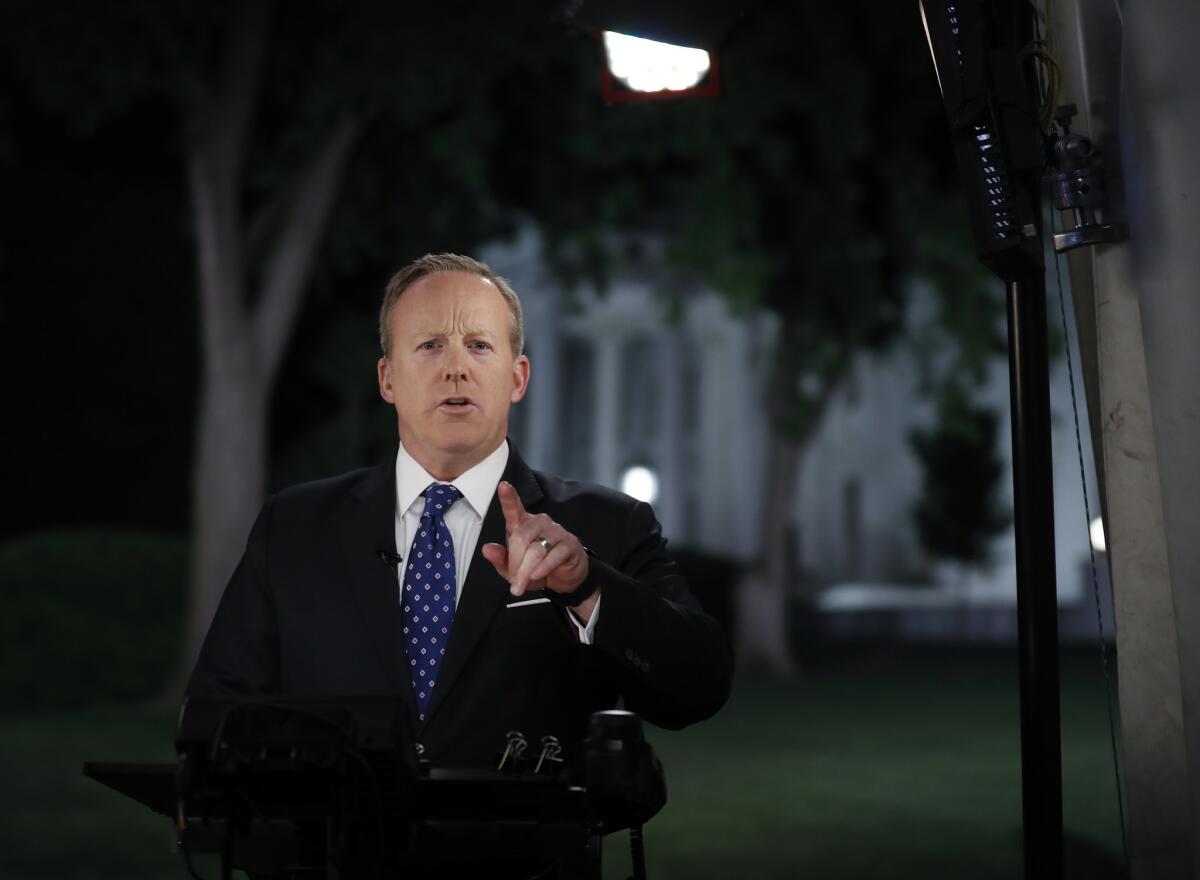
President Trump took to Twitter on Wednesday to defend his surprise firing of FBI Director James Comey, predicting he will eventually be praised for the move.
White House officials, meanwhile, spun a narrative of strength and decisiveness, even though many were unable to describe all the facts surrounding Trump’s decision.
The president, they said, acted on the recommendation of a career prosecutor with unimpeachable nonpartisan credentials, one who had been easily confirmed just weeks earlier. To ignore the case laid out by Deputy Atty. Gen. Rod Rosentstein’s would have been “malpractice,” one White House spokesman said, while others sought to undermine Democrats’ criticism of the abrupt move by pointing out Democrats themselves had expressed doubts about Comey. The president’s action, officials said, was quick and decisive.
“Here’s the bottom line: Comey had lost the confidence across the board -- from House members, from Senate members, from rank-and-file members of the FBI and the American public. When you have that happen, you can’t serve in that capacity,” Deputy Press Secretary Sarah Huckabee Sanders told reporters Tuesday night.
But neither Sanders nor Press Secretary Sean Spicer could answer with certainty key questions about what led to the bombshell move — one that came with little warning for most White House staff and to the FBI director himself.
Spicer had initially delivered the news to reporters shortly before 6 p.m. EDT Monday, before he and top press aides hunkered down in their West Wing offices.
Reporters descended on both hours later after they trekked outside to conduct television interviews. In the case of Spicer, he was peppered with questions in a driveway lighted only by a rising, nearly full moon over the White House.
Who ordered Rosenstein to assess whether Comey should continue to serve? “No one from the White House,” Spicer said. Did the president speak to Rosenstein after reading his memo? “I don’t know how the sequence went.” When was the last time the president spoke to Comey? “I don’t know.” How long after reading Rosenstein’s memo did the president decide to fire Comey himself? “I can look at the tick-tock.” And what was the president referring to when he wrote to Comey in his dismissal letter that the director had told him three separate times he wasn’t under investigation? “I don’t know.”
Spicer also could not say what other senior administration officials may have been part of a discussion with Trump about firing Comey, or whether the termination letter was vetted by key staff.
Pressed on the issue Tuesday morning, Sanders told MSNBC’s “Morning Joe” that she “can’t imagine” that the White House chief of staff, White House counsel and others “wouldn’t have seen that.”
Trump is not scheduled to appear in public Wednesday. The only event on the president’s public schedule is a private meeting in the Oval Office with the Russian Foreign Minister, Sergei Lavrov.
Trump tweets about ‘Cryin’ Chuck Schumer’
President Trump took to Twitter to respond to Senate Minority Leader Charles E. Schumer (D-N.Y.), who held a news conference Tuesday afternoon about the firing of FBI director James Comey.
Schumer said he told Trump, who called to notify him before making the firing public, “You’re making a very big mistake.”
In his statement Tuesday, Schumer called on Deputy Atty. Gen. Rod Rosenstein to appoint an independent special prosecutor to investigate Russian meddling in the election.
Trump responded on Twitter later that night.
Here’s our 2016 profile of the man who now assumes control of the FBI
From his perch on the seventh floor of FBI headquarters, Andrew McCabe is one of the most powerful figures in U.S. law enforcement, but most Americans would be hard-pressed to pick him out of a lineup.
Responsible for overseeing investigations of terrorists, spies and corrupt officials, as well as the sensitive inquiry into Hillary Clinton’s use of a private email server, the longtime FBI agent toils mostly behind the scenes, and he likes it that way.
“My focus is on the inside [of the FBI] and all the work we do that is not talked about in the newspaper, on CNN, on the Hill,” McCabe, 48, said in his first interview since he was named FBI Director James B. Comey’s second-in-command in January.
Comey is “totally focused” on high-profile issues like the recent legal fight with Apple over an encrypted iPhone used by one of the San Bernardino killers and questions from members of Congress, McCabe said.
For the second time since Trump took office, people are talking about Nixon’s ‘Saturday Night Massacre’
Donald Trump has been president for 109 days. And for the second time, people are drawing awkward comparisons between him and Richard Nixon.
In October 1973, President Nixon ordered the Justice Department to fire Archibald Cox, the Watergate special prosecutor, after Cox had subpoenaed tapes of Nixon’s phone calls and conversations in the White House.
Nixon refused to comply with the subpoenas and ordered Atty. Gen. Elliot Richardson to fire Cox. Richardson and Deputy Atty. Gen. William Ruckelshaus both resigned rather than fire Cox for doing his job.
The incident became known as the “Saturday Night Massacre.”
Just 10 days after Trump took office in January, he fired acting Atty. Gen. Sally Yates for announcing that the Justice Department would not defend his executive order barring travel from seven mostly-Muslim countries.
“Monday Night Massacre” started trending on Twitter.
On Tuesday, the White House announced that Trump had fired FBI Director James B. Comey in the midst of an FBI counter-intelligence investigation into whether any of Trump’s aides cooperated with Russia during the election.
“Tuesday Night Massacre” and “Nixonian” began to trend.
At least one group disputes the analogy: Richard Nixon’s presidential library.
READ MORE: An illustrated guide to key figures of the “Saturday Night Massacre” >>
GOP chairman of Senate Intelligence Committee ‘troubled by the timing’ of Comey’s firing

When did Trump decide to fire FBI director James Comey? (May 12, 2017) (Sign up for our free video newsletter here)
A key Republican, Sen. Richard M. Burr, the chairman of the Intelligence Committee, said Tuesday he was “troubled by the timing and reasoning” of President Trump’s firing of FBI Director James B. Comey.
The statement underscored the growing discomfort in the president’s own party about Comey’s abrupt dismissal amid the investigation into Russia’s interference in the 2016 election and possible coordination with Trump’s campaign.
In an unusually forceful statement from the typically genteel North Carolina Republican, Burr said Comey’s firing “confuses an already difficult investigation” and is “a loss” for the Federal Bureau of Investigation and the nation.
Comey had been scheduled to appear Thursday before the Intelligence Committee during an open session on “worldwide threats.”
Here is Burr’s full statement:
“I am troubled by the timing and reasoning of Director Comey’s termination. I have found Director Comey to be a public servant of the highest order, and his dismissal further confuses an already difficult investigation by the Committee. In my interactions with the Director and with the Bureau under his leadership, he and the FBI have always been straightforward with our Committee. Director Comey has been more forthcoming with information than any FBI Director I can recall in my tenure on the congressional intelligence committees. His dismissal, I believe, is a loss for the Bureau and the nation.”
Here’s what James Comey said about Hillary Clinton’s emails back in July

FBI Director James B. Comey held a news conference about the investigation into Hillary Clinton’s use of private email as secretary of State on Tuesday.
In firing FBI Director James B. Comey, the Trump administration cited Comey’s public statements about the FBI investigation into Hillary Clinton’s use a private email server while she was secretary of State.
In a letter recommending Comey’s removal, Deputy Atty. Gen. Rod Rosenstein focused on remarks Comey made at a July 5 news conference.
Rosenstein wrote that the comments were inappropriate, “derogatory” and unfair to the Democratic presidential candidate -- “a textbook example of what federal prosecutors and agents are taught not to do.” He said Comey should have left it to the Justice Department to decide what to make public about the investigation.
Here are highlights of what Comey said:
- “Although we did not find clear evidence that Secretary Clinton or her colleagues intended to violate laws governing the handling of classified information, there is evidence that they were extremely careless in their handling of very sensitive, highly classified information.”
- Clinton’s emails included seven message chains with information classified as top secret.
- “None of these emails should have been on any kind of unclassified system.”
- “The security culture of the State Department …was generally lacking in the kind of care for classified information found elsewhere in the government.”
- Comey acknowledged that the FBI did not normally make public its recommendations to prosecutors as to whether to bring criminal charges. He added: “In this case, given the importance of the matter, I think unusual transparency is in order.”
- “Although there is evidence of potential violations of the statutes regarding the handling of classified information, our judgment is that no reasonable prosecutor would bring such a case.”
- “I know there will be intense public debate in the wake of this recommendation, as there was throughout this investigation.”
Democratic senators call Trump’s firing of Comey ‘Nixonian’; some demand independent Russia investigation
Lawmakers in Congress were stunned by President Trump’s sudden firing Tuesday of FBI Director James B. Comey in the midst of an investigation into Russian interference in the 2016 election, including possible coordination with Trump associates.
Democrats quickly described Trump’s dismissal of Comey as “Nixonian” and pushed for immediate hearings on the firing, while Republicans insisted it is the president’s prerogative to hire and fire the nation’s top law enforcement officer.
Senate Minority Leader Charles E. Schumer (D-N.Y.) said he told Trump he was making a “very big mistake.”
“Were these investigations getting too close to home for the president?” Schumer asked. “They fired Director Comey, the very man leading the investigation.... This does not seem to be a coincidence.”
Schumer and others said the Justice Department should now appoint an independent special prosecutor for the Russia inquiry.
“Removal of director Comey only confirms need for select [committee] to investigate,” tweeted Sen. John McCain (R-Ariz.).
Lawmakers in the House and Senate called for immediate hearings in Congress over Comey’s dismissal.
“Trump’s decision to fire him now, in the midst of an investigation into Trump associates and their ties to Russia, is outrageous,” said Sen. Ron Wyden (D-Ore.) “Director Comey should be immediately called to testify in an open hearing about the status of the investigation into Russia and Trump associates at the time he was fired.”
But Sen. Lindsey Graham (R-S.C.) said a “fresh start” at the Federal Bureau of Investigation would be welcome.
“I know this was a difficult decision for all concerned,” Graham said. “Given the recent controversies surrounding the director, I believe a fresh start will serve the FBI and the nation well.”
The House is on recess, and many senators, who had finished their work for the day, were caught off guard by the news.
Sen. Marco Rubio (R-Fla.) was presiding over an almost empty chamber when an aide slipped him information about the firing.
“It wasn’t expected but it’s certainly within his prerogative,” said Rubio, a member of the Senate Intelligence Committee, which is conducting its own Russia inquiry.
“I don’t think it will have an impact, certainly on the Intelligence Committee’s work,” Rubio told reporters. “I can tell you, we’re going to do our work in the Intelligence Committee, go where the facts lead us.”
The No. 2 Republican, Sen. John Cornyn of Texas, called Comey “a good man and an honorable man,” and noted that Democrats had criticized Comey last year during the FBI investigation into Hillary Clinton’s email server.
“I hope the president can find somebody who can be a strong independent leader for the department,” Cornyn told reporters. “It’s really important for the country.”
Republicans have control of Congress, with 52 Republicans in the Senate, which will need to confirm Comey’s replacement by a simple majority.
Roger Stone, Trump confidant, applauds firing of Comey
“About time,” Roger Stone said when he picked up the phone Tuesday night and was asked about James B. Comey’s abrupt ouster as FBI director.
Stone, a colorful and controversial longtime friend to President Trump, is one of several Trump associates under FBI scrutiny for alleged Russian ties during the 2016 campaign.
Stone, who likes a good political brawl, has challenged Comey repeatedly to put up or shut up on the evidence.
“This guy has politicized the FBI like no previous director,” Stone said.
In March, Comey confirmed that the FBI was conducting a counter-intelligence investigation into whether any of Trump’s current or former aides cooperated with Russian intelligence agencies to interfere with the presidential campaign.
Trump has repeatedly denied that his campaign had any Russian ties, and this week called the allegations a hoax.
Comey’s firing is unlikely to end the FBI inquiry, which began last July. Indeed, Democrats uniformly said it proved the need for a special prosecutor independent of the White House.
Stone said he hoped the “wild goose chase” would conclude.
White House officials have periodically denied that Trump still speaks with Stone, who got his start as a political operative under President Nixon, and has invited controversy in multiple campaigns since then.
But Stone has been at Trump’s side for decades, leaving their actual relationship the subject of frequent speculation.
Stone said he heard about Comey’s firing while on a radio show. He would not say when he last spoke with Trump or how the president’s opinion of Comey had evolved.
“It must not be very good,” he said. “He just fired him.”
Trump fires FBI chief, citing handling of Clinton email investigation
President Trump has fired FBI Director James B. Comey, saying that the dramatic move was necessary to allow a “new beginning” at the FBI.
Comey has been supervising an investigation of Russia’s meddling in the 2016 election and the possibility of cooperation between people linked to Trump’s campaign and Moscow.
The FBI director also has been widely criticized by people in both parties for his handling of investigations connected to the election -- the Russia investigation as well as the inquiry into Hillary Clinton’s email practices while she was secretary of State.
In firing Comey, Trump said he had acted on the recommendation of Deputy Atty. Gen. Rod Rosenstein, a career prosecutor who is overseeing the FBI’s handling of the Russia investigation because Atty. Gen. Jeff Sessions has stepped aside from any role in it.
In a memorandum to Sessions, which was released by the White House, Rosenstein harshly criticized Comey for his actions going back to last July, when he held a news conference to announce that the FBI would not seek charges against Clinton in the email investigation but denounced her conduct.
That was a serious misjudgment, Rosenstein wrote, adding, “The goal of a federal criminal investigation is not to announce our thoughts at a press conference.”
He went on to say that Comey had made the problems worse with his decision to disclose in late October -- 11 days before the election -- that the FBI had reopened its investigation of Clinton after finding State Department emails on a computer belonging to former Rep. Anthony Weiner, the estranged husband of Clinton’s aide, Huma Abedin.
Clinton has blamed the Comey letter for contributing to her defeat, although polling evidence on that point is unclear.
Comey told the Senate Judiciary Committee last week that he had no choice but to disclose the re-opened investigation and not “conceal” it. Rosenstein sharply disagreed.
Prosecutors don’t disclose non-public information about investigations, he wrote: “Silence is not concealement.”
Given Comey’s actions and his refusal to admit that they were mistakes, “the FBI is unlikely to regain public and congressional trust until it has a director who understands the gravity of the mistakes and pledges never to repeat them,” Rosenstein wrote.
Sessions, in a letter to Trump, said that he was recommending Comey’s dismissal “for the reasons expressed” by the deputy attorney general and in order for the department to “clearly reaffirm its commitment to longstanding principles” of proper conduct by investigators.
Trump, in a letter to Comey informing him of his dismissal, said he had accepted the recommendation. He added that he “greatly appreciate[d] you informing me on three separate occasions that I am not under investigation.”
White House Press Secretary Sean Spicer announced the decision to reporters Tuesday evening, saying that Trump had “accepted the recommendation of the attorney general and the deputy attorney general regarding the dismissal of the director of the Federal Bureau of Investigation.”
In a statement, the White House quoted Trump as saying that “the FBI is one of our nation’s most cherished and respected institutions and today will mark a new beginning for our crown jewel of law enforcement.”
A search for a new permanent FBI director will begin immediately, the statement said.
Comey was confirmed in 2013. Although the FBI director serves a fixed term, which is supposed to insulate him from political pressure, previous presidents of both parties have taken the position that as an officer of the executive branch, the director can be fired by the president.
This post was updated at 3:45 p.m. with quotes from letters and memos by Deputy Atty. Gen. Rod Rosenstein and Atty. Gen. Jeff Sessions and additional background.
The last president to fire an FBI director? Bill Clinton
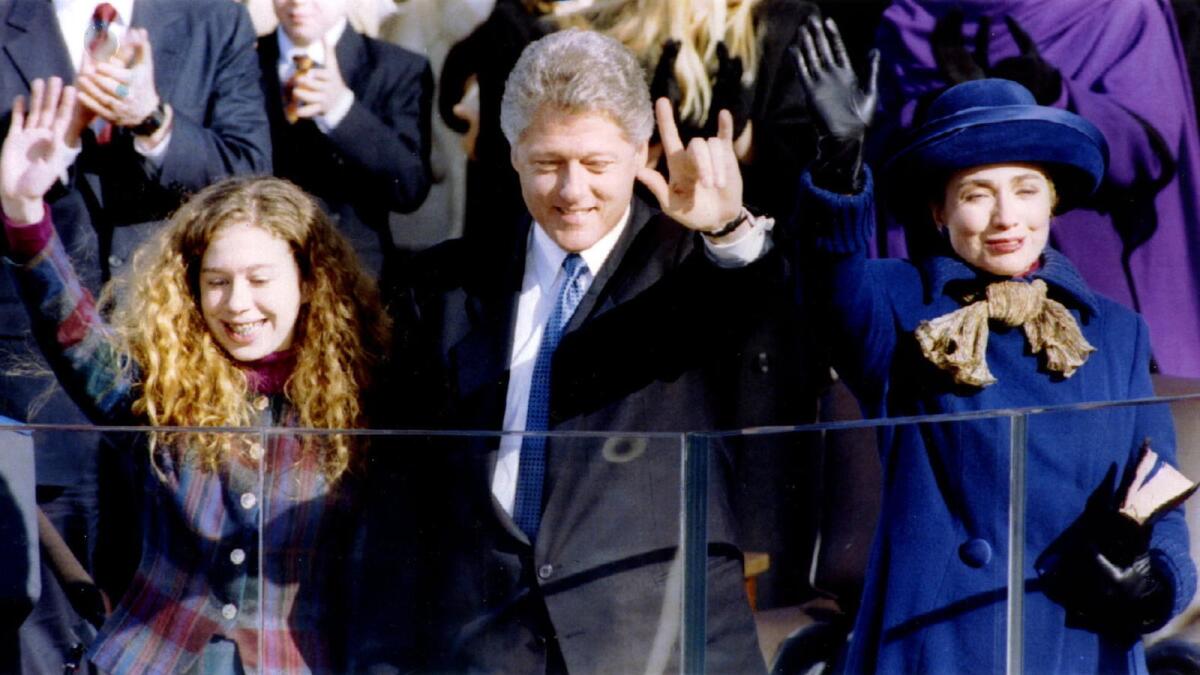
It’s been 24 years since a president fired the director of the Federal Bureau of Investigation.
In 1993, President Clinton ousted William Sessions as FBI director after Sessions refused to voluntarily step down amid ethical concerns. It was the first and only time to happen in U.S. history. That is, until Donald Trump fired James Comey.
Sessions, appointed by Ronald Reagan, had been under investigation by the Justice Department’s Office of Professional Responsibility during George H.W. Bush’s final year in office.
Here’s how The Times reported the findings at the time:
“The Justice Department report found, among other things, that Sessions had engaged in a sham transaction to avoid paying taxes on his use of an FBI limousine to take him to and from work, that he had billed the government for a security fence around his home that provided no security and that he had arranged business trips to places where he could meet with relatives.”
Sessions dismissed the findings and refused to resign.
Clinton, at the recommendation of his attorney general, Janet Reno, dismissed Sessions.
“We cannot have a leadership vacuum at an agency as important to the United States as the FBI,” Clinton said at a White House news conference. “It is time that this difficult chapter in the agency’s history is brought to a close.”
Sessions serves on the board of directors for non-profit think tank, The Constitution Project. According to the website, he is a partner at the Holland & Knight law firm Washington, D.C.
Read President Trump’s letter to FBI Director Comey
Dear Director Comey:
I have received the attached letters from the Attorney General and Deputy Attorney General of the United States recommending your dismissal as the Director of the Federal Bureau of Investigation. I have accepted their recommendation and you are hereby terminated and removed from office, effective immediately.
While I greatly appreciate you informing me, on three separate occasions, that I am not under investigation, I nevertheless concur with the judgment of the Department of Justice that you are not able to effectively lead the Bureau.
It is essential that we find new leadership for the FBI that restores public trust and confidence in its vital law enforcement mission.
I wish you the best of luck in your future endeavors.
Donald J. Trump
Spicer’s statement on Comey’s firing: Trump acted on ‘clear recommendations’ from Justice Department officials
Press Secretary Sean Spicer’s statement on the firing of FBI Director James B. Comey:
Today, President Donald J. Trump informed FBI Director James Comey that he has been terminated and removed from office. President Trump acted based on the clear recommendations of both Deputy Attorney General Rod Rosenstein and Attorney General Jeff Sessions. ‘The FBI is one of our Nation’s most cherished and respected institutions and today will mark a new beginning for our crown jewel of law enforcement,’ said President Trump. A search for a new permanent FBI Director will begin immediately.
— Sean Spicer
U.S. Embassy in Saudi Arabia mistakenly posted doctored Trump speech, excluding Israel
A U.S. Embassy website and military Twitter account posted a video clip that cut any mention of Israel out of President Trump’s announcement of his upcoming trip to Europe and the Middle East.
The State Department later said the doctored video clip was an “inadvertent mistake” and expressed regret for the incident. It was removed from the website and an embassy Twitter feed.
The same video appeared on the U.S. Army Central Command’s Arabic-language Twitter feed. It was still there on Tuesday.
Trump said last Thursday that he will stop in Saudi Arabia, Israel and the Vatican, ahead of NATO and G-7 summits in Brussels and Sicily, respectively, on his first foreign trip as president.
Trump portrayed the trip, which will run from May 19 to May 27, as an overture to the homes of the world’s three major monotheistic religions: Islam, Judaism and Christianity.
But a one-minute and 41-second video of Trump’s announcement posted on the website at the U.S. Embassy in Riyadh, the capital of Saudi Arabia, had been edited to exclude mention of Israel.
Most of the Arab world, including Saudi Arabia, does not formally recognize Israel as a country, largely because of displacement of the Palestinians with the creation of the Jewish state.
In a statement, the State Department said the embassy in Riyadh took the clip from a Saudi social media account and posted it, with Arabic subtitles, without realizing the president’s words had been doctored.
“The U.S. Embassy in Riyadh shared a version of the video announcement from a private Saudi citizen’s social media account,” the statement said. “Unknowingly, the shared version had been edited to remove the word ‘Israel.’ ”
The embassy “expresses its regret for this inadvertent mistake.”
The clip was removed following a protest from Rep. Eliot Engel of New York, the ranking Democrat on the House Foreign Affairs Committee.
“I am appalled that the U.S. Embassy in Saudi Arabia disingenuously posted this incomplete and misleading video,” Engel said in a letter to Secretary of State Rex Tillerson.
He said the video implied that Washington accepted the Saudi “rejectionist position” toward Israel.
An Army Central Command spokesman said his office was waiting to see what the embassy instructed before deciding whether to remove the clip.
Trump approves Pentagon plan to arm Syrian Kurds despite Turkish objections
President Trump has authorized a controversial Pentagon plan to supply weapons to Kurdish militias fighting Islamic State in Syria despite strong objections of the Turkish government, which views the Kurdish fighters as terrorists.
White House spokesman Sean Spicer said Tuesday that Trump approved the plan to supply weapons “as necessary to ensure a clear victory” as Kurdish fighters and other militias close in on Raqqah, Islamic State’s largest and most important stronghold in Syria.
The Pentagon has long backed the Syrian Democratic Forces, a coalition of rebel groups that operates chiefly in northern Syria, with airstrikes, intelligence information and training.U.S. officials view the Kurdish militias, known as the People’s Protection Units, or YPG, as the most capable part of the alliance.
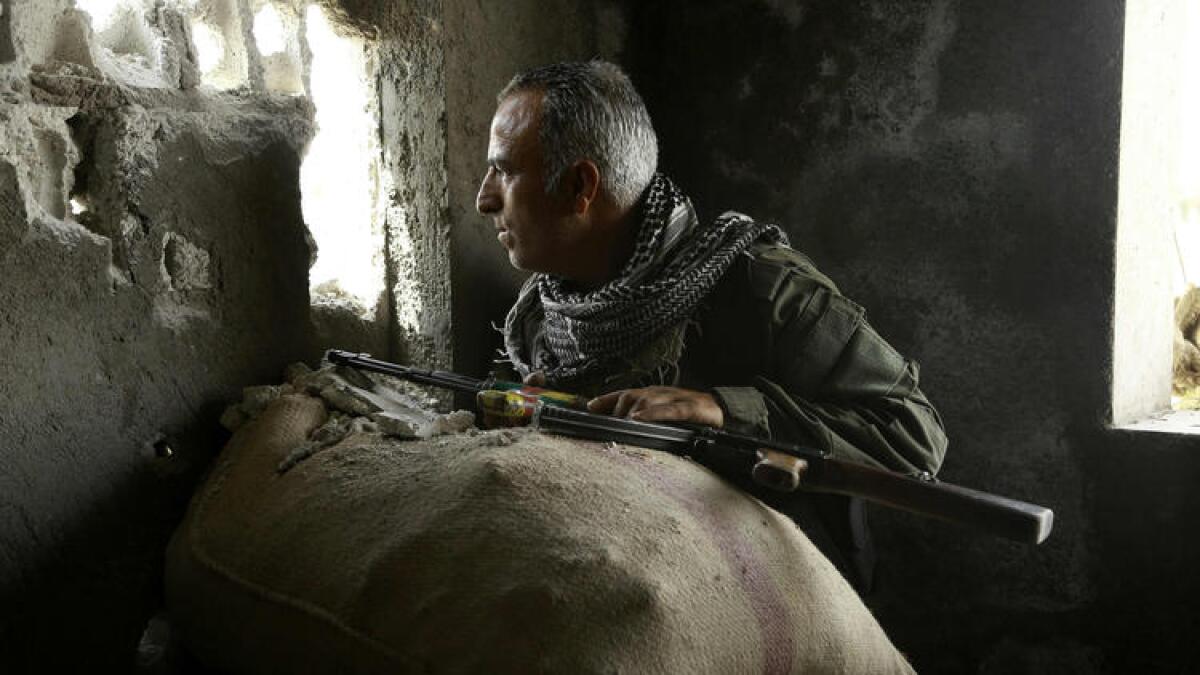
But Turkey, a major U.S. ally and member of NATO, has angrily protested any American attempts to arm the YPG. The government in Ankara views the YPG as a terrorist force that seeks to create an independent Kurdish state in southern Turkey.
Bowing to those objections, the Obama administration declined to arm the Syrian Kurds. It instead supplied weapons only to Arab factions of the Syrian Democratic Forces, or SDF.
Spicer said the decision to reverse that policy reflected a recognition that the full Syrian coalition, including the Kurdish militias, “are the only force on the ground that can successfully seize Raqqa in the near future.”
“We are keenly aware of the security concerns of our coalition partner Turkey,” he added. “We want to reassure the people and government of Turkey that the U.S. is committed to preventing additional security risks and protecting our NATO ally.”
Wary of sectarian conflict, the U.S. has worked to recruit more Syrian Arab fighters into the coalition’s ground force as they advance toward predominantly Arab territories.
“The U.S. continues to prioritize our support for Arab elements of the SDF,” Spicer said. “Raqqah and all liberated territory should return to the governance of local Syrian Arabs.”
A long-planned offensive to retake Raqqah from Islamic State comes as Iraqi ground forces, backed by the U.S.-led coalition, are eight months into an assault on Mosul, the militants’ self-declared capital in Iraq and the largest city under Islamic State control anywhere.
Victory in either city would deal a considerable blow to Islamic State’s self-declared caliphate, which has steadily lost cities and towns over the last 18 months.
The group leading the fight against Obamacare is all white and all male
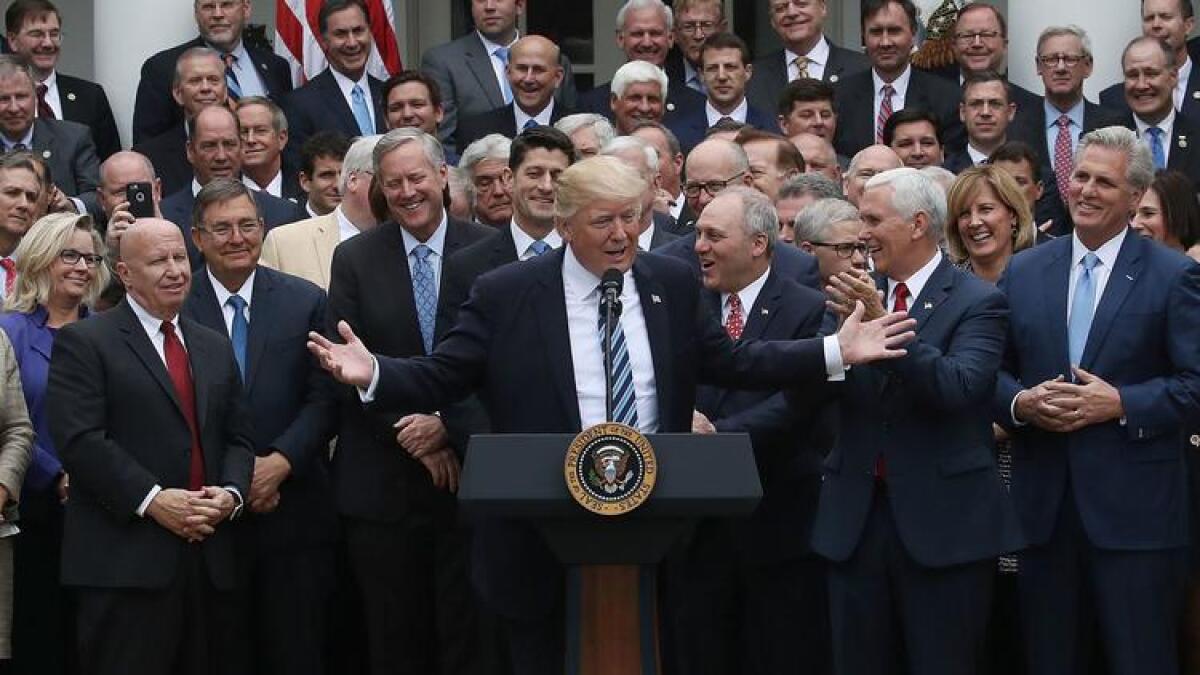
The healthcare debate now heads to the Senate.
And the 13-member panel, created by Senate Majority Leader Mitch McConnell to craft a Senate version of a healthcare bill to replace the Affordable Care Act, is, um, not all that diverse. It consists of 13 men, all white.
Democrats, who last week assailed House Republicans for celebrating their passage of a repeal bill with President Trump at the White House, and groups opposed to repeal efforts have called on women —such as Sens. Susan Collins (R-Maine) and Lisa Murkowski (R-Alaska) — to be added to the group so that issues pertaining to women’s healthcare will not be overlooked.
Trump has said he’s confident that “Republican senators will not let the American people down” with the repeal of Obamacare.
Still, while Democrats focus on, among other things, the panel, Republicans are accusing them of playing politics with healthcare. The American people — not next year’s midterm elections — should be the focus right now, some conservatives argue.
Here are today’s headlines:
Democrats focus on retweets instead of voters (Daily Caller)
In the moments after House Republicans passed the healthcare repeal bill, some Democrats began to chant “na, na, na, hey, hey, hey, goodbye,” basically hinting that GOP members of Congress would lose their seats in next year’s midterm elections because of their votes.
Conservative media scoffed.
“Despite the confidence that the backlash to the healthcare bill will benefit Democrats, this doesn’t seem like good politics to be gleefully cheering on something you think is going to literally kill people. Especially, when you’re just singing over the supposed political benefits,” notes this Daily Caller piece. “This event is another sign that Democratic lawmakers are increasingly playing more to their Twitter fanbase than to real-life voters.”
Kimmel lambastes Washington Times ‘elitist creep’ column (Washington Times)
Last week, late-night television host Jimmy Kimmel made an impassioned plea that healthcare should always be available to children. He talked tearfully about his newborn son’s heart issues.
His comments were viewed by some as politically charged — and tilting left — as Congress debated the healthcare law. Washington Times opinion editor Charles Hurt wrote a column with the headline “Shut up, Jimmy Kimmel, you elitist creep.”
Kimmel responded on Monday night, questioning if the Washington Times is a “real newspaper.”
“I can’t even count the number of times I’ve been called an ‘out of touch Hollywood elitist, creep’ this week,” he said. “Which — I have to say — I kind of appreciate because, when I was a kid, we had to drink powdered milk because we couldn’t afford the liquid variety. Our orange juice came frozen out of a can, it would squeeze out.”
Europe declines in relief (American Spectator)
Meanwhile, politics of another kind played out this week in France — and conservative media wanted to comment on that too. Their views of the two presidential candidates on France and Europe were starkly different. Centrist Emmanuel Macron supported France remaining in the European Union, while far-right candidate Marine Le Pen wanted the country to exit. Macron called for a country that welcomed immigrants and Muslims, Le Pen — like Trump — was not as open.
In the end, France choose Macron.
This piece argues that his victory will contribute the continued “decay and moral rot” of Europe.
“The Muslim migrants are to Europe what Californians are to America: leaving behind the consequences of their failed ideology while importing those pernicious ideas into their new lands,” writes Melissa Mackenzie.
She adds, “France has a typical European socialist as President now. Time to celebrate! There will be no honest reflection or assessment of where France is at. That’s too painful.”
Comey testimony on Huma Abedin emails was inaccurate, source says
A person familiar with the investigation into Hillary Clinton’s use of a private email server says Huma Abedin did not forward “hundreds and thousands” of emails to her husband’s laptop, as FBI Director James B. Comey testified to Congress.
Comey last week provided new details about the investigation during a Senate committee hearing.
He said Abedin, a top Clinton aide, was in the practice of forwarding emails to the laptop of her husband, former Rep. Anthony Weiner, to be printed out and that “hundreds and thousands” had been forwarded.
But a person familiar with the investigation, who spoke on condition of anonymity because the person was not authorized to discuss the testimony publicly, says that was a misstatement of the number of emails involved.
The FBI had no immediate comment Tuesday.
Iowa Rep. Rod Blum walks out on interview over town hall questions
U.S. Rep. Rod Blum angrily walked out of a televised interview in front of a group of schoolchildren in Dubuque, Iowa, when pressed about screening attendees to his public meetings.
The second-term Republican got up two minutes into the KCRG-TV Monday interview, saying, “I’m done, this is ridiculous,” after being asked whether he accepts donations from outside his district.
He said before leaving the room, “I mean, he’s going to sit here and just, and just badger me. Unbelievable.”
The question about donations followed reporter Josh Scheinblum asking Blum why he requires audience members at his town hall meetings to showr identification.
Blum said audience members are vetted to ensure they are from his district.
Blum was met by an angry crowd at his town hall meeting later Monday.
Trump administration is looking into evidence of crimes committed by Haitian immigrants
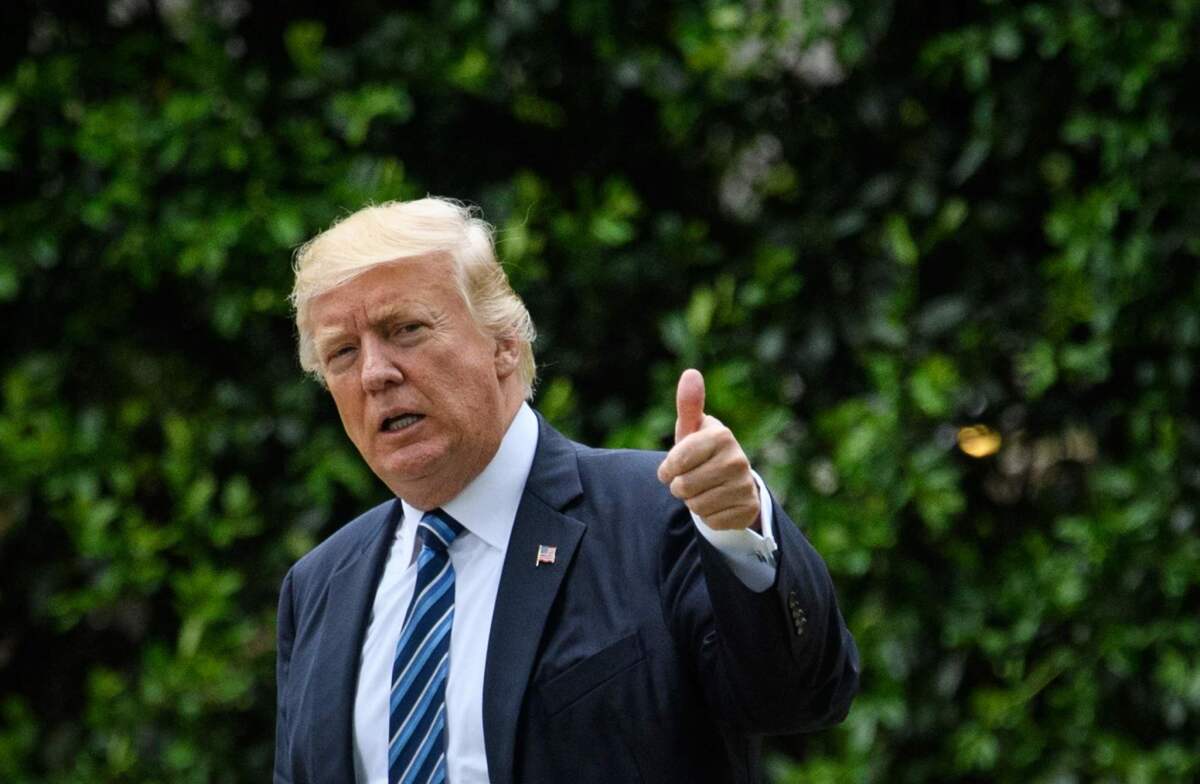
The Trump administration is taking the unusual step of hunting for evidence of crimes committed by Haitian immigrants as it decides whether to allow them to continue participating in a humanitarian program that has shielded tens of thousands from deportation since an earthquake destroyed much of their country.
The inquiries into the community’s criminal history were made in internal U.S. Citizenship and Immigration Services emails obtained by the Associated Press. They show the agency’s newly appointed policy chief also wanted to know how many of the roughly 50,000 Haitians enrolled in the Temporary Protected Status program were taking advantage of public benefits, which they are not eligible to receive.
The emails don’t make clear if Haitian misdeeds will be used to determine whether they can remain in the United States. The program is intended to help people from places beset by war or disasters and, normally, the decision to extend it depends on whether conditions in the immigrants’ home country have improved enough for them to return. But emails suggest Homeland Security Secretary John Kelly, who will make the decision, is looking at other criteria.
“I do want to alert you ... the secretary is going to be sending a request to us to be more responsive,” Kathy Nuebel Kovarik, the USCIS head of policy and strategy, wrote on April 27. Addressing the inability of agency employees to gather the requested information about wrongdoing, she said: “I know some of it is not captured, but we’ll have to figure out a way to squeeze more data out of our systems.”
Yates says she warned Trump White House about risk of Russian blackmailing

Former acting Atty. Gen. Sally Yates discusses what she told President Trump about Michael Flynn
Former acting Atty. Gen. Sally Yates said she had two in-person meetings and one phone call with Donald Trump’s White House about former national security advisor Michael Flynn and had alerted the Trump administration that Flynn “essentially could be blackmailed by the Russians.”
The White House announced Flynn’s resignation on Feb. 13, 18 days after Yates warned of possible blackmail on Jan. 26.
Trump’s EPA dismisses half of the scientists on its advisory board
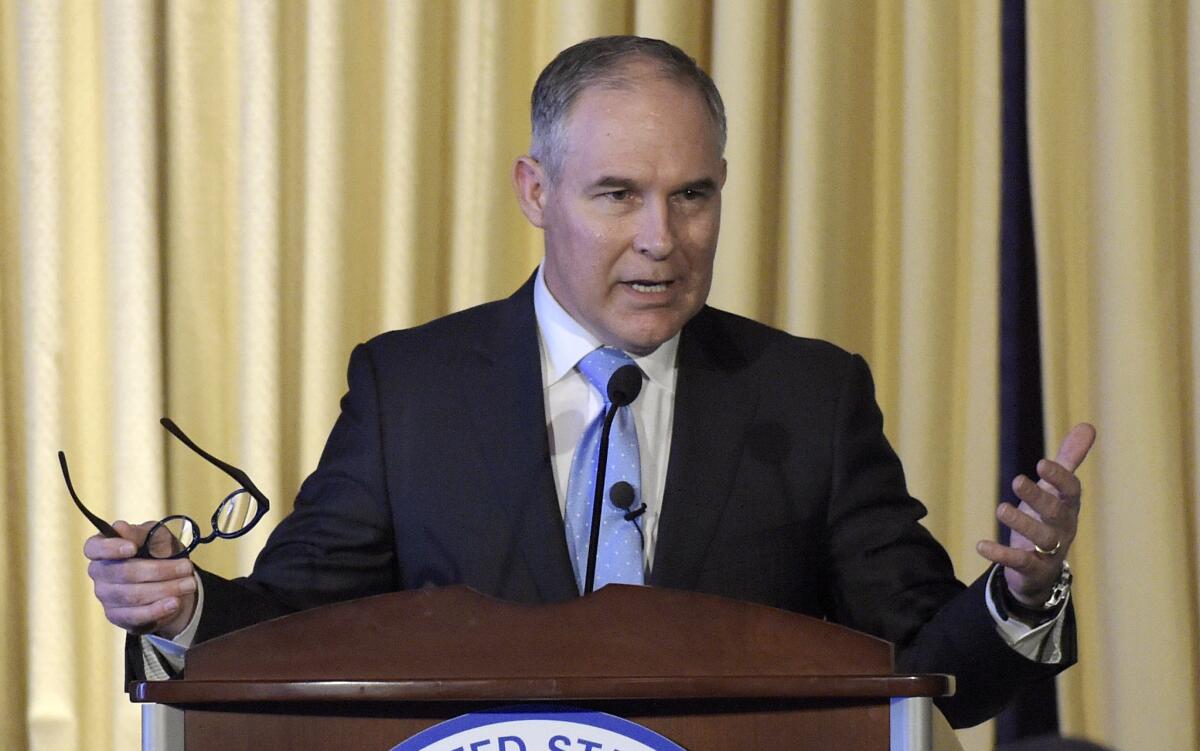
The Trump administration will not reappoint half the expert members of a board that advises the Environmental Protection Agency on the integrity of its science, the latest in a series of moves that could benefit industries whose pollution the government regulates.
Deborah L. Swackhamer, chairwoman of the Board of Scientific Counselors, confirmed Monday that nine of the 18 outside experts on her panel will not serve a second three-year term. The affected board members’ terms expired April 30.
Experts are limited to serving two terms on the board, and Swackhamer said that in the past those completing their first term would typically have been reappointed. Four other board members just completed their second terms, meaning 13 of the 18 seats on the panel are vacant.
EPA spokesman J.P. Freire said the agency’s new leadership wants to consider a wider array of applicants, potentially including those who may work for chemical and fossil fuel companies.
“We are going to look at all applicants that come in, because this is an open and competitive process,” Freire said.
The counselors are typically top academic experts in their fields tasked with helping ensure the agency’s scientists follow best practices.
EPA Administrator Scott Pruitt has long been a fierce critic of the agency he now leads, saying its scientists often fail to weigh the cost of implementing new regulations on businesses. Pruitt, a lawyer who previously served as Oklahoma’s elected attorney general, has moved in recent weeks to roll back Obama-era limits on toxic pollution from coal-fired power plants and countermand a push to ban a pesticide that peer-reviewed studies said may harm the developing brains of young children.
Listen live: Trump’s travel ban is heard in court
Department of Justice attorneys will argue for the ban in the U.S. 4th Circuit Court of Appeals. They want the Richmond, Va., court to reverse a Maryland federal judge’s order that blocked Trump’s 90-day suspension of travel to the U.S. by nationals of Iran, Syria, Sudan, Libya, Somalia and Yemen.
Listen live to the oral arguments:
Watch: Sally Yates testifies on Russian election meddling

Former acting Atty. Gen. Sally Yates discusses what she told President Trump about Michael Flynn
What’s at stake as Trump gets to ‘see you in court’ in two major travel ban cases
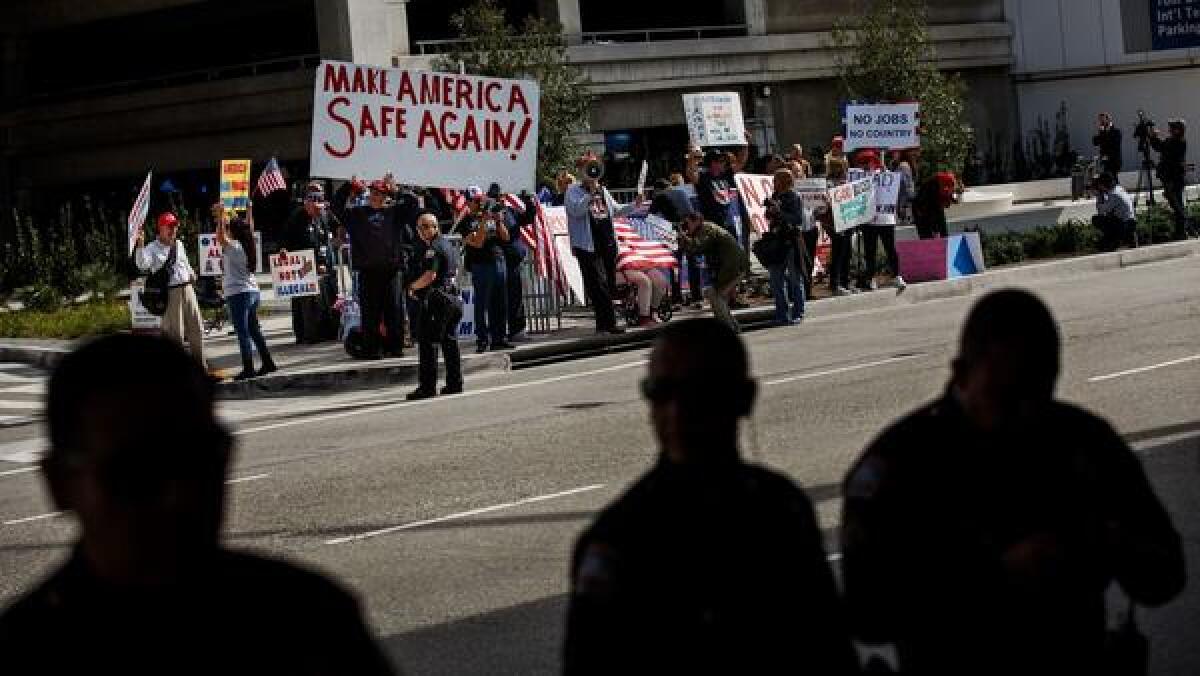
More than three months after initially signing his travel ban, President Trump’s lawyers will head to federal appeals courts on opposite ends of the country this month in hopes of getting it reinstated.
On Monday, Justice Department attorneys will argue for the ban in the U.S. 4th Circuit Court of Appeals. They want the court in Richmond, Va., to reverse a Maryland federal judge’s order that blocked Trump’s 90-day suspension of travel to the U.S. by nationals of Iran, Syria, Sudan, Libya, Somalia and Yemen.
On May 15, lawyers will present arguments in Seattle in the U.S. 9th Circuit Court of Appeals. The issue at hand is a Hawaii federal judge’s decision blocking the travel ban. The Hawaii case stopped the country-specific ban and also ruled against a 120-day pause on refugee admissions.
Whoever loses will likely appeal to the U.S. Supreme Court.
Here’s what you need to know before that happens.
Three Clinton appointees will hear 9th Circuit travel ban case
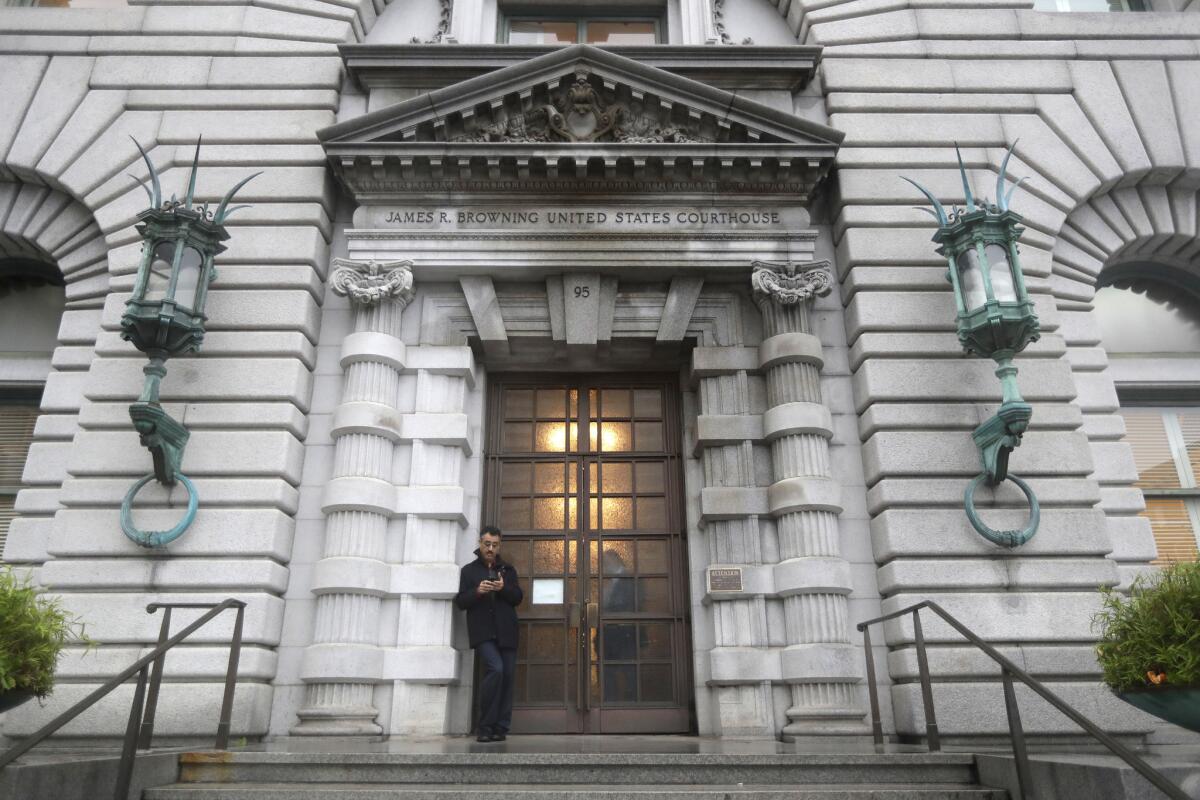
Three judges appointed by former President Clinton have been randomly selected to hear arguments on Hawaii’s challenge of President Trump’s revised travel ban.
Judges Michael Hawkins, Ronald Gould and Richard Paez of the U.S. 9th Circuit Court of Appeals will decide whether Trump’s temporary ban on admission of nationals from six Muslim countries should continue to be blocked.
Gould and Hawkins are considered moderates. Paez is more liberal.
The panel will decide whether to continue a nationwide hold on Trump’s ban on travel and admission of refugees. The judges will hear arguments at 9:30 a.m. May 15 in a hearing that will be carried live on CSPAN.
The state of Hawaii and a Muslim imam challenged Trump’s revised executive order. A federal judge in Hawaii blocked it after concluding the directive was inspired by prejudice against Muslims.
The 4th Circuit Court of Appeals in Virginia is considering a different challenge of Trump’s order.
Watch live: Press Secretary Sean Spicer’s daily White House briefing
Obama warned Trump against hiring Flynn, former White House officials say
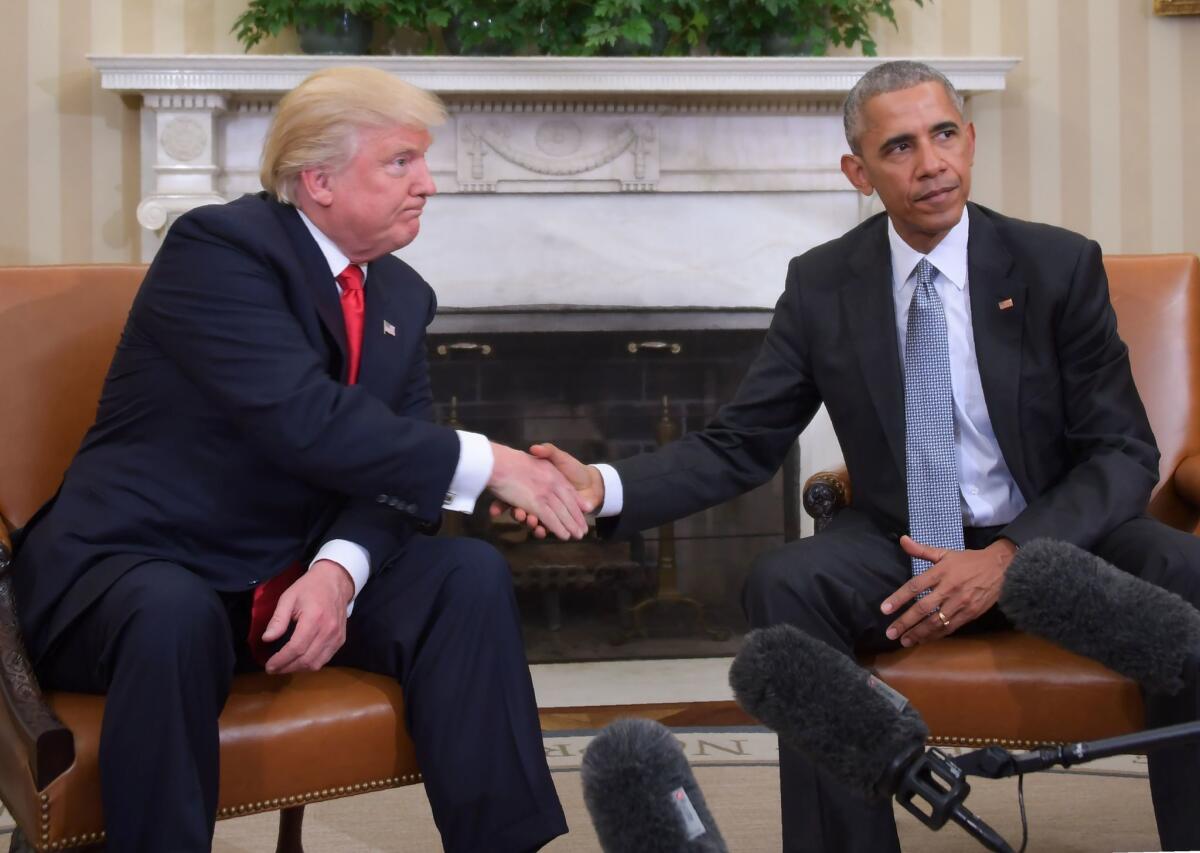
President Obama warned Donald Trump against hiring Michael Flynn as national security adviser in the days after the 2016 election, according to three former Obama administration officials.
The warning came during an Oval Office meeting between Obama and Trump after the Republican’s victory. Flynn had been fired by the Obama administration as the head of the military’s intelligence branch.
Trump ultimately tapped Flynn as national security adviser, but fired him after less than a month. The White House says Flynn was fired for misleading top officials about his contacts with Russia’s ambassador to the United States.
Trump has both defended Flynn and blamed the Obama administration for giving him security clearance.
The officials requested anonymity in order to disclose the private conversation.
John Oliver tries to save the tough net neutrality rules he championed
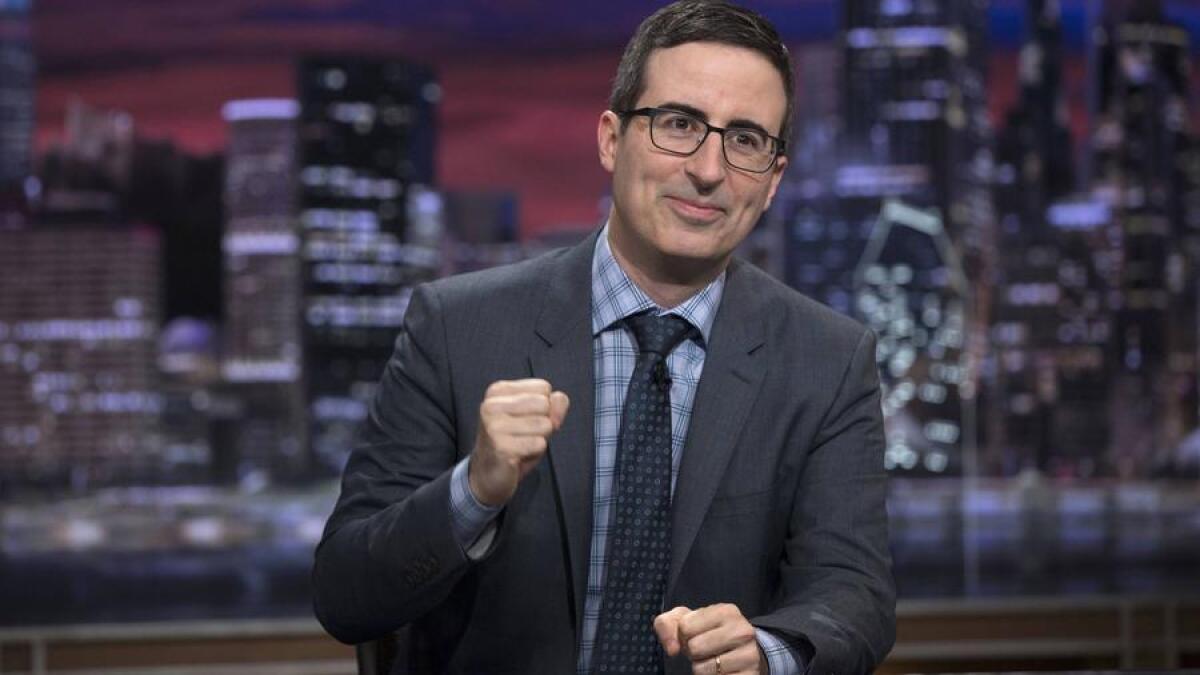
HBO’s John Oliver isn’t about to let the tough net neutrality rules he helped get enacted be erased without a fight.
Three years ago, a 20-minute net neutrality segment on his HBO show “Last Week Tonight With John Oliver” went viral. It helped spur an outpouring of public comments that led the Federal Communications Commission to enact tough regulations protecting the free flow of online content.
Now, with current FCC Chairman Ajit Pai moving to dismantle the tough legal oversight behind those rules — which prohibit broadband companies from blocking websites, slowing connection speeds and charging for faster delivery of certain content — Oliver took to the airwaves again on Sunday night urging Internet users to tell the agency to leave net neutrality alone.
Trump says we need a government shutdown. Here’s what’s happened in the past
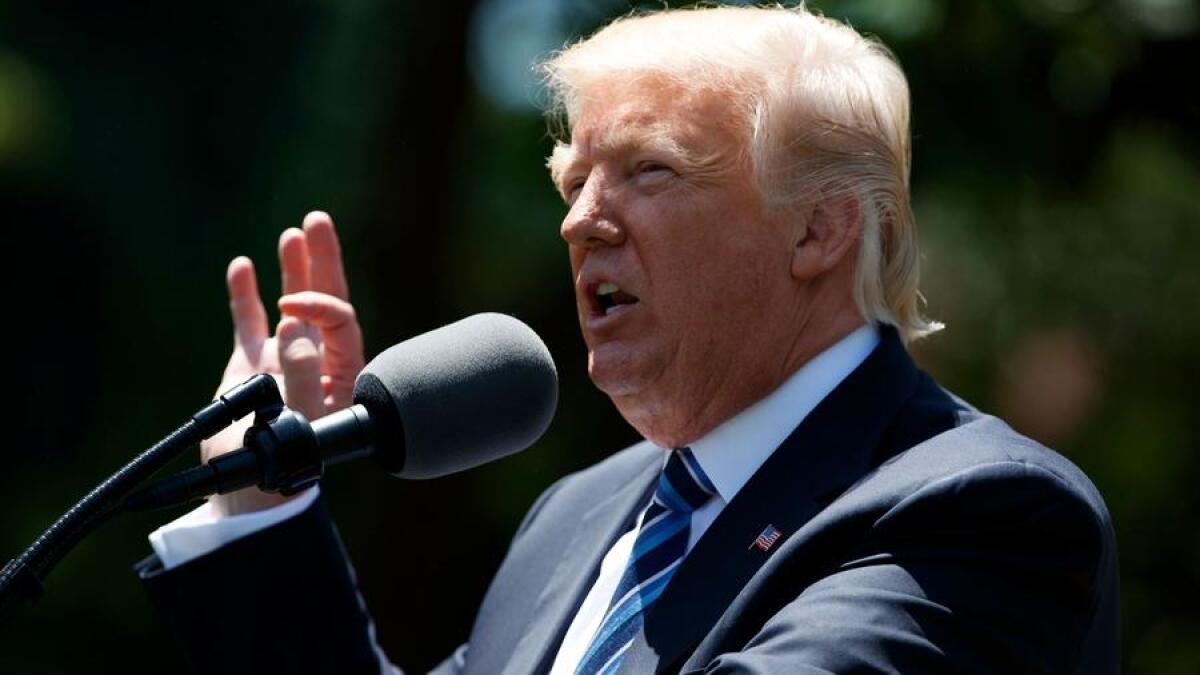
It’s a political gambit that President Trump seems to think will pay off: Let the federal government grind to a halt.
“Our country needs a good ‘shutdown’ in September to fix mess,” he tweeted last week.
The unconventional proclamation from the unconventional president raised concern from both sides of the aisle.
His comments came as lawmakers agreed to a $1-trillion bipartisan budget bill that funds the federal government through September, which means another battle and potential government shutdown looms this fall.
Under a shutdown, thousands of federal employees would go without pay and national parks would close, among other things. In short: It will upset a lot of people.
Here’s a look at the key players and fallout from recent government shutdowns.
Trump congratulates Emmanuel Macron, winner of French presidential election
President Trump is congratulating centrist newcomer Emmanuel Macron on his victory in France’s presidential election.
In Sunday’s vote, Macron overwhelmingly beat out far-right candidate Marine Le Pen, whom Trump had praised, but refrained from endorsing outright.
A congratulatory tweet from Trump came less than 90 minutes after polls closed and preliminary results pointed to a lopsided win for Macron. Le Pen swiftly conceded defeat and vowed to lead the opposition.
Pointing to more disciplined messaging than is sometimes the case for this administration, the White House press office issued an almost identically worded statement moments later, congratulating Macron and the people of France, and looking ahead to continued “close cooperation” by Washington with the French government.
Macron, a 39-year-old former banker and economy minister and a relative political neophyte, had been endorsed by former President Obama, and offered a warm public “merci” for that backing, extended days before Sunday’s vote.
The relationship between Trump and Le Pen had become more complex as the election neared. Le Pen, leader of the National Front, was one of the first to congratulate Trump on his own shock victory in November, and her nativist, nationalistic message carried echoes of Trump’s anti-immigrant campaign rhetoric.
Trump in turn had praised Le Pen’s tough stance on immigration and borders, which many of her critics had decried as racist.
But Le Pen had distanced herself from Trump in recent weeks. She was critical of his decision last month to strike a Syrian airfield with cruise missiles after the government of President Bashar Assad used a banned chemical agent to kill dozens of Syrian villagers.
Macron and Le Pen had disagreed sharply on France’s future in Europe. Le Pen had pledged to call a Brexit-style referendum on whether to leave the European Union if she won; Macron declared that a united Europe was crucial to France’s future.
Trump had hailed Britain’s June vote to depart the EU and has since suggested the bloc’s dissolution would not be a bad thing. The EU’s future status was not mentioned in the White House statement.
White House says it’s up to the Senate to fix any problems with House-passed health measure
Facing a wave of criticism over the GOP healthcare bill, the White House said Sunday it’s now up to the Senate to address any problems with the measure.
President Trump’s chief of staff, Reince Priebus, said in an interview that aired Sunday that “I’m excited where we’re at” on healthcare, adding that by pushing the bill through the House last week, “the president achieved something that no one thought he would.”
Appearing on “Fox News Sunday,” Priebus said the ball was now in the court of the Senate, which is considered unlikely to pass the measure in its present form.
House Democrats have predicted that the GOP-authored provisions will harm millions of Americans by depriving them of health insurance, and, not incidentally, do serious damage to Republicans’ chances in 2018 midterm elections.
Some Republican lawmakers already have faced hostile receptions from constituents worried that the bill could cause thousands of unnecessary deaths and leave those who already are sick vulnerable to vast premium increases.
Priebus played down those concerns.
“We … believe it is up to the Senate — if there are improvements to be made — to make those improvements,” Priebus said, echoing sentiments expressed by Trump in a tweet shortly before the interview aired.
Trump said last week after House passage of the controversial measure that “it could be, maybe, even a little better” in a Senate version.
“It’s a very good bill right now,” he said then.
House Speaker Paul Ryan, appearing Sunday on ABC’s “This Week,” called the replacement of the Affordable Care Act, known as Obamacare, a “rescue mission.”
Ryan addressed one of the just-passed bill’s most controversial provisions, allowing states to opt out of requiring insurers to sell plans to those who already are sick, declaring that “no matter what, you cannot be denied coverage if you have a preexisting [health] condition.”
Interviewer George Stephanopoulos interjected: “But you can charge people more.”
Ryan pointed to the addition of $8 billion meant to shield those with preexisting conditions. Healthcare experts have said that pool of money represents a fraction of what would be needed if states are allowed to loosen existing restrictions on how high the premiums for people who already are sick could be allowed to go.
Sounding hoarse, Ryan said that those most affected by rising premiums would be those who had deliberately let their coverage lapse.
“It’s kind of like waiting until your house is on fire to then buy your homeowners insurance. You want to make sure that people stay covered to keep the cost down,” he said.
Opponents of the bill say many of those who will allow their coverage to lapse, including the sickest Americans, would have done so because they were priced out of purchasing a health plan.
Trump’s Health and Human Services secretary, Tom Price, suggested that the numerous healthcare advocacy groups that came out strongly against the measure were not familiar with its provisions.
“I believe they’re not recognizing is that this is a different and, we believe, a better way to cover individuals with preexisting illnesses and injuries,” he said on NBC’s “Meet the Press.”
On eve of fired Justice Department official’s testimony, Trump tweets about Russia inquiry
President Trump took to Twitter on Sunday to criticize the scope and nature of investigations into Russian meddling in the U.S. presidential election — on the eve of a much-anticipated Senate hearing that is to feature the testimony of an Obama-era U.S. deputy attorney general whom the president fired.
Trump’s early-morning tweet did not mention former Deputy Attorney General Sally Q. Yates by name or refer to her scheduled testimony on Monday before the Senate Judiciary Committee.
But as he has done repeatedly amid ongoing congressional and FBI probes of potential collusion between his campaign and Russia, Trump insisted that investigative attention, and media reports, were misdirected.
Yates, serving at the time as acting attorney general, was fired by Trump at the end of January for refusing to defend his travel ban in court, where it remains under legal challenge. She expected to be questioned by senators about her warnings to the White House in January regarding the then-national security advisor, Michael Flynn.
Flynn was fired for misleading Vice President Mike Pence and others about his contacts with the Russian ambassador, Sergey Kislyak. However, nearly three weeks elapsed between Yates’ caution that Flynn could have left himself vulnerable to Russian blackmail by making untrue statements and his eventual firing.
And Flynn’s dismissal came only after the Washington Post reported that he had misled Pence about what was discussed in his phone calls with the Russian envoy.
Trump has previously sought to deflect attention from possible ties between Moscow and his campaign, most notably in March, when he accused former President Obama of having his “wires tapped” at Trump Tower. Intelligence officials and congressional investigators have said there is no evidence to support that claim.
President Trump settles in for a relatively quiet weekend in New Jersey
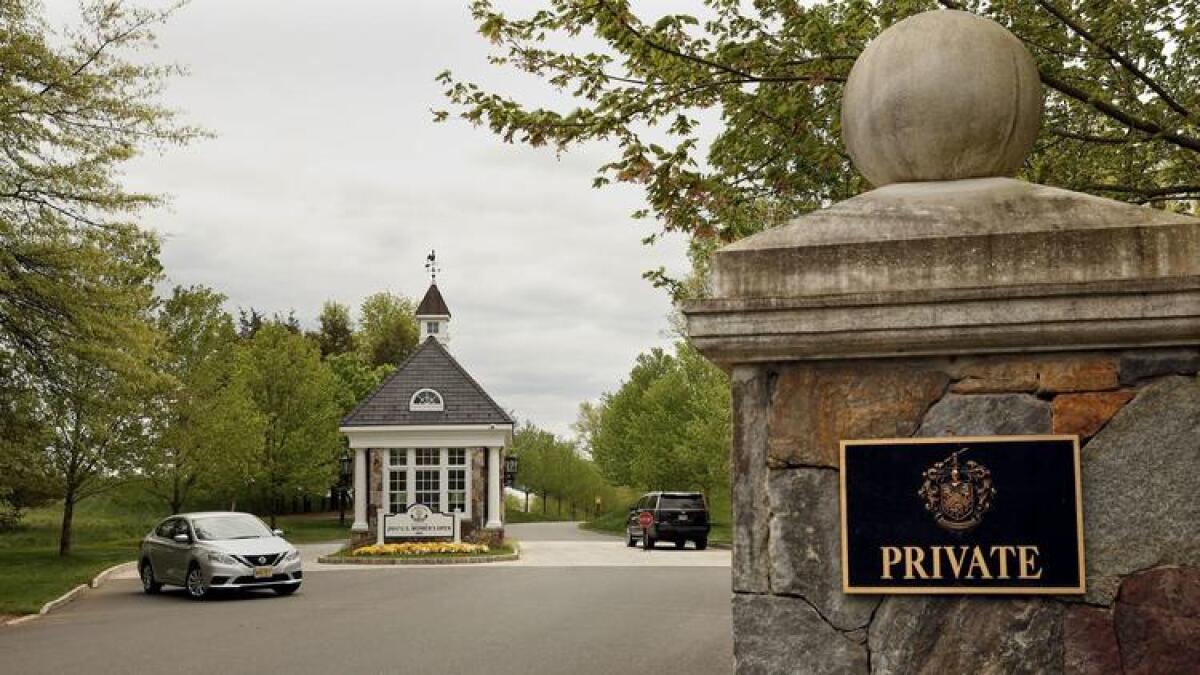
President Trump appeared to settle in for a quiet weekend at his New Jersey estate and golf club Saturday, after a heart-pounding week that saw him sign off on a $1-trillion spending deal to head off a government shutdown and help push through a House Republican bill to repeal and replace the Affordable Care Act.
With little on Trump’s public schedule, White House officials allowed the news of the week to settle in, and they set to work trying to cast Trump as a master dealmaker, when others saw the beginning of his second hundred days in office as more of a sign the real estate magnate was learning how to compromise and bend.
To get the spending bill through, Trump gave up money to start immediate construction on a wall along the border with Mexico and made other concessions to Democrats. During Trump’s visit with Palestinian Authority President Mahmoud Abbas, White House officials agreed to requests from Abbas for a high-profile lunch with the president and to place the Palestinian flag behind Trump during their joint statement for cameras.
Trump arrived at his estate and golf club in Bedminster, N.J., late Thursday night with his wife, Melania, staying in the mansion he owns that once belonged to automaker John DeLorean. White House officials and residents of Bedminster are beginning to refer to the estate as the “summer White House.”
Trump’s Mar-a-Lago resort in Florida is closed for the season.
Of the sixteen weekends Trump has been in office, he has spent eight staying at his properties away from Washington, D.C., a town he regularly refers to as “the swamp.”
Former top Justice Department official Sally Yates to testify about Michael Flynn and Russia
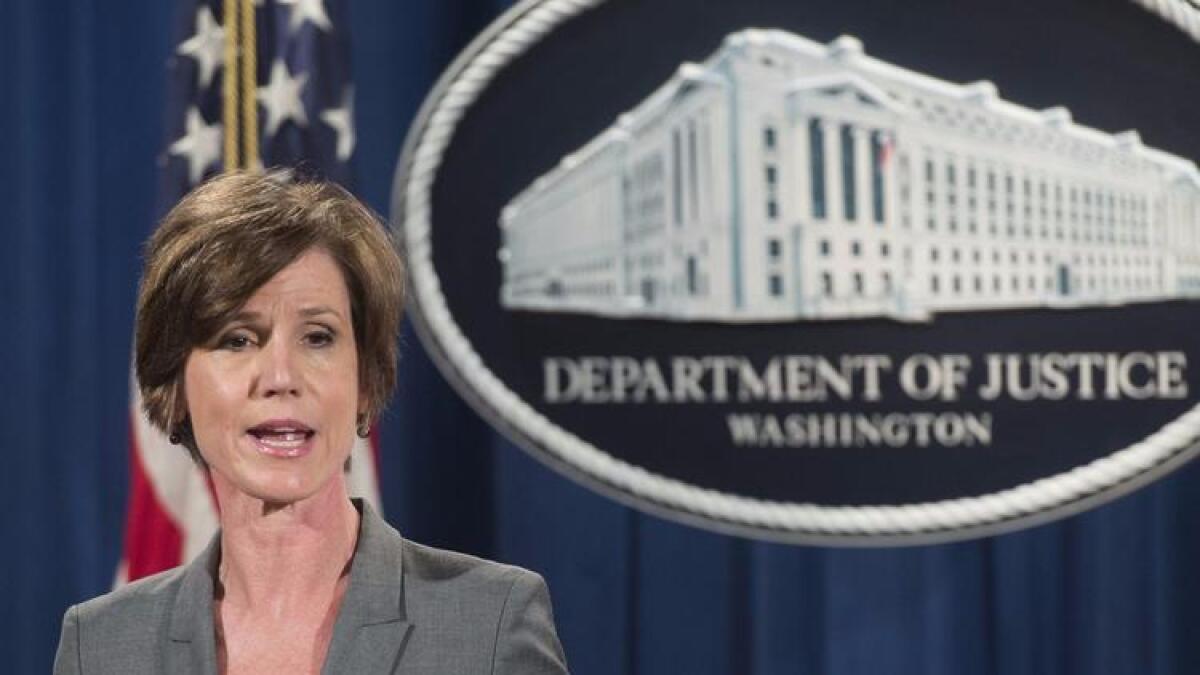
A top Obama administration Justice Department official will testify to Congress for the first time Monday about the most explosive contacts to emerge so far between President Trump’s former top aides and senior Russian officials, the focus of several investigations on Capitol Hill.
Sally Yates, deputy attorney general under President Obama, is expected to disclose details to a Senate Judiciary Committee panel about her warnings to White House officials in January that Trump’s national security advisor, retired Lt. Gen. Michael Flynn, had misled Vice President Mike Pence and other officials about his conversations with Russian Ambassador Sergey Kislyak.
Democrats to run ads targeting California’s House Republicans who voted for healthcare bill
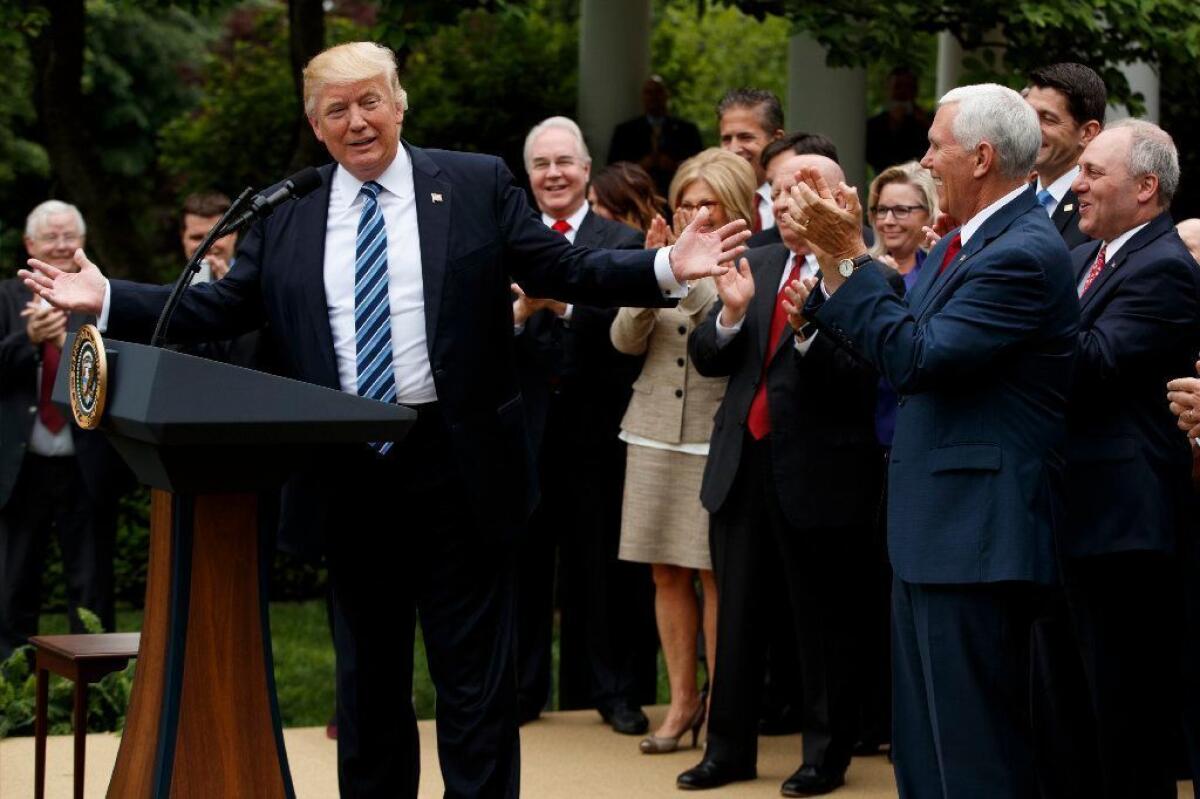
Democrats on Monday will begin airing a drive-time ad on Southern California radio stations targeting five Republican members of Congress who voted Thursday for the GOP healthcare plan.
The ad buy, currently scheduled to run for one week on news, sports and Spanish-language stations, is rare this early in the election cycle.
Democrats believe that the Republican vote for the unpopular healthcare bill will assist the party in its otherwise uphill effort to gain control of the House in 2018.
The Southern California ad from the Democratic Congressional Campaign Committee does not mention the members of Congress by name since voters in all of the districts will be within listening range.
The targets of the ad are five of the seven most vulnerable House Republicans in California — Darrell Issa of Vista, Dana Rohrabacher of Costa Mesa, Mimi Walters of Irvine, Steve Knight of Palmdale and Ed Royce of Fullerton.
All of them serve in districts won by Hillary Clinton in Novermber, as do Jeff Denham of Turlock and David Valadao of Hanford.
The House healthcare bill is now under consideration in the Senate, which is expected to make changes that may send the measure back to the House for a compromise. The ad repeats arguments Democrats made in their effort to defeat the bill.
Republicans, it says, would strip healthcare coverage from millions of people and raise costs, particularly on voters who are older or who have preexisting conditions — elements confirmed in a Congressional Budget Office report on the measure’s impact. It then lists estimates of thousands of dollars in heightened costs, as defined by study issued by a liberal-leaning advocacy group.
“That’s the sound of the congressional Republicans’ healthcare plan coming down the tracks,” the ad says. “Get out of the way.”
Eighteen months remain before the election, and it’s not clear where voters will rank healthcare by November of 2018. But Democrats believe that it will remain a powerful issue, particularly in districts which already were competitive.
There are 23 seats across the nation held by Republicans in districts won by Clinton. Immediately after the healthcare vote Democrats began targeting many of those officeholders with digital ads.
Taking over the House would require Democrats to win all of those seats, or most of them with surprise pick-ups elsewhere.
Another Trump nominee withdraws from consideration for a military post
President Trump’s pick to become U.S. Army secretary withdrew from consideration Friday amid growing opposition to his comments about Muslims and lesbian, gay, bisexual and transgender people.
Mark E. Green, a Republican state senator from Tennessee, former Army physician and West Point graduate, said in a statement he was making the decision with “deep regret” but had to do so because “false and misleading attacks against” him had made his nomination a “distraction.”
“Tragically, my life of public service and my Christian beliefs have been mischaracterized and attacked by a few on the other side of the aisle for political gain,” he said.
With his withdrawal, Green became the third person selected by Trump to lead a U.S. military service who had to step down in the face of mounting criticism.
Green’s problems began when a video surfaced of a September speech to a tea party group in Chattanooga in which he said that being transgender is a disease. He also indicated he believed that there was an “indoctrination of Islam” in public schools.
There was an uproar among human rights groups and LGBT advocates.
The Human Rights Campaign earlier Friday sent a letter, which was signed by a coalition of 41 organizations, to leaders of the Senate Armed Services Committee, urging that they reject Green’s nomination over his “shameful rhetoric.”
“His radical views would send an incredibly dangerous message down the chain of command — a message that undermines the important progress we’ve made, threatening morale and readiness,” the letter said.
Several Democrats, including Senate Minority Leader Charles E. Schumer of New York, applauded Green’s decision to step down.
“Mark Green’s decision to withdraw his name from consideration as Army secretary is good news for all Americans, especially those who were personally vilified by his disparaging comments,” Schumer said in a statement. “He was the wrong choice to serve as secretary, and should not have been nominated in the first place.”
Matt Thorn, executive director of OutServe - Servicemembers Legal Defense Network, a Washington-based organization that seeks LGBT equality in the military, said that serving as secretary of the Army is an “incredible and vital role to the success of our modern military.”
The previous secretary, Eric K. Fanning, was the first openly gay civilian to head a U.S. military service.
“Mark Green did not live up to the duty and honor that is expected of an individual serving in such a role. Mr. Green has better served the Army with his withdrawal than he would have as secretary,” Thorn said.
Green is Trump’s second Army secretary nominee to step down. Billionaire investor Vincent Viola dropped out from consideration for Army secretary in February after he decided his extensive financial holdings would hamper his ability to win Senate confirmation.
Philip M. Bilden, Trump’s pick for Navy secretary, withdrew from consideration shortly thereafter, due to his own problems untangling his financial investments.
Unemployment hits a 10-year low and other takeaways from April’s jobs report
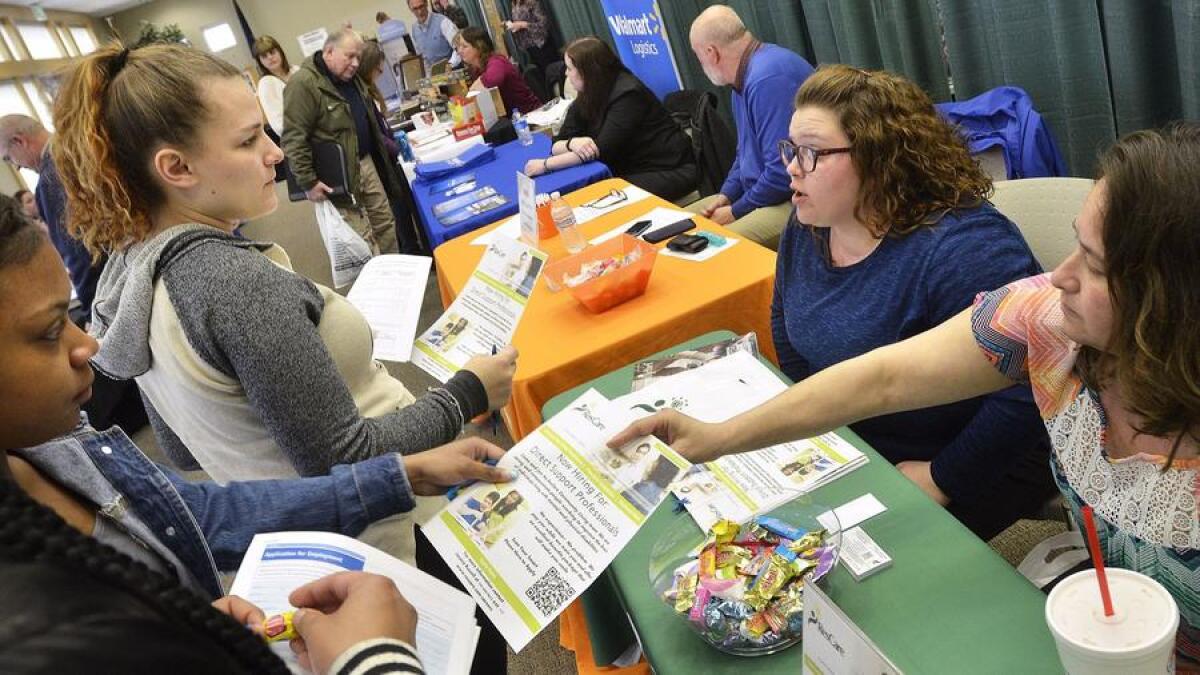
Solid job growth last month led economists — and probably Trump administration officials — to breathe a sigh of relief Friday after weak hiring in March raised concerns about a labor market slowdown.
Here are the highlights from the Labor Department’s April report:
- Job growth rebounded to a net 211,000, compared with a downwardly revised figure of 79,000 in March.
- The unemployment rate fell to 4.4%, the lowest in nearly a decade.
- Wages gains improved, with average hourly earnings up 7 cents after rising just 2 cents in March.
“Hiring got its groove back in April,” declared Mark Hamrick, Bankrate.com’s senior economic analyst.
Analysis: After healthcare vote, vulnerable House Republicans fear political consequences
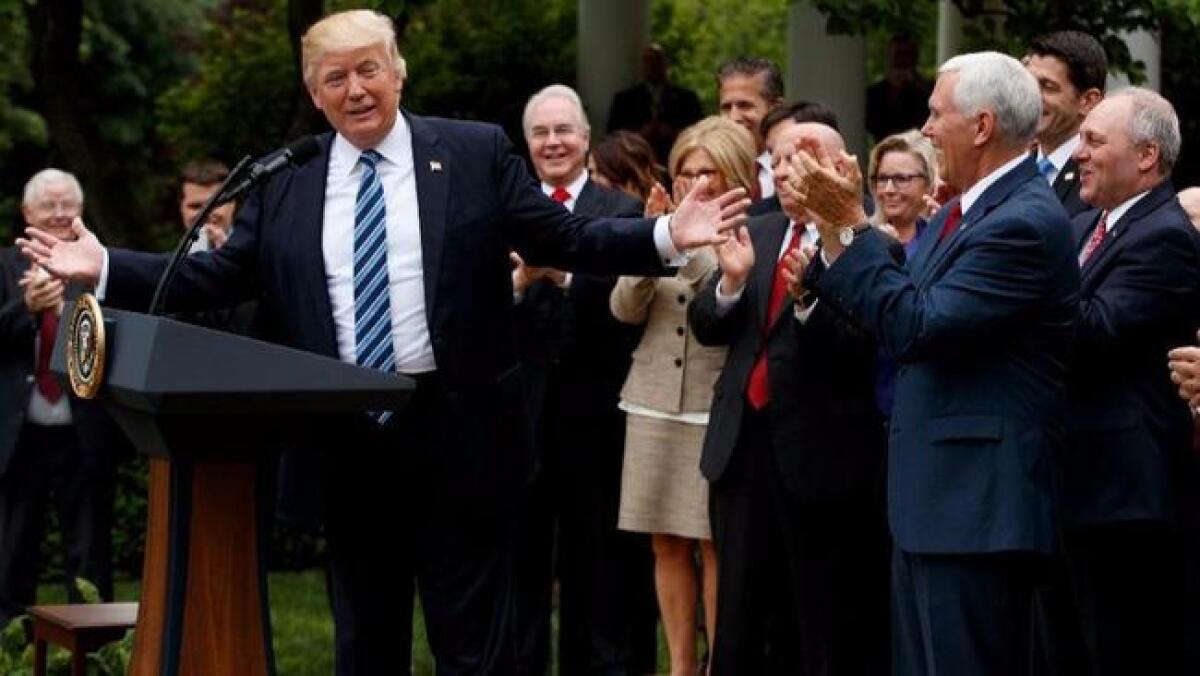
Many House Republicans who gambled to pass a healthcare plan must now turn to a new challenge: survival.
The two largest purges of House members since the early 1940s have followed efforts to remake the nation’s healthcare system: in 1994, when Democrats lost 52 seats after the collapse of the Clinton administration’s healthcare plan, and in 2010, when the party lost 63 seats after the narrow passage of the Affordable Care Act, known as Obamacare.
Those precedents have fed Democratic hopes that efforts to repeal President Obama’s healthcare plan could have a positive side effect for them: control of the House in 2018.
White House fires first woman to hold chief usher position
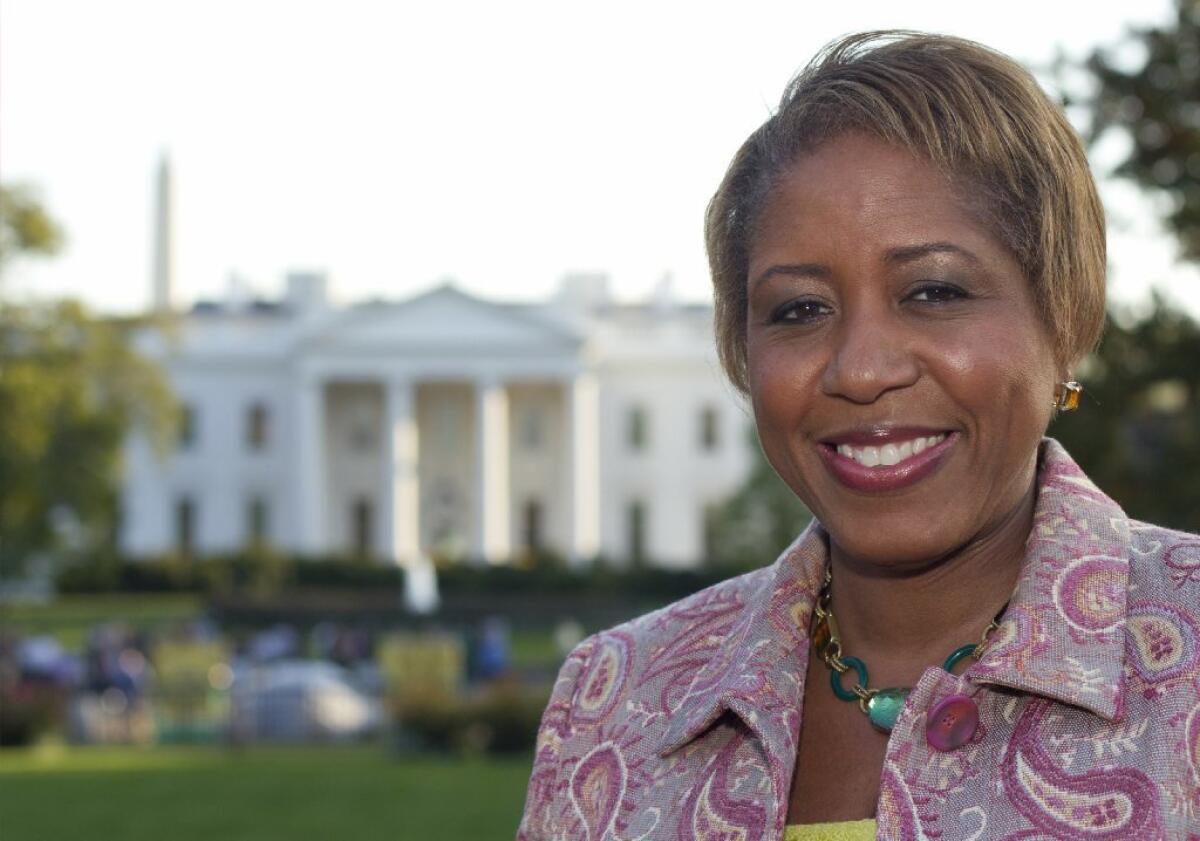
The White House has fired Angella Reid, the first woman and second African American to hold the position of chief usher, the person who serves as the general manager of the building and the residential staff.
News of Reid’s firing was first reported by the Washington Post.
The White House said the dismissal was an outcome of the transition to a new administration, but did not provide further details.
“We left on very good terms and wish her the very best and certainly hope for great things for her in the future,” said deputy press secretary Sarah Huckabee Sanders.
“It’s not uncommon that you might have a transition of staff when a new administration comes in, and it’s simply nothing more than that,” Sanders added.
Though that’s true of many White House jobs, the residence staff and chief ushers typically have held those position for long tenures, often witnessing several presidential transitions. Since the early 20th century, nine people have held the chief usher position.
Reid took the job in 2011 after Adm. Stephen W. Rochon, the first African American to hold the post, left for a job with the Department of Homeland Security. She had previously worked for the Ritz-Carlton hotel group.
The chief usher oversees the activities of the White House building, managing the house staff and working closely with the first family.
“What I think about most when I walk around the house is who has been here, who has done what in this particular space,” Reid told CNN last year. “Because, you know, just to think that I am able to walk here now when 100 years ago, a president or first lady did, or other guests did, or some of my ancestors did.”
Sanders said she believes that the deputy usher will fill Reid’s position.
White House: Trump was ‘simply being complimentary’ when praising Australia’s universal healthcare as ‘better’
So is President Trump really reverting to his former position favoring universal healthcare?
No, says the White House.
It was simple chit-chat, pleasantries spoken from one world leader to another when Trump told Australian Prime Minister Malcolm Turnbull on Thursday night that “you have better healthcare than we do.”
“He was simply being complimentary of the prime minister,” said Sarah Huckabee Sanders, the deputy press secretary for the White House, during Friday’s daily briefing with reporters.
The administration was forced to walk back the president’s comments after liberals, including Sen. Bernie Sanders of Vermont, started claiming victory -- with a bit of a laugh -- and more than a few conservatives raised their eyebrows.
Australia offers a government-run system that runs parallel to the private system.
Trump has praised universal healthcare in the past, though he has more recently hewn to the more traditional Republican position that seeks to limit a government role.
On Thursday, Trump claimed an “unbelievable” victory when House Republicans narrowly passed a bill intended to repeal much of the Affordable Care Act.
It approved by the Senate, it would roll back the expansion of Medicaid, end mandated healthcare insurance coverage and, critics say, leave millions of Americans without healthcare insurance.
Watch live: Daily White House briefing with deputy press secretary Sarah Sanders
Trump executive order on religion fits a pattern — action far more modest than his words
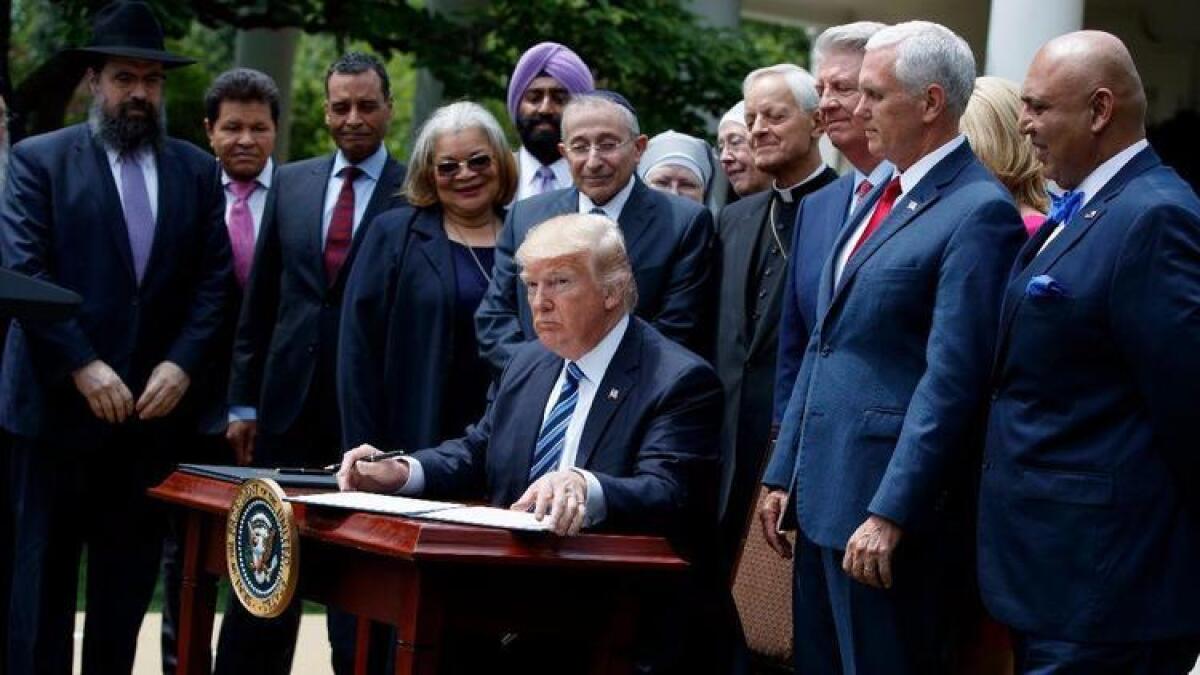
President Trump signed an executive order Thursday that he said would protect politically active churches from losing their tax-exempt status. But, as has repeatedly been true during his young administration, the actual provisions of the order proved more modest than his words.
“For too long the federal government has used the state as a weapon against people of faith,” Trump said to an audience of conservative religious leaders in the White House Rose Garden.
The order was aimed at fulfilling Trump’s campaign promise to “totally destroy” a federal law that prohibits churches from actively supporting political candidates.
But Trump’s order does not change the law; that would require Congress to act. And, despite his declaration, it doesn’t necessarily change the way the IRS might enforce the law.
What Democrat would be crazy enough to challenge Nancy Pelosi on her home turf? Meet Stephen Jaffe
Stephen Jaffe entered the cafe with a small grin, a riotous print shirt and the blithe confidence of someone who doesn’t much care if people think he’s crazy.
The 71-year-old employment attorney, a political novice, was one of many Democrats swept up in the fist-shaking presidential crusade of Vermont Sen. Bernie Sanders. Thus inspired, he’s now fixed his sights on winning a seat in Congress.
But not just any seat.
He hopes to knock off Nancy Pelosi, the former House speaker, the current Democratic minority leader and a political fixture in San Francisco for nigh on 50 years.
Not by portraying her the way a succession of failed Republican challengers have, as the lipsticked embodiment of the ludicrous left.
Rather, Jaffe suggests that Pelosi is not liberal enough or, for that matter, even a true liberal, a proposition that would be dismissed as outlandish anywhere other than San Francisco.
Trump’s raucous return to his hometown
For the first time since his inauguration, President Trump returned to his hometown Thursday -- but just barely.
Except for the drive in from the airport, Trump was hardly on land, spending most of the visit on the Intrepid, a decommissioned aircraft carrier docked in the Hudson River.
But the brief visit was a big deal for New Yorkers, who turned out in dueling battalions of those who revere the president and those who revile him.
“New York hates you,” was the refrain among hundreds of people who were awaiting the president’s arrival near the ship.
A smaller group of supporters had its own chant: “Welcome home!”
Police kept the two groups separate behind barricades.
Larger protests had been planned in front of Trump Tower, the 58-story midtown skyscraper where Trump’s wife, Melania, and youngest son, Barron, live in a triplex penthouse. But the president skipped midtown, postponing a meeting with Australian Prime Minister Malcolm Turnbull that was supposed to take place at a hotel near Trump Tower.
The visit was shortened because the president stayed late in Washington for a Rose Garden ceremony to mark his victory in the House vote to repeal the Affordable Care Act.
Trump headed directly to the Intrepid. He was to meet with Turnbull there and also deliver a speech to military veterans.
Only 18% of New Yorkers voted for Trump, but he still seems to love the city. During the campaign, he flew back almost every night to sleep at home in Trump Tower.
Thursday night, however, he was headed to his golf club in Bedminster, N.J. He told Fox News in a recent interview that he would not sleep in New York because of the expense and complication of his security in midtown Manhattan.
Russian Embassy blasts tweet about election meddling, but it’s not what you think
Who knew the Russian Embassy in London had a sense of humor?
The embassy shared this wry comment with its 53,000 Twitter followers, highlighting a report on Prime Minister Theresa May’s accusing European Union officials of meddling in Britain’s June election. The tweet pokes fun at ongoing U.S. investigations into Russia’s interference in last year’s U.S. presidential election.
On Wednesday, FBI Director James B. Comey testified before the House Intelligence Committee and acknowledged that his agency was investigating whether there was coordination between Russia and the Trump campaign.
This isn’t the first time the Russian Embassy in the U.K. has cracked a joke on Twitter. Over the years, the account has gained fame for tweeting sarcastic and snarky remarks about a wide range of geopolitical issues.
‘Na, na, na, hey, hey, goodbye’: Watch the reaction on the floor of the House after the healthcare vote

The House of Representatives passed the controversial American Health Care Act with 217 votes.
After the House voted to pass the GOP’s Obamacare replacement plan, Democrats waved and sang “na, na, na, na, na, na, na, na, hey, hey, goodbye” to Republicans facing reelection in 2018.
Why? Because the Democrats believe that voting “yes” on the controversial measure will put those lawmakers at risk of losing their seats.
Steam’s 1969 hit, “Na Na Hey Hey Kiss Him Goodbye,” has had a longtime presence in political history. After Barack Obama was elected president in Nov. 2008, supporters gathered in front of George W. Bush’s White House and sang it repeatedly.
It dates back even further. According to Josh Marshall at Talking Points Memo, Republicans sang this song to Democrats when President Clinton’s tax bill passed the House in 1993.
These preexisting conditions covered under Obamacare may not be protected by the GOP’s replacement plan
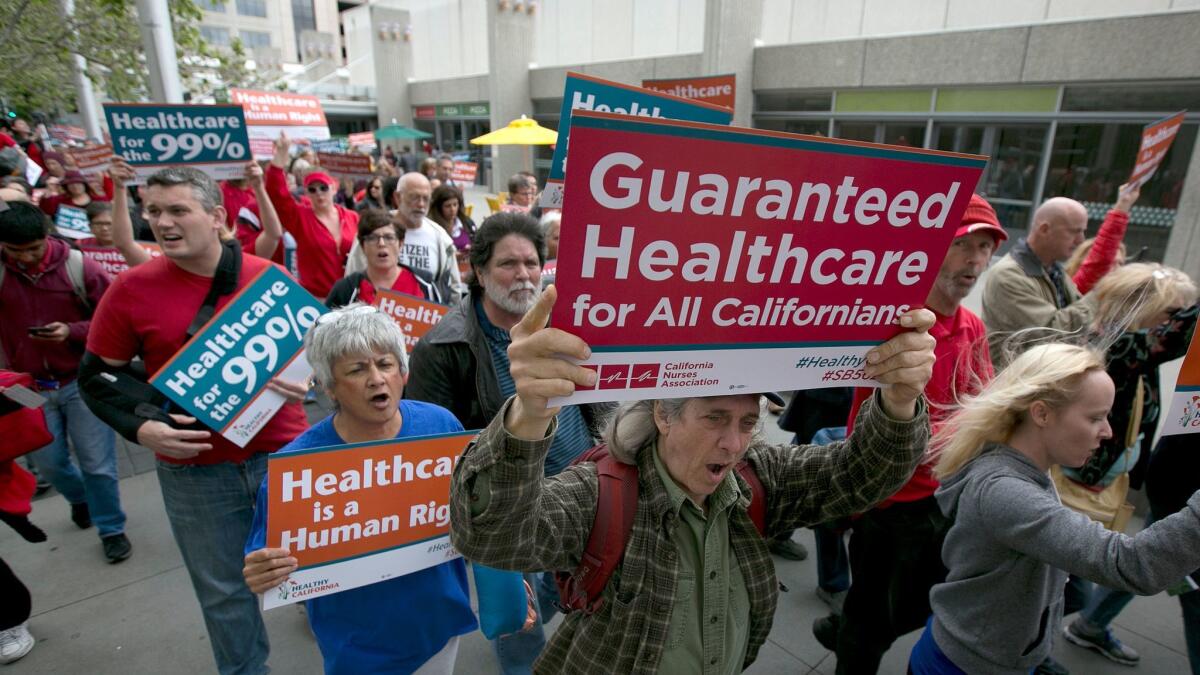
The Affordable Care Act, also known as Obamacare, prohibits insurers from turning away consumers with preexisting medical conditions, a practice that was once standard in the industry.
Among the conditions that once commonly made insurers deny coverage, according to a list assembled by the nonprofit Kaiser Family Foundation, were:
- HIV/AIDS
- Lupus
- Alcohol abuse/drug abuse with recent treatment
- Mental disorders
- Alzheimer’s/dementia
- Multiple sclerosis
- Rheumatoid arthritis, fibromyalgia and other inflammatory joint disease
- Muscular dystrophy
- Cancer within some period of time (e.g. 10 years)
- Severe obesity
- Cerebral palsy
- Organ transplant
- Congestive heart failure
- Paraplegia
- Coronary artery/heart disease, bypass surgery
- Paralysis
- Crohn’s disease/ulcerative colitis
- Parkinson’s disease
- Chronic obstructive pulmonary disease/emphysema
- Pending surgery or hospitalization
- Diabetes mellitus
- Pneumocystic pneumonia
- Epilepsy
- Pregnancy or expectant parent
- Hemophilia
- Sleep apnea
- Hepatitis C
- Stroke
- Kidney disease, renal failure
- Transsexualism
(To see Kaiser Family Foundation‘s full report, click here).
The American Health Care Act, as the House Republican healthcare bill is called, does not explicitly eliminate Obamacare’s coverage guarantee.
But the bill would allow states to obtain a waiver from the federal government to eliminate another Obamacare mandate that prohibits insurers from charging people with preexisting medical conditions more for insurance.
That means that some people with preexisting conditions could see their premiums rise dramatically if the House bill becomes law..
In other words, a patient with diabetes, heart disease or cancer might still be “guaranteed” coverage, but could only obtain it if he or she pays five or 10 times as much for a health plan.
Congress gives final approval to $1 trillion spending bill, easing shutdown threat for rest of fiscal year
Congress gave final approval to a sweeping $1-trillion spending bill Thursday, sending President Trump the first notable bipartisan accomplishment of his administration.
The Senate voted 79-18 to pass the bill that will keep government running for the next five months, easing the threat of a federal shutdown until the next spending battle in the fall. The House approved it earlier.
Trump initially groused over the final compromise because Democrats in Congress used their leverage as the minority party to deny the president his top priorities, including funding for his promised wall on the border with Mexico.
But the White House later embraced the outcome. The measure will boost spending on defense, but not as much as Trump wanted, and provides money for disaster relief, medical research and other bipartisan priorities, including the fight against opioid addiction.
It also props up a struggling health and pension fund for coal miners that was important to both parties.
Trump is expected to sign it swiftly into law, averting a shutdown ahead of Friday’s deadline, when current funding expires.
Stephen Colbert under attack by conservatives for joke about Trump and Putin
Some times a joke goes too far — it all depends on how it’s received.
For months, “Late Show” host Stephen Colbert has focused his monologue on President Trump. Colbert has joked about Trump’s intellect, appearance and family.
But this week, he upped it a notch and is now facing a backlash.
“You talk like a sign-language gorilla that got hit in the head,” Colbert said of Trump in a monologue earlier this week. But that was just the windup. He then went on to say suggest, in the rawest, most explicit terms, that Trump was — we will be delicate here — a sexually submissive partner to Russian President Vladimir Putin.
The move ignited the hashtag #FireColbert, with some accusing the comedian of homophobia. Colbert remained unapologetic and is not backing down.
“He, I believe, can take care of himself,” Colbert said of Trump at a Wednesday taping of his CBS late-night show. “I have jokes; he has the launch codes. So, it’s a fair fight.”
Some conservative pundits beg to differ.
Here are some of today’s headlines:
Stephen Colbert is what happens when you let politics consume you (Washington Examiner)
Indeed, we live in politically charged times.
This piece asserts that Colbert is too caught up in politics.
“Stephen Colbert is what happens when you let politics take over your life. You become ugly, nasty and mean,” writes T. Becket Adams. “Colbert broke character for CBS, revealing that he is actually angrier and pettier than his nearly 20-year-old Comedy Central alter ego. His jokes have become increasingly bitter and partisan, and his style of humor uncomfortably personal. Get him near politics and watch him froth.”
He also took his criticism to Twitter.
Colbert takes hypocritical gutter-dive (Boston Herald)
The conservative columnist Adriana Cohen tweeted at Colbert and used her column to lambaste him as a liberal elitist.
“There’s nothing more irritating than an elitist, liberal hypocrite who can dish it out — big league, as President Trump likes to say — but can’t take it,” she writes.
Cohen adds, “Can you imagine if Hillary Clinton were president and someone made a remark like Colbert did? There would be a total media meltdown.”
… And while many conservatives condemned Colbert’s remarks, all did not call for him to be fired. Here’s what Fox News anchor Sean Hannity, a friend of Trump’s, had to say:
Congress scuttles California-led effort to bring retirement security to millions
A pioneering, California-led effort to create retirement security for low-income workers has been thrown into jeopardy after the U.S. Senate voted Wednesday to block states from starting programs to automatically enroll millions of people in IRA-type savings plans.
The measure, aimed at stopping the fledgling state retirement programs, now goes to President Trump, who has vowed to sign it.
That leaves lawmakers in California, Illinois and other states that only months ago were celebrating the success of their long-planned initiative scrambling to regroup. The Senate voted 50 to 49 to stop the state plans.
The retirement programs that were about to launch in seven states and are under consideration in many more were targeted by Wall Street firms and the U.S. Chamber of Commerce.
House committee OKs bill to undo much of Wall Street overhaul law enacted after financial crisis
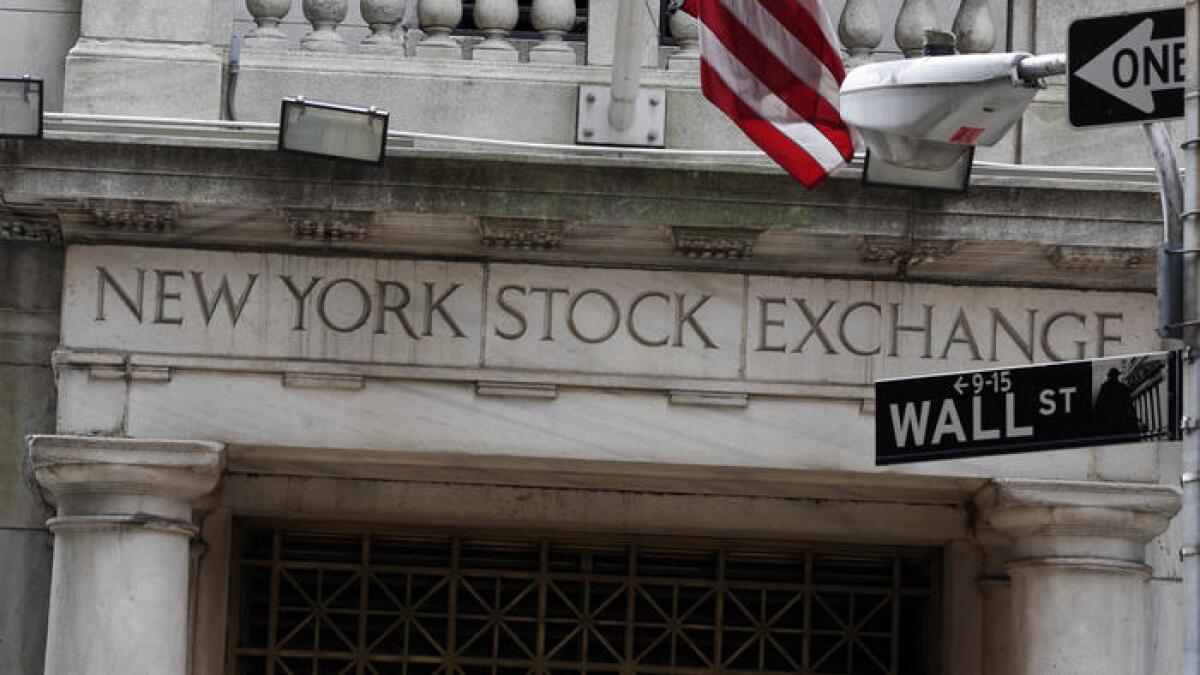
A House panel has approved legislation that would undo much of the Dodd-Frank law enacted after the 2008 economic meltdown.
The bill cleared the Republican-led House Financial Services Committee by a vote of 34 to 26.
Republicans are arguing that the law passed under President Obama is slowing economic growth because of the cost of compliance and by curbing lending.
Democrats warn the GOP bill will create the same conditions that led to the financial crisis and pushed the economy to the brink of collapse.
The bill now goes to the full House for a vote, but supporters admit that the path will be much more difficult in the Senate, where Democratic support will be needed.
Trump, Australian leader to smooth over rocky start and confer on North Korea
President Trump is to meet with Australian Prime Minister Malcolm Turnbull in New York, with the leaders aiming to reaffirm a staunch alliance between their two nations and put behind them a testy phone call that took place soon after Trump was inaugurated.
Thursday’s meeting -- delayed by a few hours when Trump stayed in Washington for a celebratory meeting with House Republicans after the passage of a controversial health-care measure -- was expected to center on the threat posed by North Korea and other key concerns in the strategically crucial Asia-Pacific region.
Another likely topic was an Obama-era agreement on the resettlement in the U.S. of up to 1,250 mostly Muslim refugees, now living in immigration camps off Australia’s coast. That accord was a point of contention during a late-January phone call between the two leaders.
Intended as a friendly introduction days after Trump took office, the talk went off the rails when the new U.S. president denounced the refugee pact in harsh terms. News accounts at the time had Trump calling it “the worst deal ever” and suggesting he would not honor it.
That flap was smoothed over when Vice President Mike Pence visited Australia last month and offered assurances that the Trump administration would adhere to the refugee agreement, even if it did not “admire it,” as Pence put it.
The New York visit will showcase decades of U.S.-Australian friendship when Trump and Turnbull attend a gala dinner Thursday evening aboard the USS Intrepid, a decommissioned aircraft carrier that is now a floating museum in the Hudson River.
The event commemorates the 75th anniversary of the Battle of the Coral Sea in World War II, when U.S. and Australian naval forces in the Pacific triumphed in a decisive engagement with the Japanese.
Trump to visit Israel, the Vatican and Saudi Arabia
President Trump’s first foreign trip will include stops in Israel, the Vatican and Saudi Arabia before visits to a NATO meeting in Belgium and a Group of 7 summit in Italy.
Trump is expected to take his first overseas trip as president later this month with the multistop tour, two White House officials said. The officials spoke on condition of anonymity ahead of a formal announcement later Thursday.
The announcement follows Trump’s meeting Wednesday with Palestinian leader Mahmoud Abbas and Trump’s vows to mediate peace between Israel and the Palestinians. Trump also met with Catholic cardinals earlier Thursday ahead of his trip to the Vatican.
The White House had said previously that Trump would travel to Brussels for the NATO meeting and to Sicily for the G-7 summit before Memorial Day.
The trips were first reported by Politico.
Watch live: House to vote on GOP healthcare bill
‘Death spiral!’: Trump is stoking fear that the Obamacare markets will collapse if Congress doesn’t act
President Trump prodded lawmakers to act on health care Thursday, writing in a tweet that the Affordable Care Act is in a “death spiral,” and posting a news story about a company withdrawing from the subsidized health insurance market in Virginia.
House Republicans are poised to vote Thursday after resuscitating their plan to repeal and replace President Obama’s signature health care law, adding a $8 billion fix to offset insurance costs for those with pre-existing health conditions. Opponents say the extra money would still leave those with pre-existing conditions vulnerable to huge premiums and out-of-pocket costs.
The cash infusion was designed to win back centrist Republican lawmakers who had threatened to withdraw their support for the effort. Even on Thursday morning, as lawmakers prepared to vote later in the day, Republican leaders were scrambling to shore up the votes to pass the measure.
On the campaign trail, President Trump pledged to repeal and replace the Affordable Care Act, known as Obamacare. He suffered a loss of political capital in late March when an earlier bill was pulled from the House floor at the last minute before a vote.
Many health care experts and industry officials believe the marketplaces need to be tweaked, and the withdrawal of insurers has left consumers in some parts of the country with few options. That said, health care experts have not seen signs of a so-called “death spiral” for the exchanges, and have seen enrollment on the marketplaces remain relatively steady, even with recent premium hikes.
Trump signs order inviting more politics at church, but no ‘religious liberty’ clause involving LGBTQ debate
President Trump signed an executive order aimed at protecting politically active churches from losing their tax-free status.
The order, timed for Thursday’s National Day of Prayer, does not include the broad religious liberty provisions leaked in February that could have allowed businesses to discriminate based on sexual orientation and other moral objections.
The new order contains a more vague blanket statement that declares the administration is committed “to protect and vigorously promote religious liberty.”
The order is also designed to allow religious groups to avoid a mandate to provide contraception coverage under President Obama’s healthcare law, the Affordable Care Act, potentially expanding an exemption that had been carved out in the courts. A senior administration official who briefed reporters Wednesday night would not describe how that provision would work, saying only that unspecified “regulatory relief” would come later.
The official emphasized that the order would not change existing law. The most significant portion of the order would direct the Internal Revenue Service to “exercise maximum enforcement discretion” in enforcing the Johnson amendment, which restricts religious groups from endorsing political candidates without risking their tax-exempt status.
Trump met with evangelical leaders Wednesday night and with Catholic leaders Thursday morning before signing the order at a public ecumenical ceremony in the Rose Garden.
“You’re now in a position where you can say what you want to say...,” Trump said before signing the order, along with a proclamation. “We are giving our churches their voices back.”
Evangelicals supported Trump strongly during his election and had been pressuring the administration to go further in giving businesses discretion to assert morality clauses without running afoul of anti-discrimination laws.
Here are Steve Bannon’s white-board goals, transcribed and annotated
When Rabbi Shmuley Boteach tweeted images from the White House Tuesday, he gave the world a behind-the-scenes glimpse at what appears to be Steve Bannon’s to-do list.
Displayed on a large white board in a room believed to be Bannon’s office — though the White House has not confirmed that — are outlines on immigration, national defense, Obamacare, tax reform and infrastructure with no less than 38 items. Several under the heading “Pledges on immigration” include a checkmark. Whether that symbolizes that a task was completed, remains in progress or something else is unclear.
Nothing mentioned on the white board reveals anything the White House hasn’t already discussed, so this likely isn’t the same situation as November, when a photo of Kansas Secretary of State Kris Kobach accidentally revealed the deportation plans he shared with Trump.
Nonetheless, it’s worth taking a gander. Below is a list of the most interesting points that we could decipher. Many of them speak for themselves, as they’ve been ongoing topics of conversation. We’ve added annotations to some.
The biggest takeaway here is that whoever wrote these items has clear penmanship.
As James Comey testifies before Congress, some conservatives say Hillary Clinton has only herself to blame
President Trump insists it did not affect the election, while Hillary Clinton disagrees.
It’s May and chatter about FBI Director James B. Comey’s decision to announce last October -- 11 days before the election -- that he had reopened an investigation into Clinton’s use of a private email server while she was secretary of State is making headlines.
On Wednesday, Comey stood by his decision, telling a Senate panel that in retrospect it was the “right choice.”
Still, a day earlier, Clinton, while speaking at a women’s forum in New York, said Comey’s announcement had damning implications on the election.
Her comments ignited a response from Trump, who on Twitter said Comey had essentially given Clinton a “free pass” after his agency declined to seek charges against her.
And conservative media is -- again -- homing in on Clinton.
Here are some of today’s headlines:
No, Hillary Clinton wasn’t screwed over by FBI Director James Comey and the Russians (Townhall)
On Tuesday, Clinton made her first in-depth comments about the results of last year’s election.
“It wasn’t a perfect campaign, there is no such thing,” she said during a discussion at the Women for Women event in New York. “But I was on the way to winning until the combination of Jim Comey’s letter on Oct. 28 and Russian WikiLeaks raised doubts in the minds of people who were inclined to vote for me but got scared off.”
This piece argues that Clinton – not Comey or Russian interference – is solely to blame for her defeat.
“Do we feel sorry for her or do we just roll our eyes? Hillary Clinton seems to be taking baby steps towards accepting responsibility for blowing one of the most winnable elections in recent memory,” writes Matt Vespa. “Clinton has no one else to blame but herself for blowing it.”
Vice president calls the show to defend the budget deal (Rush Limbaugh)
Some conservatives are really upset about the new budget deal.
This was clear when Vice President Mike Pence called into Rush Limbaugh’s show to defend the plan, which does not allocate funds for a wall along the U.S.-Mexico border – a key campaign promise by then-candidate Trump.
“If this is what happens, Mr. Vice President, why vote Republican? What is the point of voting Republican if the Democrats are gonna continue to win practically 95% of their objectives, such as in this last budget deal?” Limbaugh said. “The Democrats clearly think this is a big win, and they’re confident they can block Trump’s agenda after this spending bill for the rest of Trump’s term. There isn’t anything of the president’s agenda in this budget, and people are beginning to ask, when’s that gonna happen? If you’re gonna shut it down in September, why not now?”
Pence pushed back some against Limbaugh, touting increases in defense spending allocated in the bill that funds the government through September.
Still, as noted in this space yesterday, some conservative activists – including Limbaugh – are hinting that a shutdown might be needed.
Campus high jinks and the 1st Amendment (American Spectator)
When it comes to resisting the Trump agenda and conservatives, UC Berkeley is ground zero.
Last week, conservative columnist Ann Coulter was forced to cancel a speech at the university after police expressed security concerns.
The campus has been perceived as a battleground for shutting out right-wing views – so much that in February Trump threatened to withhold federal funds from the public university.
This piece delves into how college campuses began to tilt liberal in recent decades.
“Things on campus began to change by the 1970s and 1980s. Then the students who were radicals in the 1960s began to become junior faculty, then senior faculty,” writes R. Emmett Tyrrell Jr. “Along with them came the feminists, the racialists, the lecturers on even more extreme brands of esotery. The result is that if there is an old-fashioned liberal on campus today, that liberal is the campus conservative.”
House GOP tacks $8 billion onto Obamacare repeal to help cover pre-existing conditions -- and win votes
House Republicans have once again revived their plan to repeal and replace the Affordable Care Act, this time hoping to win back centrist lawmakers with a new amendment to pump in more money to offset insurance costs for those with pre-existing health conditions.
The latest $8 billion fix emerged Wednesday after key Republican defectors took their concerns directly to President Trump at the White House.
Two lawmakers, Rep. Fred Upton (R-Mich.) and Rep. Billy Long (R-Mo.) -- both of whom had recently and abruptly announced their opposition -- reversed course after the hour-long meeting, saying they could now back the bill. Their support could bring other centrists on board.
“With this addition that we brought to the president, sold him on, an hour-long meeting, we’re both ‘yeses’ on the bill,” Long told reporters afterward at the White House.
It is unclear if the high-profile fix will be enough to nudge other reluctant lawmakers to endorse the measure.
House Speaker Paul Ryan can lose no more than about 22 votes, in the face of opposition from Democrats, and the bill has been teetering on collapse amid pressure to vote by Thursday, before lawmakers break for week-long recess.
Rank-and-file Republicans have become increasingly worried that changes made to the original bill, the American Health Care Act, to win over the conservative Freedom Caucus will repeal too many popular parts of Obamacare -- namely, its ban on insurers denying coverage or charging high prices for those with pre-existing conditions.
Ryan tamped down expectations for a vote soon but said talks are progressing.
“We’re getting extremely close,” he told radio host Hugh Hewitt on Wednesday. “We’re having very, very productive conversations with our members. The president’s having good conversations with our members.”
But facing the prospect of not being able to amass the votes, lawmakers have begun analyzing their long road to repealing the Affordable Care Act, and wondering what they could have done better to fulfill their campaign promises.
Rep. Tom MacArthur (R-N.J.), who brokered the earlier amendment with the Freedom Caucus to allow states to waive the Obamacare requirement that insurers cover pre-existing conditions, doubted extra money at this point could win votes.
Leaders already tacked on $15 billion in extra money for the risk pools during an earlier amendment negotiation.
“The question is more fundamental with people: Are they comfortable with this balance – this is best way to protect the vulnerable and cut expenses?” he said late Tuesday. “If they’re not, you can throw billions here and billions there, it’s probably not going to move them. I don’t think money is the answer now.”
Under the emerging amendment from Upton and Long, an additional $8 billion would be provided over five years to help high-risk insurance plans in states that receive waivers under the MacArthur amendment reduce premiums or other out-of-pocket costs for individuals with pre-existing conditions who have a gap in their insurance coverage.
The proposal addresses a consistent criticism that these plans were historically underfunded and could never meet the demand for coverage from sick people who could not get commercial insurance on their own.
But it was quickly dismissed as inadequate by many healthcare experts and advocates for patients.
“This is like building a bridge less than one-quarter of the way across a river,” former Families USA director and longtime patient advocate Ron Pollack noted in a tweet. “Anyone driving a car to the other side will still drown!”
Democrats also panned the approach.
Senate Minority Leader Charles E. Schumer (R-N.Y.) said the proposal “is like administering cough medicine to someone with stage 4 cancer.”
He added: “This Republican amendment leaves Americans with pre-existing conditions as vulnerable as they were before under this bill. High-risk pools are the real death panels: they mean waiting forever in line for unaffordable health insurance.”
And Republicans who already oppose their party’s healthcare overhaul as insufficient in repealing and replacing Obamacare said leaders were desperate to pass the bill and move on.
“The AHCA is like a kidney stone -- the House doesn’t care what happens to it, as long as they can pass it,” tweeted Rep. Thomas Massie (R-Ky.), who is opposed.
Comey strongly defends decision to reopen FBI probe into Clinton emails 11 days before the election

FBI Director James Comey defends how he treated new information about Hillary Clinton’s emails toward the end of the 2016 presidential election.
FBI Director James B. Comey strongly defended his decision to inform Congress in late October that he had reopened an FBI investigation into Democratic presidential nominee Hillary Clinton’s use of a private email server while she was secretary of State.
Comey told the Senate Judiciary Committee that the decision to go public 11 days before the election was “one of the world’s most painful experiences,” but that he would do it again.
“It makes me mildly nauseous to think that we might have had some impact on the election, but honestly, it wouldn’t change the decision,” he said.
“It was a hard choice, and I still believe in retrospect it was the right choice,” he said.
Comey sent a letter to Congress on Oct. 28 saying the FBI had recovered thousands of emails in an unrelated probe and was reopening its investigation into whether Clinton may have mishandled classified information.
Although the FBI disclosed a week later that the investigation had found no wrongdoing by Clinton, and that no charges were warranted, Clinton and her supporters have blamed Comey’s disclosure for tilting the election in Donald Trump’s favor.
“If the election had been on Oct. 27, I would be your president,” Clinton said in a TV interview Tuesday. She said that Comey’s letter, Russian hacking of Democratic emails and her own flaws as a candidate contributed to her loss.
Comey said Wednesday that FBI agents had found emails on a laptop computer used by Anthony Weiner, the husband of a top Clinton aide, and thought they might include some missing emails from Clinton’s first months at the State Department.
Comey said he and his top staff debated whether to go public, mindful of longstanding Justice Department policies that seek to avoid actions that could sway elections.
Breaking that policy would be “really bad,” Comey said. But he said the only other choice, “concealment,” would have been “catastrophic.”
“We’ve got to walk into the world of really bad,” he said he concluded. “We’ve got to tell Congress we are restarting this.”
He said he made the decision even though a deputy said that might help elect Trump. Comey said he couldn’t consider that when making the call.
“Down that path lies the death of the FBI as an independent institution in America.”
Comey also said he does not think he was inconsistent by not also disclosing that the FBI had begun a counterintelligence investigation last summer of whether some of Trump’s senior aides were cooperating with Russian efforts to interfere with the campaign.
Comey said he didn’t publicly disclose the FBI investigation into the Clinton emails until it was closed last summer.
His critics have said even that announcement was unwarranted since the FBI rarely discloses cases unless charges are filed.
Net neutrality’s long, strange trip: A tale of tubes, a dingo and James Harden
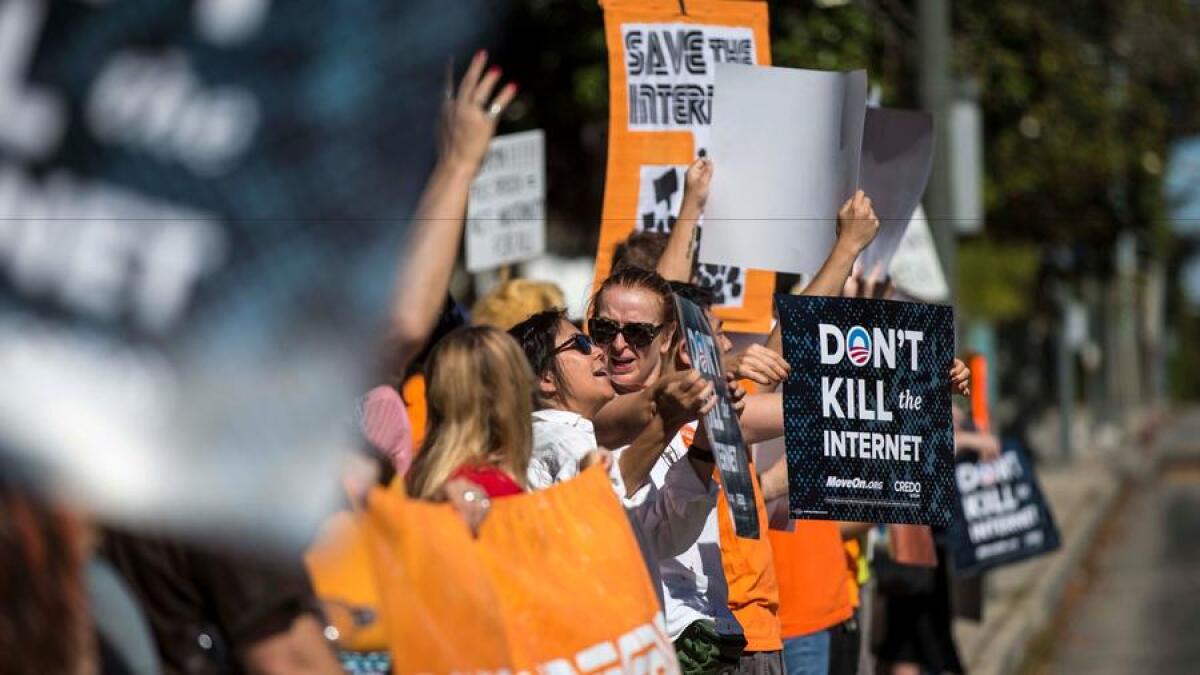
It began as an academic subject with a wonky name — network neutrality.
But at its heart, the issue was simple: Internet service providers should treat all content equally.
Within a few years, the phrase — shortened to the slightly less-wonky net neutrality — became a rallying cry for Silicon Valley technology companies, liberals and online free-speech advocates.
For broadband companies and free-market conservatives, net neutrality became code for a government meddling in the vibrant Internet economy.
Now, after some bizarre pop culture moments, an embrace by a young senator on his way to the presidency, three major court rulings and more than 4 million public comments (and counting) to federal regulators, the term has become part of the online and political lexicon.
Private-sector job growth slows to 177,000 for April
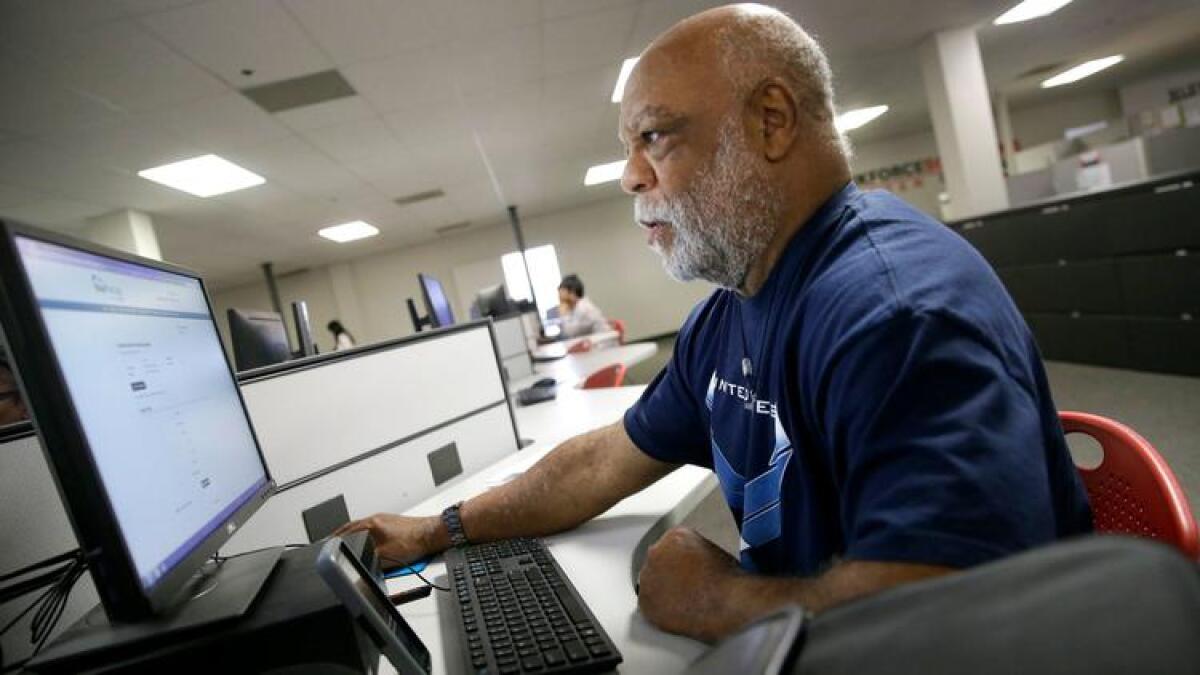
Job creation by U.S. businesses slowed last month to its lowest level since fall as construction firms and retailers pulled back on their hiring, payroll firm Automatic Data Processing said Wednesday.
Private-sector firms added a still-solid 177,000 net new jobs in April, ADP reported. But that was a sharp decline from a downwardly revised 255,000 the previous month and the fewest since October.
The figures for April come after the government reported a sharp slowdown in consumer spending in the first three months of 2017 as the economy stumbled to its worst overall quarterly growth in two years.
As latest Obamacare repeal effort fades, Republicans wonder what happened
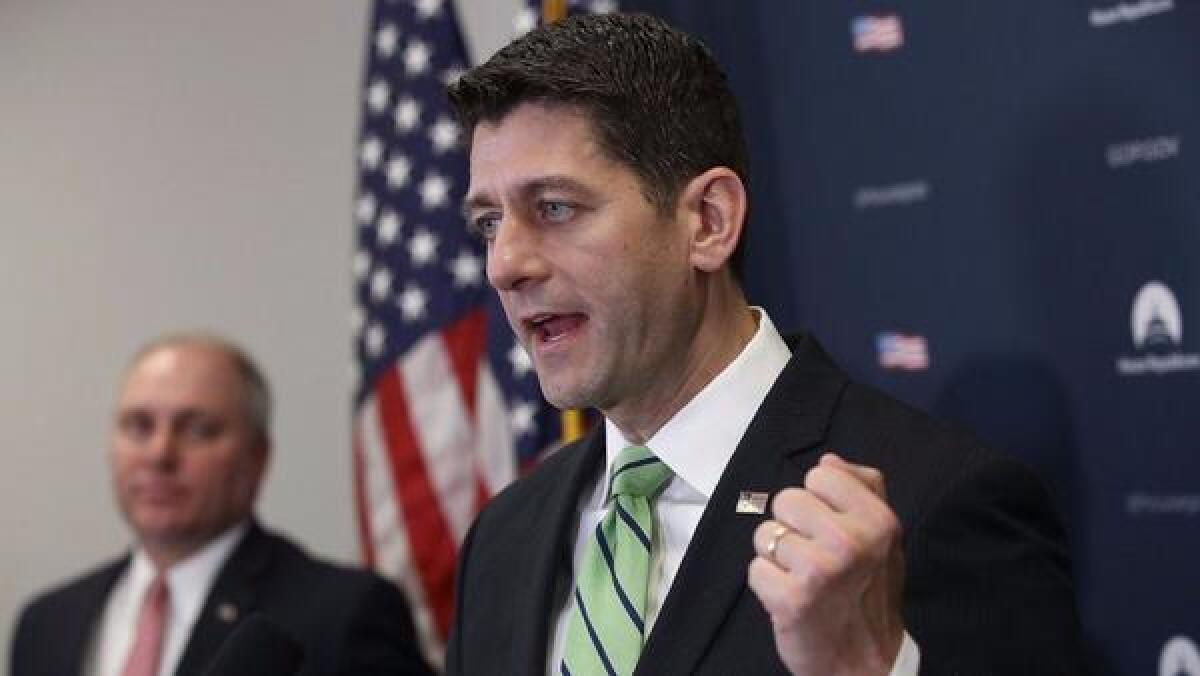
The latest version of the Republican effort to repeal and replace the Affordable Care Act teetered on the verge of failure Tuesday as the conversation among Republicans on Capitol Hill shifted to soul-searching and recriminations over what went wrong in their long campaign to end Obamacare.
Though House leaders say they have not given up on the effort, no vote is planned and some senior GOP lawmakers signaled their dissent.
A failure to vote before the House goes on recess at the end of the week would mark the third time Republicans tried to muster support from their ranks to advance the healthcare overhaul, only to have to make an embarrassing retreat at the last minute.
House Speaker Paul D. Ryan and other leaders, including Vice President Mike Pence, engaged in a flurry of closed-door meetings at the Capitol. Some estimates put the vote count within single digits of the 216 needed for passage, but others numbered Republican defections at more than 30, well over the 22 the party can afford to lose.
Rank-and-file lawmakers say they are being bombarded by calls to their offices and protests at home. Of particular concern is that this latest version of the bill contains a provision, added to attract votes from conservatives, that would effectively end Obamacare’s guarantee of insurance coverage for those with preexisting conditions.
States could allow insurers to charge sick people more and offer them coverage through so-called high-risk pools, which many states operated before Obamacare. But experts and consumer advocates panned this arrangement as unaffordable.
Comey faces questions on FBI’s Russia and Clinton investigations
James B. Comey, the FBI director, faced a Senate committee Wednesday for the first time since he confirmed in March that the FBI was investigating whether President Trump’s current or former aides coordinated with Russian intelligence during the 2016 presidential campaign.
Sen. Charles E. Grassley (R-Iowa), chairman of the Senate Judiciary committee, is expected to press Comey for details on the FBI’s dealings with Christopher Steele, a former British intelligence officer who wrote memos alleging collusion between Russian intelligence and Trump’s aides.
Grassley wrote Comey a testy letter last week complaining about “a startling lack of responsiveness from the FBI.”
Democrats were prepared to grill Comey about why he publicly disclosed days before the election that the FBI had reopened its investigation into Hillary Clinton’s handling of emails on a private server.
A week later, Comey said the new emails didn’t change the Justice Department decision that no charges were warranted.
Clinton and her supporters say Comey’s announcement that the FBI was reopening its investigation drove many wavering voters to Trump.
“If the election had been on Oct. 27, I would be your president,” Clinton said in a TV interview Monday in which she blamed Comey’s disclosure, Russian hacking -- and her own flaws as a candidate -- for her loss in November.
Trump tweeted a response, saying Comey “was the best thing that ever happened to Hillary Clinton in that he gave her a free pass for many bad deeds!”
On Middle East peace, Trump wants to get to yes — and figure out the details later
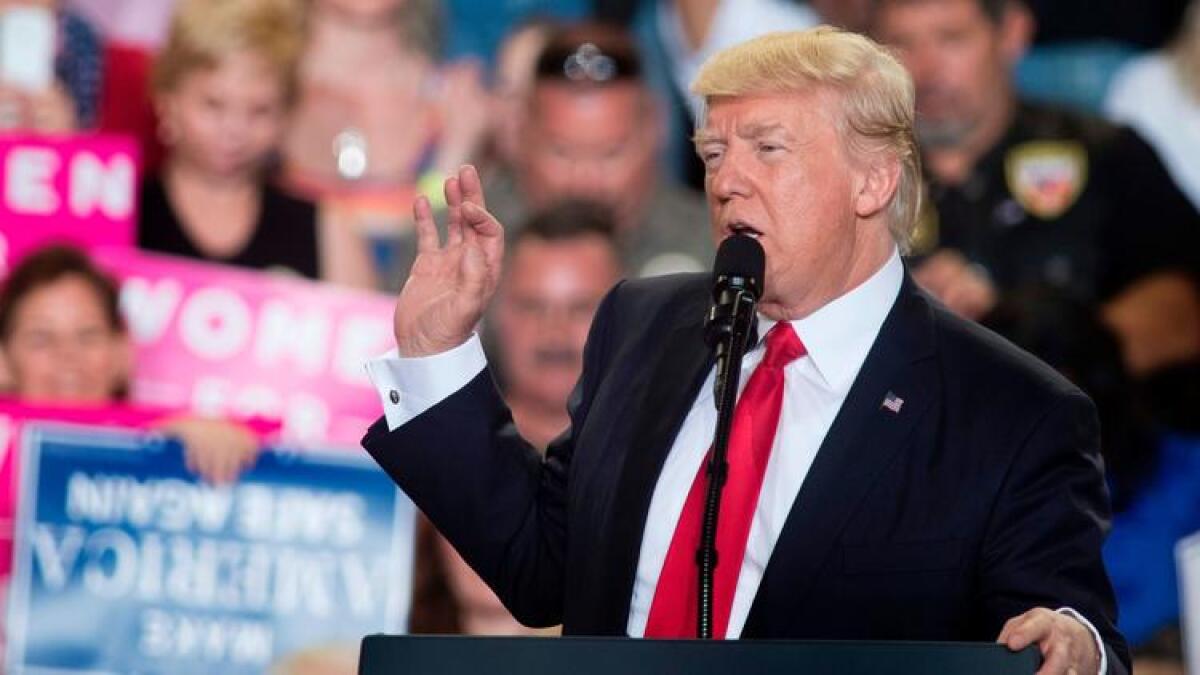
When President Trump hosts Palestinian Authority President Mahmoud Abbas at the White House on Wednesday, he will be looking for an opening to get Palestinians and Israelis back to the negotiating table.
More than three months into his presidency, Trump is fixated on delivering a Middle East peace deal, a person close to the White House said, speaking on the condition of anonymity to describe internal discussions.
Watch live: FBI Director James Comey testifies before the Senate Judiciary Committee
Why Trump is reaching out and even praising dictators: It’s strategy -- and risky
President Trump says he’d be “honored” to meet the North Korean despot Kim Jong Un. Egypt’s president, who allowed his opponents to be shot, is doing a “fantastic job.”
The president of the Philippines, who unleashed vigilante killings at home, is welcome at the White House. So is Thailand’s prime minister, who took power in a military coup. And Turkey’s president, who jailed thousands of opponents, got a congratulatory call.
This is not business as usual for U.S. presidents.
Senate positions to block ambitious California retirement savings effort
The Senate is positioning to scuttle an ambitious California effort to create retirement security for low-income workers, with a vote Wednesday morning that aims to block the state and others from launching programs to automatically enroll millions of people in IRA-type savings plans.
Wednesday’s roll call brings to a head an early confrontation between the state and the Trump-era Congress. The retirement law is a signature achievement of California Senate Leader Kevin De Leon, who worked on it for years and has helped lead a national effort to move similar laws forward in other states – all of which are threatened by the congressional action.
The House passed the measure to block the program in March at the urging of De Leon’s fellow Californian and longtime political rival, Kevin McCarthy of Bakersfield, the House majority leader. President Trump plans to sign the measure if it reaches his desk.
The vote comes amid an intense lobbying campaign by the 38-million-member AARP and other advocacy organizations urging senators to keep the innovative program in place. The AARP has been running radio ads this week calling on senators to protect the program, and it has put lawmakers on notice that the organizations members will be informed about how they vote.
“Too many small business employees don’t have a way to save for retirement out of their regular paycheck,” said a statement from AARP Executive Vice President Nancy LeaMond. “Voting for this resolution would harm small businesses’ employees who need access to retirement plans so they can save for a more secure future.”
But senators are also being pressured by the U.S. Chamber of Commerce and a coalition of Wall Street investment firms to stop California and others from moving forward with the savings programs.
Opponents of the programs, which would set aside a small percentage of earnings in retirement accounts for 6.8 million workers in California alone, warn they lack the federal investor protections of existing retirement plans. Supporters say that argument is a red herring put forward by Wall Street firms anxious about the prospect of new competition, and that exemptions from federal rules enable states to limit the administrative burden on small employers subject to the new law.
California and other states were moved to address the large share of the workforce not enrolled in any retirement plan after efforts to create a federal “automatic IRA” program stalled years ago. Reports by some bipartisan think tanks and policy analysts suggest the programs could ultimately save states billions of dollars by creating a measure of financial security for elderly Americans who otherwise end up on the rolls of Medicaid, food stamps and other safety-net programs.
Trump calls FBI Director James Comey ‘the best thing that ever happened to Hillary Clinton’
Following her speech at the Women for Women event in New York on Tuesday, President Trump took to Twitter on Wednesday morning to comment on Hillary Clinton’s campaign.
“If the election had been on Oct. 27, I would be your president,” Clinton said at the event. But she said FBI Director James B. Comey’s letter to Congress announcing that he had reopened his investigation into Clinton’s email practices, combined with the damage Russian hackers inflicted through their disclosure of campaign emails, raised just enough doubt in the minds of voters to cost her the election.
Clinton’s refusal to take full responsibility for her loss comes after a flurry of post-election critiques concluded the campaign she ran was deeply flawed, neglecting key groups of voters and failing to project a compelling message. Critics, including some Democrats, also charge Clinton brought the email troubles on herself by setting up a private server in her home on which to conduct confidential government business.
Trump hints at need for government shutdown — a view lauded by some conservative activists

It’s an unconventional perspective, from an unconventional president: The government should be shuttered.
“Our country needs a good ‘shutdown’ in September to fix mess,” President Trump tweeted Tuesday morning.
His tweet came as Congress is set to approve a $1-trillion budget bill that funds the government through September, but does not advance funds for a wall along the U.S.-Mexico border — a key promise Trump made throughout the campaign.
In 2013, the government shut down for more than two weeks after Congress was unable to agree on a budget for the new fiscal year, leaving nearly 800,000 federal employees out of work without pay.
Although Trump’s tweet confused those on both sides of the aisle, the notion that the government needs to be shuttered has been floated by some conservative activists for several weeks.
Here are some of today’s headlines:
Frustrated conservatives ready to start winning under Trump (Washington Examiner)
Normally, it would be lauded when lawmakers come to a consensus to avoid a government shutdown as they did over the weekend. But this piece notes that some conservatives wanted to see Trump hold his ground and, perhaps, have a showdown with Democrats over funding his border wall.
“If the reason for the shutdown [would have been] that Democrats in Congress will not agree to spend a dollar to erect a physical barrier on the Southern border, I actually think a lot of the public would rally around Trump digging in and saying this is too important to our national safety and the safety of our communities,” longtime conservative activist Gary Bauer told the Washington Examiner.
The writer, W. James Antell III, adds that Trump wasn’t the most “ideologically conservative candidate” in 2016, “but the rank-and-file Right embraced him as a fighter who would punch Democrats in the nose.”
Pro-Trump PAC rescinds endorsement, says White House failed on immigration (Washington Times)
It was a key pillar to his candidacy and some groups are already assailing Trump for not making enough progress on immigration reform.
The Americans for Legal Immigration political action committee rescinded its endorsement of Trump on Tuesday, castigating him for not ending Deferred Action for Childhood Arrivals (DACA), President Obama’s executive order granting protections to some young people in the country illegally.
“We were so hopeful that Donald Trump would be a man of his word because the campaign promises he made to Americans were the things America needs to do to survive and thrive, but unfortunately, Trump has made it clear he cannot be trusted on his most powerful campaign issue of stopping illegal immigration and amnesty,” William Gheen, the PAC’s president, told the Washington Times.
He added, “Trump promised to end DACA on his first day with a simple memo canceling Obama’s illegal directives. This was the most important thing Trump could have done to restore Constitutional governance in America, but instead he is choosing the path of dictatorship Obama did.”
Ivanka is the business-savvy feminist we need in the White House (American Spectator)
Last week, Ivanka Trump was booed in Berlin while defending her father at a summit of global women leaders. The episode drew headlines around the world.
It’s rare for the child of a sitting president to have an office in the West Wing, but Ivanka Trump has proved to be one of the president’s most trusted advisors.
This piece by Gary Shapiro argues that she has proven herself to be “effective in both business and politics.”
“She made her mark on Celebrity Apprentice. She built her own successful enterprise. She spoke effectively and passionately on women’s issues at the Republican National Convention. She serves in the White House as an unpaid presidential adviser and is highly influential with the president. And she is doing her job in a fishbowl while raising three young children in a new city,” he writes.
Clinton blames the FBI, Russia, WikiLeaks and also herself for 2016 loss
Hillary Clinton on Tuesday took some responsibility for her historic loss in the presidential election, but mostly blamed a conspiracy against her.
“If the election had been on Oct. 27, I would be your president,” Clinton said at the Women for Women event in New York. But she said FBI director James Comey’s letter to Congress announcing that he had reopened his investigation into Clinton’s email practices, combined with the damage Russian hackers inflicted through their disclosure of campaign emails, raised just enough doubt in the minds of voters to cost her the election.
Clinton’s refusal to take full responsibility for her loss comes after a flurry of post-election critiques concluded the campaign she ran was deeply flawed, neglecting key groups of voters and failing to project a compelling message. Critics, including some Democrats, also charge Clinton brought the e-mail troubles on herself by setting up a private server in her home on which to conduct confidential government business.
“It wasn’t a perfect campaign, there is no such thing,” Clinton said, promising to reflect on her mistakes in an upcoming book she joked will be a “confession” and “request for absolution.”
“But I was on the way to winning until the combination of Jim Comey’s letter on Oct. 28th and Russian WikiLeaks raised doubts in the minds of people who were inclined to vote for me but got scared off,” Clinton said. “There was a lot of funny business going on.”
She noted that it was only hours after the disclosure of an Access Hollywood videotape, in which Trump was caught on mic boasting about sexually accosting women, that the stolen emails of her campaign chairman, John Podesta, hit WikiLeaks, creating a distraction from Trump’s troubles.
“What a coincidence,” Clinton said. “You can’t make this stuff up.”
Trump’s ‘big beautiful wall’ is not in the spending plan. Will it ever get built?
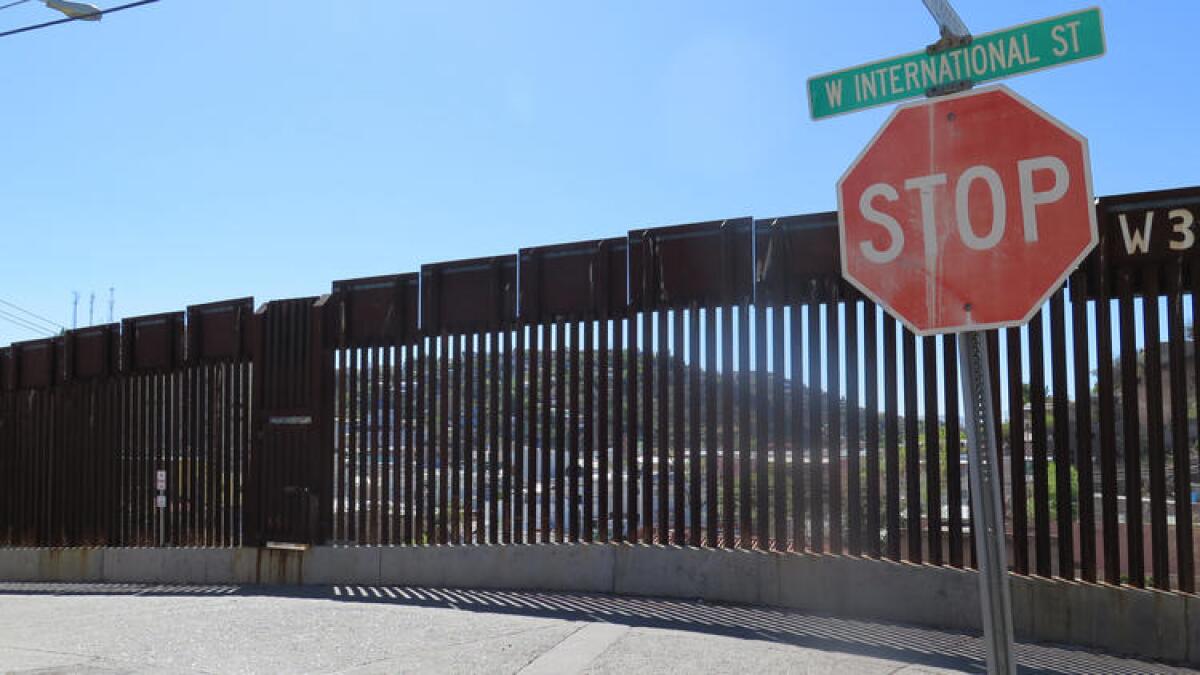
“Mark my words,” Donald Trump said when he announced he was running for president nearly two years ago. He would build a wall on the southwest border, and Mexico would pay for it.
That promise, the most indelible aspect of Trump’s political branding, has endured. It still generates some of the loudest applause at Trump’s speeches, as it did at a weekend rally to mark his first 100 days in office.
But over the past week, Trump gave up on pushing Congress to include the billions needed for the wall in the spending plan that lawmakers expect to pass this week. There is little sign that Mexico will be compelled to pay for it, as Trump has so often vowed. And administration allies are increasingly trying to redefine “the wall” as something other than what Trump described in the campaign.
The wall may be the perfect metaphor for Trump’s administration so far: It remains a White House priority. Trump’s harsh rhetoric about it has probably helped stem the flow of illegal border crossings, stirring widespread fear in immigrant communities. But the physical wall itself remains very much in doubt, in part because members of Trump’s party seem unwilling to pay for it and members of his administration do not think it is completely necessary.
Trump’s frustration with budget compromise has him considering merits of a ‘shutdown’
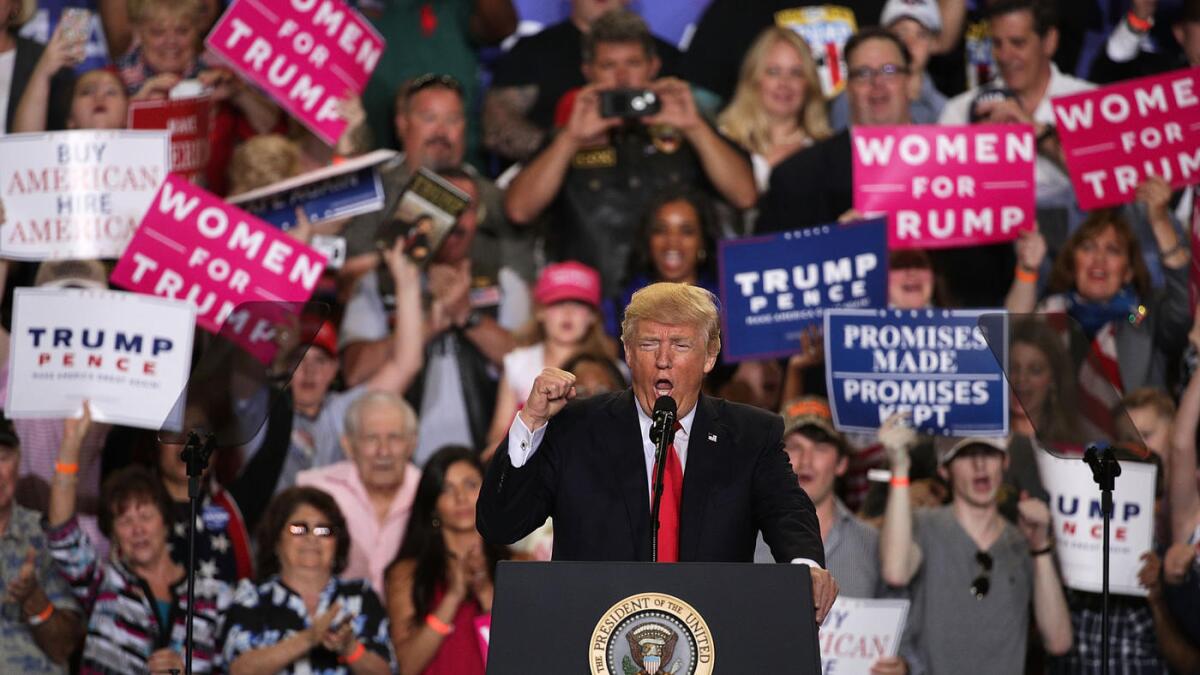
Congress looks set to enact a bipartisan spending bill to avert an imminent government shutdown. But President Trump is suggesting he’d actually welcome a shutdown the next time around.
In a Tuesday morning tweet, Trump seemed to lament the $1-trillion funding package he signed off on over the weekend — one that largely preserves funding for items he promised to slash, but does not advance his promised border wall — as full of concessions to Democrats.
Then he went further — calling either for Senate Republicans to ditch what’s left of the filibuster once and for all, or for voters to increase his party’s numbers in the chamber. He capped that with an unusual remark that seemed to embrace a shutdown as a way to push his agenda.
The White House often says a controversial Trump tweet “speaks for itself” but the comments invite further questions — including why the president believes a government shutdown would be beneficial at a time when Republicans control the White House and both chambers in Congress.
>> Congress is on track with sweeping spending deal, but not much else
It’s also unclear if Trump is calling for an actual government shutdown — he put the term in quotes — or what he has in mind if not. The last federal shutdown occurred during a standoff between President Obama and the GOP in 2013 over healthcare, lasting 16 days.
In Congress, neither side of the aisle wanted a repeat of that.
If the House and Senate do pass the spending bill this week as expected, it will fund government operations through the close of its fiscal year on Sept. 30. White House officials are attempting to tout the spending deal as a win for the president and his priorities, and have said he would be in even a stronger negotiating position this fall.
“I’d be hard-pressed to figure how we could fund more of the priorities,” Trump’s budget director, Mick Mulvaney, told reporters Monday. “And we’re hopeful that we can see as we go through the 2018 process is more of a Republican-driven process, especially in the House, which would be a little bit more typical.”
But it’s unclear just what else Republicans will be capable of passing, given ongoing internal divisions and an emboldened Democratic minority.
Trump has been increasingly focused on the filibuster hurdle in a spate of interviews timed to coincide with his 100th day in office, which fell on Saturday. He called Senate rules “archaic” in an interview on Fox News.
But while Senate Majority Leader Mitch McConnell (R-Ky.) was willing to deploy the so-called “nuclear option” to change Senate rules and allow Trump’s Supreme Court nominee to advance with a simple majority vote, he and other Republicans have indicated that they are not inclined to lower the voting threshold to overcome a filibuster for legislation.
“There’s no sentiment to change the legislative filibuster,” McConnell told reporters last month.
The Trump administration is set to release a more detailed budget blueprint for 2018 later this month, part of a process that Republicans hope will be a vehicle to enact a far-reaching tax plan. First, they still hope to restart an effort to repeal and replace the Affordable Care Act, known as Obamacare.
Congress on track to deliver sweeping spending bill, but not much else
Congress is on track to deliver President Trump his first big bipartisan agreement this week with a $1-trillion spending bill to keep government running, but don’t expect other major legislative accomplishments any time soon.
Even though Republicans control the House, Senate and White House, the party in power is now at risk of squandering the unique opportunity offered in an administration’s early months to muscle through big-ticket priorities in Congress.
House Speaker Paul D. Ryan (R-Wis.) once promised a Republican agenda so ambitious — repeal and replace the Affordable Care Act, overhaul the tax code, cut federal regulations — it would take twice the traditional 100 days of the new administration to accomplish it.
But as Congress begins the march toward Ryan’s 200-day milestone, the prospect for success on almost any of the major Republican priorities is no more in sight than in the first 100 days, which left Trump with only a slim list of achievements.
Watch live: United Airlines CEO Oscar Munoz testifies at congressional hearing
United Airlines CEO Oscar Munoz is likely to face pointed questions as Congress examines customer service by U.S. airlines and how air travel can be improved.
The hearing by the House Transportation Committee comes amid worldwide outrage sparked when a passenger was dragged off a United flight after refusing to give up his seat to a crew member. The April 9 incident ignited a debate about poor service and a lack of customer-friendly policies on U.S. airlines.
Transportation Committee Chairman Bill Shuster of Pennsylvania said the hearing will give lawmakers “an opportunity to get much-needed answers about airline customer service policies and what is being done to improve service for the flying public.”
United moved to head off criticism last week by reaching a settlement with passenger David Dao and issuing new policies designed to prevent customer-service failures.
United President Scott Kirby is scheduled to join Munoz at the hearing, along with top executives of American Airlines, Alaska Airlines and Southwest Airlines.
Trump says he’d be ‘honored’ to meet with North Korean leader; White House says it’s unlikely
President Trump on Monday said he would be “honored” to meet with North Korean leader Kim Jong Un, only days after he raised the possibility of a “major, major conflict” with the reclusive state over its nuclear weapons program.
Though White House aides separately downplayed the likelihood of an unprecedented face-to-face meeting between a U.S. president and North Korean leader, Trump said he “would absolutely” consider it “under the right circumstances.”
“Most political people would never say that,” Trump told Bloomberg News during an interview in the Oval Office, calling his own remark “breaking news.”
The comment was the latest from Trump striking a more conciliatory tone in what had seemed an escalating standoff over North Korea’s stepped-up missile tests and nuclear ambitions. In a CBS interview aired Sunday, Trump called Kim a “pretty smart cookie,” seeming to credit him for retaining control of the country at a young age after the death of his father.
Asked how Trump could say he would be “honored” to meet with the leader of a ruthlessly repressive government, White House Press Secretary Sean Spicer said the president understands the threat North Korea poses.
“There is a diplomatic piece to this,” Spicer said, adding that “the bottom line is the president is going to do what he has to do.”
Spicer echoed Trump’s apparent praise for Kim, saying he had “managed to lead a country forward despite the obvious concerns that we and so many other people have.” But he said many conditions would have to be met in order for Trump to agree to a meeting with Kim.
“We’ve got to see their provocative behavior ratcheted down,” he said.
Earlier Monday, White House Chief of Staff Reince Priebus, speaking to CBS, seemed to rule out the prospect of a meeting unless Kim “was willing to disarm and give up what he’s put in mountainsides across his country and give up his drive for nuclear capability and ICBMs.”
Vice President Mike Pence, also appearing on CBS’ “This Morning,” said the administration was “not going to negotiate to get at the negotiating table.” He reflected on his own recent visit to the demilitarized zone at the border dividing North and South Korea, calling it “chilling” to “look into a nation living under that kind of oppressive regime.”
“North Korea knows through U.N. actions in the past, through pronouncements by the world community, they need to abandon their nuclear program, abandon their ballistic missile program, they need to stand down in a very real sense to have the right to engage the world community on the way forward,” Pence said.
Also Monday, Spicer defended Trump’s decision to extend an invitation for a White House meeting to Philippine President Rodrigo Duterte, who has presided over a violent crackdown on drug-related crime that human rights groups say has left more than 7,000 people dead.
Spicer said the administration was aware of human rights concerns, but said Trump sees “an opportunity for us to work with countries in that region that can help play a role in diplomatically and economically isolating North Korea.”
“The national interests of the United States, the safety of our people and the safety of people in the region are the No. 1 priorities of the president,” he said.
Supreme Court clears the way for cities, including L.A., to sue banks over foreclosure crisis

The Supreme Court expanded the reach of federal housing law Monday, ruling that cities — including Los Angeles — can sue major banks for discriminatory lending practices that hurt low-income neighborhoods during the Great Recession.
The decision gives city leaders a potentially powerful weapon against lenders, including those who were accused of predatory practices that triggered the foreclosure crisis after 2008.
Spending deal protects arts money, rejects Trump plan
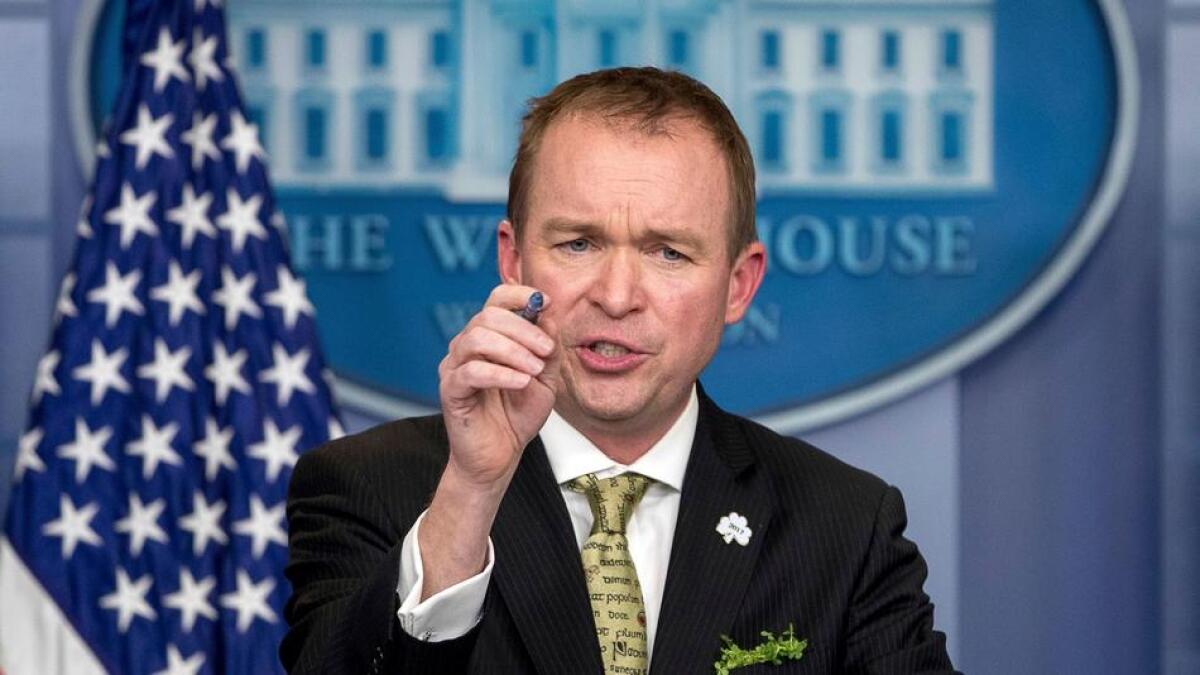
Congressional leaders rejected the Trump administration’s proposal to eliminate money for federal arts programs, providing a small increase as part of a bipartisan spending deal.
The spending bill that Congress is expected to vote on this week includes $150 million for the National Endowment for the Arts and an identical sum for the Humanities endowment. In both cases, that’s a $2-million increase over last fiscal year.
There’s also no cut in money for the Corporation for Public Broadcasting.
President Trump, in his budget, had proposed eliminating all federal money for the NEA and the NEH, generating an intense lobbying campaign by arts supporters.
Budget Director Mick Mulvaney had advocated the cuts, saying that it was unfair to take money from working families to support programs such as the endowments and public television.
But it was clear from the outset that Trump’s plan would face trouble in Congress. Most NEA funds go to support community arts groups in all 50 states, with rural, Republican-leaning states topping the lists of spending per person. As a result, arts programs have a strong constituency in Congress, especially on the appropriations committees that dole out spending.
Mulvaney and his allies in the most conservative wing of the GOP have tried to cut money for arts programs in the past with no success.
The deal only lasts through the end of September, and the fight could be renewed for the new fiscal year that begins Oct. 1, but the basic congressional dynamics aren’t likely to change.
Supreme Court lets stand California ban on anti-gay therapy
The Supreme Court has again rejected a challenge to California’s ban on so-called gay conversion therapy.
The justices did not comment Monday in turning away an appeal from a San Diego minister and others who argued the law violated their 1st Amendment religious freedoms.
The federal appeals court in San Francisco had previously upheld the law in dismissing the constitutional challenge.
Gov. Jerry Brown signed the ban into law in late 2012. Since then, the Supreme Court has rejected efforts to upend the California law and a similar ban New Jersey.
Passing 100-day mark, Trump offers mixed signals on healthcare, taxes and North Korea
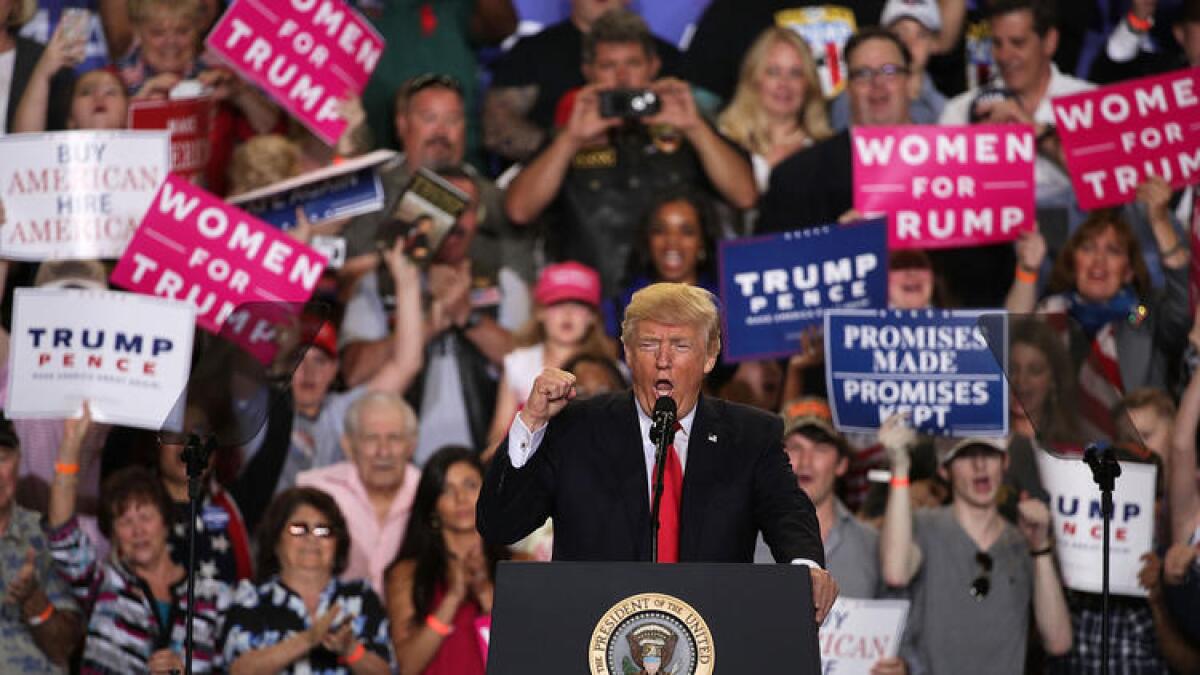
President Trump pushed past his first tumultuous 100 days in office by calling for action Sunday on three of his administration’s top priorities — North Korea, healthcare and tax reform — but gave mixed signals on each of them.
Trump described North Korea’s mercurial leader Kim Jong Un as a “pretty smart cookie.” Undercutting a key campaign pledge, Trump suggested possible cuts to Medicare by curbing “abuses.” And he declared that the top Democrat in the Senate, who has derided Trump’s tax proposal as a boon for the wealthy, was “making a fool of himself.”
Vice President Mike Pence separately acknowledged on NBC’s “Meet the Press” that a sweeping White House proposal to slash individual and corporate tax rates would increase the national debt “maybe in the short term.”
The White House previously has argued that improved economic growth would pay for the loss of revenue. Critics have said the Trump tax blueprint could add trillions of dollars to the deficit if enacted.
Businesses aren’t spending. Can tax reform change that?
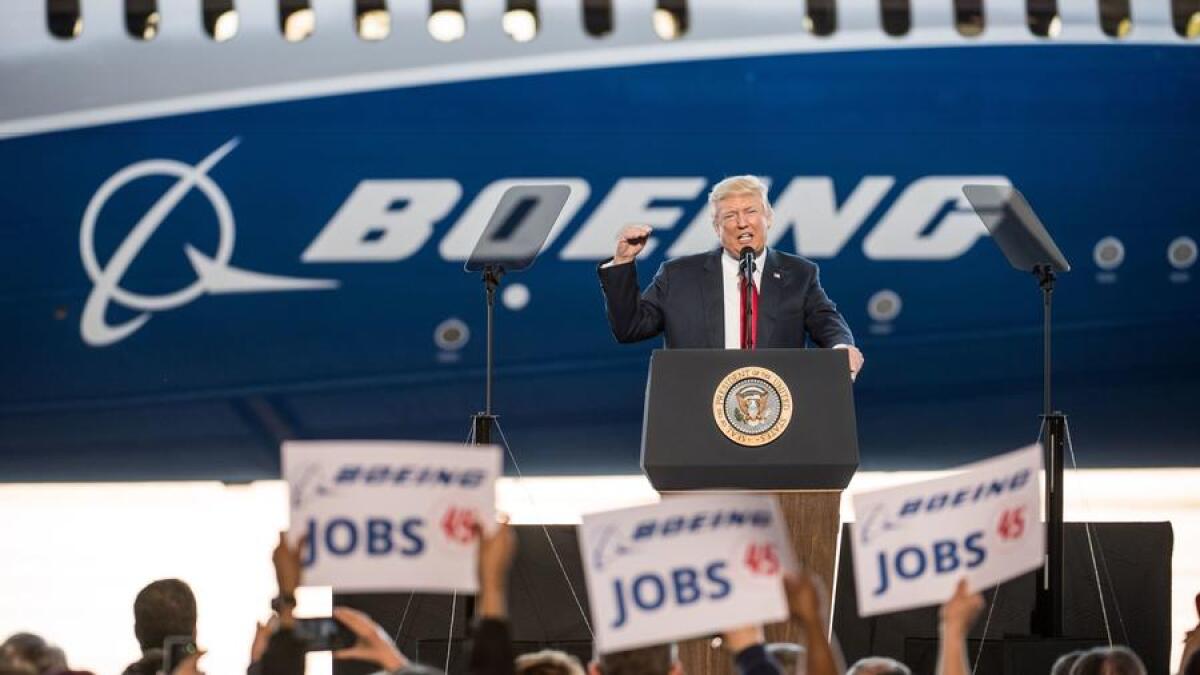
The sweeping tax overhaul plans from President Trump and House Republicans attempt to address an enduring mystery of the economic recovery: Why are U.S. businesses, flush with cash, so unwilling to spend it?
By investing more in factories, stores, equipment and new employees, companies could provide a sorely-needed boost to the lackluster U.S. economy.
But many business owners have been hesitant to open their wallets. They are wary of another downturn, and some sectors are struggling against low oil prices and a rising dollar that makes exports more expensive.
Business investment has been weak for the last couple of years, dragging down economic growth.
Trump makes puzzling claim about Andrew Jackson, Civil War
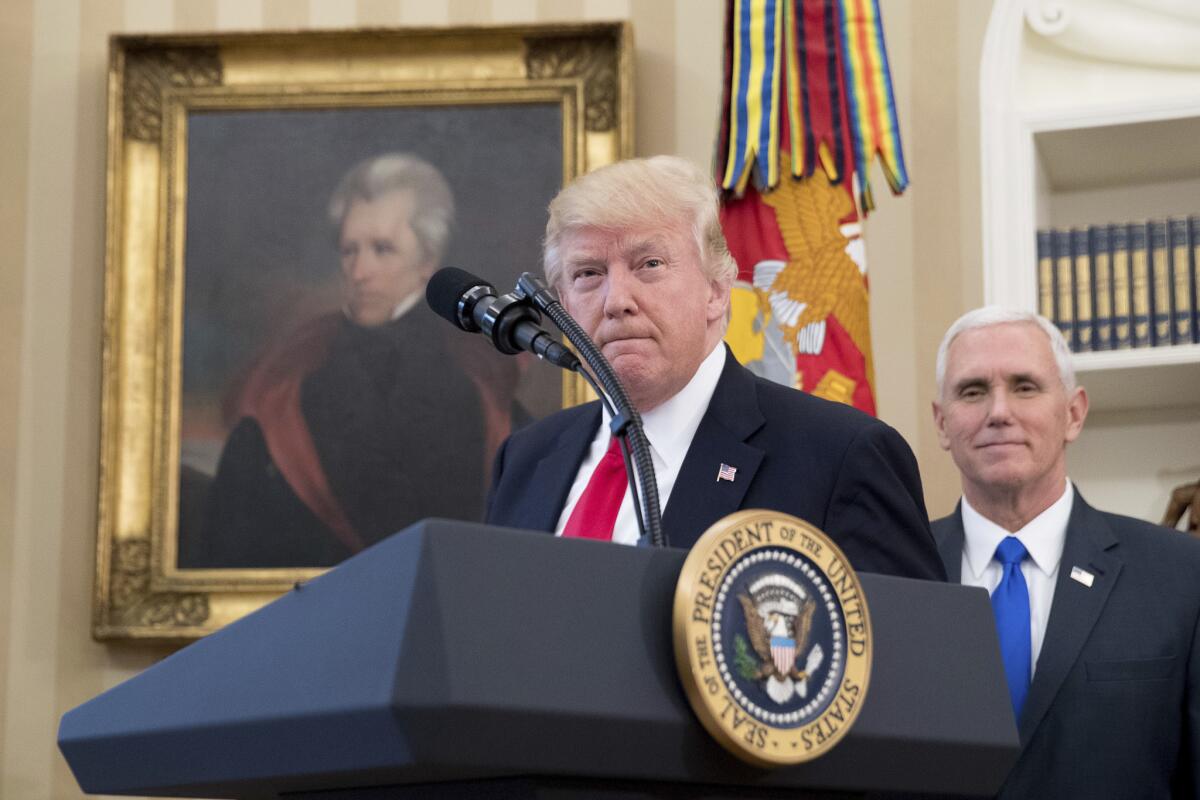
President Trump made a puzzling claim about Andrew Jackson and the Civil War in an interview.
Speaking to the Washington Examiner, Trump wondered why issues that triggered the war “could not have been worked out” in order to prevent the bloody conflict. Trump praised the accomplishments of Jackson, the populist president he has cited as a role model.
He made the puzzling claim that Jackson “was really angry that he saw what was happening in regard to the Civil War.” But Jackson died in 1845, and the Civil War didn’t begin until 16 years later, in 1861.
Trump then said, “People don’t ask the question, but why was there the Civil War?”
The war was decades in the making, stemming from disputes between the North and South about slavery and states’ rights.
Trump adviser Sebastian Gorka expected to leave White House, official says
Note, Aug 20: This article was published May 1. Sebastian Gorka currently serves as a deputy assistant to President Trump.
An adviser to President Trump will be leaving the White House.
A senior administration official says Sebastian Gorka, a former counterterrorism analyst for Fox News who joined the administration as a counterterrorism adviser, will be leaving the White House in the coming days.
The official says that Gorka had initially been hired to play a key role on the Strategic Initiatives Group, an advisory panel created by Trump’s chief strategist Steve Bannon to run parallel to the National Security Council.
UPDATE: Steve Bannon out as Trump’s chief strategist
But that group fizzled out in the early months of the administration. Gorka was unable to get clearance for the National Security Council after he was charged last year with carrying a weapon at Ronald Reagan Washington National Airport.
The official spoke anonymously to discuss private personnel matters. Attempts to reach Gorka by email for comment were not immediately successful.
ALSO
The most notable firings and resignations in the Trump administration
Bannon ouster could be ‘beginning of the end’ for Trump, Breitbart warns
Congressional negotiators reach $1-trillion deal to fund government through September
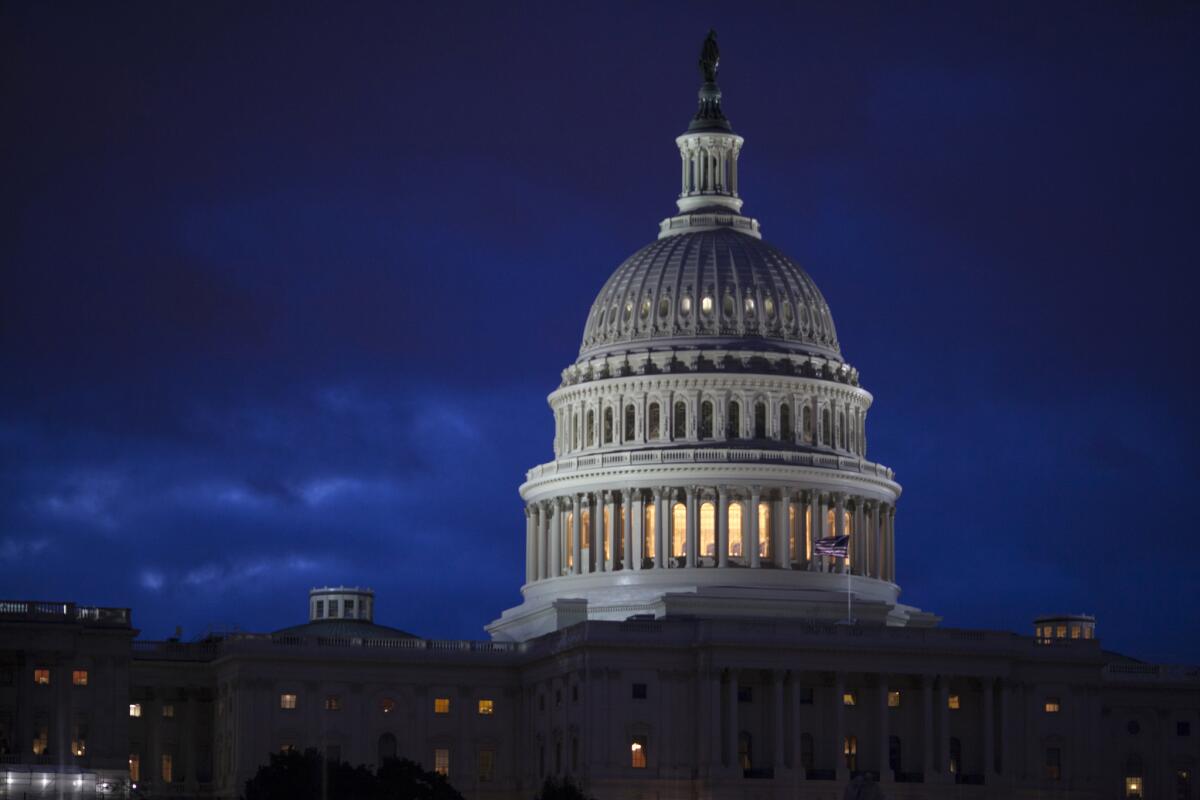
Congressional negotiators have reached a bipartisan deal to fund the federal government through September, easing the threat of a shutdown but denying President Trump several key priorities — including money for his promised border wall with Mexico.
The estimated $1-trillion omnibus package would provide $12.5 billion in increased military funding, about half the amount Trump requested from Congress. An additional $2.5 billion for defense would be available if the administration submits a counter-terrorism strategy to fight Islamic State.
But the deal does not include the big cuts to domestic non-defense accounts that Trump had been seeking, and thus is something of an embarrassment to the White House.
It would actually increase federal spending on medical research, green energy programs and other areas that the White House had pegged for sharp reductions.
What we don’t know about Trump’s tax plan (A lot)
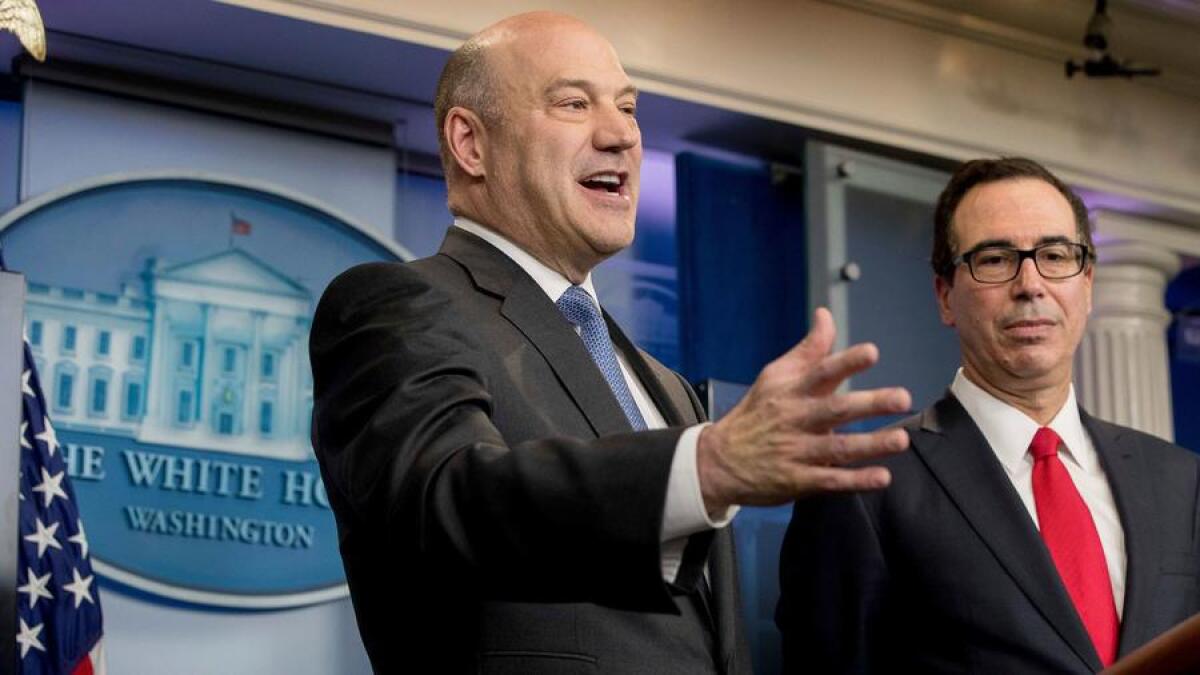
The Trump administration unveiled its tax overhaul plan with a large amount of rhetoric and a small amount of detail.
Rushed out before President Trump reached his 100th-day-in-office milestone, the plan released Wednesday was contained on a single page with 19 bullet points. As of Friday, it still was not posted on the White House website.
Treasury Secretary Steven T. Mnuchin and Gary Cohn, director of the White House National Economic Council, provided some additional information in media briefings.
Many of the points in Trump’s plan were general principles. And some of the proposals were so vague that even top administration officials appeared confused about them.
